- English (EN)
- Español (ES)
- Português (BR)

Is Iran Safe? Crime Rates & Safety Report
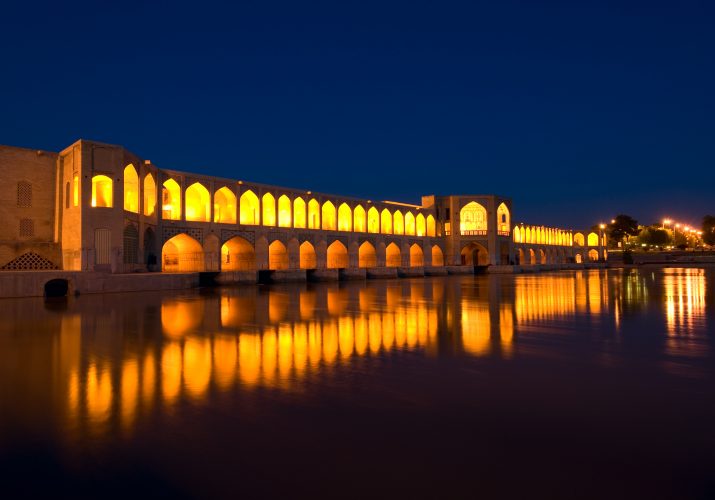
- Iran : Safety by City
Iran is a large country located in the Greater Middle East, between the Gulf of Oman, the Persian Gulf, and the Caspian Sea.
It is part of the South-Central Asian Union and is sharing its borders with Iraq to the west, Turkey, Azerbaijan’s Naxcivan enclave, Armenia, and Azerbaijan to the northwest, Turkmenistan to the northeast, Afghanistan and Pakistan to the east.
The entire northern part of Iran is completely covered in rain forests called Shomal, which mostly resemble simply forests or woods rather than rain forests, but they are still called the Jungles of Iran.
If you’re more into deserts, there are plenty of them in the east of the country.
You will have a great time in the Dasht-e Kavir, Iran’s largest desert, located in the north-central portion of the country, and the Dasht-e Lut, in the east.
The country also offers some salt lakes, but don’t be fooled that you will be bored in Iran.
There are plenty of activities that Iranian deserts offer, like desert tracking, camel riding, bicycle riding, safari, and 4×4 driving excursions.
- Warnings & Dangers in Iran
OVERALL RISK: MEDIUM
Overall, Iran is safe to visit when it comes to the crime rate but you have to avoid some very dangerous parts of the country if you want to have a safe trip.
TRANSPORT & TAXIS RISK: MEDIUM
You should be careful while on the road, as accidents while driving are known to happen frequently. The roads aren't all bad and they vary from being in an excellent condition to being in a very poor condition. However, there are other factors that make driving in Iran dangerous, such as poorly lit roads, reckless drivers that ignore traffic signs, etc. There is also a risk of being attacked by pirates operating in the Northern Arabian Sea, Gulf of Aden and Gulf of Oman.
PICKPOCKETS RISK: HIGH
Pickpockets are definitely an issue in this country and you should keep in mind that they operate mostly in the overcrowded bazaars and public transports. Remain vigilant at all times and leave your most valuable belongings in your accommodation.
NATURAL DISASTERS RISK: MEDIUM
Among natural disasters that are known to hit Iran are extremely high temperatures sometimes exceeding 50C, sandstorms that are a regular occurrence, and severe sandstorms that occur sporadically. Earthquakes are also a threat.
MUGGING RISK: LOW
Except in the tourist area of Isfahan, where mugging has been on the rise lately, this isn't generally a concern in Iran. Make sure you only take licensed taxis as 90% of muggings occur in unlicensed ones.
TERRORISM RISK: HIGH
Terrorists are likely to carry out attacks in Iran. The threat is believed to be coming from the Sunni extremist groups, which are probably the perpetrators of several bombings that have taken place in the south-eastern province of Sistan-Baluchistan, bordering Pakistan and Afghanistan.
SCAMS RISK: LOW
There are almost no known scams in Iran. Still, just in case, be wary of people trying to distract you or offering you unwanted help, check your change twice and always negotiate every service beforehand.
WOMEN TRAVELERS RISK: MEDIUM
Many women have traveled to Iran without having any negative experiences. Generally speaking, it is no more dangerous in Iran than in most European countries, Australia or USA. Still, you should be very vigilant if you're traveling alone and always apply basic precaution measures you would in your own country.
- So... How Safe Is Iran Really?
Generally speaking, Iran is a safe country when it comes to violent crime. Its crime rates are relatively low, with the exception of the dangerous areas in the southeast of the country.
You should be aware that there is a lot of petty theft in the urban areas of the country, especially in crowded bazaars, bus and train stations, as well as airports.
Mugging has become more common during the last couple of years in the tourist center of Isfahan.
There are certain areas that are best to be avoided, and considered dangerous for foreigners, like all areas east of the line running from Bam to Jusk, the Sistan-Baluchistan province, and the area within 20km of the entire border of Iraq.
These areas are especially dangerous because they are known for drug traders using them to smuggle heroin from Afghanistan here.
Because of this, there have been robberies, kidnappings and even murders happening here.
Cities of Zahedan, Zabol, and Mirjaveh are particularly dangerous.
Do not go anywhere within 120 km of the entire Iran/Afghanistan border.
These areas are regularly affected by ethnic conflicts and they have been known as places where kidnappings of foreigners occur on occasion.
The tourist center of Isfahan is also known for problems with muggings of foreigners in unlicensed taxis.
Keep in mind that there are fake police officers making random and impromptu checks of tourists’ passports.
Only use official taxis, and never let these fake officials search you without asking for identification.
- How Does Iran Compare?
- Useful Information
Many countries do need a visa to enter Iran. If you're from Israel or have been to Israel, your visa is going to be denied. Your visa must be acquired before traveling to Iran and it will be issued for up to 30 days. Make sure your passport is valid for at least the next six months. If you are not sure about your visa status, visit www.doyouneedvisa.com which will let you know whether or not you need a visa based on your nationality and the country you want to visit.
Iranian Riyal is the official currency in Iran. Don't count of ATMs and credit cards. You can't use them or debit cards, or travelers' cheques. Bring lots of cash.
The climate in Iran varies depending on the area. In the northwest, winters can be cold with heavy snowfall and freezing temperatures during December and January. Spring and fall are relatively mild, while summers are extremely hot with temperatures reaching as high as 50C.
Tehran Imam Khomeini International Airport is the busiest and primary airport of Tehran, the capital city of Iran. It is located 30 km southwest of Tehran, near the localities of Robat Karim and Eslamshahr.
Travel Insurance
Just like anywhere else, we recommend getting travel insurance when traveling to Iran, since it covers not only the costs of medical problems but also theft and loss of valuables.
Iran Weather Averages (Temperatures)
- Average High/Low Temperature
Iran - Safety by City
- Where to Next?
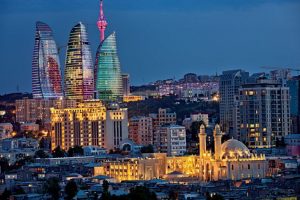
29 Reviews on Iran
You are wrong about terrorists risk , there is not such a thing in Iran . There may be conflicts in shared borders with Afganistan and Pakistan but not inside Iran .
Can US citizens visit?
Yes but you have to visit Iran in group of tourists not alone
I am about to go in Iran on december, but i am kinda afraid but i still wanna visit the country because i wanna see on my own eyes how iran is beautiful country and i wanna make people regret what they negative say about it.
There are absolutely no terrorist attacks!! Where did this info come from? Can you name one single terrorist attack that happened in the past 10 years?
Just beware of the imbecile Trump bombing you at the airport.
As Americans we love that
As non-americans we hate that
as Iranians, you seem to be sick…very much.
there is no terrorist attack in Iran , in general Iran is very safe to travel , also pickpockets risk is not high ,i would say its medium like any other normal countries , but keep in mind that you should not do any political related things in Iran as the government is very sensitive about political activities by foreign people .
Such a bullshit! Terrorist attack in Iran!!!! No way! There is not any terrorist attack in Iran at all!
Iran is bigger than you think buddy!
Iran is not only Tehran, some big cities and the northern parts. While I can agree there is absolutely no risk of terrorism in most parts of the country, the regions close to Pakistan and Afghanistan are not very safe and unfortunately the terrorist groups are active in those regions.
There is no terrorist attack.
Top of my “must see” list of countries – birthplace of civilization, and wonderful people. Can’t wait to go!
Best country in the world
Iran is one of the best countries I saw.
no terrorist attacks, no discrimination, and many beautiful things like Milad tower and much more things that I love.
I have visited over 46 countries in the world. I will put Iran first because of the culture, history, food and especially the people who are extremely kind. I didn’t feel insecure at any point. I’ve talked to a lot of people and I haven’t heard from anyone that they hate America or Americans. People will be at your service at every step.
Amazing place with great people
I totally agree with you Dragan. I am an avid traveller and have visited many countries in Asia, Africa, South America, etc… I was skeptical when my husband brought up the idea of visiting Iran. After a lot of convincing, I agreed and am I ever glad I agreed!!!! One of the best experiences I’ve ever had – the country itself, the hospitality! Goes to show how biased media can be – all about politics!
I live near the borders of Iran (northwestern Iran), so I have never encountered a terrorist. In my opinion, the mentioned security indicators are determined based on political relations and not on the existing reality. Ask those who came to Iran and see if Iran is a safe country. This is nothing but a media game against Iran.
Generally accurate except the part about terrorist attacks. The possibility of terrorist attacks even in the border areas are quite low and would be higher in most European countries.
I’m an Englishman who spent an entire month travelling with my wife to several Iranian cities including Tehran, Mashad, Shiraz, Isfahan, and Banda Abbas, and had never felt threatened at any time throughout my travels in that beautiful country.
I’m Italian and I went to Iran in June 2022. It is an amazing country with great things to see and very friendly people. I felt very safe in this country, and I would be very happy to go back.
This is not true!!!
Oh my GOD why on earth would someone go anywhere within 120 km of the entire Iran/Afghanistan border, or Pakistan or Iraq border?! There is nothing there for tourists! Or anyone else!! Iran is a huge country, there are literally thousands of places to visit only in the northern area, Tehran and central area! So, you’ve got The capital, the forests, Tabriz in the norther area too, the deserts, the historical cities like Shiraz, Isfahan and Yazd, and in the southern area like Boushehr or Islands like Hormoz, Kish and Qeshm you can see a really different, beautiful, stunning nature!! Yes, Sistaan and Balouchestan is not really safe, unfortunately! But what I am saying is, there is a very long distance between these places!! You can see everywhere and everything without even being nearly around any dangerous areas! And, honestly, Seriously, terrorist attack?! No!!!! Not in Iran! Not inside of the borders of Iran!!!! Never! No way!
GO AT YOUR OWN RISK
This place is run by cruel and heartless group of terrorists who call themselves the Taliban. I cannot travel there cause i am a united states citizen. So go at your own risk.
Dear Lucario Taliban is in Afghanistan not Iran! you mixed up the countries. There is no terrorism risk in Iran and of course you can travel to Iran if you are US citizen. Please come and see how beautiful is this country and how kind and friendly are people with you. Do not believe so much in Media!!
DANGER HIGH
Dear Fahi Stop tricking unaware people. The IRGC end even the whole IRI itself are both akin to Taliban. Iran is a hellhole occupied by the worst scums and thugs who have no regard for human lives and even enjoy killing children. Tourists could be kidnapped, tortured, raped and killed and no one could do anything to rescue them because the IRI and their thugs do not answer to anyone but themselves. No tasty food or pretty tilework is going to change the reality.
awesome, we dont want you there too…no choke on your McDonalds, while I eat delicious and healthy ghorme sabzi
If you travel to Iran as a foreigner 100% sure you will be arrested! Just check the news or search google for this, and see how many foreigners are in prison now
Because you’re western and you believe media so much
iran, best country to see in the world…
iran, worst to visit from international media point of view cause it dosent spends money on international mafia media…
Share Your Experience Cancel reply
Your Review
Title of your review
Article Contents
- Overall Risk
- Transport & Taxis Risk
- Pickpockets Risk
- Natural Disasters Risk
- Mugging Risk
- Terrorism Risk
- Women Travelers Risk
- Weather Averages (Temperatures)
- User Reviews
- Share Your Experience
Popular Destinations

Safety Index
Recent reviews & comments.
- Ty on Sao Paulo
- Samuel Lewis on 10 Safest Cities in Malaysia
- Albert Smith on 10 Safest Cities in Malaysia
- Mikael Henderson on 10 Safest Cities in Malaysia
- Nii on Guinea
Popular US States
- Pennsylvania
You are using an outdated browser. Upgrade your browser today or install Google Chrome Frame to better experience this site.
Iran Traveler View
Travel health notices, vaccines and medicines, non-vaccine-preventable diseases, stay healthy and safe.
- Packing List
After Your Trip
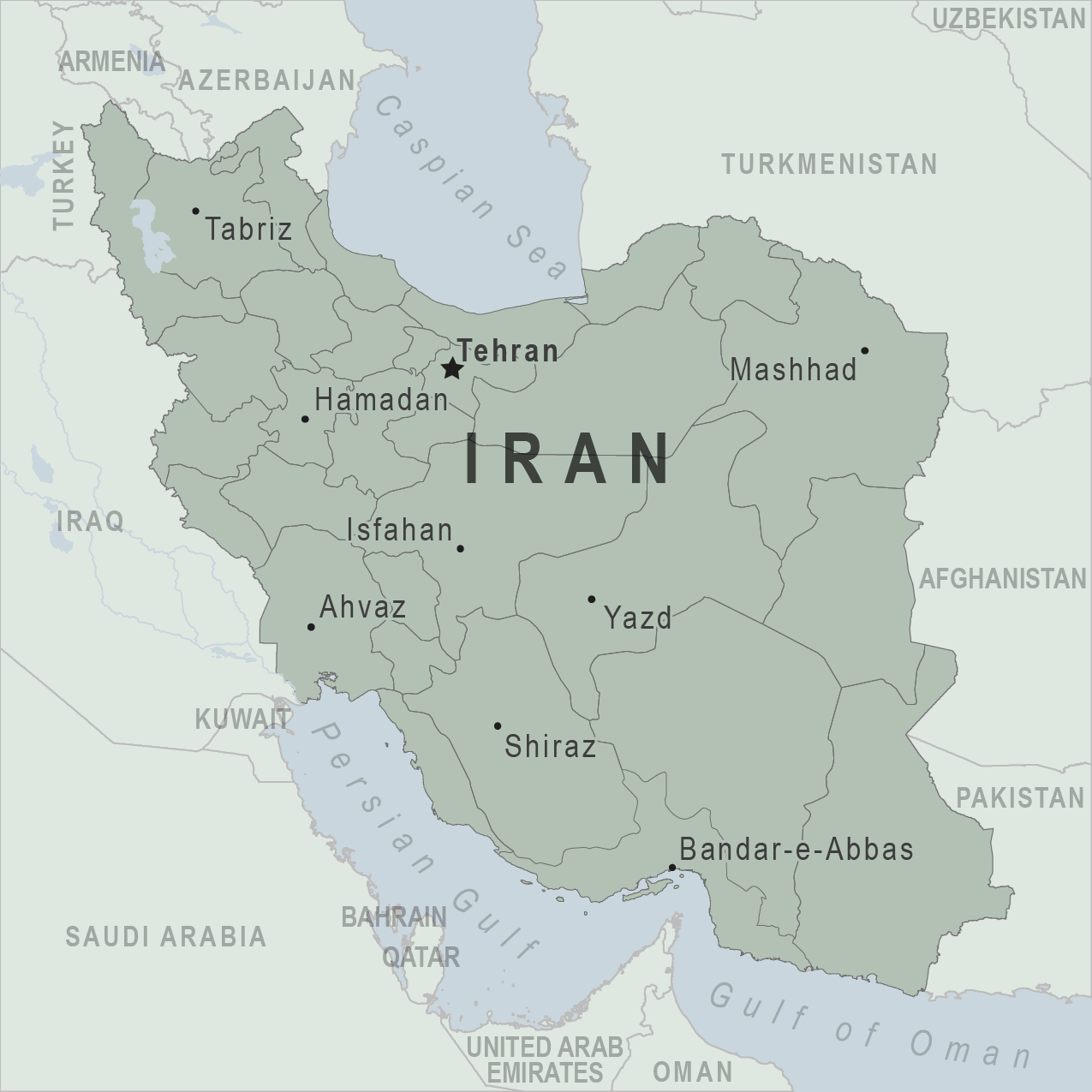
There are no notices currently in effect for Iran.
⇧ Top
Check the vaccines and medicines list and visit your doctor at least a month before your trip to get vaccines or medicines you may need. If you or your doctor need help finding a location that provides certain vaccines or medicines, visit the Find a Clinic page.
Routine vaccines
Recommendations.
Make sure you are up-to-date on all routine vaccines before every trip. Some of these vaccines include
- Chickenpox (Varicella)
- Diphtheria-Tetanus-Pertussis
- Flu (influenza)
- Measles-Mumps-Rubella (MMR)
Immunization schedules
All eligible travelers should be up to date with their COVID-19 vaccines. Please see Your COVID-19 Vaccination for more information.
COVID-19 vaccine
Hepatitis A
Recommended for unvaccinated travelers one year old or older going to Iran.
Infants 6 to 11 months old should also be vaccinated against Hepatitis A. The dose does not count toward the routine 2-dose series.
Travelers allergic to a vaccine component or who are younger than 6 months should receive a single dose of immune globulin, which provides effective protection for up to 2 months depending on dosage given.
Unvaccinated travelers who are over 40 years old, immunocompromised, or have chronic medical conditions planning to depart to a risk area in less than 2 weeks should get the initial dose of vaccine and at the same appointment receive immune globulin.
Hepatitis A - CDC Yellow Book
Dosing info - Hep A
Hepatitis B
Recommended for unvaccinated travelers younger than 60 years old traveling to Iran. Unvaccinated travelers 60 years and older may get vaccinated before traveling to Iran.
Hepatitis B - CDC Yellow Book
Dosing info - Hep B
Cases of measles are on the rise worldwide. Travelers are at risk of measles if they have not been fully vaccinated at least two weeks prior to departure, or have not had measles in the past, and travel internationally to areas where measles is spreading.
All international travelers should be fully vaccinated against measles with the measles-mumps-rubella (MMR) vaccine, including an early dose for infants 6–11 months, according to CDC’s measles vaccination recommendations for international travel .
Measles (Rubeola) - CDC Yellow Book
Dogs infected with rabies are commonly found in Iran.
Rabies is also present in some terrestrial wildlife species.
If rabies exposures occur while in Iran, rabies vaccines may only be available in larger suburban/urban medical facilities.
Rabies pre-exposure vaccination considerations include whether travelers 1) will be performing occupational or recreational activities that increase risk for exposure to potentially rabid animals and 2) might have difficulty getting prompt access to safe post-exposure prophylaxis.
Please consult with a healthcare provider to determine whether you should receive pre-exposure vaccination before travel.
For more information, see country rabies status assessments .
Rabies - CDC Yellow Book
Recommended for most travelers, especially those staying with friends or relatives or visiting smaller cities or rural areas.
Typhoid - CDC Yellow Book
Dosing info - Typhoid
Yellow Fever
Required for travelers ≥9 months old arriving from countries with risk for YF virus transmission; this includes >12-hour airport transits or layovers in countries with risk for YF virus transmission. 1
Yellow Fever - CDC Yellow Book
- Avoid contaminated water
Leptospirosis
How most people get sick (most common modes of transmission)
- Touching urine or other body fluids from an animal infected with leptospirosis
- Swimming or wading in urine-contaminated fresh water, or contact with urine-contaminated mud
- Drinking water or eating food contaminated with animal urine
- Avoid contaminated water and soil
- Avoid floodwater
Clinical Guidance
Schistosomiasis
- Wading, swimming, bathing, or washing in contaminated freshwater streams, rivers, ponds, lakes, or untreated pools.
Avoid bug bites
Crimean-Congo Hemorrhagic fever
- Tick bite
- Touching the body fluids of a person or animal infected with CCHF
- Avoid Bug Bites
- Mosquito bite
Leishmaniasis
- Sand fly bite
Airborne & droplet
Avian/bird flu.
- Being around, touching, or working with infected poultry, such as visiting poultry farms or live-animal markets
- Avoid domestic and wild poultry
- Breathing in air or accidentally eating food contaminated with the urine, droppings, or saliva of infected rodents
- Bite from an infected rodent
- Less commonly, being around someone sick with hantavirus (only occurs with Andes virus)
- Avoid rodents and areas where they live
- Avoid sick people
Middle East Respiratory Syndrome (MERS)
- Scientists do not fully understand how the MERS virus spreads
- May spread from to others when an infected person coughs or sneezes
- May spread to people from camels.
Middle East Respiratory virus syndrome (MERS)
Tuberculosis (TB)
- Breathe in TB bacteria that is in the air from an infected and contagious person coughing, speaking, or singing.
Learn actions you can take to stay healthy and safe on your trip. Vaccines cannot protect you from many diseases in Iran, so your behaviors are important.
Eat and drink safely
Food and water standards around the world vary based on the destination. Standards may also differ within a country and risk may change depending on activity type (e.g., hiking versus business trip). You can learn more about safe food and drink choices when traveling by accessing the resources below.
- Choose Safe Food and Drinks When Traveling
- Water Treatment Options When Hiking, Camping or Traveling
- Global Water, Sanitation and Hygiene (WASH)
- Avoid Contaminated Water During Travel
You can also visit the Department of State Country Information Pages for additional information about food and water safety.
Prevent bug bites
Bugs (like mosquitoes, ticks, and fleas) can spread a number of diseases in Iran. Many of these diseases cannot be prevented with a vaccine or medicine. You can reduce your risk by taking steps to prevent bug bites.
What can I do to prevent bug bites?
- Cover exposed skin by wearing long-sleeved shirts, long pants, and hats.
- Use an appropriate insect repellent (see below).
- Use permethrin-treated clothing and gear (such as boots, pants, socks, and tents). Do not use permethrin directly on skin.
- Stay and sleep in air-conditioned or screened rooms.
- Use a bed net if the area where you are sleeping is exposed to the outdoors.
What type of insect repellent should I use?
- FOR PROTECTION AGAINST TICKS AND MOSQUITOES: Use a repellent that contains 20% or more DEET for protection that lasts up to several hours.
- Picaridin (also known as KBR 3023, Bayrepel, and icaridin)
- Oil of lemon eucalyptus (OLE) or para-menthane-diol (PMD)
- 2-undecanone
- Always use insect repellent as directed.
What should I do if I am bitten by bugs?
- Avoid scratching bug bites, and apply hydrocortisone cream or calamine lotion to reduce the itching.
- Check your entire body for ticks after outdoor activity. Be sure to remove ticks properly.
What can I do to avoid bed bugs?
Although bed bugs do not carry disease, they are an annoyance. See our information page about avoiding bug bites for some easy tips to avoid them. For more information on bed bugs, see Bed Bugs .
For more detailed information on avoiding bug bites, see Avoid Bug Bites .
Stay safe outdoors
If your travel plans in Iran include outdoor activities, take these steps to stay safe and healthy during your trip.
- Stay alert to changing weather conditions and adjust your plans if conditions become unsafe.
- Prepare for activities by wearing the right clothes and packing protective items, such as bug spray, sunscreen, and a basic first aid kit.
- Consider learning basic first aid and CPR before travel. Bring a travel health kit with items appropriate for your activities.
- If you are outside for many hours in heat, eat salty snacks and drink water to stay hydrated and replace salt lost through sweating.
- Protect yourself from UV radiation : use sunscreen with an SPF of at least 15, wear protective clothing, and seek shade during the hottest time of day (10 a.m.–4 p.m.).
- Be especially careful during summer months and at high elevation. Because sunlight reflects off snow, sand, and water, sun exposure may be increased during activities like skiing, swimming, and sailing.
- Very cold temperatures can be dangerous. Dress in layers and cover heads, hands, and feet properly if you are visiting a cold location.
Stay safe around water
- Swim only in designated swimming areas. Obey lifeguards and warning flags on beaches.
- Practice safe boating—follow all boating safety laws, do not drink alcohol if driving a boat, and always wear a life jacket.
- Do not dive into shallow water.
- Do not swim in freshwater in developing areas or where sanitation is poor.
- Avoid swallowing water when swimming. Untreated water can carry germs that make you sick.
- To prevent infections, wear shoes on beaches where there may be animal waste.
Schistosomiasis, a parasitic infection that can be spread in fresh water, is found in Iran. Avoid swimming in fresh, unchlorinated water, such as lakes, ponds, or rivers.
Keep away from animals
Most animals avoid people, but they may attack if they feel threatened, are protecting their young or territory, or if they are injured or ill. Animal bites and scratches can lead to serious diseases such as rabies.
Follow these tips to protect yourself:
- Do not touch or feed any animals you do not know.
- Do not allow animals to lick open wounds, and do not get animal saliva in your eyes or mouth.
- Avoid rodents and their urine and feces.
- Traveling pets should be supervised closely and not allowed to come in contact with local animals.
- If you wake in a room with a bat, seek medical care immediately. Bat bites may be hard to see.
All animals can pose a threat, but be extra careful around dogs, bats, monkeys, sea animals such as jellyfish, and snakes. If you are bitten or scratched by an animal, immediately:
- Wash the wound with soap and clean water.
- Go to a doctor right away.
- Tell your doctor about your injury when you get back to the United States.
Consider buying medical evacuation insurance. Rabies is a deadly disease that must be treated quickly, and treatment may not be available in some countries.
Reduce your exposure to germs
Follow these tips to avoid getting sick or spreading illness to others while traveling:
- Wash your hands often, especially before eating.
- If soap and water aren’t available, clean hands with hand sanitizer (containing at least 60% alcohol).
- Don’t touch your eyes, nose, or mouth. If you need to touch your face, make sure your hands are clean.
- Cover your mouth and nose with a tissue or your sleeve (not your hands) when coughing or sneezing.
- Try to avoid contact with people who are sick.
- If you are sick, stay home or in your hotel room, unless you need medical care.
Avoid sharing body fluids
Diseases can be spread through body fluids, such as saliva, blood, vomit, and semen.
Protect yourself:
- Use latex condoms correctly.
- Do not inject drugs.
- Limit alcohol consumption. People take more risks when intoxicated.
- Do not share needles or any devices that can break the skin. That includes needles for tattoos, piercings, and acupuncture.
- If you receive medical or dental care, make sure the equipment is disinfected or sanitized.
Know how to get medical care while traveling
Plan for how you will get health care during your trip, should the need arise:
- Carry a list of local doctors and hospitals at your destination.
- Review your health insurance plan to determine what medical services it would cover during your trip. Consider purchasing travel health and medical evacuation insurance.
- Carry a card that identifies, in the local language, your blood type, chronic conditions or serious allergies, and the generic names of any medications you take.
- Some prescription drugs may be illegal in other countries. Call Iran’s embassy to verify that all of your prescription(s) are legal to bring with you.
- Bring all the medicines (including over-the-counter medicines) you think you might need during your trip, including extra in case of travel delays. Ask your doctor to help you get prescriptions filled early if you need to.
Many foreign hospitals and clinics are accredited by the Joint Commission International. A list of accredited facilities is available at their website ( www.jointcommissioninternational.org ).
In some countries, medicine (prescription and over-the-counter) may be substandard or counterfeit. Bring the medicines you will need from the United States to avoid having to buy them at your destination.
Malaria is a risk in some parts of Iran. If you are going to a risk area, fill your malaria prescription before you leave, and take enough with you for the entire length of your trip. Follow your doctor’s instructions for taking the pills; some need to be started before you leave.
Select safe transportation
Motor vehicle crashes are the #1 killer of healthy US citizens in foreign countries.
In many places cars, buses, large trucks, rickshaws, bikes, people on foot, and even animals share the same lanes of traffic, increasing the risk for crashes.
Be smart when you are traveling on foot.
- Use sidewalks and marked crosswalks.
- Pay attention to the traffic around you, especially in crowded areas.
- Remember, people on foot do not always have the right of way in other countries.
Riding/Driving
Choose a safe vehicle.
- Choose official taxis or public transportation, such as trains and buses.
- Ride only in cars that have seatbelts.
- Avoid overcrowded, overloaded, top-heavy buses and minivans.
- Avoid riding on motorcycles or motorbikes, especially motorbike taxis. (Many crashes are caused by inexperienced motorbike drivers.)
- Choose newer vehicles—they may have more safety features, such as airbags, and be more reliable.
- Choose larger vehicles, which may provide more protection in crashes.
Think about the driver.
- Do not drive after drinking alcohol or ride with someone who has been drinking.
- Consider hiring a licensed, trained driver familiar with the area.
- Arrange payment before departing.
Follow basic safety tips.
- Wear a seatbelt at all times.
- Sit in the back seat of cars and taxis.
- When on motorbikes or bicycles, always wear a helmet. (Bring a helmet from home, if needed.)
- Avoid driving at night; street lighting in certain parts of Iran may be poor.
- Do not use a cell phone or text while driving (illegal in many countries).
- Travel during daylight hours only, especially in rural areas.
- If you choose to drive a vehicle in Iran, learn the local traffic laws and have the proper paperwork.
- Get any driving permits and insurance you may need. Get an International Driving Permit (IDP). Carry the IDP and a US-issued driver's license at all times.
- Check with your auto insurance policy's international coverage, and get more coverage if needed. Make sure you have liability insurance.
- Avoid using local, unscheduled aircraft.
- If possible, fly on larger planes (more than 30 seats); larger airplanes are more likely to have regular safety inspections.
- Try to schedule flights during daylight hours and in good weather.
Medical Evacuation Insurance
If you are seriously injured, emergency care may not be available or may not meet US standards. Trauma care centers are uncommon outside urban areas. Having medical evacuation insurance can be helpful for these reasons.
Helpful Resources
Road Safety Overseas (Information from the US Department of State): Includes tips on driving in other countries, International Driving Permits, auto insurance, and other resources.
The Association for International Road Travel has country-specific Road Travel Reports available for most countries for a minimal fee.
Maintain personal security
Use the same common sense traveling overseas that you would at home, and always stay alert and aware of your surroundings.
Before you leave
- Research your destination(s), including local laws, customs, and culture.
- Monitor travel advisories and alerts and read travel tips from the US Department of State.
- Enroll in the Smart Traveler Enrollment Program (STEP) .
- Leave a copy of your itinerary, contact information, credit cards, and passport with someone at home.
- Pack as light as possible, and leave at home any item you could not replace.
While at your destination(s)
- Carry contact information for the nearest US embassy or consulate .
- Carry a photocopy of your passport and entry stamp; leave the actual passport securely in your hotel.
- Follow all local laws and social customs.
- Do not wear expensive clothing or jewelry.
- Always keep hotel doors locked, and store valuables in secure areas.
- If possible, choose hotel rooms between the 2nd and 6th floors.
Healthy Travel Packing List
Use the Healthy Travel Packing List for Iran for a list of health-related items to consider packing for your trip. Talk to your doctor about which items are most important for you.
Why does CDC recommend packing these health-related items?
It’s best to be prepared to prevent and treat common illnesses and injuries. Some supplies and medicines may be difficult to find at your destination, may have different names, or may have different ingredients than what you normally use.
If you are not feeling well after your trip, you may need to see a doctor. If you need help finding a travel medicine specialist, see Find a Clinic . Be sure to tell your doctor about your travel, including where you went and what you did on your trip. Also tell your doctor if you were bitten or scratched by an animal while traveling.
For more information on what to do if you are sick after your trip, see Getting Sick after Travel .
Map Disclaimer - The boundaries and names shown and the designations used on maps do not imply the expression of any opinion whatsoever on the part of the Centers for Disease Control and Prevention concerning the legal status of any country, territory, city or area or of its authorities, or concerning the delimitation of its frontiers or boundaries. Approximate border lines for which there may not yet be full agreement are generally marked.
Other Destinations
If you need help finding travel information:
Message & data rates may apply. CDC Privacy Policy
File Formats Help:
- Adobe PDF file
- Microsoft PowerPoint file
- Microsoft Word file
- Microsoft Excel file
- Audio/Video file
- Apple Quicktime file
- RealPlayer file
- Zip Archive file
Exit Notification / Disclaimer Policy
- The Centers for Disease Control and Prevention (CDC) cannot attest to the accuracy of a non-federal website.
- Linking to a non-federal website does not constitute an endorsement by CDC or any of its employees of the sponsors or the information and products presented on the website.
- You will be subject to the destination website's privacy policy when you follow the link.
- CDC is not responsible for Section 508 compliance (accessibility) on other federal or private website.

25 Things to Know Before You Visit Iran
- Last Updated: February 6, 2024
We’ve been all around the world, spent a lot of time in a lot of different countries, and if there’s one thing we can honestly tell you it’s that we’ve never felt as welcomed, fascinated and humbled as we did when we visited Iran.
Iran is such an incredible country to travel. The architecture will amaze you, the friendliness of the people will leave you speechless, the culture is fascinating and the landscapes are out of this world.
Iran is also very misunderstood, with many people believing whatever propaganda they hear on the media about how dangerous or difficult it is to travel there.
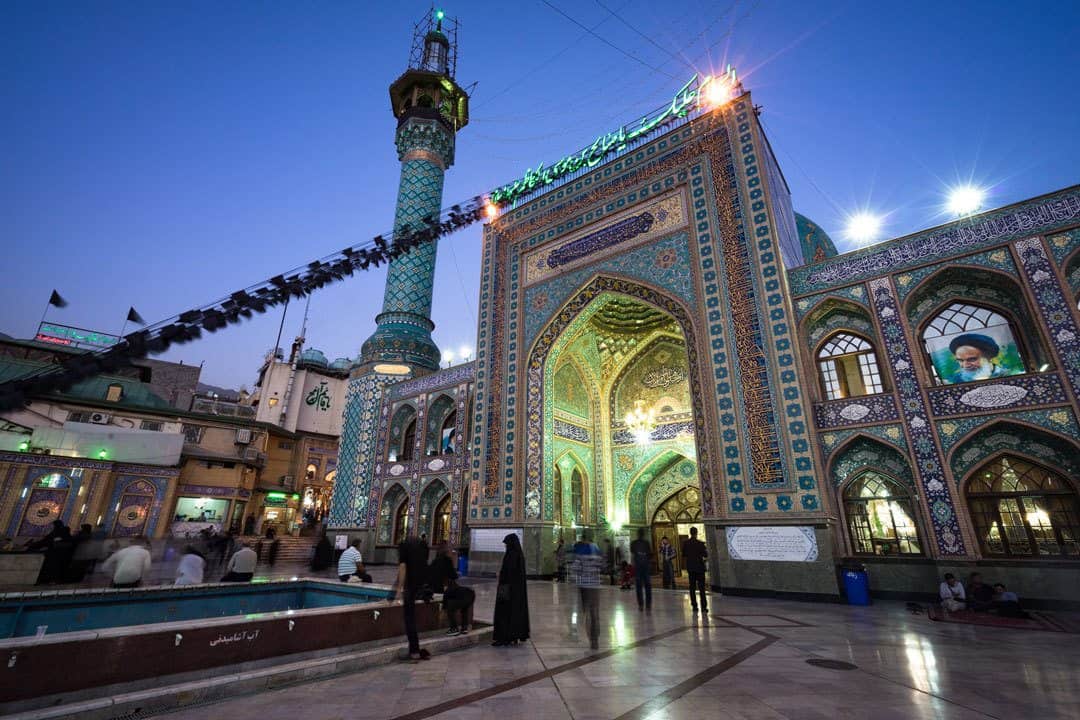
Table of Contents
Iran is Safe!
There’s a lot of customs to follow, you need a visa for iran, have a head scarf in your carry-on luggage before arrival, bring a phrase book or have google translate on your phone, bring a lot of cash, the currency has two names, bring comfortable footwear, research the food and don’t just eat kebabs, bring a backpack rather than a suitcase, draw up an itinerary, but keep it flexible, let your guard down and talk to locals, always ask the price before buying, book domestic flights with your accommodation or travel agent, team up with other travellers and share tours, be on time for your appointments, the traffic is horrible, you need a vpn to access some social media platforms, there is wifi, but be patient with it, pick up a local sim card, iran has its own uber called snapp, you can drink the tap water, good coffee is hard to find, there’s a female-only carriage on the metros, what to know before you visit iran.
The truth is travelling in Iran definitely has its quirks, and being an Islamic country means there’s a few things you need to know about the religion and culture before you go so you can show absolute respect.
Luckily these are easy enough to know before you go if you do a bit of research. We spent one month travelling around Iran and learnt so much during our time there.
To help put your mind at ease about travelling in this incredible country, here’s our list of the most important things to know before you visit Iran.
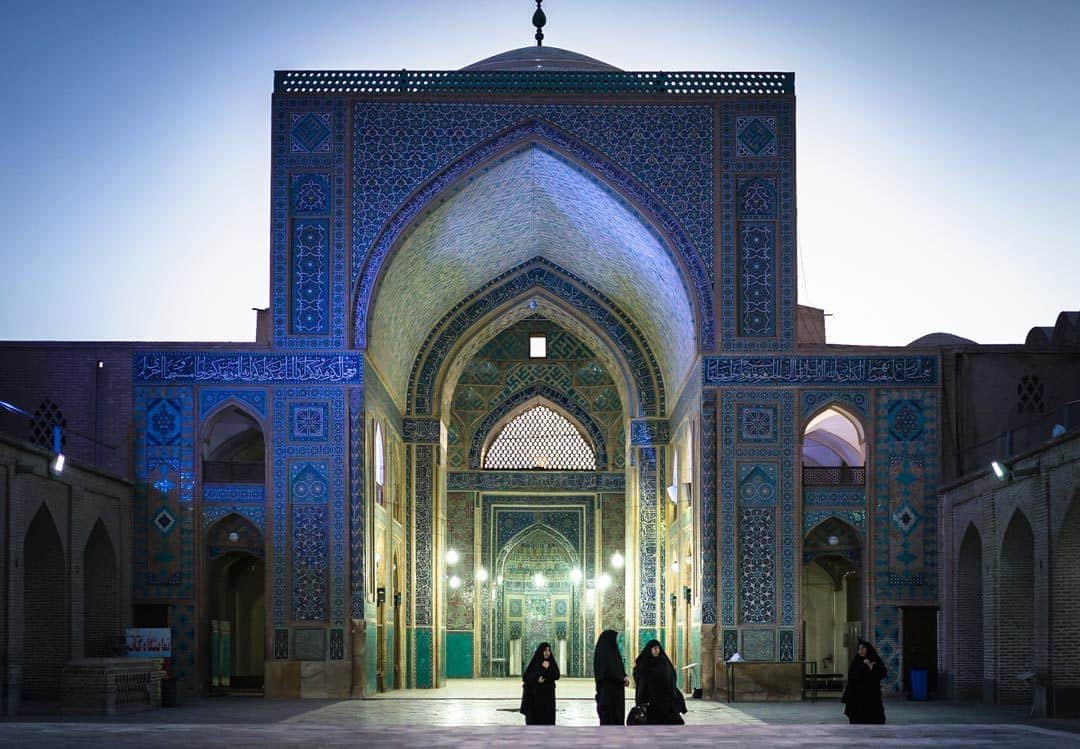
All of the mainstream media outlets portray Iran as an unsafe country, somewhere that you’ll be at risk if you visit.
The mainstream media is wrong.
We did not feel unsafe once through the whole 4 weeks of us backpacking independently in Iran.
We weren’t with a tour group, had no tour guides, don’t speak the local language, took public transport and taxis, wandered the streets on our own – basically everything you shouldn’t do if you’re in a dangerous country.
And guess what? Nothing bad happened to us at all!
The Iranian people are so friendly and helpful. They want you to have a great time and tell your friends so more people will come and visit.
We were walking around one morning on a quiet street when a car passed us and turned around. A group of young people stopped the car, came up to us, and asked if we were ok or if we needed help.
Once we told them we were just looking for a coffee they pulled out their phones and started showing us where the cafes were on a map.
They even offered us a ride, and said if the cafes were closed they had coffee at their home and would love to make us some.
This is just one example of dozens of interactions that happened to us when we were in Iran. Iranians love that tourists are coming to their country and travelling around.
The locals know what the media says about them and what a lot of the world thinks of their country, and the people just want to show that they are nice, generous people.
Theft against tourists is very rare and even the Religion Police (secret police) tend to leave tourists alone.
Just be careful around the bazaars and crowed places for pickpocketing. We didn’t have any issue and didn’t hear of any other travellers having problems, but this is common sense in any busy place in the world.
With all that being said, there is a large military and police presence in Iran. Do not photograph any military areas or government buildings, and stay away from any protests if you see them.
Obviously there are some areas of Iran that are no-go zones, such as the borders of Afghanistan, Pakistan and Iraq, so do your research and talk to locals if you’re thinking about going anywhere near them.
When you travel somewhere you want to take in everything about the country and its people, and that includes the culture and customs.
Iran has quite a few local customs that may take some getting used to, so it’s important to learn about them before you go so you don’t accidentally offend or disrespect anyone.
Some of the most common ones that throw tourists off are:
- Women must wear hijabs (headscarves) at all times in public. They must also wear loose-fitting clothes that don’t show their figure.
- Giving a thumbs-up sign is considered rude, similar to giving the middle finger in Western society.
- Men can wear short-sleeved shirts, but long pants must be worn at all times.
- Men and women who aren’t related shouldn’t touch either. That means no shaking hands or hugging someone of the opposite sex.
- If you are travelling with your significant other, avoid any public displays of affection.
- Always bring a gift if you are invited to someone’s house. Candy, pastries or flowers are fine.
Now we want to give a special mention to ta’arof – This is a hospitality trait where it’s customary for someone to refuse payment for a service, and is probably the most confusing thing for any tourist to get their head around.
Basically what happens is if you make a purchase (a souvenir, taxi ride, etc), the person may refuse your payment out of politeness. It is then up to you to insist despite their refusals that you want to pay. After two or three times they’ll then accept your money.
If they still keep refusing then perhaps you have just experienced some amazing Iranian hospitality! But chances are they’ll accept the payment once the process has been completed. Don’t worry, you’ll get the hang of it.
The locals are so lovely, that if you do something wrong someone will approach you and nicely let you know. For example, if you are a lady and your headscarf falls off without you knowing, a local will kindly let you know.
Don’t stress about getting your outfits beforehand as shopping in Iran is cheap. Just bring one headscarf and set of loose-fitting clothes, and buy more once you get there.
The culture is the best thing about visiting Iran, and after a few days, you’ll start to understand and fall in love with it just like we did.
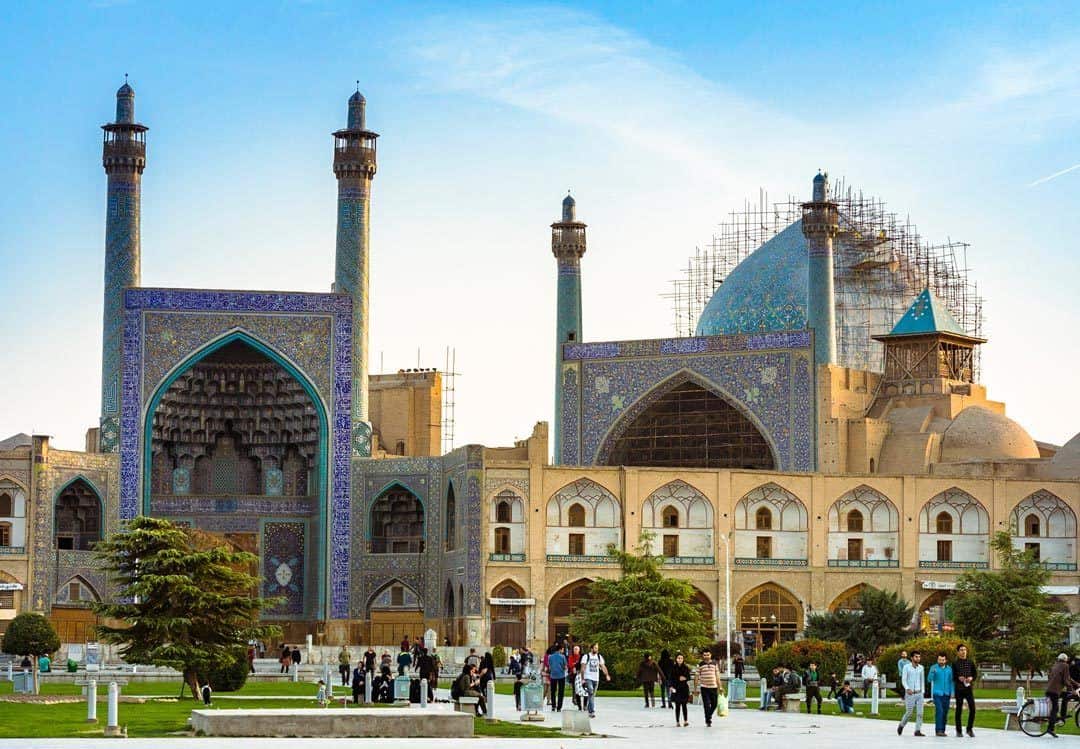
In order to visit Iran, you’re going to need to get a tourist visa. This used to be a very difficult process, but luckily things have gotten easier with the introduction of visa on arrivals in 2016
On the 14th February 2016, the Ministry of Iran announced that citizens of 180 countries can now apply for VOA of 30-days at most international airports, including Tehran, Shiraz, Mashad, Tabriz and Isfahan.
There’s an exception to this rule though, and if you are from Canada, the UK or the USA, we have some bad news for you…You can only visit Iran if you join a guided tour, so no chance of getting a VOA and travelling independently.
Your tour company will help organise your visa for you.
Check out our article on how to apply for a Visa On Arrival in Iran.
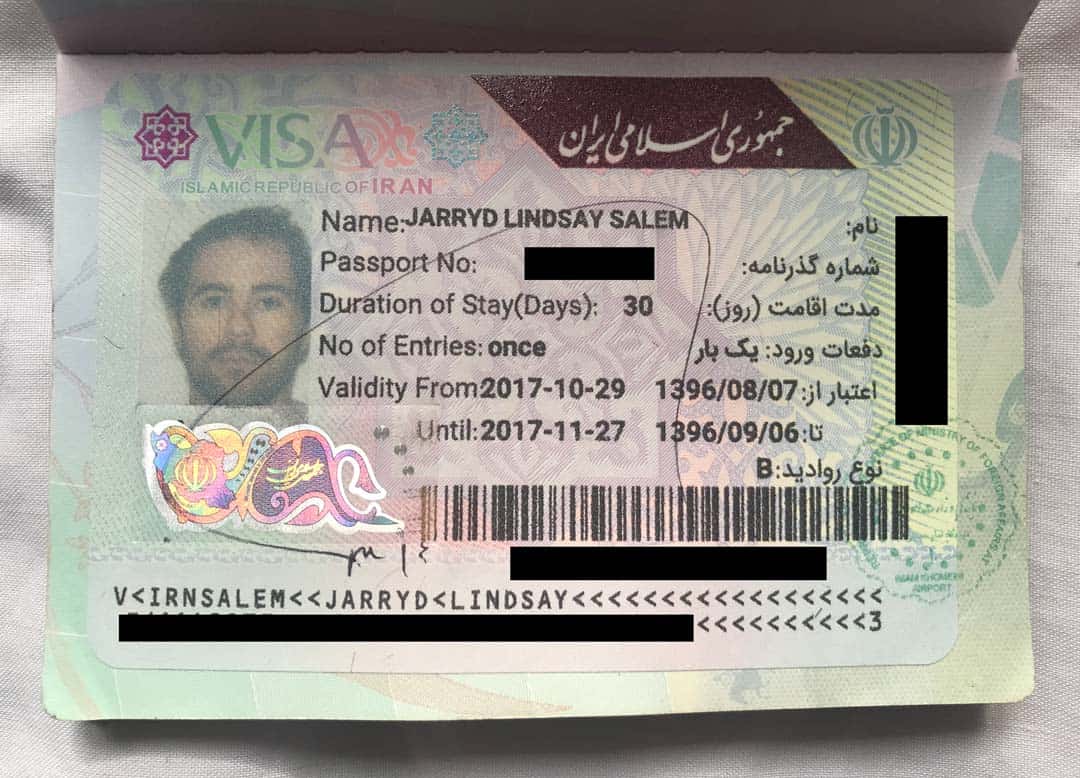
You Need to Dress Appropriately
This follows on from the customs section above, but in a bit more detail.
Iran is an Islamic country, and as such you need to follow the Islamic dress code. Here are some things to keep in mind.
Women need to cover their arms, legs and head. This including a Hijab, loose long length shirt with long sleeves and pants.
Leggings or tight jeans are ok as long as your top is long and covers your bottom. When wearing pants, you need to be covered down to your ankles.
The most common way to cover your head is with a scarf. The local women wear bright colours and are very stylish with their clothing, so don’t think you need to wear all black.
Black is still worn a lot but not so much among the younger generation.
You can wear sandals. Some guesthouses and hostels will allow you to take your headscarf off on their premises but do check first.
Men aren’t allowed to wear shorts in public, so bring long, lightweight pants as the best option. T-shirts are fine to wear in public. Men can wear sandals too.
If you do wear inappropriate clothing it’s not the end of the world, and besides some angry looks from some of the older generation, you’ll probably just end up having a friendly local let you know what’s best to wear.
In Tehran, the locals push the limits in terms of what they wear in public. At the end of 2017, an uprising occurred and supposedly women were no longer required to wear the Hijab in public in Tehran, but wait until you are in the country to find out for certain.
When you land at the airport, it is respectful to put a scarf straight on your head ladies. This will cause no trouble for you by locals or the officials at the airport.
Once you’re in the air on an international flight you’ll see most young ladies take their hijab as soon as the plane leaves the ground. Just follow what the locals do.
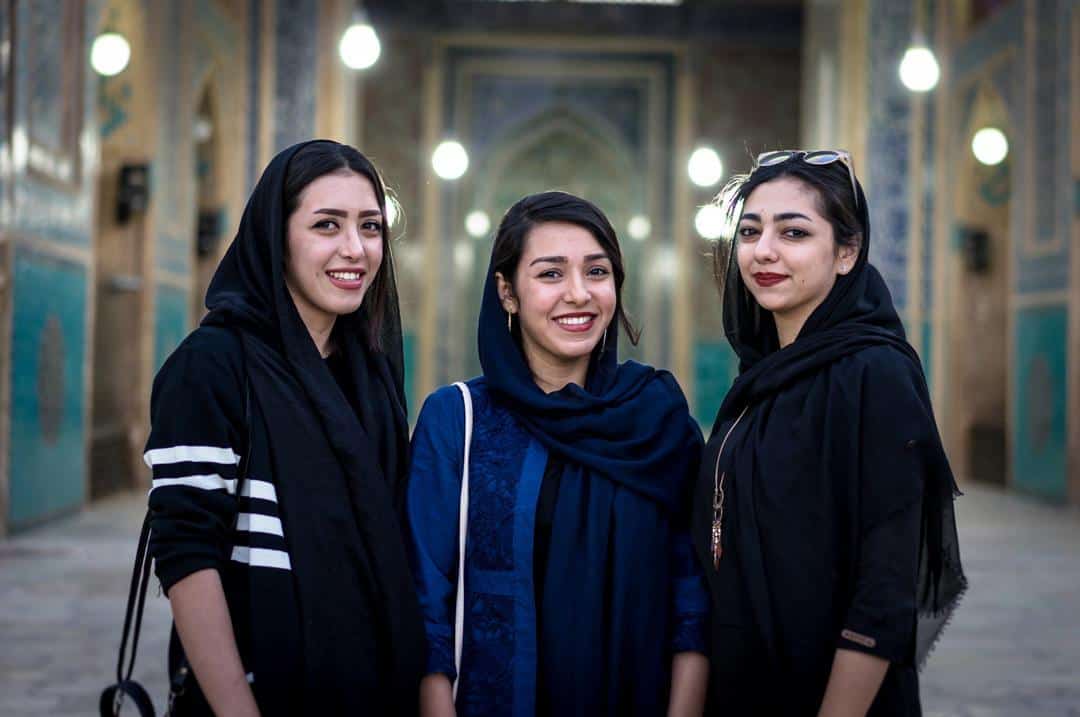
We were quite surprised to discover that a lot of Iranians could speak a little bit of English, but that wasn’t always the case, so do yourself a favour and bring along something that can help translate English to Persian.
We always travel with Google Translate and offline languages saved on our phones, but at times having a phrasebook is the best (and most social) way to interact with people who don’t speak any English.
Remember, you are in a country that doesn’t have English as an official language, so don’t be that rude tourist that gets upset if people aren’t understanding you.
Persian (Farsi) is difficult, and no locals expect you to learn much beyond hello and thank you while you are there, but do your best anyway as a few extra words will go a long way in showing respect.
Also don’t be surprised if you are constantly invited out for tea with people so they can practice their English. If the opportunity comes up, make time for it, as it’s an amazing experience for both the local and yourself.
Don’t forget your cash when visiting Iran, as none of the ATMs in the country accepts foreign credit or debit cards thanks to the embargo. So if you forget to bring all of your cash for your entire trip, you’re out of luck.
Figure out what your usual budget is for a trip ($50 a day, $100 a day, etc), then bring a bit extra just in case. USD is best for all around the country but Euros and British Pounds are also accepted in Tehran.
There’s two exchange rates in the country – official rate and black market rate – and the black market rate is of course much better.
We actually found an exchange booth at Tehran airport that gave pretty close to the black market rate, so we traded some cash there.
As a tip don’t exchange all of your foreign cash into Rials at once, because you’ll either get ripped off on the exchange rate back if you have any left over, or you’ll be unable to trade it outside of the country.
Also don’t be too concerned about travelling around with thousands of dollars in your backpacks. As we mentioned earlier theft is rare. Do keep your money stashed in different spots though just in case.
UPDATE: If you’d prefer not to carry all your cash with you, can actually pre-order a local Iranian debit card from the company, Mah Card . It works just like a normal debit card in your home country.
You order it on their website and they’ll deliver it to your hotel in Tehran when you arrive. They have an online system too where you can top up the funds if you’re running low.
Use the code ‘ NOMADASAURUS ‘ at check-out to get a 40% discount on the card when ordering. Instead of a 19 Euro issue fee, our code brings it down to 11 Euro.
“Toman or Rial?” Get used to asking that question, because if you don’t it could end up being a costly mistake.
The currency in Iran is officially known as the Rial, and is valued at roughly 30’000 IRL to USD$1. That’s a lot of zeros, so what the locals have started doing is dropping a zero and calling the new value a Toman.
1 Toman = 10 Rial
When you hear prices quoted in Tomans you need to add a zero on the end and pay the amount in Rials. It sounds confusing, but you’ll pick it up pretty quickly.
That’s why it’s important to always ask Toman or Rial, so you don’t accidentally pay too much on an item. Most vendors quote in Tomans anyway, so chances are if the price seems too good to be true, you need to multiply it by 10.
Rumour has it that Iran will officially introduce Toman as a currency in the coming years, but that hasn’t come into effect yet.
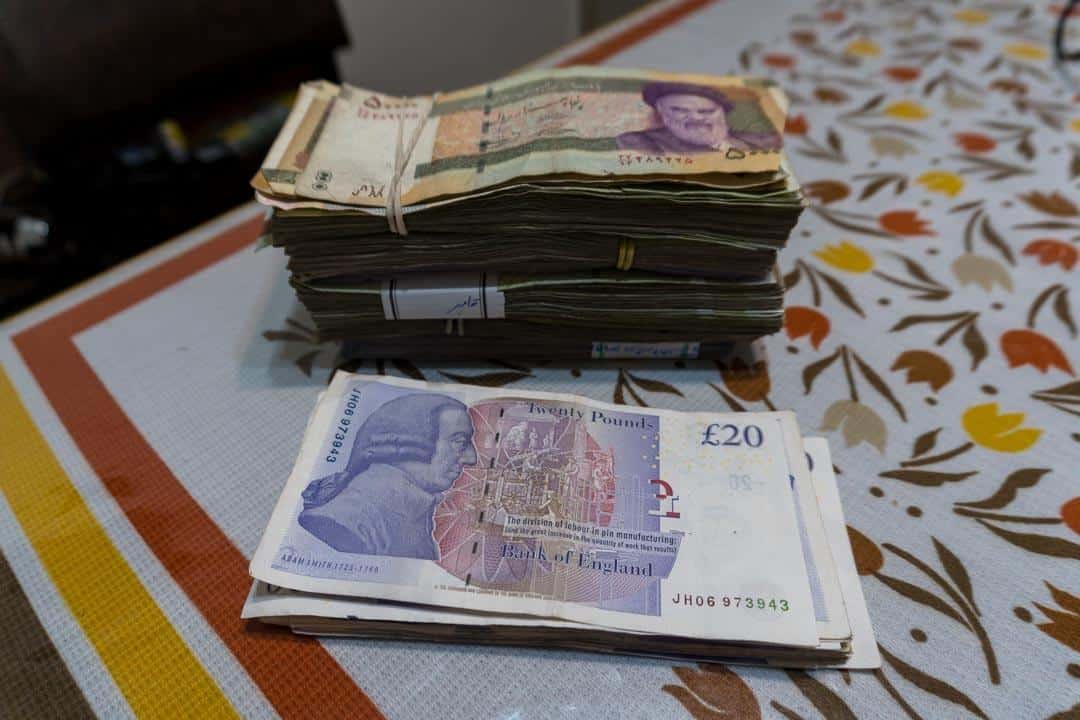
You are going to do a lot of walking in Iran, so bring comfortable footwear. The towns here are so amazing that you’ll probably end up walking at least 10km every day, so look after your feet.
These don’t necessarily have to be hiking boots (unless you’re planning on doing some treks). Just make sure you have some flat shoes that you can wear all day without a problem.
Don’t bring heels. You don’t need them, and you won’t wear them. We had a pair of hiking shoes each and a pair of sandals. That was perfect.
Persian food is varied and delicious, and there’s plenty of different styles to try, so be adventurous!
Most people travelling on a budget will end up eating falafel sandwiches when they’re in Iran because they are cheap ($1 !), filling and delicious, but there’s plenty more to Iranian cuisine then just kebabs.
We don’t consider ourselves to be foodies, but luckily we were travelling with our good friends Dan and John and they are all about culinary travel, so they had a huge list of food they wanted to try. And boy were we thankful they did!
They had looked up the different types of food they wanted to try, so we basically followed their advice and tried it all. Of course, it was super delicious too.
One particular dish we all loved was dizi. It’s quite confusing how to eat the first time, so we had the restaurant owner show us how to mix and grind all the ingredients. If she didn’t show us, we wouldn’t have a clue how to eat it.
If you are a vegetarian, there are food options but they can be limited. There is a lot of eggplant, lentil and chickpea dishes. There are simple salads and rice also.
Try to get away from the popular tourist areas as well, as the prices are going to be a lot higher than the average place.
Move away and you will be surprised how much the price drops, and the portions are larger. If you are passing a local restaurant and it is packed with locals, that is going to be a winner.
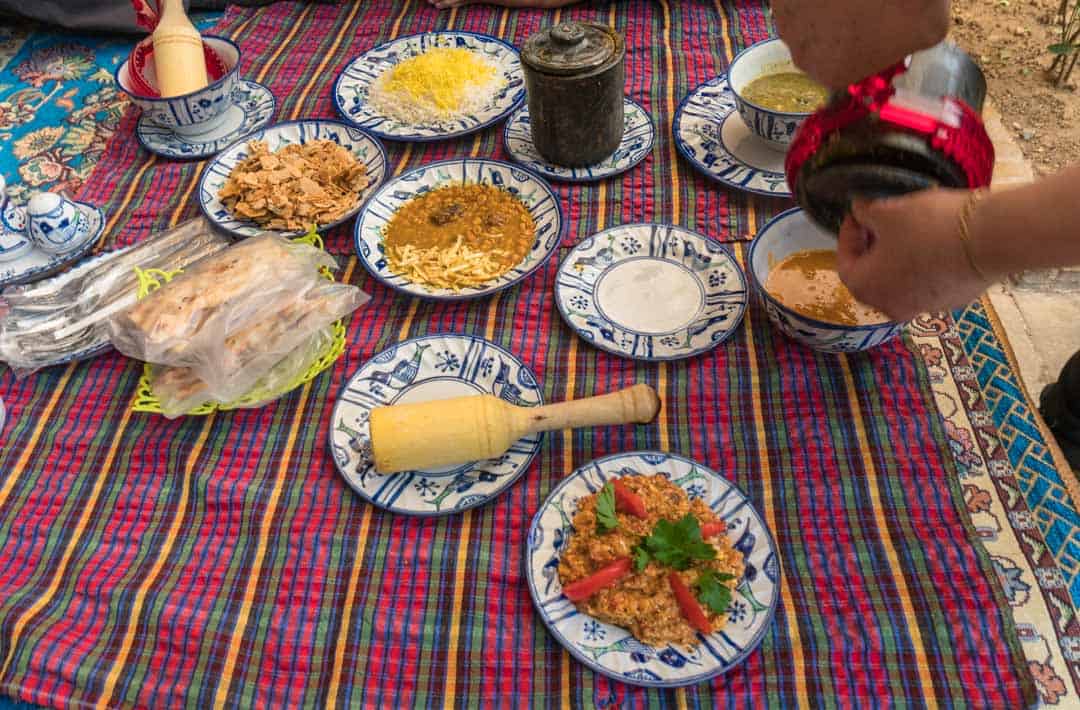
We always recommend people travel with a backpack rather than a suitcase, but this is especially useful when you visit Iran.
The road and paths are uneven, and wheeling a suitcase would be a nightmare. A lot of hotels don’t have lifts, so unless you’re feeling strong it’s going to be hard to carry your suitcase up a lot of flights of stairs.
Always choose a lightweight backpack that fits you perfectly for the best support.
There are also hybrid backpacks, that have harnesses and wheels on the bottom for the times where you just don’t want to carry it.
Unless you are on a whirlwind 7-day trip of the country we recommend you design an itinerary of what you want to see and do, but don’t book anything until you are in the country.
Iran is one of those countries that is best to research beforehand so you can make the most of your time and you don’t miss anything, but don’t be surprised if some places you end up liking more than others.
Be willing to change your plans if you get somewhere that you want to stay an extra day, or if you meet a backpacker that raves about one town you hadn’t considered before.
Don’t stress about booking buses, flights or trains before you arrive. Everything can be booked in-country, for a much cheaper price than you’ll find online.
By not locking in your travel plans, you can change and swap your itinerary easy enough.
Disclaimer: The one time that you may need to book everything ahead of time is during Nowruz, which is the Persian New Year. If you’re planning on travelling to Iran during this time (it happens around the spring equinox in March) you’ll find things are extremely busy with millions of locals travelling around the country to spend time with their families too.
Looking for somewhere else to check out when you visit Iran? Don’t miss our article on the best things to do in Shiraz!
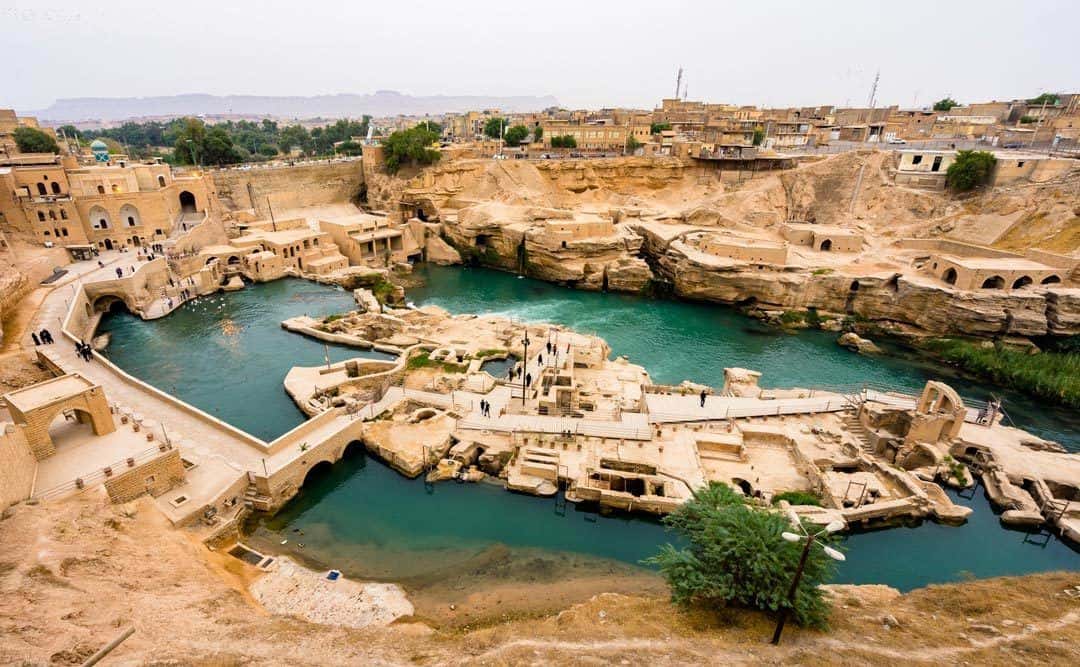
One of the best experiences you will have in Iran is spending time with all the friendly locals. And trust us, you’ll get plenty of opportunities if you are open to it.
The city squares are usually where locals will approach you to welcome you to their country, have a chat and practice their English.
Don’t shy away from this, even if you are a solo traveller. We found out so much information about Iran and how the locals live simply by chatting away.
Most people asked us questions about where we are from and were very happy to answer our questions. It was a true insight to Iran and we made some beautiful friends from it (many of whom we still keep in contact with).
Don’t be surprised if you get a lot of invitations to people’s homes as well, and this may be one of the few countries where we’d say hanging out with strangers is highly encouraged. The Couchsurfing scene is huge here too if you’re into that.
Do be wary of some people who will take you to an expensive tea house though. They are nice people, you will have great conversations, but they can be a little cheeky.
Also always look at the menu before you start ordering to make sure they haven’t taken you somewhere that has crazy prices.
Some will invite you out and try to sell carpets to you. If you are not interested just be firm and move on with the conversation.
We only had this happen to us once out of more than a dozen great experiences, and once we made it clear we weren’t buying a carpet we still had a great chat with him.
There is only one thing with all this – Expect to be stopped every few minutes by people wanting to chat! Make sure you’re mentally prepared when you go out around town to have a million friendly conversations.
You shouldn’t just do this in Iran, you should do this everywhere you travel, but it’s important to keep in mind.
In some countries, there are tourist prices and local prices. To be honest, we almost never felt ripped off here, but it did happen occasionally.
Before you buy anything, whether it’s a souvenir, a meal, a pot of tea, a tour, a taxi ride or whatever, ask to see the menu or how much it will cost to avoid any unpleasant surprises.
Get out of the tourist squares too. Chances are if you walk a couple of blocks outside of those popular areas, the prices will drop dramatically.
When buying survivors, ask the price at a few places, get the vibe from the person/place and then buy. Try your bartering skills, but don’t be offensive.
We always try to settle in the middle so both parties are happy. This is their business and they need the money more than you do.
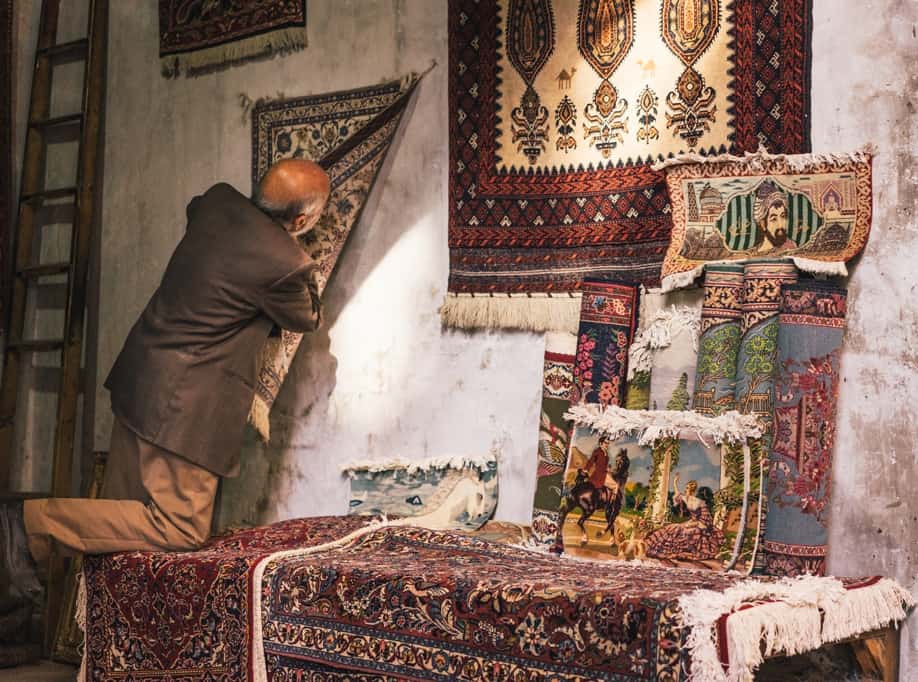
If you are flying domestic, book through an agent or your local guesthouse in the country. All the local airline pages are in Persian, and these are where the best deals are.
Online booking agencies like Skyscanner and Momondo will not bring up these flights. We were in the west near the Iraqi border and wanted to fly to Tehran. Our local guesthouse helped us out and we booked it for $50 USD including snack and bags.
They were charging $200 USD on one of those online booking agencies above. We never were questioned at the airport about the local price and everything went smoothly.
If you’re not travelling in a group of four, ask at your guesthouse or talk to other travellers to see if you can share the cost of a driver with them.
Sometimes hiring a driver between towns as private transport would work out to be the same price as 4 bus tickets. You get there faster and can stop when you like along the way.
This will save you money and you might even make some awesome friends out of it.
Iranians are very punctual. If you plan to leave for a tour at 8am be in reception at 7:45am, and the driver will most likely already be there.
Buses and trains also won’t wait for you if you aren’t there. The last thing you want to do is miss your tour because you slept in or hadn’t packed yet.
If you’re heading to the airport, bus or train station make sure you leave plenty of time in case of bad traffic.
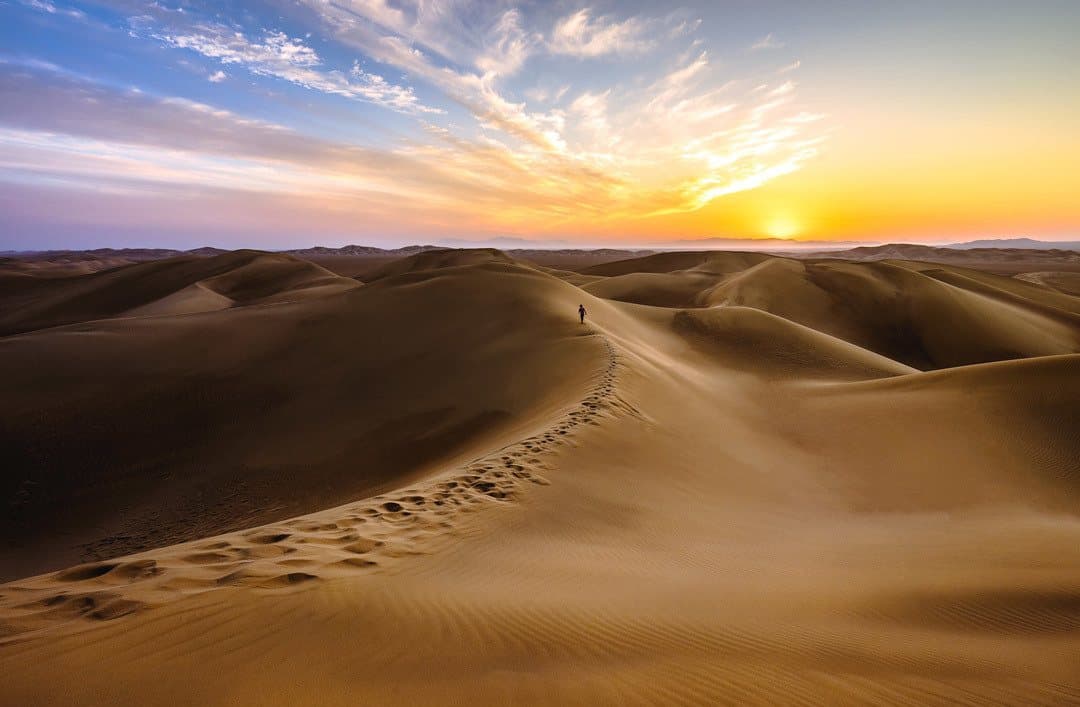
When we say horrible, we’re being polite. The traffic in Iran is actually insane.
If you’re exploring Tehran don’t be surprised if you have plenty of “Holy s**t!” moments as you go to cross the street or you get around in taxi.
It’s not that Iranians are bad drivers…they just don’t have a concept of space when driving around. In one way it’s almost as entertaining as it is scary.
No one is actively trying to run pedestrians down, but if you do try to run the gauntlet of crossing a busy road it’s best to wait for a local to join them on their hell-bent journey to the other side.
Some social media platforms are banned in Iran and you cannot access them without a VPN (Virtual Private Network).
You cannot access Facebook, Facebook Messenger, Twitter, YouTube or Pinterest. You can access Instagram , but the rest only with a VPN.
We used ExpressVPN and had no issues. Here is a link to get your first 30 days for free .
Make sure you download your VPN before you arrive in Iran, because a lot of the VPN sites are blocked by the government.
If you can, we also recommend having access to a few different VPNs, because every now and then one might be blocked in Iran.
ExpressVPN worked for us during our trip, but some people have reported that it didn’t work during their own trip. Last we heard it’s back up and running properly now though.
Most of the guesthouses we stayed at had free wifi, but don’t expect it to be fast.
Some hotels had wifi available in the rooms, while others were only in the reception area or dining rooms. It all depends on how upmarket your place is. In popular cities, tea and coffee houses had wifi also.
One thing to keep in mind though is that just because there is wifi at your hotel, be respectful on how much you use it.
There are no unlimited data plans in Iran, so the hotels have to pre-purchase data in small packets.
Please don’t be that person that streams Netflix or tries to download the new season of Game of Thrones, because all that will happen is you’ll end up using all the net for everybody else in the hotel, and cost the owner more money.
Yep, we met a guy that did just that in Varzaneh, and because it was a weekend it meant nobody in the hostel could get internet until Monday. Thanks, mate.
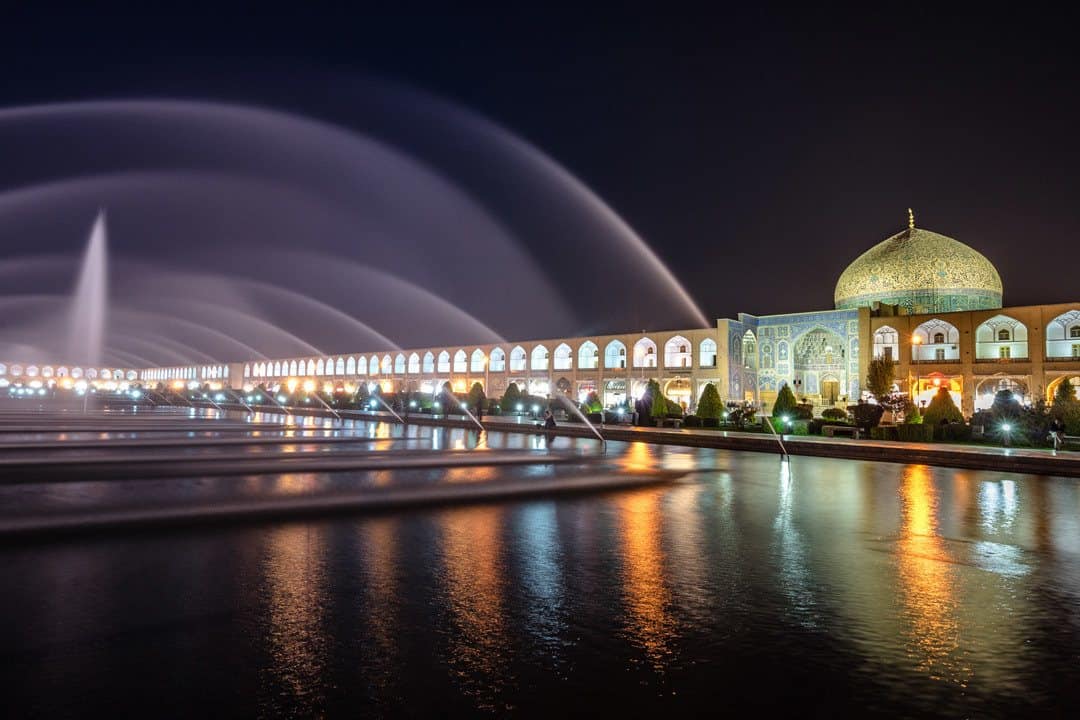
Despite what you may have been told, you can buy a local sim card in Iran as a foreigner, and it’s a great idea to do so.
This way you can call hotels to make bookings use WhatsApp and Snap (more on that below) on the go, and keep in touch with friends and family back home.
We bought up a sim card with the telecommunications company IranCel through our hostel in Tehran, however, they marked the price up by double.
We found out later that you can buy sim cards at the airport or at any store, so our suggestion is to do this yourself.
When going into the phone store bring your phrasebook or a local friend. You will not need to show any ID, just pay in cash, but it helps to have your passport with you just in case.
You can top up at little general stores that display the IranCel sign. They will do it all on your phone and charge a small fee for their time. Please don’t argue with that, it’s maybe 25c USD.
We were getting 5GB of data for about $10 USD.
There is an app in Iran called Snapp, and it is similar to Uber. It’s a rideshare app where drivers register and customers can order cars to get around town.
This was a lifesaver for us!
What makes Snapp so great is that a price is determined by the app and you pay in cash once you get to your destination. There’s no metre, so the driver will take the most direct way possible.
When you book it you’ll get the driver’s name, their car model and their registration number, so you know you’re getting in the right vehicle.
Yo drop a pin on a map for where you want to go, so there’s no need to try and explain it to the driver in case he doesn’t speak English (or your pronunciation is crap).
The other added benefit is you can rate the drivers afterwards, so they are more likely to be honest rather than a taxi driver.
The only thing is you cannot easily download it onto an iPhone, as Apple is an American company and does not support Iran. It doesn’t show up in the App Store.
If you go to the Snapp website you can download it to your Apple phone through a special link there. Downloading it on an Android phone is easy with no issues.

This one was a big surprise to us, but you can drink the tap water just about everywhere in Iran.
It’s totally safe to drink, even if you’re new to the country, so don’t worry about buying plastic water bottles everywhere you go.
Bring a reusable water bottle instead and simply fill up as you go.
Don’t drink river water tough if you are out hiking.
Iran is a nation of tea drinkers, so it’s no surprise that you’ll get delicious fresh tea for cheap (or free) just about everywhere.
But what about us coffee drinkers??
The bad news is that getting good coffee is very hard in Iran. Despite their close proximity to places like Turkey, the coffee culture phased out years ago and so now the best you’ll find is usually those horrible instant packets.
There is a silver lining though, and some entrepreneurial locals have discovered that coffee is basically the second greatest thing on earth (after a delicious IPA, which you also can’t get in Iran), and some Western-style coffee shops are popping up in major towns.
They’re not cheap, but when you need that caffeine hit in the morning it’s totally worth it.
When you catch the metro around Tehran or Esfahan, there are carriages designated just for women, which is great if you’re a solo female traveller.
These are basically sections that males aren’t allowed in to stop accidental touching of non-related mixed genders, but it also adds a sense of security for women taking public transport.
Occasionally if the mixed carriages are full you’ll see one or two men in the female ones, but they tend to stand next to the door away from everyone.
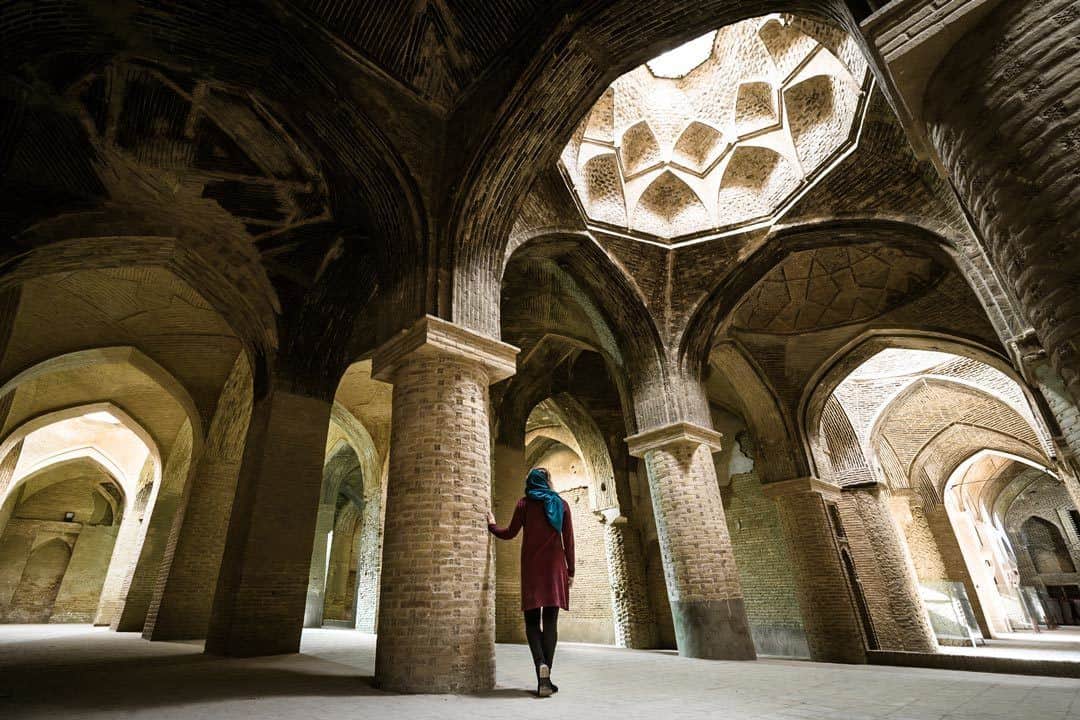
[box] Those were just some of the things you need to know before you visit Iran. Has the article helped you? Do you have anything else to add? Leave a comment below and let us know![/box]
Alesha and Jarryd
Hi, We’re Alesha and Jarryd!
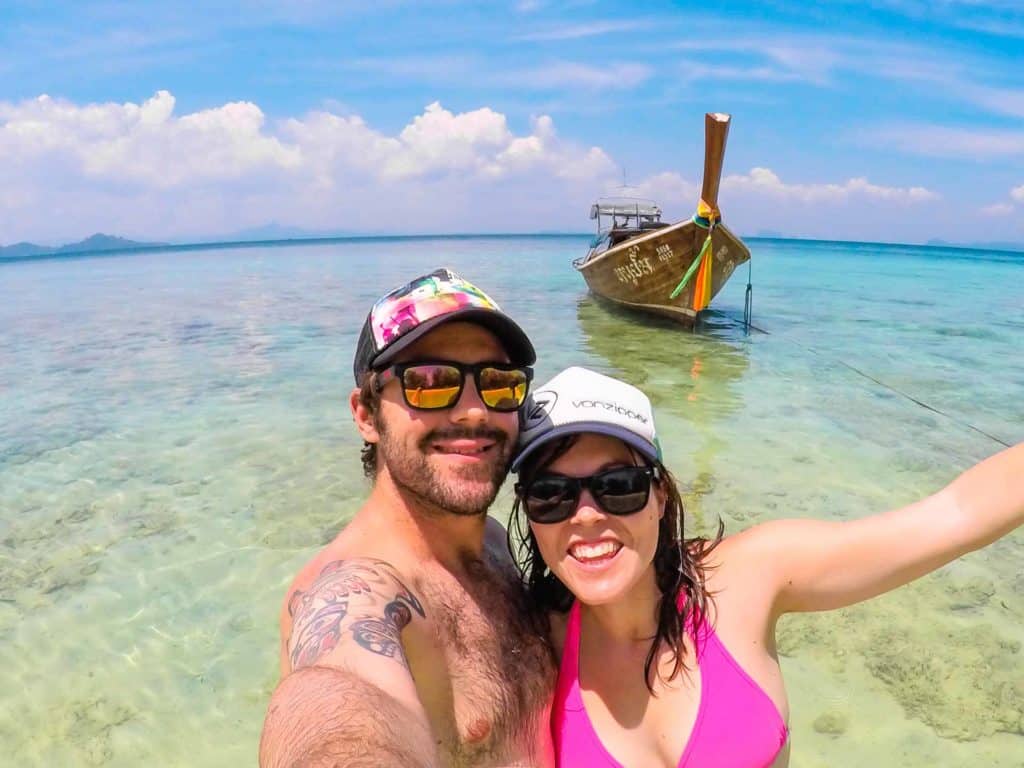
We’ve been traveling the world together since 2008, searching for the planet’s best destinations and adventures.
Love Travel?
Sign up for our free weekly newsletter for the best travel tips, ideas and deals!
We respect your privacy. Unsubscribe at any time.
READ MORE...
Cape Fahn Hotel Review – The Best Luxury Resort on Koh Samui
Quark Ultramarine Review – Best Polar Expedition Ship [2024]
30 Awesome Things to Do in Easter Island
Related Posts
Wineglass bay walk and hazards beach circuit hiking guide, 17 awesome things to do in prague, czechia, the ultimate guide to skiing in kyrgyzstan (2024 edition), your guide to the top vivid sydney photography tips and locations, 105 thoughts on “25 things to know before you visit iran”.
Hello friends, I read your comments and I wish I could say that I am happy that you think so naively about the Iranian regime, but the truth of Iran and its people is not what these friends say, and unfortunately the bitter truth is that all those media that They present this regime and the leaders of the Islamic Republic as terrorists and a bunch of dishonorable and inhuman people, they are telling the truth and only the oppressed people of Iran understand this! you can ask them. But for you tourist friends, yes, this country can be a paradise because your money is worth many times more than ours, and not you tourist friends, but the unfortunate people of this cursed country feel the pressure. Our only wish was to have normal rights and a normal life like you, but this regime stole that life from the people of Iran and blackened the lives of the people of this country. Hoping for a day when this terrorist regime, which has made the Middle East and the whole world insecure, will be destroyed and we Iranian people have good and sincere relations with the people of other countries of the world . That day we will have at least a normal life and the world will not recognize this country as a criminal terrorist country. Written by a 27 young Iranian.
hi I want to just say now ( 2023-15-11 ) that the US dollar is 510000 Rials and here is heaven for people of countries where the currency is the dollar and Iran just is Hell for local people thanks to the Iran government for this situation!!!!!!
Hi dear Alisha and Jerry My name is Raziyeh. As an Iranian, I wanted to express my sincere gratitude for your kind words and appreciation of our beautiful country. Contrary to media propaganda, Iran is safe, and Contrary to media statements, we are hospitable and genial people who do everything to ensure you have a fun time in Iran. Please do not believe the lies that social media tells about our country. We’ll be happy to see tourists and give information to them. I hope you revisit our country. Best regards, Raziyeh.
Hi everyone I’m from Iran. I’m happy that you liked your trip to Iran. Iran has a lot of museums and attractive places if you’ll come you should visit them. And we’ll be happy to see tourists and give informations to them.
Iran is an extremely lovely place to travel. Thank you for the trip advice. I adore your article.
For foreigners especially Westerners Iran is a very dangerous country. There is a high risk of being arrested on fake charges. Atleast 50 foreigners have been arrested recently and sentenced without a fair trail. The “friendly” citizens of Iran will not help you out unless you pay them witg Euro or Dollars…..
Well! I accidentally found this while surfing the net, and it’s a bit sad that each dollar is 450000 Rials… People are still friendly to tourists though, no matter how hard our lives are. I hope you visit our country again, after all these sad events, of course.
22 days later and its 510000. when will these evil leaders leave us alone
We are glad that you were satisfied with your trip.You pointed out great points like someone who has lived inside for years… Our people believed, but the government has crushed the people so much under the economic pressure that they have become a little unfair to each other. Be sure to use SNAP inside Iran.. Be sure to check the price before buying.. Our common currency is Toman and Rial is nominal. For example, now every 1 dollar is equivalent to 33000 Tomans.. To eat a pizza, you need 6 or 7 dollars.3 cents are required for 1.5 liter of taqriya water.. If you have an acquaintance in Iran, you can be much easier.. Don’t pay too much attention to the capital because it has very beautiful cities with a very old history. Thank you for choosing which country for your trip. Good luck
Thank you for the excellent information and for taking an interest in the lovely country. really nice tips for visiting Iran.
I’m glad you liked Iran. Unfortunately, due to the difficulty in managing economic affairs, the Iranian people suffer from the high cost of goods. Now each dollar is equivalent to 277,000 rials, which is really terrible, of course for our people! Of course, Iran is still full of beautiful places and amazing places! I hope you have good trips …❤
Hi guys I am Ava. I am from Iran/ Isfahan. If you want to come to Iran I would be happy to help you. I have a beautiful Iranian old house.
Can you please write about traveling in Iran at the moment. I would be traveling on a New Zealand passport. Thank you. Evan.
Iran holds many surprises for visitors; like the climate which can fluctuate greatly, depending on the area and time of year, dispelling the long-held myth that Iran is nothing more than a vast, sweltering desert. But Iran is a historical place and i like to visit this type of places that is why few days ago i read this type of article on another site it contain huge information. While some surprises are nice when travelling, it’s important to be as well prepared as possible.
Is $1000 for 7 days visiting 5 cities everything included except airline tickets a reasonable price? Please let me know what you think! Cities included are Tehran, Yazd, Esfahan, Shiraz, and the desert side with Caspian sea. Thanks,
Definitely if you stay at budget accommodation, take public buses as transport and not eat at fancy restaurants. Have a good trip
it’s very good
Indeed it is 🙂
I am Iranian. You described Iran very well. I am glad that you visited Iran
Thank you for your comment Masoud. We really enjoyed travelling around Iran. 🙂
Hi Thank you for your essay about Iran. As an Iranian I do hope you have good memories generally from Iran. No country is perfectly free of any trouble but please do not believe propaganda against Iran unless you travel to Iran and live with Iranian for a couple of weeks (at least) and then judge.
Hi there! I’m an Iranian, and i’m REALLY happy that you loved our country! I hope other tourists enjoy their travel to Iran, and I wanted to say, that Pinterest doesn’t need VPN! 🙂 And also about hijab, if you’re thinking that it’s gonna make you struggle, well, it definitely isn’t. I mean, it’s not such a big deal, and you’ll get used to it and continue enjoying! Anyways, hope you like our country
Reasons for a Group Visit to Iran Experienced travelers may want to look away. Guided tours can really be the best option for some travelers going abroad. Of course, they limit you a little and lose a little freedom. You will not have enough time to fall in love with a place and you will not have enough time to stay there, and other companions may not be with you. But no matter what the veterans might say, there are good reasons to tour for those who want to.
Salaam All, I’ve travelled extensively in the Middle East (Egypt, Palestine, Lybia, Qatar, Dubai, Saudi Arabia, Iran and India. My wife, daughter and myself went on holiday to Iran in 2012 and 2015 (for my 60th birthday). An Iranian couple came to sing happy bithday to me in farsi. It was an inexplicable experience, no crime on the street, no fighting, very, very safe, people very friendly and warm, food and confectionary very good, not expensive to shop but hotel accommodation could be expensive, public transport (bus and metro rail) very good and effecient, metro stations very clean and very easy for foreigners to use. Although we were based in Northern Tehran (Eliheyah), we once drove by luxury coach to Ishfahan to spend one week there (2012), the other trip we flew to Shiraz to spend one week there (2015). I fell in love with this country, it’s absolutely beautiful. In Tehran, we even went in the cable cars on the Azborg mountains. O, I just cannot stop raving about IRAN. I’ll visit there anytime. Please don’t believe the media with their negative reports, go see for yourself and discover this amazing country. Salaam from Riedwaan Salie (Cape Town, South Africa.
That is so nice. What a great birthday trip. We are so glad you had a wonderful time with you family. We found the country very welcoming and friendly also. Thank you for your comment. 🙂
Your itinerary was perfect! I hope you come back again very soon! I heard now you should ask for visa only from agencies. Also now for your money matters you can use a local debit card like Daricpay to charge and transfer money online
We hope to visit again one day. Take care
Hi Im am an iranian person and your information was totally correct about iran I am very glad to see you were anjoyed traveling to iran If you come to iran again you can visit other cities like shiraz,Tabriz,Isfahan,Hamedan they are as beautiful as Tehran
Thank you so much for your comment. 🙂
Hi all, I have been 2 weeks in Iran the last month, my friends and I were travelling the west part of this huge country touring the famous cities and recommended places over the countryside. I could never thought how beautiful were every little point that we stopped by: landscapes, restaurants, seacoast, food… persian landmarks will remind forever in my mind. As we were travelling by car we trusted (company removed, you can message below if interested), a notorious iranian company which offers a wide variety of car for rent. The service was excelent and they provided us whatever we need in order to make our trip easer. I would definetely recommend this company If you are thinking about renting a car to shuttle from a place to another, they are serious and reliable. Thanks persian people and the company for making our dreamt trip happen!!
We love Iran!!!!
Sounds like you had a great trip. We are so glad so had a great time.
Hi Alesha and Jarryd, Thank you for the useful info and your interest in my beautiful country. I’m Zahra Mazaheri an English – Farsi translator. I would be more than happy to help the tourist to Iran in having a pleasant journey.
Glad you liked our article. All the best
Iran is a wonderful country for all nations to visit. Whether you’re interested in going to cultural and historical places, try local food, shopping, or visiting new people, the country is one of the best places for all of these.
Thank you for your comment. It is a magnificent country
thanks so much for your tips, and i want to add this there is something that we call it “Taarof” This is a polite exchange that takes place in all aspects of life in Iran, in shops, in streets, in businesses, at homes. Simply stated, it is a form of one person making an offering and the other, refusing it. This ritual may repeat itself several times before the individuals finally determine whether the offer and refusal are real or simply polite. Be very careful how and with whom you taarof so that it does not interfere with your stay. Use common sense as to when to do it and when not to.
Thank you so much for this. After travelling the country for 3 weeks, we only experienced this once in Tehran on the outskirts of the city, We ate locally, bought locally, stayed locally, bought a lot of items on the street but only experienced it once. We were shocked. We had read about it and was waiting every time but it never came. Maybe if you are a foreigner they don’t do it as much. Thank you the explanation.
I really appreciate for your thoughts on this topic. Thanks for sharing this information with us.
Hi Alesha and Jarryd, this was so helpful. We’re off to Iran in a couple of weeks and great to get some tips re luggage, local currency cards and communication options. thanks david
Hi David, We are so happy the article was helpful. You will have a great time in Iran. Do not over pack. Woman have to be covered. Loose clothing is a must and a long top/dress is best as it covers the figure. Her arms and legs have to be covered. Sandels can be wore. A hijab is a must so bring scarfs. For the men, your arms do not have to be covered. Do bring pants as you need it for mosques. Our advice is to bring zip off pants. They are great. We did not use local currency cards. We bought all our cash in euros and exchanged it in Tehran on day 1. We did it with our guesthouse. They gave us a great rate. As for communication, do download Farsi offline before you go so communication can be easier. Surprisingly a lot of people do speak broken English. have a great trip.
Hi guys. Im so glad you had a good time over here. I believe Iran is the most misunderstood nation (thanks to media!) and articles like this may help people see Iran for what it is. One thing i need to point out is the currency exchange rate. the rate of 30,000 to 1 USD is no longer valid. 1 USD would be exchanged to about 110,000 rials now (11,000 Toman). Hope to see you back here soon! cheers
i promise to passengers ( our guess ❤) that we can make nice memory for you , and hope you enjoy that
Hi guys, great article! Just wanted to suggest that you include information about the Pocket WiFi and Travel Debit card services offered by MahCard (www.mahcard.com) as well… We travelled from Amsterdam to Iran during January this year and we used both services from MahCard and they really made our trip much easier…
Thank you for your tip Lotte. We have never heard of these guy. Definitely would be helpful. We strongly encourage travellers to do their on research on companies and make their own judgements. All the best
Hello! Very useful info about Iran. I am preparing a trip with car from UAE to ROMANI so it will be Bandar Abbas to Turkey Border. Any info and advices are welcomme! Thx
Hi Als, not too sure about that border. We flew in to Tehran. All the best.
Hello Dear Guys, I’m really glad to find your blog. It’s really interesting to me. I should say thank you to you for giving this good information about my country to people. It would be our honor to be host in your next travels to Iran.
I have been to a lot countries. I have been to super cold areas like Norway and have lived in the snowy Switzerland, and have also been to warm countries such as Bali, Sri Lanka, etc… What I love about Iran is that whenever and in whatever season you go, there are always 4 seasons. The southern part (Persian Gulf) is known for its golden beaches and hot climates, other areas such as Shemshak, Darbandsar, etc… are known for their snow and mountains. I recommend going to ski resorts in winter, and as a person who has lived in Switzerland I can tell that they are better. At the same time where you find snow in Iran, you can also travel to the other side where there are hot deserts. I recommend you go to these desert areas with a local tour called RONATURE, which is an ecofriendly tour and provides vegan and vegetarian food, furthermore supports locals and the environment. The Persian Gulf is unimaginably beautiful. Qeshm island in the south is probably the most beautiful place in the world, unfortunately there are not many photos of this island online because not many people know about it yet, but I do recommend taking diving courses there. The water park in Kish island is the best I’ve ever seen, much better than the ones in Dubai. I could go on for forever but you go to Iran once and experience all the four seasons. You get snowy mountains and sunny beaches. You go skiing and after a short flight you are tanning on the beach. This is a miracle and not something other countries dont have to offer. I can say nothing more but to recommend this marvellous country. Do not listen to the media, Iran is safer than Europe and Im not even slightly exaggerating.
Thank you for helping people to travel to Iran, I believe everyone should visit Iran beyond the media portrayal.
We totally agree with you Vahid. Never listen to the media about a destination, we don’t. We really enjoyed our time in Iran and encourage people to experience this country for themselves. 🙂
Sorry, I won’t support Iran. The government is evil. They imprison and torture their own citizens and they execute gay people. How can you support a government like that? Oh, and if you have an Israeli stamp on your passport, they won’t let you in. That’s ok with you?
We don’t support the government, we support the people of the country, who are among the friendliest, most genuine and hospitable people we have ever encountered. If we were to boycott countries with corrupt and evil governments, we’d start with the US.
I recently moved to Iran, as I am Iranian-American (well, now mainly just Iranian). I really appreciate all of the sweet and insightful comments and your wonderful website. Since the last time I lived here I was a child and have only visited every few years, when I arrived I was definitely feeling like a Persian that came back from a lost time warp of sorts, and had to learn the deeper levels of what you all already thoughtfully mentioned like tarof and the culture. Iran is a BEAUTIFUL & AMAZING country and I am lucky to be here. Just to let people know, everything I read here is true and helpful. 🙂 Even riding a bus from Iran into Armenia (to access my american bank for my final paycheck), I started out feeling slightly awkward as the 99% Persian only passenger peers around me were playing cute little games with each other laughing, with LOTS of incredible Persian music… I started getting many happy flashbacks of American-Iranian dance parties… but this was the REAL thing! Within minutes I joined in after being invited to clap my hands and a few girls were doing little hand dances in their seats… within about 10 minutes half the people on the bus were all SINGING together, it was precious. I felt like I was home, with my (native) Iranian people, and I got little happy tears in my eyes. YOU CANNOT FIND THESE MOMENTS IN AMERICA or EUROPE where nearly everyone around you surrounds you with welcoming bright eyes all at the same time. It’s like they are making you part of their family. I recommend visiting Iran for ANYONE… You will see that Iranians are good hearted and loving, even with all the sanctions. Give them a genuine smile, and you will get 100 smiles back, with tea and poetry. 😀
What a beautiful moment. That is great you are going back to your roots. We hear you. Iranians are good hearted and so generous. It is a beautiful country. Have a great time and hope you settle in quickly. All the best
Thanks for visiting my country. Hope tourism breaks all the wall of this global village.
We hope so too. It is a beautiful country with many beautiful people. We loved our time there
Thank you so much for this amazing article! I am going to visit Iran, but just for one week, so I need to take everything that I can from this short trip. I didn’t know that I need a VPN, that is a surprise! I have Surfshark subscription. Maybe you know how it works in Iran?
Not too sure if it will work or not. We used VPN Express and had no issues. There are free VPNs if you get suck and find yours does not work. Have a great trip.
So disappointing to learn that Canada is not one of the countries included on the Visa on Arrival program…I really want to spend a week in Tehran but it looks as though that won’t be possible. That’s really too bad 🙁
I know. It is a little more of a hassle but worth it. I know Canadians, UK and USA citizens have to go on a tour but there are many great tours within the country. If you want a tour that is not a tour, check out Yomadic. He’s tours are informative but relaxed and have great reviews. All the best.
I was 10 days in Iran (Teerah, Esfahan, Yazd and Siraz) and … is a great country, good food, culture and fantastic people. Thank you Iran!
Glad you had a wonderful time Vitor. 🙂
hi im ghazal from kermanshah iran! a offer all to come here and feel how friendly people are
Yourwellcom
I’m sorry for this government rule.
Your welcome. I hope you back soon in my country.
hello,im shahzad from iran. thank you so much for your excelent content about Iran. all of the sentences are true about my country and u knew it very well.im so happy that you had good times here. As the other iranian people said,now 1 USD is equal with 141,000 Rials :).so Iran is a very cheap country for tourists,too:). come to my country and enjoy,it would be your best trip with no debt:)
Hi Shahzad, We had a wonderful time there. Thank you for the update with the exchange rate. We recommend all travellers to visit Iran. 🙂
Thanks for this guys! I am super excited leaving for Tehran on Monday I booked a small tour as I felt anxious about travelling independently first time ever in Iran. If I like it -and I am sure I will – I shall go back. I was advised to take a day travel backpack and a medium sized wheely which I hope to fill up with things bought locally. Of course I shall take essentials. Is a long skirt allowed? It might be cooler than trousers. What do you think?
Hi Alex, I hope you are having a wonderful trip, That great you booked a small tour. Sometimes it is the best way to see the country and learn about the people and culture. There is so many great souvenirs to buy. Unfortunately my bag wasn’t big enough. 🙂 Absolutely a long shirt is allowed but not a tight body fitting one. Long sleeve and maxi dresses are perfect. Trousers are great just make sure you top is loose and long past your bottom. Have a great trip.
Wow, Thanks for this. I’am glad, that I found your page. I’ll travel in october alone to isfahan. I’m already so excited
That’s amazing. You will have a great time. The Iranians are so friendly and welcoming. There is so much to do there. Here is a video we made about Isfahan if you want to check it out. https://youtu.be/XDYJ44CutT4
Great points!
Regarding bringing a load of cash though, I found a solution. In my last trip to Iran, I got a DaricPay card. It made everything easier!
Thank you for your suggestion and information. Glad that worked for you. We still recommend visitors to take cash as not everywhere will accept cards.
Hello everyone. This is Ali, an Iranian. This page is a good guidance; LIKE ! Iran is a country of different climates and has very beautiful historical monuments and natural areas. Contrary to propaganda, Iran is safe and a good choice for travel. Come to Iran and have nice time here.
Thank you Ali. 🙂
This is great ! Thank you! I’m preparing to go there in June and your article answered a lot of questions! I will come back to it just to remember everything. Thanks again.
Glad the article could help. Have a wonderful trip Joanna.
Great i read your experiences you had great fun in Iran. Everyone should need to aware about your guidelines before visit.
Hi Eric, thank you. We had a great time in Iran. Definitely everyone should read up on the guidelines, not just what we have written but from other also. It is important to do your research before travelling to a country. 🙂
Hey, great article on Iran tourism. What should I plan in terms of budget, if I want to plan a 7-day trip to Iran and cover major tourist/historical destination.
How would you rate food for just vegetarians. Thanks!
We budgeted $80 USD a day for a couple. We came home with a little bit of money but we rather have more than less as there is no ATMs that work for foreigners. As for vegetarian food, there are many options.
This is awesome article, I’ve read a ton of articles online these past couple of months as I’m traveling to Iran in May. I’ve already bought a NordVPN subscription regarding the social media access, I hope it will work fine too, saw some recommendations for it too. Other than that I really cannot wait for the trip, so I keep reading about it. Thanks 🙂
Awesome Steve. Have a great time. The people there are so friendly. It is an amazing country.
hi steve, i recommend, first travel to iran then try free vpn then buy subscription.because some vpn in iran dose not work. instagram and what up don’t need vpn.have a nice trip!
Hi I am very pleased to be pleased with your trip to Iran I hope that one day we will be able to travel to other countries as well These days, people in my country are very sad.
Hi Mostafa, thank you for your message. We did enjoy visiting your country but did hear this from many locals. We hope that one day it all changes and travel will be a lot easier for Iranians. We saw nothing but friendly and welcoming people. The most friendliest country we have visited. We hope happiness comes soon.
Glad to hear that you had good trip in Iran guys. However things get worse and now 110,000 rials = 1 USD which is good for tourists. Lol.
Thanks for that Mohammad. Not good for the locals. We thought it was cheap when we visited last year. Sorry to hear that
I glad to read this site My country has very beautiful natural scenery and tourism, as well as very caring and kind people… I hope to see you in my city, Isfahan, the city of culture and art, and we can spend good times together^_^ I hope that there will always be in all countries, including my country
Hello I am Iranian I am very pleased that you have been satisfied with traveling to Iran I wish you success
Thank you for stopping by. We loved travelling Iran. The people were so welcoming and we had a lot of great chats with many. We are looking forward to returning one day.
You were ok travelling without a guide? Is it easy to travel around without one? And is it possible to hire guides to specific places, such as Persefone of some mosque? My wife and I are planning to visit Iran on April or October? What’d say? Thanks a lot.
Absolutely. We met so many local people and had so much fun. It is an easy country to get around in. Their transport system within the cities were easy and great. Their bus system across the country was comfortable and faster than the train. You can hire guides at main attractions as you go. The hotels can help with that also. Have a great trip.
If you are from the USA, Canada or UK you need to go on a tour.
Hi We are older Australians and are wanting to go to Iran. We usually plan our holiday booking accommodation and transport before we go so are a little hesitate going without anything booked. We have not been on a tour before and they don’t appeal to us.
Thank you so much for this valuable information. My mother and I are trying to book an organized trip with Intrepid Travel. They told us that we were not allowed to be out and about without the accompaniment of a male. Which they say we would have to stay in our hotel during our free time unless we go with a male. Have you heard of this before?
I am Mehdi and I am from, Shiraz Iran. I welcome your arrival to Iran in advance. Staying you in your hotel during your free time in Iran is not right. You can go out without a male. I can help you if you have any question. please don’t hesitate to ask me. you can contact me at [email protected] . I hope you have a nice trip in Iran. Regards; Mehdi
Hi Cathy, that is so strange they would tell you this. That is wrong on Intrepid Travel to tell you this and if they are concerned about this for their guests they should provide tours for you free of charge as staying in the hotel room is not a very good experience at all. I hope you wrote to them to express your disappointment with this.
As Mehdi said above, that is not right. When we were travelling throughout Iran there were many woman travelling on their own that out and about by them selves. We did not hear of any issues. Obviously have your wits about yourself. The people of Iran are so friendly. The friendliest we have come across in our travels. I hope you got to experience this and see a lot of the beautiful country.
Hi Cathy, I’m an Iranian person, this is not right, you can go out without a male. Iran is full of friendly people and I’m sure you will enjoy your time and this would be one of the most unforgettable trips.
Hello kathy I’m very surprised by your talk I am from Iran and I assure you that it is not
Hey guys! This is one of the *very* few articles about Iran that I completely agree with. Oh, apart from one sentence: “Iranians are very punctual”… I actually laughed out loud. You must have got lucky. In any case, I’m glad you enjoyed your time, and hope we cross paths one day.
(also, feel free to edit this out: the photo of Alesha at Friday mosque in Yazd is actually Friday mosque in Esfahan)
Thanks so much Nate! Glad the piece got the seal of approval from the Iran expert himself! And I guess we did get super lucky with the locals being punctual. For the whole month we were there we were never left waiting. Will count our lucky stars, and make a note that perhaps it’s not always the case.
And thanks for the correction on the Friday mosque! Have amended it now. Happy travels mate.
Hi dears! I’m an iranian girl & I love my country… Actually my father is a tour guide & I’ve heared such lovely words from so many tourists… they mostly say they had heard many bad things about iran and they have experienced the bests when they came here… I’m so glad to here such nice words by many travelers and i really appreciate you cause you ‘re telling the truth about my amazing country!!!! I love you all dears!!
Leave a comment Cancel reply
Save my name, email, and website in this browser for the next time I comment.
We’re sorry, this site is currently experiencing technical difficulties. Please try again in a few moments. Exception: request blocked
Security Alert May 17, 2024
Worldwide caution, update may 10, 2024, information for u.s. citizens in the middle east.
- Travel Advisories |
- Contact Us |
- MyTravelGov |
Find U.S. Embassies & Consulates
Travel.state.gov, congressional liaison, special issuance agency, u.s. passports, international travel, intercountry adoption, international parental child abduction, records and authentications, popular links, travel advisories, mytravelgov, stay connected, legal resources, legal information, info for u.s. law enforcement, replace or certify documents.
Before You Go
Learn About Your Destination
While Abroad
Emergencies
Share this page:
Travel Advisory January 11, 2024
Iran - level 4: do not travel.
Updated to add the Terrorism Risk Indicator and risk of surrogacy tourism.
Do not travel to Iran due to the risk of terrorism, civil unrest, kidnapping and the arbitrary arrest of U.S. citizens . Exercise increased caution due to wrongful detentions .
Country Summary: U.S. citizens should not travel to Iran for any reason. U.S. citizens visiting or residing in Iran have been kidnapped, arrested, and detained on spurious charges.
Iranian authorities continue to unjustly detain and imprison U.S. nationals, particularly dual national U.S.-Iranian nationals--including students, journalists, business travelers, and academics--on charges including espionage and posing a threat to national security. Iranian authorities routinely delay consular access to detained U.S. nationals and consistently deny consular access to dual U.S.-Iranian nationals.
Violent extremist groups, including U.S. government-designated terrorist organizations, operate in Iran. ISIS and affiliated groups have claimed responsibility for bombings and other attacks in Iran. The threat of terrorist activity persists, as does the risk of death or injury to bystanders.
The U.S. government does not have diplomatic or consular relations with the Islamic Republic of Iran. The U.S. government is unable to provide routine or emergency consular services to U.S. citizens in Iran.
Companies offering surrogacy services in Iran are misrepresenting the security situation in Iran and the risks of the unregulated surrogacy tourism industry. Private companies that arrange such visits and services put U.S. citizens in danger.
Due to the risks of operating civilian aircraft within or in the vicinity of Iran, the Federal Aviation Administration (FAA) has issued a Notice to Air Missions (NOTAM) and/or a Special Federal Aviation Regulation (SFAR). For more information U.S. citizens should consult the Federal Aviation Administration’s Prohibitions, Restrictions and Notices .
Read the country information page for additional information on travel to Iran.
If you are currently in Iran:
- Consider the risks involved in possessing dual U.S. Iranian nationality .
- Review your personal security plan and visit our website for Travel to High-Risk Areas .
- Draft a will and designate appropriate insurance beneficiaries and/or power of attorney.
- Discuss a plan with loved ones regarding care/custody of children, pets, property, belongings, non-liquid assets (collections, artwork, etc.), funeral wishes, etc.
- Establish your own personal security plan in coordination with your employer or host organization or consider consulting with a professional security organization.
- Leave DNA samples with your medical provider.
- Have a plan for departing Iran that does not rely on U.S. government assistance.
- Enroll in the Smart Traveler Enrollment Program (STEP) to receive Alerts and make it easier to locate you in an emergency.
- Follow the Department of State on Facebook and Twitter/X .
- Visit the CDC page for the latest Travel Health Information related to your travel.
- Prepare a contingency plan for emergency situations. Review the Traveler’s Checklist .
Embassy Messages
View Alerts and Messages Archive
Quick Facts
One page required for entry stamp
Yes, except for Kish Island
No proof of vaccination is required
Over €10,000
Over €5,000
Embassies and Consulates
Embassy of Switzerland – Foreign Interests Section
Pasdaran, Shahid Mousavi St. (Golestan 5 th) Corner of Paydarfard St., No. 55, Pasdaran Avenue Tehran, Iran Telephone: (98) (21) 2254-2178 and (98) (21) 2256-5273 Emergency Telephone: (41) (58) 465-3333 Fax: (98) (21) 2258-0432 Email: [email protected] Website: www.eda.admin.ch/tehranfi Virtual Embassy Tehran
All consular services require prior appointments which can be made by phone. The Foreign Interests Section can be reached by phone Sunday through Thursday between 7:45 a.m. and 3:00 p.m.
The Foreign Interests Section does not issue U.S. visas or accept visa applications. The Foreign Interests Section provides limited consular services to U.S. citizens in Tehran including:
- Registering U.S. citizens;
- Responding to inquiries concerning the welfare and whereabouts of U.S. citizens in Iran;
- Rendering assistance in times of distress or physical danger;
- Providing U.S. citizens with passport and Social Security card applications and other citizenship forms for processing at the U.S. Embassy in Bern, Switzerland;
- Performing notarial services;
- Taking provisional custody of the personal effects of deceased U.S. citizens; and
- Providing Social Security Administration assistance to retired U.S. citizens residing in Iran.
Destination Description
See the Department of State’s Fact Sheet on Iran for information on U.S.-Iran relations.
Entry, Exit and Visa Requirements
Before traveling to Iran, please consider the current Travel Advisory .
The Travel Advisory for Iran is Level 4, Do Not Travel. The Department of State recommends U.S. citizens do not travel to Iran due to the risk of terrorism, civil unrest, kidnapping and the arbitrary arrest of U.S. citizens. Exercise increased caution due to wrongful detentions.
Iranian authorities continue to wrongfully detain and imprison U.S. citizens, particularly U.S.-Iranian dual nationals, on charges including espionage and posing a threat to national security. Iranian authorities have also prevented the departure of U.S. citizens from Iran. U.S. citizens of Iranian origin should consider the risk of being targeted by authorities before planning travel to Iran. Iranian authorities routinely deny dual nationals access to the Foreign Interests Section of the Embassy of Switzerland in Tehran because they consider dual nationals to be solely Iranian citizens.
U.S. passports are valid for travel to Iran. However, U.S.-Iranian dual nationals must enter and exit Iran on Iranian passports. As indicated above, the Iranian government does not recognize dual nationality and will treat U.S.-Iranian dual nationals solely as Iranian citizens. Iranian authorities may consider some U.S. citizens – even those without Iranian passports who do not consider themselves to be Iranian – to be Iranian nationals.
U.S. government employees, including contractors, are strictly prohibited from traveling to Iran without prior authorization from the Department of State.
U.S.-Iranian dual nationals should obtain, in their Iranian passports, the necessary visas for the countries they will transit on their return trip to the United States so that if the U.S. passports are confiscated in Iran, they may depart Iran with their Iranian passports. These individuals can then apply for new U.S. passports in the country they are transiting.
U.S. citizens residing in Iran on permanent resident visas must obtain an exit permit each time they depart Iran, regardless of the period of stay. All Iranian passport holders are required to pay an exit tax. More specific information on Iranian passport and exit permit requirements may be obtained from the Iranian Interests Section of the Embassy of Pakistan in Washington, D.C.
The Iranian civil code states that women who marry Iranian men acquire Iranian nationality. If the marriage takes place in Iran, the woman’s U.S. passport may be confiscated by Iranian authorities. A woman must have the consent of her husband to leave Iran or, in his absence, consent from another suitable authority. The Foreign Interests Section of the Embassy of Switzerland in Tehran can provide only limited assistance if a U.S. citizen woman married to an Iranian man encounters difficulty in leaving Iran. In addition, if marriage to an Iranian citizen is not officially recognized by the Iranian government, the couple will be committing the crime of adultery if they travel together, the maximum penalty for which is death.
Please contact the Swiss Embassy or appropriate Iranian authorities for special circumstances cases involving divorce and custody rights in Iran.
The U.S. Department of State is unaware of any HIV/AIDS entry restrictions for visitors to Iran. If you intend to reside in Iran, you must submit to a blood test, which may include an HIV test, in order to apply for a residency permit. Permits will be refused if the HIV test is positive.
Find information on dual nationality , prevention of international child abduction , and customs regulations on our websites.
Safety and Security
As noted in the Travel Advisory for Iran, U.S. citizens visiting or residing in Iran face a significant threat of kidnapping or arrest and detention on spurious charges.
U.S. citizens who travel to Iran despite the Travel Advisory should exercise caution throughout the country, but especially in the southeastern region where foreigners have been victims of criminal gangs. U.S. citizens should avoid travel to areas within 100 kilometers of the border with Afghanistan, near the Iraq border, and generally anywhere east of the line from Bam and Bandar Abbas toward the Pakistani border.
Terrorism: In Iran, there is potential for death or injury because of terrorist attacks. Violent extremist groups, including U.S. government-designated terrorist organizations, operate in Iran. ISIS and affiliated groups have claimed responsibility for bombings and other attacks in Iran. The threat of terrorist activity persists, as does the risk of death or injury to bystanders. Additionally, Iran is a designated state-sponsor of terrorism.
For more information, see our Terrorism page.
Crime: Foreigners occasionally become victims of petty street crime, including robberies and bag-snatchings, in Iran. There have been reports of robberies by police impersonators, usually in civilian clothing. Insist on seeing the officer’s identity card and request the presence of a uniformed officer/marked patrol car. Travelers should take the following precautions:
- Do not surrender any documents or cash;
- Make a copy of your U.S. passport (biographical data page and the page with your Iranian visa) and keep it separate from your original passport;
- Do not carry large amounts of hard currency while on the streets;
- Keep important documents such as passports and valuables in hotel safes or other secure locations;
- Take pre-booked taxis, which are safer than those hailed from the street;
- Check with your hotel or tour guide for information on local scams; and
- Do not buy counterfeit or pirated goods, even if they are widely available. Not only are the bootlegs illegal in the United States, purchasing them may also violate local law.
Demonstrations occur sporadically. They may take place in response to political or economic issues, on politically significant holidays, and during international events. Past demonstrations have turned violent.
- As demonstrations can be unpredictable, avoid areas around protests and demonstrations.
- Check local media for updates and traffic advisories.
Iranian security personnel may at times place foreign visitors under surveillance. Hotel rooms, telephones, computers, fax machines, and other electronics may be monitored, and personal possessions in hotel rooms may be searched. The Iranian authorities may also confiscate cell phones, computers, and other devices. U.S. citizens should consider not taking electronic devices to Iran or deleting personal information from them beforehand.
Disaster Preparedness: Iran is prone to earthquakes, many of them severe. To learn more about the seismic regions of Iran, including the most recent earthquakes, please visit the U.S. Geological Survey website .
International Financial Scams: See the Department of State and the FBI pages for information.
Victims of Crime:
Report crimes to the local police by dialing 110 and contact the Embassy of Switzerland’s Foreign Interests Section at (98) (21) 2254-2178. Remember that local authorities are responsible for investigating and prosecuting the crime.
The local equivalent to the “911” emergency line in Iran is: 115 for ambulance service, 125 for fire, and 110 for police. English speakers, however, are generally unavailable.
See our webpage on help for U.S. victims of crime overseas .
The Department of State, through the Embassy of Switzerland’s Foreign Interests Section, can:
- Replace a stolen or lost passport;
- Help you find appropriate medical care;
- Assist you in reporting a crime to the police;
- Contact relatives or friends with your written consent;
- Explain the local criminal justice process in general terms;
- Provide a list of local attorneys;
- Provide our information on victim’s compensation programs in the United States; and
- Provide an emergency loan for repatriation to the United States.
Domestic Violence: U.S. citizen victims of domestic violence are encouraged to contact the Embassy of Switzerland’s Foreign Interests Section for assistance. U.S. citizens should note that the Foreign Interests Section may be able to provide limited assistance only and that Iranian law does not prohibit domestic violence.
Tourism: The tourism industry is unevenly regulated, and safety inspections for equipment and facilities do not commonly occur. Hazardous areas/activities are not always identified with appropriate signage, and staff may not be trained or certified either by the host government or by recognized authorities in the field. In the event of an injury, appropriate medical treatment is typically available only in/near major cities. First responders are generally unable to access areas outside of major cities and to provide urgent medical treatment. U.S. citizens are encouraged to purchase medical evacuation insurance. See our webpage for more information on insurance providers for overseas coverage .
Local Laws & Special Circumstances
Criminal Penalties: You are subject to local laws. If you violate local laws, even unknowingly, you may be expelled, arrested, or imprisoned. Long prison terms and solitary confinement are common as are punishments including execution, amputation, flogging, blinding, stoning, and fines. Individuals establishing a business or practicing a profession that requires additional permits or licensing should seek information from the competent local authorities, prior to practicing or operating a business.
Examples of local laws that you may be unfamiliar with include:
- Former Muslims who have converted to other religions, as well as persons who encourage Muslims to convert, are subject to arrest and possible execution;
- Drinking, possession of alcoholic beverages, and drugs are illegal. Penalties for possession, use, or trafficking in illegal drugs in Iran are severe and convicted offenders can expect long jail sentences and heavy fines. Iran executes many people each year on drug-related charges. Penalties for the possession, use, or smuggling of alcoholic beverages may include fines, jail time, or flogging;
- Men and women must adhere to the government-sanctioned dress code; this includes covered hair, arms, and legs for women. The government considers the failure to adhere to its dress code and public displays of affection to be crimes;
- Relations between non-Muslim men and Muslim women are illegal, as are adultery and sex outside of marriage, which are punishable by the death penalty;
- Data storage devices (e.g. DVDs, SD cards) depicting sexual relations and magazines showing unveiled women are forbidden;
- Photography near military and other government installations is strictly prohibited and could result in serious criminal charges, including espionage, which carries the death penalty;
- Importation of pork products is banned; and
- Insulting the government or Muslim faith is strictly forbidden, including on social media. Such violations of Iranian law may result in imprisonment.
Carry a copy of your U.S. passport (biodata page and page with Iranian visa) and some other form of identification with you at all times so that, if questioned by local officials, proof of U.S. citizenship is readily available.
If you are arrested while in Iran, request that the police and prison officials notify the Foreign Interests Section at the Embassy of Switzerland in Tehran immediately to ensure that the United States is aware of your circumstances. Under Iranian law, detainees may also request legal representation, although the authorities sometimes fail to allow timely access to attorneys.
Furthermore, some laws are also prosecutable in the United States, regardless of local law. For examples, see our website on crimes against minors abroad and the Department of Justice website.
Iran-U.S. Claims Tribunal: The Iranian government reportedly has the names of all individuals who filed claims against Iran at the Iran-U.S. Claims Tribunal at The Hague pursuant to the 1981 Algerian Accords. In addition, the Iranian government reportedly has compiled a list of the claimants who were awarded compensation in the Iran Claims Program administered by the Foreign Claims Settlement Commission. The Iranian government has allegedly been targeting award-holders who travel to Iran. Some former claimants have reported being questioned by Iranian authorities upon their entry into Iran as to the status of payment of their respective awards with a view to recouping the award money. The Iranian government has also reportedly threatened to prevent U.S. claimants who visit Iran from departing the country until they repay their award.
Dual Nationality: U.S. citizens who also possess Iranian citizenship are subject to laws that impose special obligations on citizens of Iran, such as military service or taxes. Iranian-citizen males aged 18-34 are required to perform military service, unless exempt. Young men who have turned 17 years of age will not be allowed to leave Iran without completing their military service.
Money: Non-Iranian credit cards and bank cards cannot be used in Iran. You will not be able to access U.S. or foreign bank accounts using ATMs in Iran. You can exchange U.S. dollars for rials, either at banks or with certified money changers. There is no Western Union or similar institution, and bank transfers are not possible. Due to economic sanctions on Iran, U.S. financial institutions have been known to block or freeze accounts accessed via the Internet from Iran.
Communication: Pre-paid overseas calling cards are available at most newsagents. The Internet is widely used in Iran. There are Internet cafes in most hotels; however, usage may be monitored. The Iranian government blocks access to many social media sites.
Sanctions: U.S. government economic sanctions prohibit most economic activity between U.S. citizens and Iran. The U.S. Department of Treasury’s Office of Foreign Assets Control (OFAC) has posted to its website frequently asked questions (FAQs) that provide guidance on U.S. sanctions related to Iran. For further information, consult OFAC’s Iran sanctions resource page or contact OFAC’s Compliance Programs Division at 202-622-2490 or obtain information via fax at 202-622-0077.
For information concerning licensing of imports or exports, contact OFAC’s Licensing Division at by phone at 202-622-2480 or fax at 202-622-1657.
Faith-Based Travelers: Freedom of religion, belief, or non-belief is not protected in Iran. See the following webpages for details:
- Faith-Based Travel Information
- International Religious Freedom Report – see country reports
- Human Rights Report – see country reports
- Hajj Fact Sheet for Travelers
- Best Practices for Volunteering Abroad
LGBTQI+ Travelers: Same-sex relationships in Iran are criminalized and are punishable by death, flogging, or a lesser punishment. LGBTQI+ individuals are often subject to violence and the law does not prohibit discrimination based on sexual orientation, gender identity or expression, or sex characteristics or recognize LGBTQI+ individuals, couples, or families.
See our LGBTQI+ Travel Information page and section 6 of our Human Rights report for further details.
Travelers with Disabilities: The law in Iran prohibits discrimination against persons with physical, sensory, intellectual or mental disabilities, and the law is enforced. Social acceptance of persons with disabilities in public is not as prevalent as in the United States. The most common types of accessibility may include accessible facilities and access to services. Expect accessibility to be limited in public transportation, lodging, communication/information, and general infrastructure.
Students: See our Students Abroad page and FBI travel tips .
Women Travelers: See our travel tips for Women Travelers .
Women in Iran lack certain basic rights such as the freedom to choose their style of dress and restrictions on freedoms of expression and assembly. Gender-based violence is more common in Iran than the U.S., especially in rural areas, and reports of this violence in recent years have steadily increased. “Honor killings” or other harmful practices involving mostly women killed by their male relatives in the name of preserving the family’s “honor” are known to occur. There are also reports of fathers or relatives forcing their female family members to enter a marriage against their will. Domestic violence remains a taboo subject in Iran, and Iranian law does not prohibit domestic violence. Hijab enforcement in Iran is becoming stricter. The Government has deployed Hijab enforcers in public to ensure compliance. Hijab defiance has led to assault, arrest and even death.
For emergency services in Iran, dial 115.
Ambulance services are
- Widely available but training and availability of emergency responders may be below U.S. standards;
- Not equipped with state-of-the-art medical equipment; and
- Injured or seriously ill travelers may prefer to take a taxi or private vehicle to the nearest major hospital rather than wait for an ambulance.
We do not pay medical bills. Be aware that U.S. Medicare does not apply overseas. Most hospitals and doctors overseas do not accept U.S. health insurance.
Medical Insurance: Make sure your health insurance plan provides coverage overseas. Most care providers overseas only accept cash payments. See our webpage for more information on insurance providers for overseas coverage . Visit the U.S. Centers for Disease Control and Prevention for more information on type of insurance you should consider before you travel overseas.
We strongly recommend supplemental insurance to cover medical evacuation.
Always carry your prescription medication in original packaging, along with your doctor’s prescription. Check with the Ministry of Health to ensure the medication is legal in Iran.
Basic medical care and medicine are available in the principal cities but may not be available in rural areas in Iran. Medical facilities do not meet U.S. standards and sometimes lack medicine and supplies.
Vaccinations: Be up-to-date on all vaccinations recommended by the U.S. Centers for Disease Control and Prevention.
Further health information:
- World Health Organization
- U.S. Centers for Disease Control and Prevention (CDC)
Assisted Reproductive Technology and Surrogacy
- Companies offering surrogacy services, an unregulated industry, are misrepresenting the security situation in Iran. Private companies that arrange such visits and services put U.S. citizens at risk.
- If you are considering traveling to Iran to have a child through use of assisted reproductive technology (ART) or surrogacy, please see our ART and Surrogacy Abroad webpage . Carefully consider the length of time needed to obtain a newborn’s required civil documents to avoid any unintended overstay of your visa.
Air Quality
- Air pollution is a significant problem in several major cities in Iran particularly in Ahvaz, Tehran, and Zabol. Consider the impact seasonal smog and heavy particulate pollution may have on you and consult your doctor before traveling if necessary.
- Infants, children, and teens;
- People over 65 years of age;
- People with lung disease such as asthma and chronic obstructive pulmonary disease (COPD), which includes chronic bronchitis and emphysema;
- People with heart disease or diabetes; and
- People who work or are active outdoors.
Water Scarcity: Iran has a water scarcity issue throughout the country, largely impacting rural communities. Iran is prone to significant droughts in the hot summer months. In cities outside of Tehran, water may be harder to obtain given the availability in those regions and larger water reserves servicing the capital. Tap water in Iran is relatively safe, however it is recommended to consume bottled water, which is regularly available.
Travel and Transportation
Road Conditions and Safety: While in Iran, you may encounter road conditions that differ significantly from those in the United States. Travelers in possession of International Driver’s Permits may drive in Iran, though the Foreign Interests Section in Iran does not recommend that tourists do so. Iran has a very high rate of traffic accidents, the second highest cause of mortality in the country. Drivers throughout Iran tend to ignore traffic lights, traffic signs, and lane markers. Urban streets are not well lit; it is therefore particularly dangerous to drive at night. Sidewalks in urban areas exist only on main roads and are usually obstructed by parked cars. In residential areas, few sidewalks exist. Drivers almost never yield to pedestrians at crosswalks. If you are involved in an accident, no matter how minor, do not leave the scene; wait until the police arrive to file a report.
Traffic Laws: Iranian authorities sometimes set up informal roadblocks, both in cities and on highways, often manned by young, inexperienced officers who are suspicious of foreigners. Carry identification with you and avoid getting into disputes.
See our Road Safety page for more information.
Aviation Safety Oversight: As there is no direct commercial air service to the United States by carriers registered in Iran, the U.S. Federal Aviation Administration (FAA) has not assessed the government of Iran’s Civil Aviation Authority for compliance with International Civil Aviation Organization (ICAO) aviation safety standards. Further information may be found on the FAA’s safety assessment page .
Maritime Travel: Mariners planning travel to Iran should check for U.S. maritime advisories and alerts . Information may also be posted to the U.S. Coast Guard homeport website, and the NGA broadcast warnings website.
Port Security: The Commandant of the Coast Guard has determined that effective anti-terrorism measures are not in place in Iranian ports and has imposed conditions of entry on vessels that arrive in U.S. ports having visited ports in Iran. Mariners and passengers traveling through the ports of Iran should exercise increased caution.
For additional travel information
- Enroll in the Smart Traveler Enrollment Program (STEP) to receive security messages and make it easier to locate you in an emergency.
- Call us in Washington, D.C. at 1-888-407-4747 (toll-free in the United States and Canada) or 1-202-501-4444 (from all other countries) from 8:00 a.m. to 8:00 p.m., Eastern Standard Time, Monday through Friday (except U.S. federal holidays).
- See the State Department’s travel website for the Worldwide Caution and Travel Advisories .
- Follow us on Twitter and Facebook .
- See traveling safely abroad for useful travel tips.
Review information about International Parental Child Abduction in Iran . For additional IPCA-related information, please see the International Child Abduction Prevention and Return Act ( ICAPRA ) report.
Travel Advisory Levels
Assistance for u.s. citizens, learn about your destination, enroll in step.

Subscribe to get up-to-date safety and security information and help us reach you in an emergency abroad.
Recommended Web Browsers: Microsoft Edge or Google Chrome.
Make two copies of all of your travel documents in case of emergency, and leave one with a trusted friend or relative.
Afghanistan
Antigua and Barbuda
Bonaire, Sint Eustatius, and Saba
Bosnia and Herzegovina
British Virgin Islands
Burkina Faso
Burma (Myanmar)
Cayman Islands
Central African Republic
Cote d Ivoire
Curaçao
Czech Republic
Democratic Republic of the Congo
Dominican Republic
El Salvador
Equatorial Guinea
Eswatini (Swaziland)
Falkland Islands
France (includes Monaco)
French Guiana
French Polynesia
French West Indies
Guadeloupe, Martinique, Saint Martin, and Saint Barthélemy (French West Indies)
Guinea-Bissau
Isle of Man
Israel, The West Bank and Gaza
Liechtenstein
Marshall Islands
Netherlands
New Caledonia
New Zealand
North Korea (Democratic People's Republic of Korea)
Papua New Guinea
Philippines
Republic of North Macedonia
Republic of the Congo
Saint Kitts and Nevis
Saint Lucia
Saint Vincent and the Grenadines
Sao Tome and Principe
Saudi Arabia
Sierra Leone
Sint Maarten
Solomon Islands
South Africa
South Korea
South Sudan
Switzerland
The Bahamas
Timor-Leste
Trinidad and Tobago
Turkmenistan
Turks and Caicos Islands
United Arab Emirates
United Kingdom
Vatican City (Holy See)
External Link
You are about to leave travel.state.gov for an external website that is not maintained by the U.S. Department of State.
Links to external websites are provided as a convenience and should not be construed as an endorsement by the U.S. Department of State of the views or products contained therein. If you wish to remain on travel.state.gov, click the "cancel" message.
You are about to visit:

Borders Of Adventure
Leading Culture and Adventure Travel Blog by Becki Enright. Looking at the world with a different angle to change perceptions of misunderstood places, for the best in travel.
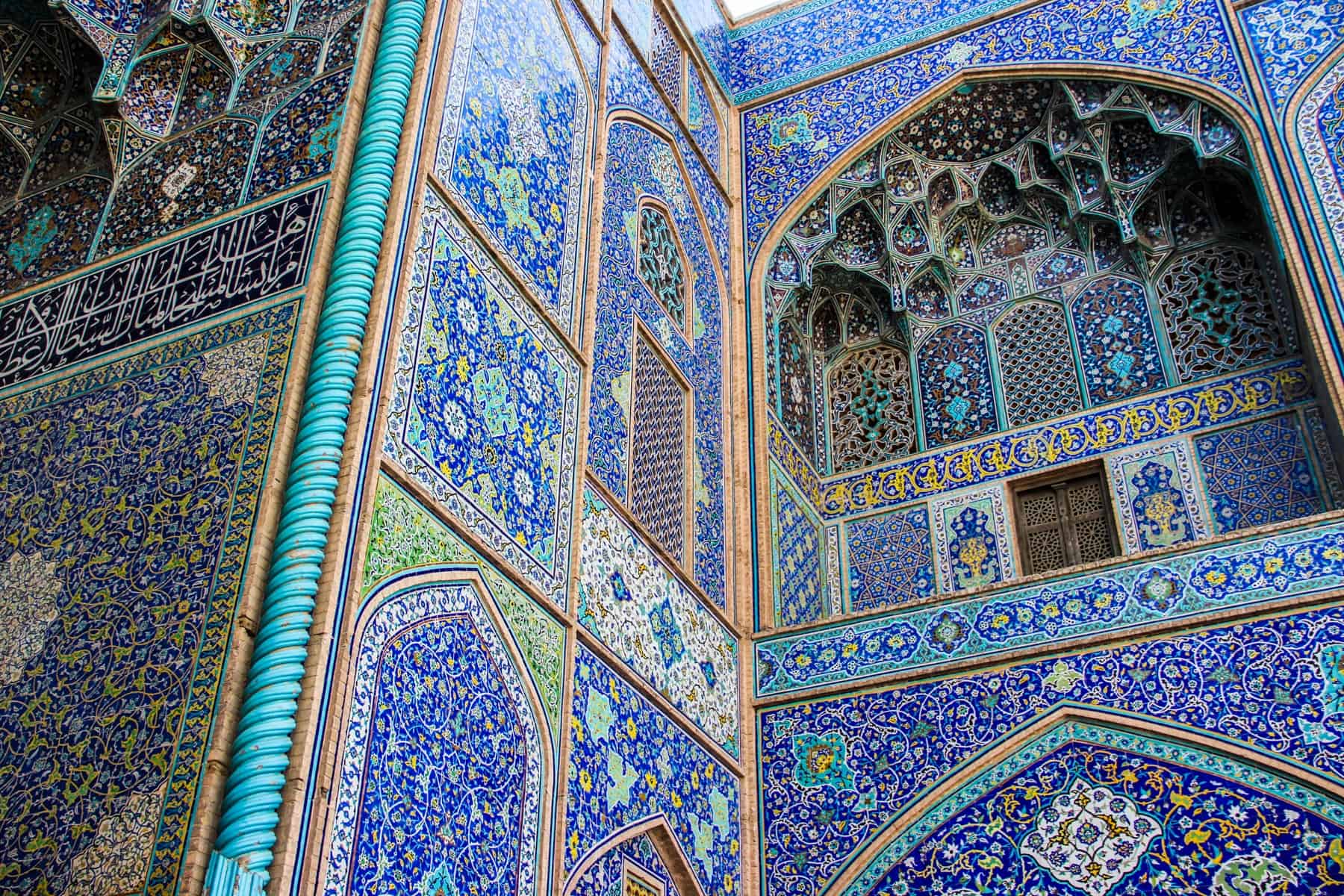
Iran , Misunderstood Destinations
This Is How to Travel to Iran – Everything You Need to Know
Disclaimer: This post contains affiliate links to handpicked partners, including tours, gear and booking sites. If you click through or buy something via one of them, I may receive a small commission. This is at no extra cost to you and allows this site to keep running.
Many travel to Iran to experience the delights of the ancient Persian Empire yet are unaware of the limitations faced by the rules and regulations of what is now the strict Islamic Republic.
As travel warnings persist and diplomatic relations with other countries continue with varying degrees of existence, many are confused about how to go about entering Iran and travelling in Iran safely, efficiently, and within the boundaries set by the current regime.
However, an Iran trip doesn’t have to be difficult at all – tourism is growing as relations develop; hatred of the western world is not as rife as the media likes you to think, and travel in the country is safe. Ancient Persia is within easy grasp, most notably in the central region where key sites have been maintained and the infrastructure linking them is growing, and tourists are not subjected to as heavily enforced rules as the locals.
With enough pre-planning and prior research, you can easily avoid the limitations and stresses of travelling in what is perceived as a closed and tricky country to traverse.
Use this checklist and list of tips for when you visit Iran as a comprehensive guide to help get you started. This Iran travel guide shows you how and is constantly revised with the help of an authorised tour guide on the ground in Tehran, alongside access to regular Iran tourism updates via tourism business partners.
Travel Warning: Due to the volatile security in the region and the recent developments in April 2024, check your government and official advisories before visiting Iran.
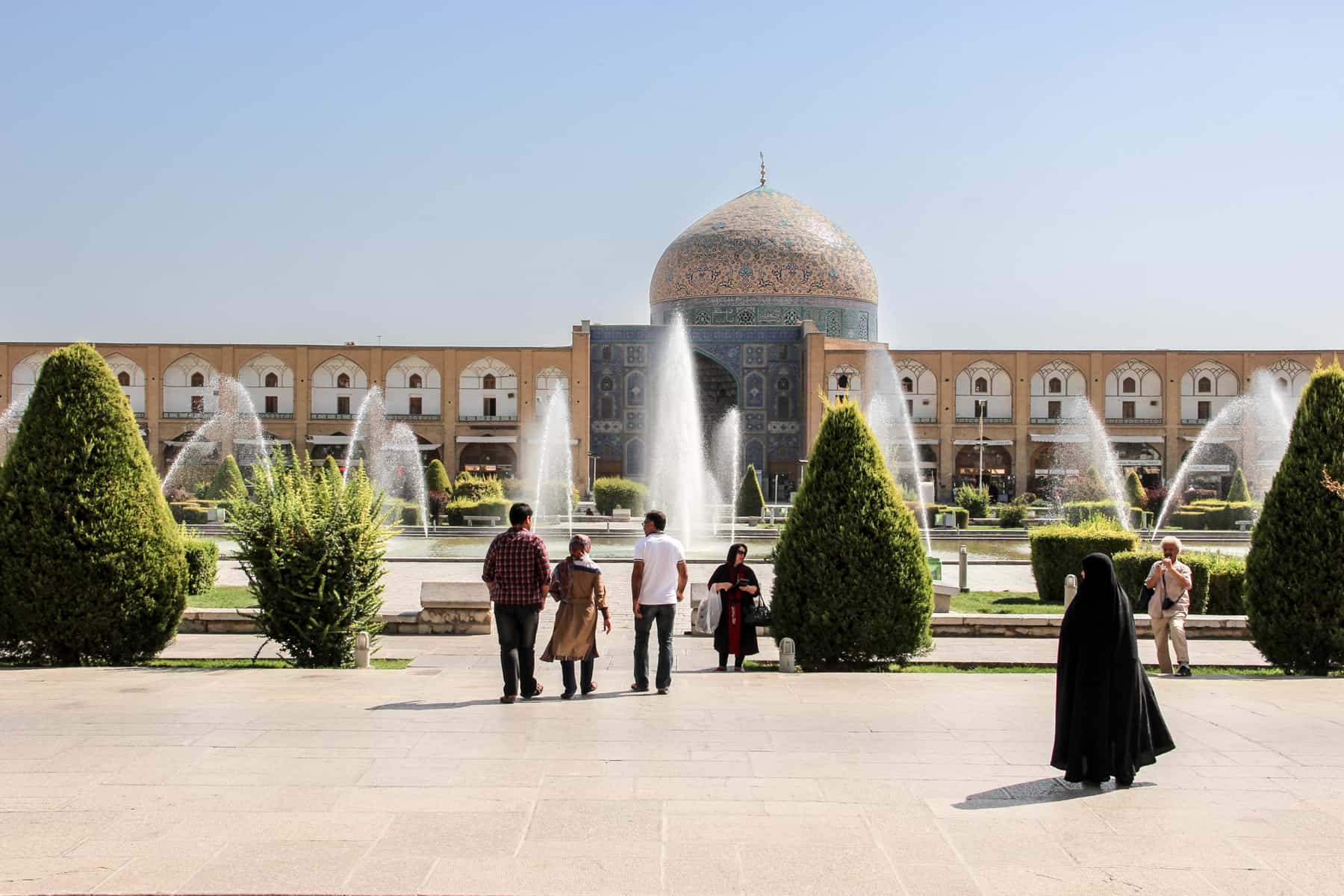
Check Before you Visit Iran
Persia and iran – are they the same, how to get an iran visa on arrival – 180 countries, cost of visas for iran and cost for visa on arrival in iran, you must have travel insurance for an iran visa application, iran tourist visa and authorisation code costs, iran visa timings with authorisation code, proof of travel to israel, current diplomatic relations, nationality restrictions – americans traveling to iran, nationality restrictions – british and canadians travelling to iran, nationality restrictions – israelis travelling to iran, booking the best iran tour, private guided tours of iran, travelling independently in iran, couchsurfing in iran, solo female travel in iran, when is the best time to visit iran, unesco world heritage sites in iran, what should i pack for iran, you are safe in iran, and iranian people are very welcoming, is it safe to travel to iran right now, rules in iran, is iran an arab country, currency in iran – two names, one currency, credit and debit cards in iran, inner-city transport, intercity transport, separate men’s and women’s carriages on iran public transport, pre-register with your country’s foreign office, which sim cards to use in iran, which vpn to use in iran, finding traditional food amongst the fast food, drinking in iran, etiquette in iran, understand the concept of ‘persian time’, read more on the history of iran and iran travel, want to travel iran – pin it.
Inbound bookings for Iran usually change when something has severed particular diplomatic ties, which then reverberates to tourism apprehension and a halt to tourism altogether. Always check the news and the political landscape before travelling to Iran to see if you (and your nationality/country) are affected by visas and entry to Iran. It’s always a matter of time and patiently waiting to see how the political landscape plays out following these events. Here are some of the more recent ones.
On 3rd January 2020, it was announced that the Iranian Major-General Qasem Soleimani was killed in a US airstrike, with Iran calling for ‘severe revenge’. While the outcome is not yet known, this does ignite fears of a conflict in the Middle East , and it pays to be more aware of travel warnings at this time. American citizens, in particular, may face more restrictions.
Following the Ukrainian Airlines plane crash near Tehran, several flights routes to Iran have been cancelled following the news that the Ukrainian jet was ‘unintentionally’ shot down . If you have any Iran travel planned, check your airline to see if the service is still running.
The arrest of the UK Ambassador to Iran in Tehran as part of government protests have further sparked an international row between the two countries. UK travellers should be on alert for developments.
Both Iran and Persia are used interchangeably about the country and also while you are on the ground. Reference to Persia is more so in the context of the history and legacy of the ancient kingdom of the Persian Empire; Iran is about the modern-day Islamic Republic of Iran in the Middle East.
READ MORE: Best Places to Visit in Iran to See Ancient Persia
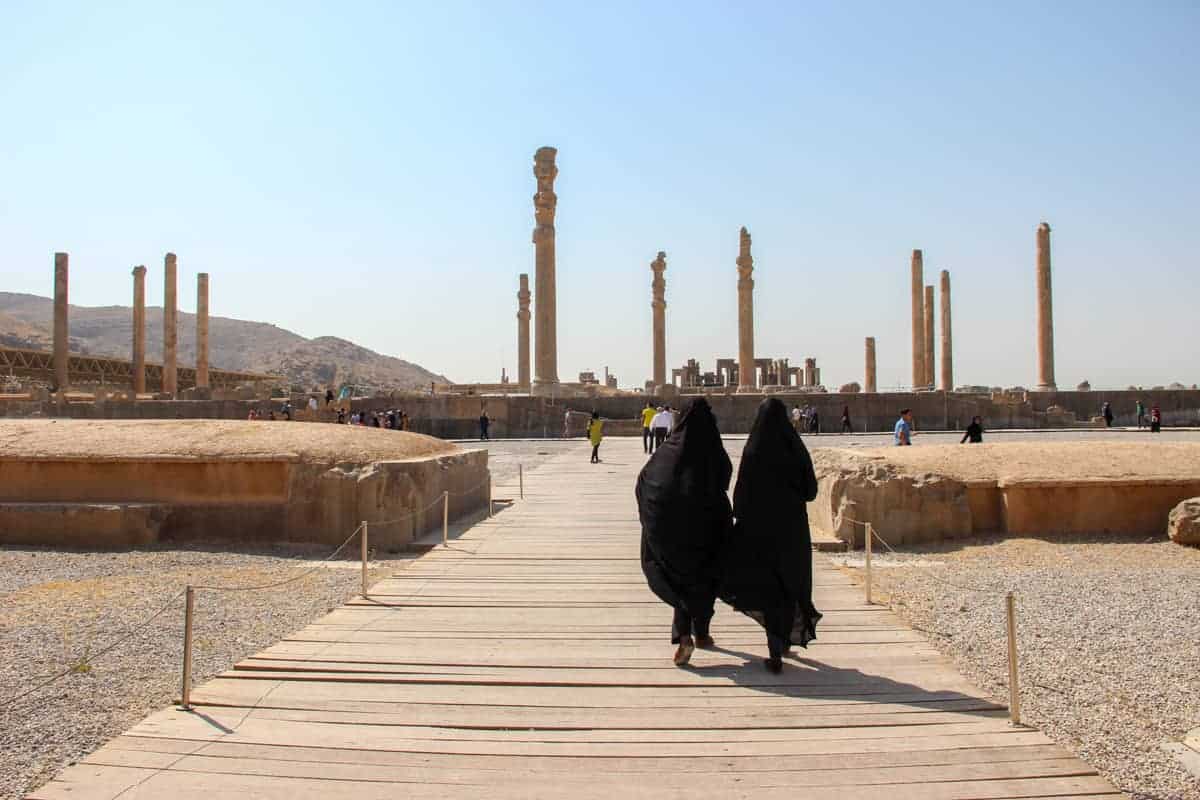
You’ll stumble between modern-day cities and the sights of ancient Persia, like the Persepolis, on any Iran trip.
Can Everyone Travel to Iran? Iran Visas and Authorisation Codes
Getting a visa for Iran is quite possibly the most stressful and challenging part of your entire trip. You first need to know if you are eligible and what limitations you may face.
For countries like the UK, which have strained and little to no diplomatic relations with Iran, you may find that you cannot even get an Iran visa in your country because there is no Iranian embassy. British travel to Iran means a little more legwork, where you may also have to travel elsewhere, like Dublin or Paris for example, to obtain the visa since there is no Iran embassy in the UK.
Most airlines flying to Iran will not allow you on a flight unless you show you have an Iran visa, but you can get a visa on arrival. However, sanctions have been lifted, most notably in 2016, with up to 900 Iran visas daily on average granted on arrival, according to the Office of Foreign Affairs. Tourism numbers annually have increased year on year, with 5.2 million foreign visitors entering Iran in 2015, in comparison to 4.7 million in 2013.
On the 14th February 2016, the Ministry of Iran announced that airports could issue 30-day visas for Iran, for nationals of 180 countries.
Non-eligible nationalities for Iran Visa On Arrival:
Afghanistan, Bangladesh, Canada, Colombia, India, Iraq, Jordan, Pakistan, Somalia, USA, UK
A 30-day Tourist Visa Upon Arrival, for those of eligible nationality , can be obtained at the following Iran airports:
IKA: Tehran Imam Khomeini Airport THR: Tehran Mehrabad Airport MHD: Mashad Airport SYZ: Shiraz Airport TBZ: Tabriz Airport ISF: Isfahan Airport
Follow the signs that say ‘Visa on Arrival’ where you will be asked questions about your trip to Iran and asked to present:
- Details about your confirmed first night’s accommodation in Iran, including the address and phone number (you may also be asked about your travel plans on-going).
- Proof of a confirmed return flight ticket.
- A copy of your travel insurance policy document and policy number.
- Those people I met who were granted an Iran tourist visa on arrival as part of the tour were given a special letter from the company that they could present to both the airline and passport control on arrival.
You can be waiting up to 30 minutes before your visa is granted and you can proceed to immigration. You will need:
- A passport with at least six months validity
- Two passport photos, in which women should be wearing a headscarf
- The completed visa form. You can also fill out the form online before arrival in Iran, from which you will receive a visa application reference number, print it off and take it with you.
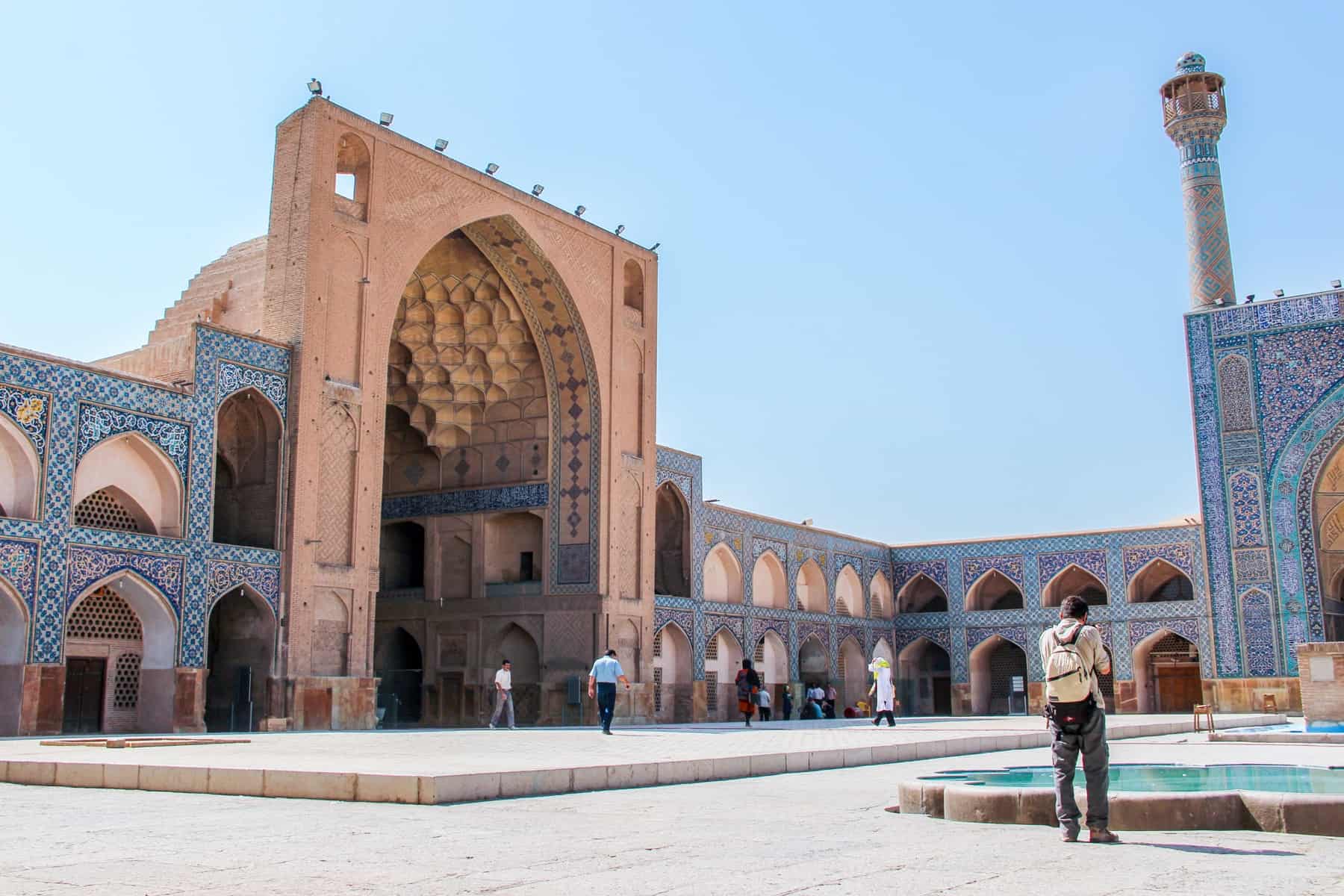
One of the many beautiful places in Iran to visit – The UNESCO World Heritage site of The Great Mosque (Masjid-e Jameh) of Isfahan.
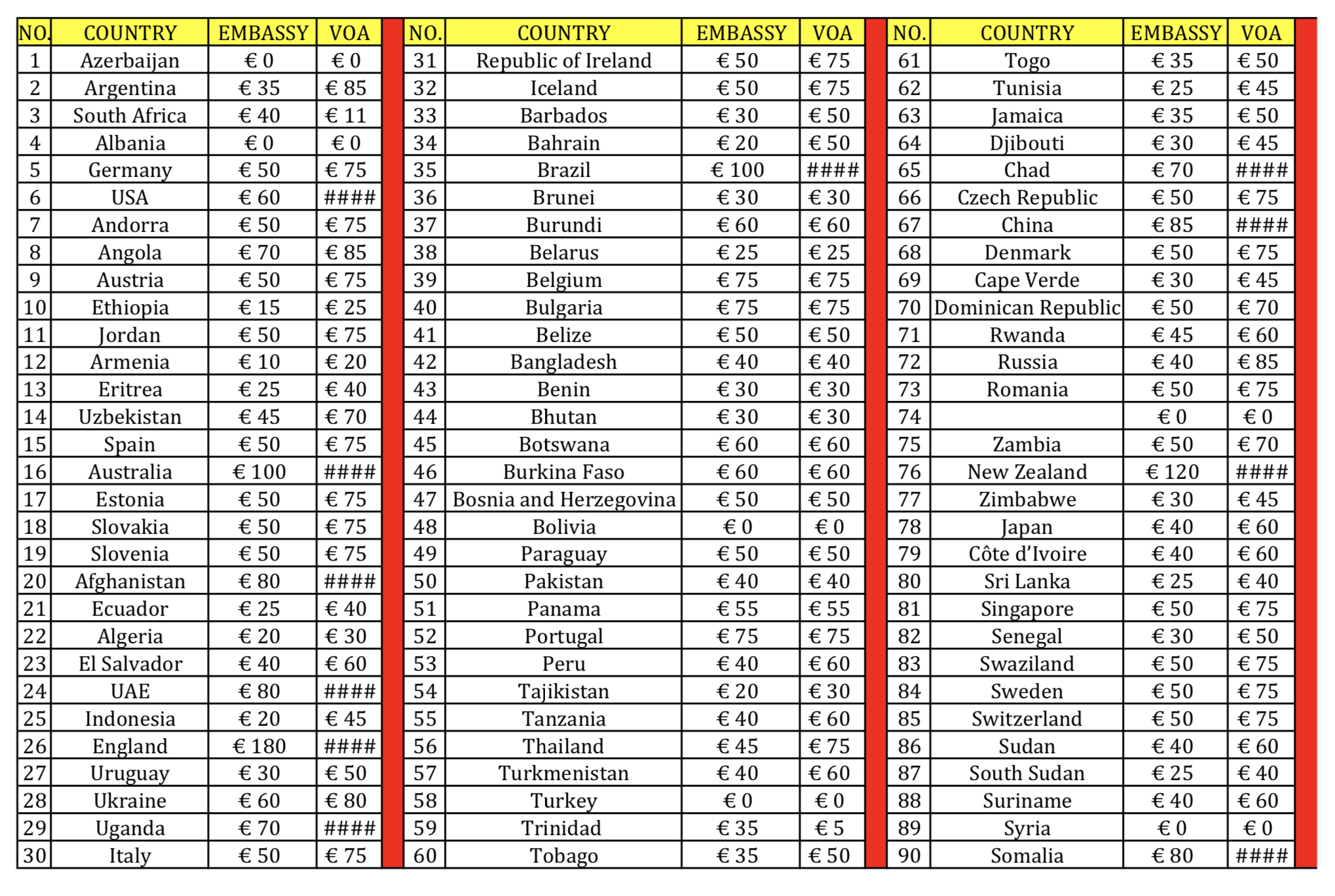
The costs for a visa in Iran and visa on arrival in Iran – each country is different.
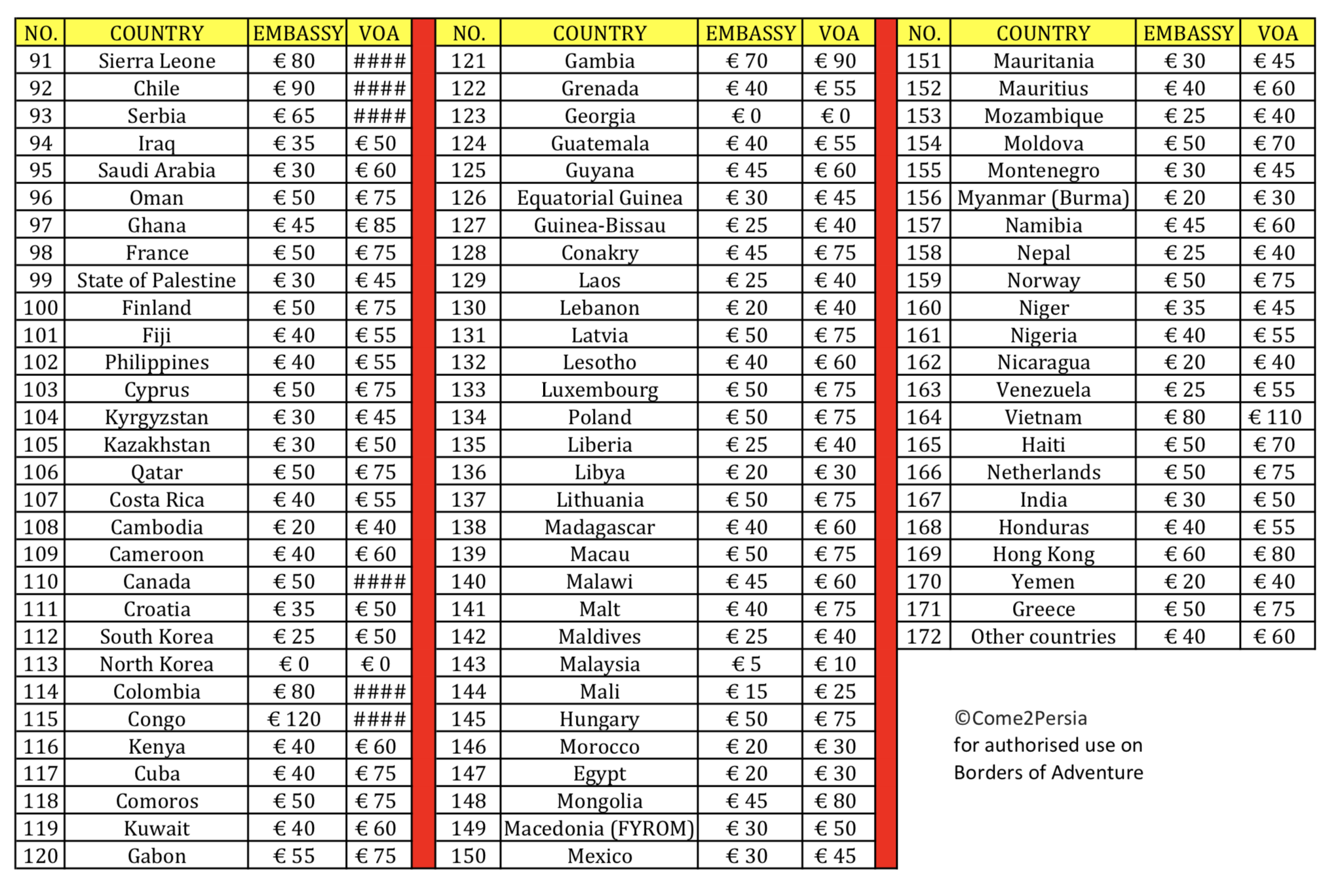
Iran Travel insurance is a requirement to obtain your visa for Iran. Without proof of purchase and printed documentation, you cannot pick up your visa from the embassy or secure your visa on arrival at the airport.
Aside from it being a stupid idea not to have travel insurance coverage, check that your current policy (or the one you are thinking of getting) covers Iran. Some do not provide travel insurance for Iran or only cover limited regions of the country and activities.
Getting Your Iran Authorisation Code – Non-Eligible Nationalities
For those not eligible for a visa on arrival, and those wanting to apply for a visa for peace of mind before they arrive, you have to apply for an Authorisation Code. EVERYONE has to have one of these, which will determine if you are granted an application for a visa.
- For those who HAVE to travel in a group (see below), this code will generally be processed by your tour company.
- For everyone else, you can use 1stQuest which offers essential travel services for Iran travel. Otherwise, source an Iranian travel agency local to you at the time of planning or seek direction from the embassy you wish to get a visa from about where to apply for it.
- When applying for the authorisation code, you will need to specify which embassy you will be processing your visa at – a pain for those travelling around with no solid plans. Once the code is released, you cannot change the embassy choice. It’s wise to choose an embassy in a city you are likely to fly to Iran from (see also timings below).
Authorisation codes (if not booking with tour) come with an administration cost of around 35 Euro, which is dependent on the agency you are working with. There is no set price for an Iran Tourist Visa since it is determined by nationality and where you process your visa.
I paid €180 for mine in Tbilisi, Georgia and a British guy on my tour paid a little more to process his in Paris. The Australians in my tour group paid differing amounts between €50-€100, as did the Germans. There’s no hard and fast rule – it’s more about luck.
If all that wasn’t enough, it is highly likely that
1. Your authorisation code will take WEEKS to process
2. It will most likely arrive with only a matter of DAYS to spare before your planned arrival in Iran or tour start date.
This means that before any trip to Iran, especially when travelling on a tour, you will be rushing to the embassy in the hope of getting your authorisation code for Iran processed quickly. You may have to pay extra for fast-tracking and organise your flight ticket to Iran very last minute. This doesn’t always guarantee the best price and the idea of getting a cheap ticket to Iran has to be pushed aside.
DON’T book your flights to Iran or any travel arrangements until you know your Iran visa will be processed. Many people travel to Turkey beforehand to process their visas and fly to Iran from there, using the country as a cost-effective flight or train route for entry.
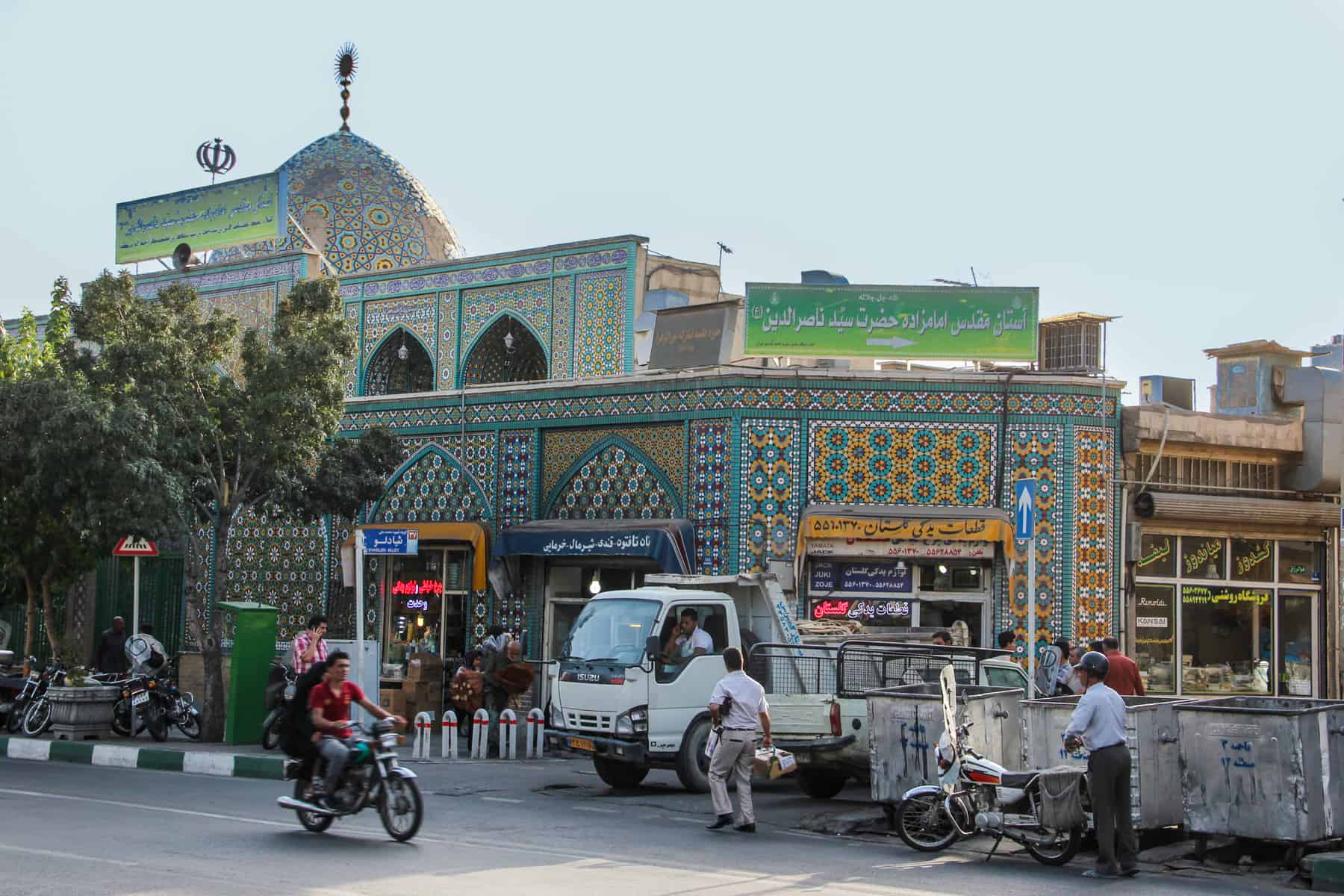
Everybody needs to get an Authorisation Code before travelling in Iran.
Refusal of Entry to Iran
The main reason for Iranian visa refusal is when there is proof you have travelled to Israel and the government’s paranoia based on your career (think journalists, media workers and similar).
Iran tourism issues are not linear, and while anything can happen at any time that would affect a particular nationality entry, the majority of the problems are political-based and beyond our control. Diplomatic relations and any political actions for/against Iran based on historical or current affairs at the time of applying may affect your refusal of entry into the country, or an Iran travel ban put in place.
On 4th January 2020, it was announced that the Iranian Major-General Qasem Soleimani was killed in a US airstrike, with Iran calling for ‘severe revenge’. While the outcome is not yet known, this does ignite fears of a conflict in the Middle East , and it pays to be more aware of travel warnings at this time.
On 6th October 2019, it was reported that the two Australians imprisoned in Iran for flying a drone were freed in a political swap. It is suggested that strained relations between the UK and Iran after Britain seized an Iranian oil tanker in Gibraltar are inciting such political moves to detain people breaking the rules.
On 29th August 2018, France informed diplomats to postpone all but non-essential travel to Iran after a foiled bomb plot near Paris. The following day, Iran dismissed such restrictions , proving that it is best to stay aware of any sudden changes.
Solo Travel in Iran vs Tours in Iran
One of the biggest questions I hear is: Can US citizens / Americans travel to Iran? They absolutely can, but because of the long-standing history of coups, espionage, nuclear sanctions and everything else in between (outside of the control of the average American citizen unconnected to the historical actions of their government), all US passport holders are only allowed into Iran if part of Iran tour packages (or with a tour guide).
Despite restrictions, it is safe for Americans to travel to Iran, so don’t be put off by the bureaucracy needed to get there. US travel tips to Iran focus on this red tape. For example, it still stands that Americans must also be escorted from the airport to the hotel, and cannot make their arrangements. This all has to be pre-organised pick-up (a simple addition via the tour company) so do check this before you leave.
READ MORE: Inside The Den of Espionage – Former US Embassy in Tehran Turned Museum
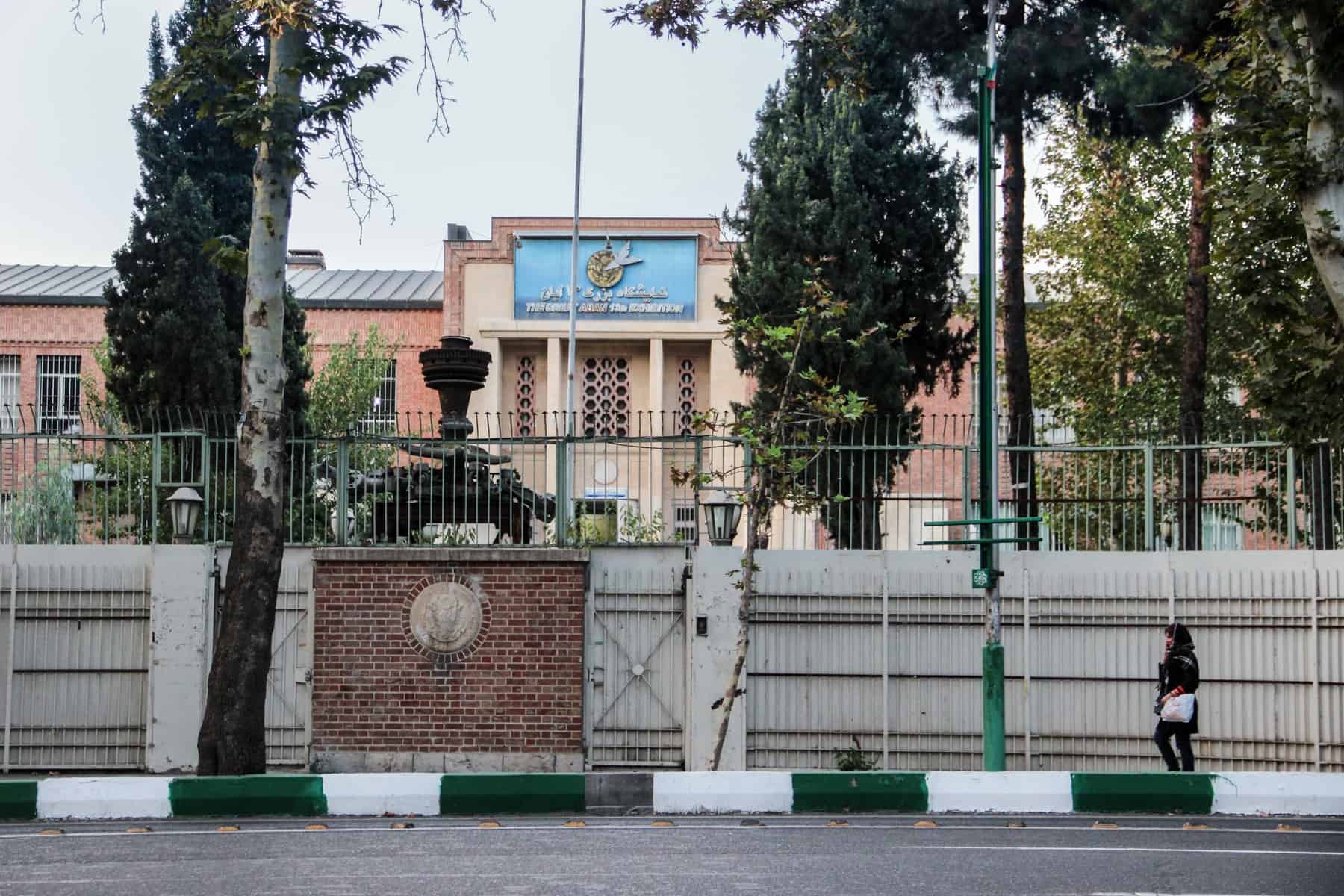
The former US Embassy in Tehran, Iran
As of February 2014, British and Canadian citizens going to Iran became subjected to the same ‘tour only’ sanction (official Iran tour operator or private Iran guide). As a result, your visa is usually only granted for the exact number of days of your tour, with a couple of days on either side if you list this as part of the arrival and departure options.
British passports holders should also pay attention to Foreign Office updates following strained relations between the two countries after the oil tanker seizure, as listed above in ‘Current Diplomatic Relations’.
Unfortunately, Israeli citizens cannot enter Iran at all, and this is unlikely to change anytime soon.
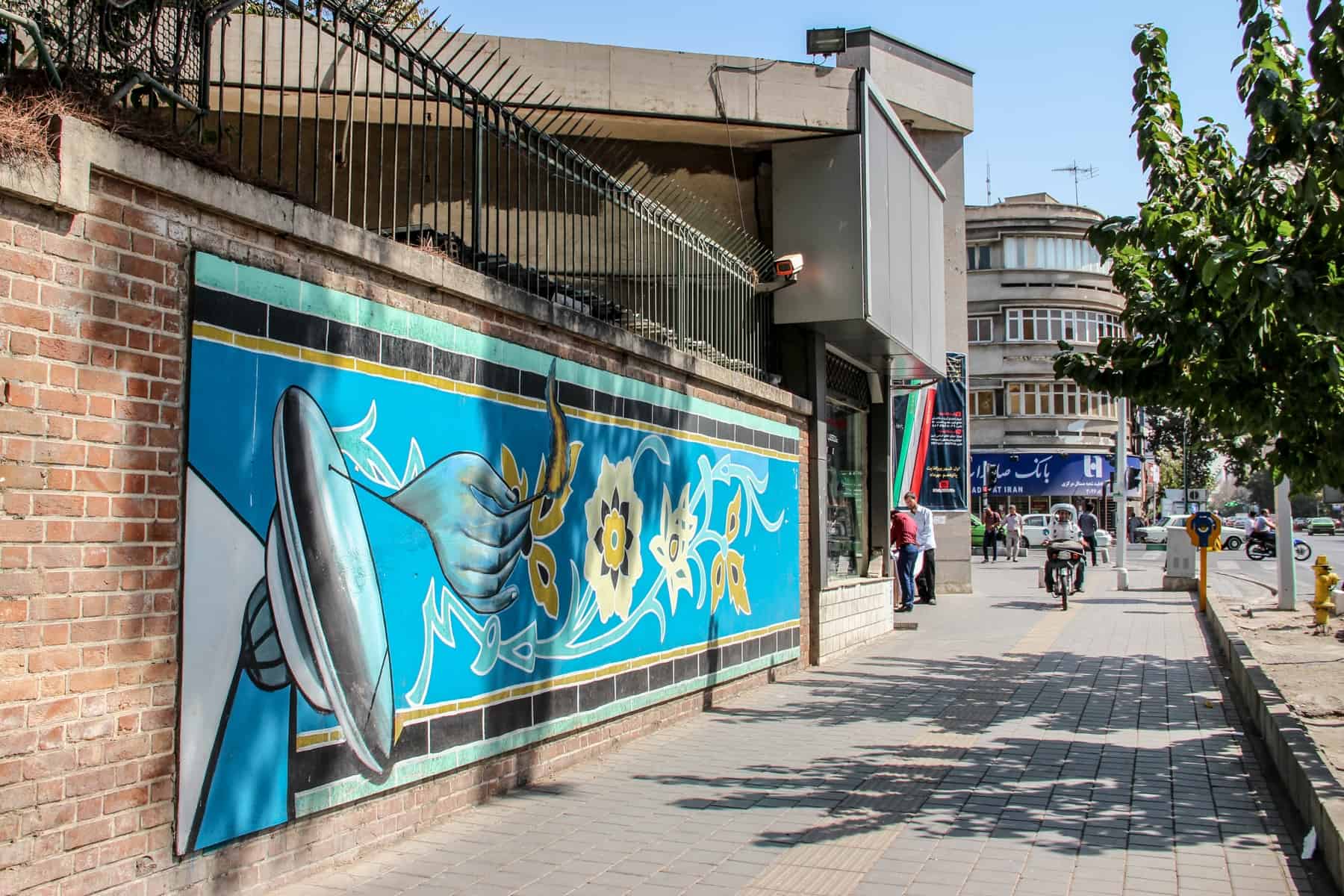
Check on any nationality restrictions before you visit Iran. It may mean having to join a tour and hire a guide.
While those booking up Iran holidays might choose a tour package for the fact that everything is taken care of on the ground and for ease of travel, I had no choice since I had a British passport.
There’s an overwhelming amount of Iran tour packages, and it can often be hard to know where to start. At the time, I travelled with G Adventures on a Discover Persia tour which operated through the revered Iranian agency AITO. I allowed myself free time to visit Tehran on either side of my trip, so I had a taste of both worlds, albeit on a small scale. Currently this trip is not running.
The upside to a tour, however nomadic and sporadic you usually are, is that these trips pack a real punch in getting you to many sites in 14 days. On the G Adventures Iran tour, I saw places I would not have been able to access easily on my own or with public transport. Plus, my local guide to Iran was the bundle of knowledge that a history and sociology geek like me needed for an ancient civilisation such as Persia. The downside of such holidays in Iran is a lack of free time and lazy resting for an itinerary that would normally, on my terms, take about three weeks, not two.
Being in a tour group when visiting Iran does not mean being chaperoned and watched 24-7. ven while on a small group tour, we were allowed time to ourselves in each destination.
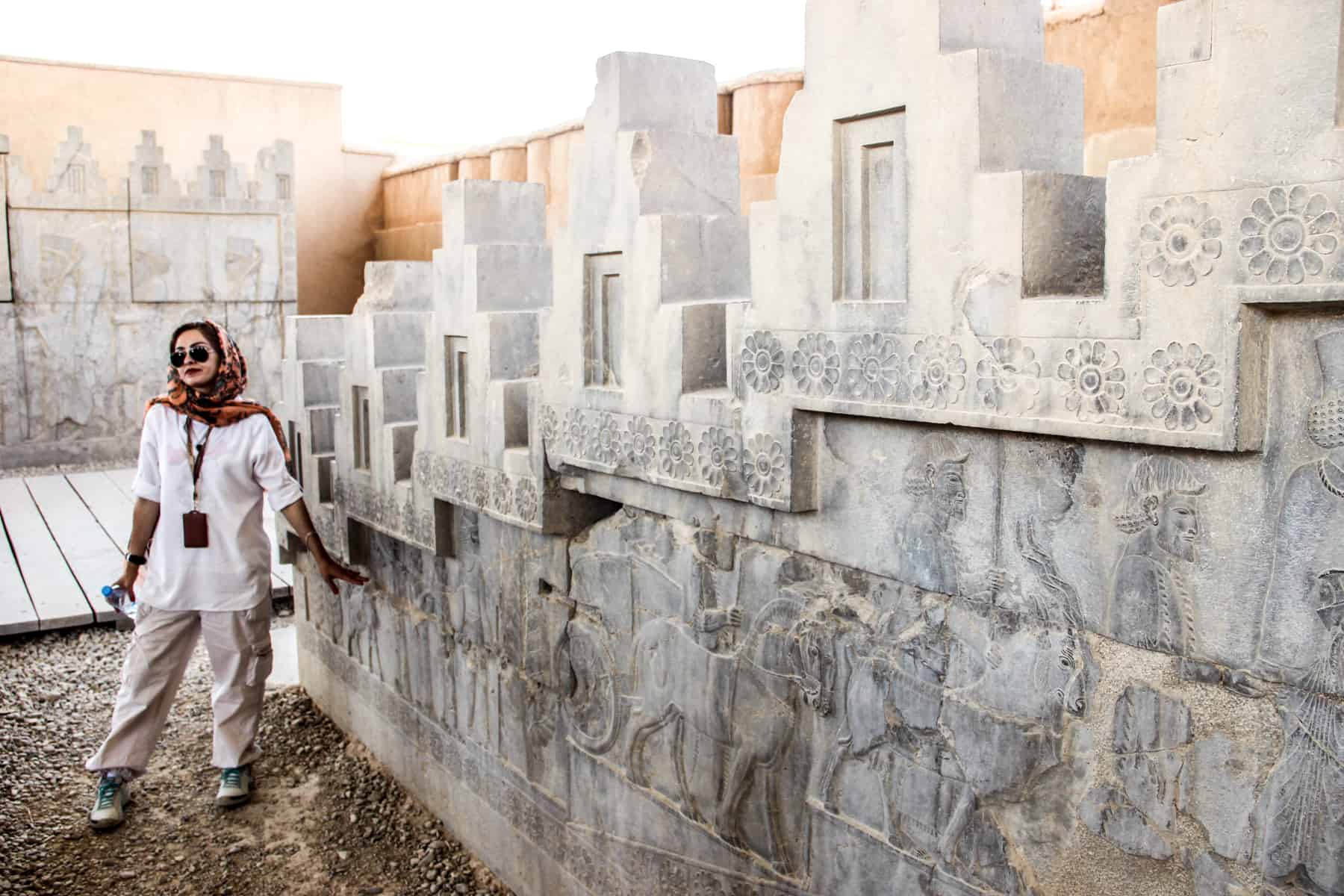
Choosing between and small group tour and a private guide – with a local who will show you all the historical places in Iran.
Generally, under the condition that you must have two people minimum, hiring a private tour guide in Iran is also an option. This is a viable option for those with visa restrictions who do not want to travel in slightly larger groups.
Come2Persia is a certified and reliable Iran travel agency run by a trusted Iranian friend of mine, Ali Reza Nokhostin, who I met and travelled with when in Georgia. He is both passionate about showing off his country and in changing perceptions of Iran. Specialising in incoming tours to Iran, Come2Persia also provides other travel services needed to complete the private tour package, including hotel bookings, visa application, transportation and access to various guides, not just Ali.
Note that while solo / independent travel is moderately easy in Iran (if of a free nationality), Iran is not that well-trodden on the independent travel path. There’s little to no hostels and guesthouses, and a dominance of big, expensive hotels (especially in Tehran) and even then it is rare to stumble upon a bunch of solo travellers to join.
However, solo travel in Iran is happening, and it is safe, it’s just a little more challenging than usual, which can, in itself, be pretty exhilarating.
Note that Couchsurfing in Iran is officially illegal, but it happens anyway. Nearly all independent travellers I have spoken to have mentioned that they have travelled here via this resource with your local hosts, of course, being the best guides. However, travellers looking to Couchsurf in Iran must be aware that they can not hold the Couchsurfing host responsible if anything goes wrong because there is no official ‘filter’ in place when it comes to the hosts listed online.
In a society where women are much more restricted than their male counterparts, to travel Iran as a solo female is a little harder and viewed with surprise/suspicion depending on where you go.
Also in Iran, since public displays of affection between males and females are not allowed, any harassment or inappropriate contact by an Iranian male to a female traveller would be frowned upon and draw attention.
Iran is one of the safest countries in the world based on tourists’ feedback. There have been many solo female travellers who have experienced Iranian hospitality and kindness.
However, it is vital to bear in mind that Iran is an Islamic country with traditional values and of course, some types of outfits would send the wrong message, especially in smaller and more conservative cities, such as Yazd, Kashan and Qom.
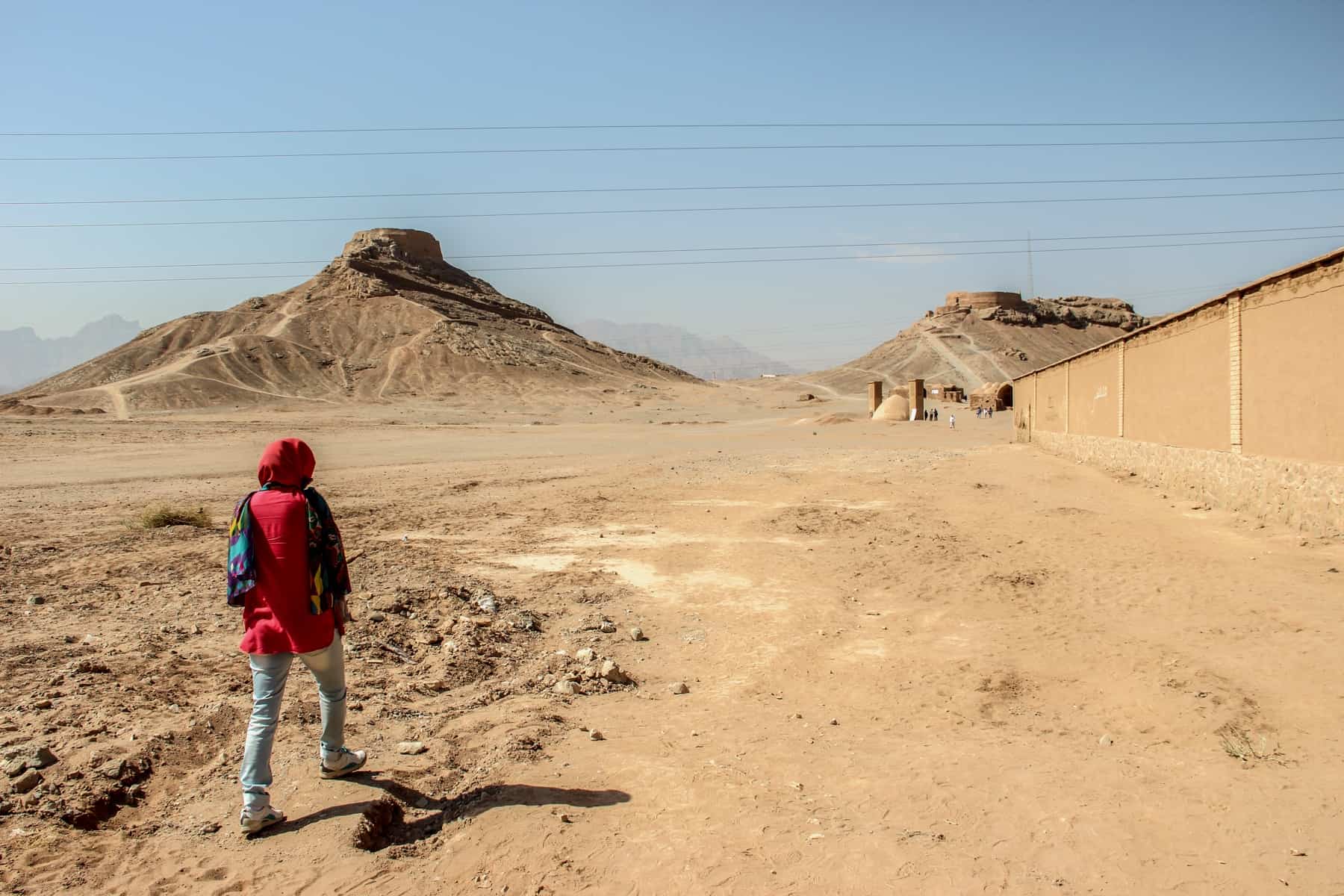
Solo female travel in Iran is safe, but with awareness of the conservative values of this Islamic country.
Iran is a four-season country, which means in different corners of the country, you can experience various climates at the same time. So, when is the best time to go to Iran, based on the different climates in the country? As a quick guide to Iran and its geographical mix, we can divide the country into three regions:
- From early March until late May
- From early September until late November
- There is one high season, from mid-April until mid-November
- Only one high season, from late November until late March
In between the high seasons from July to September is marked by high temperatures rendering travel on the classic route potentially uncomfortable.
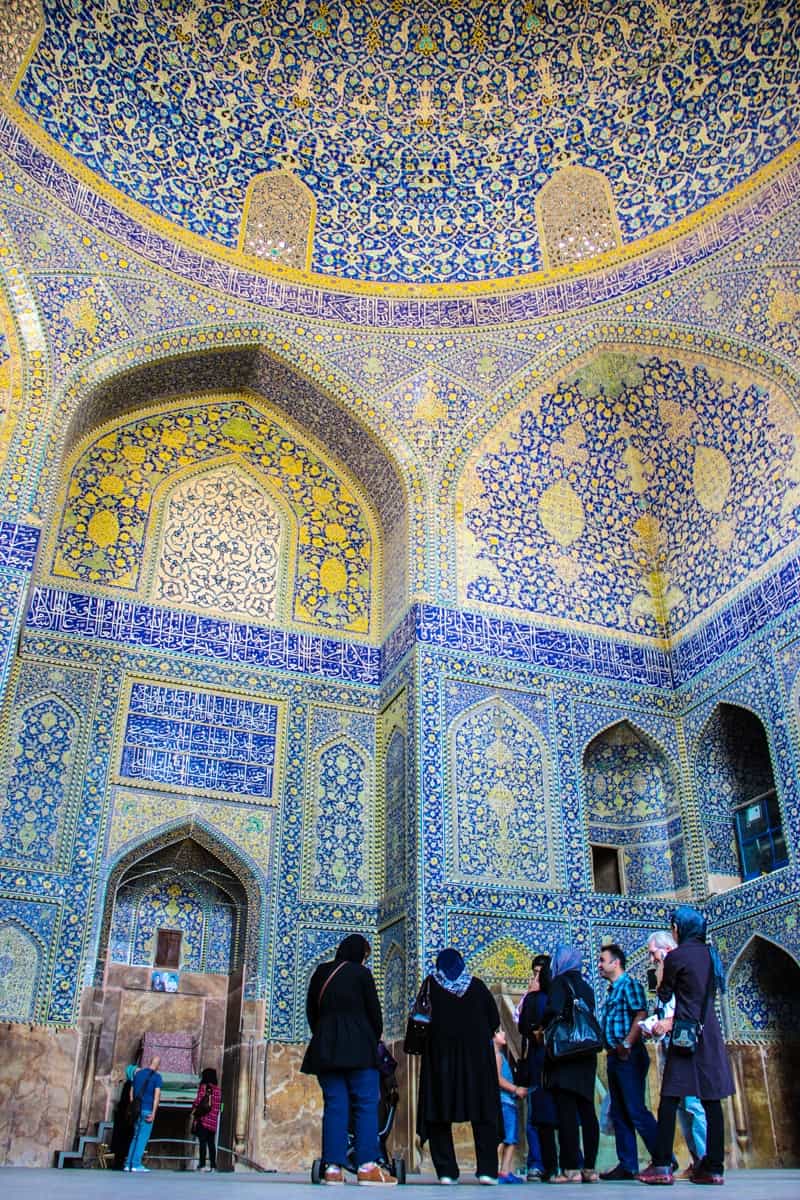
The stunning Sheikh Lotfollah Mosque is Isfahan is one of the must-see sites.
Iranians love to shout about the abundance of UNESCO World Heritage Sites. As my local friend stated, “It gives Iranians a lot of pride to possess such ancient lineage”.
Iran has 24 UNESCO World Heritage Sites – 22 cultural and two natural. Each of which is the result of years of investigation and presentation of evidence as to why they should be regarded as world heritage sites. It would take more than one trip to traverse them all.
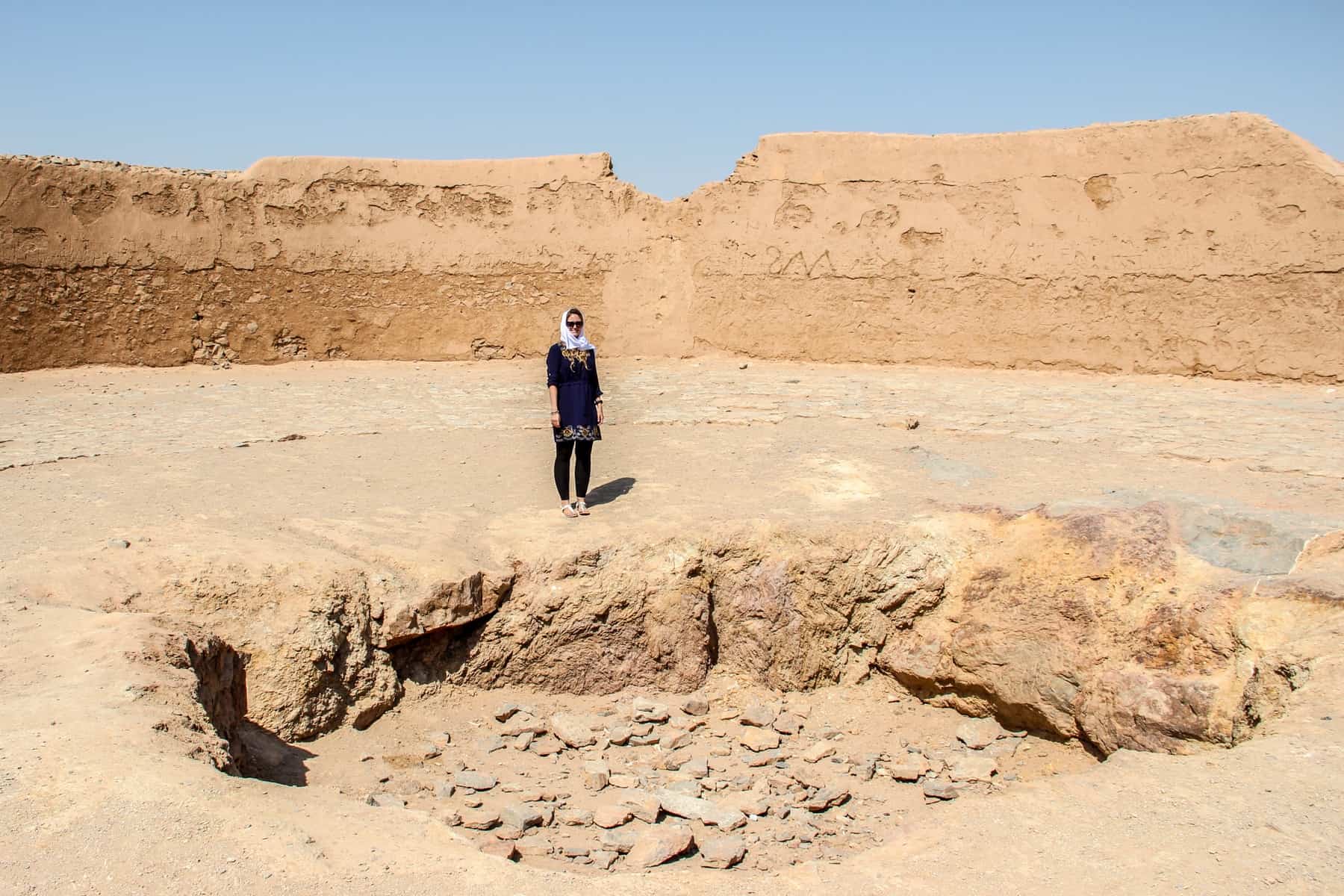
The Zoroastrian Towers of Silence in Yazd – one of the 24 UNESCO World Heritage Sites in Iran.
Dress Code in Iran – Headscarves and Hijabs
Iran does have a strict dress code, and this is one of the biggest concerns for female travellers to Iran. Most importantly – PACK A HEADSCARF IN YOUR HAND LUGGAGE. It’s called ‘Roosari’ in Farsi, and you MUST be wearing it the moment you exit the plane and are officially in Iran.
You must wear a headscarf the entire time you are in Iran (except when in your hotel room), as well as loose clothing that covers your body. But let’s get one thing straight – you don’t have to wear a burka or anything that completely hides you.
When you arrive, you will soon see that reality is far removed from the stereotype. Iranian women are super stylish and proud of their appearance – fashion being a means to stand out and make a statement.
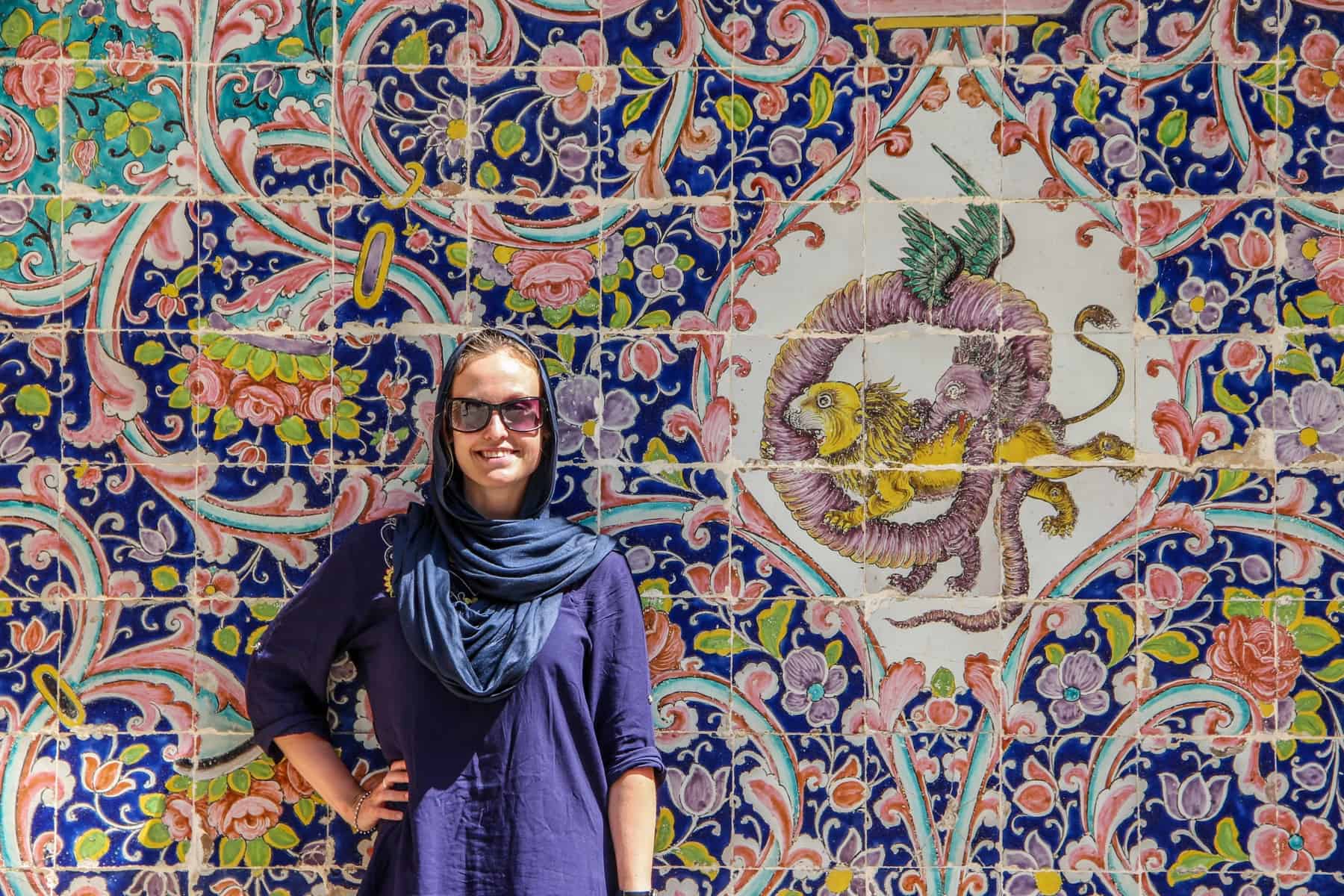
The dress code for women in Iran doesn’t have to be complicated.
The ‘Morality Police’ you hear of do exist in Iran but are not spending their time chasing down foreign visitors, so do not worry too much with that. If anything, you will get a polite mention. Visitors have a bit more flexibility when it comes to the rules.
- A headscarf is the most immediate essential item, and you can buy more when you are there) . If your headscarf falls, don’t worry – quickly put it back on again. You won’t be in trouble for this, but pay attention at all times. Wearing your hair in a high bun or ponytail helps keep the scarf in place. Many Iranian women wear it a little loose and halfway back on their head, since showing a little hair is granted.
- Tops must be loose-fitting, and three-quarter length sleeves are ok – a little more comfortable in the heat. The general rule of thumb is that the body should be covered and arms should not be bare.
- It is said that trousers must be baggy, but some local women wear tight, brightly coloured leggings. As long as your legs are covered down to the ankles, it is fine. For tourists, leggings worn with a long, loose-fitting top are acceptable. However, in the more conservative areas such as Isfahan, Mashad and Qum, respect the values and revert to looser fitting trousers.
- Colour of clothing. It’s a myth that you need to dress in dark colours or black tunics. Embrace fashion the ways the locals do and bring some colour into your Iran packing list!
- Open toes sandals are OK. Pack some sports shoes for longer day trips where you might be walking a lot (such as at the Persepolis). You’ll soon see how sports shoes are fashionable in Iran, especially in bright colours!
- Worried you do not have enough appropriate attire? Fear not, as soon as you arrive in Tehran or even Shiraz (if you fly into the city), hit the bazaars and the local markets . There’s plenty to be sought out. Other people on my trip stuck with two outfits and alternately hand-washed them every night.
- Strict dress codes do not apply in the same manner when travelling with children . Young boys can wear shorts and t-shirts and girls under ten are not required to wear a headscarf.
For men it’s more straightforward – you will be dressing much the same as you do in western countries, except no short shorts, no super short sleeves and no extreme tight-fitting clothing.
READ MORE: Iran Dress Code for Women (What to Wear in Iran)
Is Iran Safe? Is it Safe to Travel to Iran?
Iran’s image of being a terrorist-driven, American bashing, nuclear weapon holding, burka-clad society is something that has been highly driven mainly by western media. “Is Iran safe?” “Isn’t it dangerous in Iran?” are likely to be some of the first questions you encounter from others when you announce you are travelling here.
In short: Iran is a safe place to visit.
Since the election of the more moderate President, Hassan Rouhani in August 2013 and his re-election in 2017 , both international relations and internal rules have become less severe and slightly more open. It won’t take long before Iranians give you a warm welcome, ask where you are from or even invite you to dinner or tea.
It is a part of Iranian culture to go out of their way to help you, and it’s not uncommon to be given a phone number on a piece of paper or a business card in case you need to call upon someone.
The people of Iran are just as keen to show you they are the opposite of how they are portrayed, just as you should be teaching them that the western world doesn’t hate them.
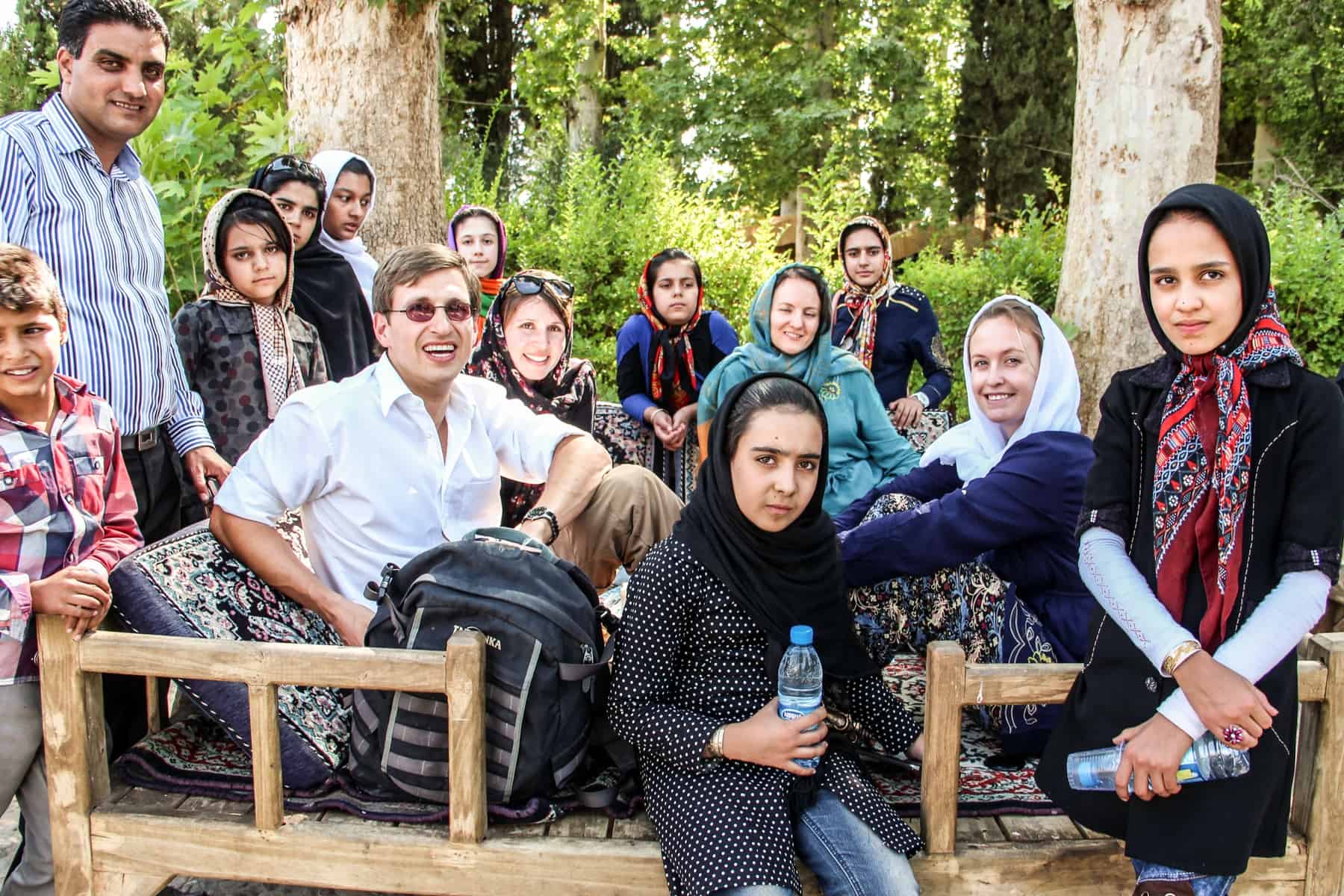
Is it safe to travel in Iran? Absoluely. Locals are very welcoming.
There’s never a right time for those who are worried, anxious or scared. Of course, you need to keep up to date with any significant political changes and your country’s diplomatic ties, but avoid listening to the hive of scaremongering out there and those who say don’t travel in Iran.
For example, in June 2018, there were protests about the economic situation in Iran, and these took place inside and around the Grand Bazaar in Tehran. It means being aware of any internal demonstrations and staying away from those areas, as you would in any country.
Iran remains as one of the most stable countries in the Middle East. While breaking the rules of Islamic society (including drinking alcohol, taking drugs and engaging in sexual activity with locals) can result in deportation, arrest or worse, general travel here is entirely safe.
Don’t assume you can break any rules in Iran, play the dumb tourist and get away with it. Iran is a Muslim country where Islamic law is strictly enforced.
An example of harsh punishment is with the case of the two Australians imprisoned in Iran for illegally flying a drone near a military installation, freed in October 2019, but as part of a political swap. It might seem that the punishment doesn’t fit the crime, but what is justified in your country can have harsher consequences elsewhere.
This is an Islamic State with a strict system, and if you can’t play by Iran rules, don’t go.
Given the location of Iran in the Middle East, the Muslim religion and some similarities in culture and language, the scaremongering of Iran can often revolve around the ‘it’s Arab’ misconception.
Iran is not an Arab country. Iranians are not Arabs. The language spoken is Persian (also known as Farsi) and not Arabic (although there are many languages spoken within Iran including Kurdish and forms of Turkish, Indo-European languages and Khuzi Arabic for example, due to the many ethnic groups that exist within the country).
Not only is the Arab misconception a source of contention generally, but Persians can take offence at these preconceived ideas.
Take US Dollars or Euros with you to Iran and change them up into Iranian Rial at the local exchange offices (not the dodgy guys on the street or at the hotels which have the lower government exchange rate). Before you know it, you have millions of Rials, and it all looks easy.
However, while ALL notes state ‘Rial’ there is another ‘currency’ or ‘super unit’ that is used – Toman – which is not listed on any note or coin.
Toman is used by locals and is one-tenth of the Rial total. 1 Toman = 10 Rial.
When I was first presented with a dinner bill of “37,000”, I was quietly happy that my food had cost the equivalent of $1.5, but this was, in fact, the price in Toman.
To convert to Rial, you simply add a zero – therefore my dinner was 370,000 Rial.
Lost? It takes a couple of days to get used to, but in the majority of cases, unless stated clearly, all prices are in Toman and not Rial. Hence, the basic equation anywhere in Iran is to add a zero onto printed prices (if ‘Rial’ is not listed), or ask market vendors and others which ‘currency’ they are operating in to save the confusion.
A big question is if you can use your credit or debit card in Iran. Sadly not, since there is no network in Iran for the use of international cards. It’s always been the best option to carry enough cash with you for your trip to convert to Iranian Rial on the ground.
However, there is now an Iranian prepaid debit card for tourists and temporary visitors called the Mah Card. Like most travel cards, you can instantly add funds to your card in your preferred or home currency, and it will convert it to Iranian Rial. It is more convenient than carrying cash, protects you from unauthorised purchases and is accepted country-wide.
To get 40% off the price of a Mah Card (Full price €19) enter BECKI at the checkout.
Public Transport in Iran – Options, Usage and Cost
When traveling in Iran, you have various options for public transport:
Intercity transport:
Private car
- Domestic flight
The Metro is available in several cities in Iran, mainly in Tehran; alongside Shiraz, Tabriz, Mashhad and Isfahan. It is the best option to get around in Tehran, and the stations are also easily accessible by taxi and buses. The ticket price for one trip is 1000 Tomans (approximately 25 cents). You can also buy a card to pay for the metro trips and even the buses in Tehran. The rush hours are mainly 7-9 a.m. and 5-7 p.m.
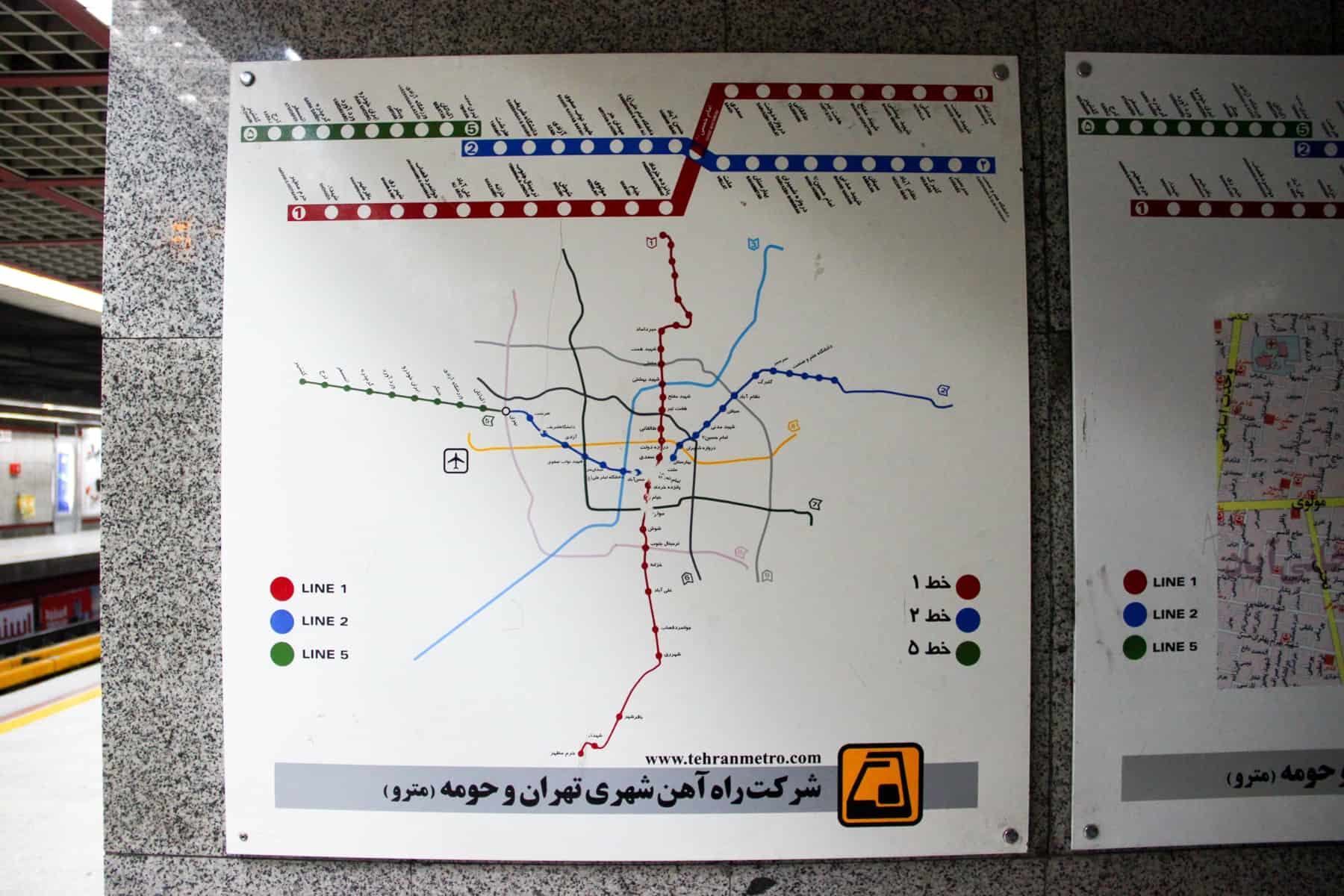
Tehran metro map and the three lines that cover the city.
You can find buses in every corner of the country. There are two main types of buses in big cities: regular and BRT. BRT buses are red, and because they have designated stations and paths, they are express buses. You can pay for the buses by your Metro card, and the fares would vary between 500 to 1000 Tomans (12 to 25 cents) per trip. You can find all the bus and BRT stations on Google Maps.
There are different types of taxis inside the cities:
- Shuttle/shared taxis (khatti): It is a way cheaper way to get around the cities. The two downsides are that they are for fixed destinations and you will have to wait for the taxi to be filled. The fares are also fixed, and you cannot negotiate.
- Private taxis (darbast): You can easily hail a taxi and say ‘darbast’. It means the driver will not pick any other passengers up and you must negotiate the price before getting on.
- Non-registered taxis (shakhsi): These are non-taxi drivers who you would easily spot from the yellow and green cabs. These are people who try to earn some money by giving people a ride. Again you must negotiate the price before getting on.
- Uber-like apps: Tap30 and Snapp are the two leading apps that you can easily use on your phone. Unfortunately, they’re not available on App Store and Google Play, but you can ask a local to help you with downloading them on your phone. Tap30 is available in many cities including Tehran, Karaj, Isfahan, Shiraz, Tabriz and Mashhad. Snapp is available in the same cities and also in Ahwaz and Qom.
- Bisim Taxi: You can also call the numbers 133, 1828 and 1833 in major cities in Iran to call a taxi wherever you are.
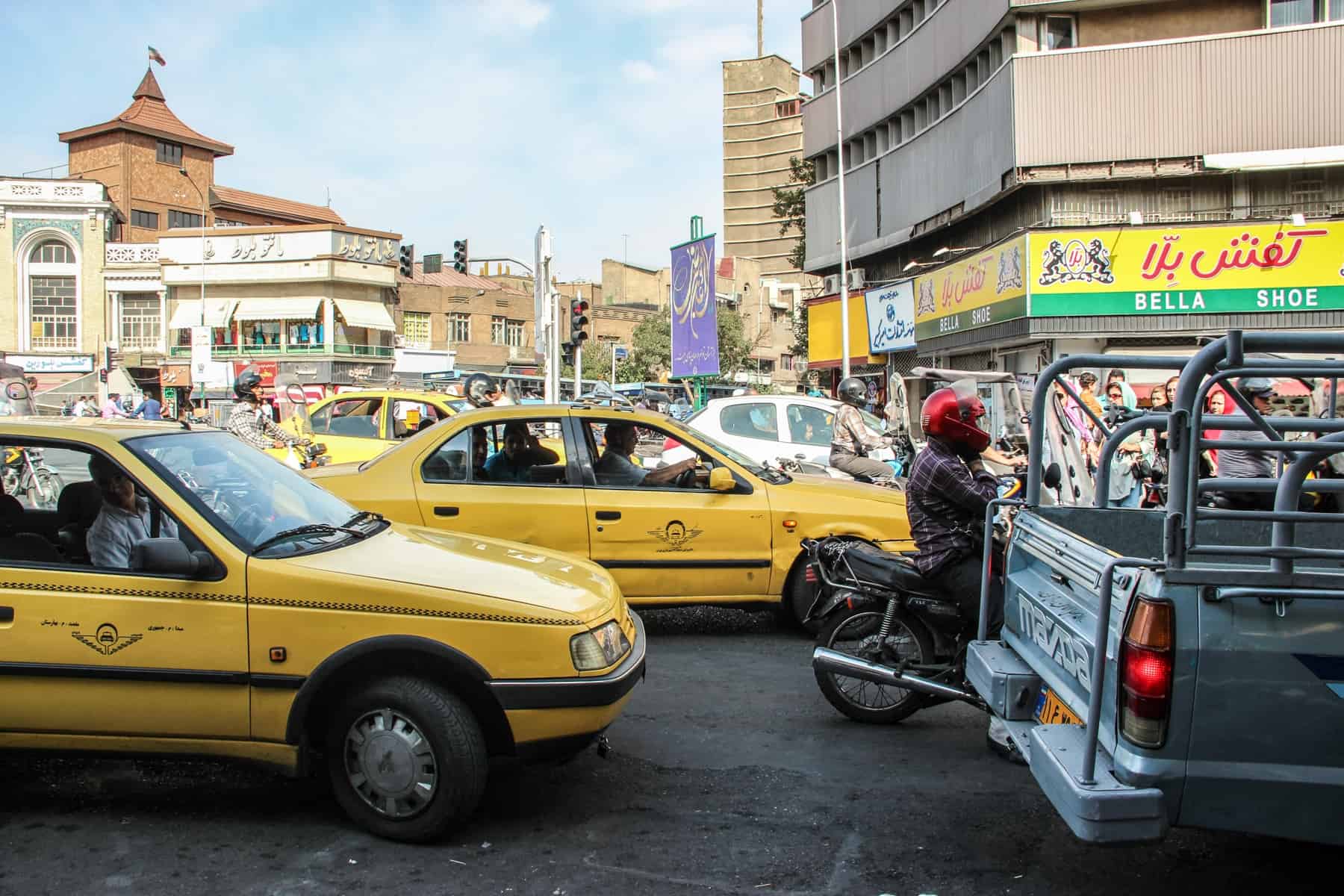
There are plenty of taxi options in Iran.
There are two types of buses between the cities in Iran: regular buses (44 people on board) and VIP buses (25 to 35 people on board). You have more legroom on VIP buses, and you can almost lie down on the seats. You can ask a receptionist at the front desk of the hotel, go to a local travel agency or go directly to the bus terminal to buy a bus ticket in Iran. The prices vary according to the type of bus and the distance. For example, the price for a VIP ticket from Tehran to Shiraz is around 70,000 Tomans ($16).
Using trains is the best and safest option to get around the cities in Iran. There are different types of trains: 4-bed, 6-bed and the so-called ‘bus’ trains. You can also ask if the train you are trying to take is an express train or a regular train. You can book trains through the hotels, local agencies or go directly to the train station. The price for a ticket from Tehran to Yazd, for example, is between 30,000 to 70,000 Tomans ($8 to $15).
You have two options to travel in Iran by a private car. You can hire a driver or a licensed driver-guide who can not only drive you from one city to another but show you the sites en route and give you all the information you need in English and other languages. You can find a driver-guide in Iran through TourHQ . You can either go to a taxi company or a local travel agency to hire a driver or a guide. Beware a killing machine in Iran named ‘Pride’ it’s a very low-quality car produced by Saipa company. It’s the worst car in Iran. Recommended cars in Iran are Peugeots and Samand by Iran Khodro Co.
Domestic flights
If you do not have much time on your hands and you want to visit the classic route (Tehran, Qom, Kashan, Isfahan, Yazd and Shiraz), it is recommended to take a domestic flight from Tehran to Shiraz. From there, you can continue your journey by other means of public transportation eventually back to Tehran. You can buy flight tickets from local travel agencies. The price of the flight ticket is approximately 180,000 Tomans ($40), and it takes around 80 minutes.
On the Metro: Generally, the cars are mixed gender, but if women need more privacy, they can get on the first and the last car on both sides.
On the Buses: In some buses, the women sit in the back and the men in front. Other times it is the opposite. However, a couple can sit together in the men’s section and not vice versa.
Different countries have different specifications, rules and warnings about travel to Iran – some way more dramatic than others. If you can, register or alert your foreign office about your whereabouts for safety and as a piece of mind measure. As a British citizen, with no embassy representation in Iran, this is more so a good idea.
Not that some travellers cannot secure travel insurance until they have alerted the relevant authorities of their travel plans. Hence, it is worth checking precisely who you need to inform before you depart, to be comprehensively covered.
Internet Access in Iran
Be prepared to take a forced ‘Digital Detox’ during your time in Iran. Internet in Iran is slow, all social media (except Instagram and What’s App) is blocked, and you usually are paying per hour for the privilege of a sluggish connection. While I sporadically got decent internet, which allowed my VPN to work, it was never superb. Want to look up sites in Iran? Super quick. Want to find some decent news in the outside world? Good luck.
Tell your family and friends that they may not hear from you that often, and be prepared to do without the connection, however hard it may be.
Irancell is the best phone operator in Iran which offers temporary SIM-cards designed for tourists. They offer a pre-paid 4G internet and credit balance, and when it is used up you can put in a new credit code sold at any supermarket all around Iran to increase your credit and buy internet packages.
You can only have only one VPN app on your phone, so you will need to test which one works best. For Android users, Hi VPN, Psiphon, Hotspot Shield are recommended, and for IOS users Psiphon, Free VPN, VPNProxyMaster and X-VPN are deemed to be the best VPN in Iran that work well at the moment.
Food in Iran (and Vegetarian Difficulties)
I had built up incredible visions of Persian cuisine in my mind before I got to Iran. I thought it would be everywhere – easily accessible and in abundance. Wrong.
Traditional Persian food is available, but you have to do some digging on where to go and find it. Try delicious vegetable and pomegranate stews, traditional Dizi (a lamb based strew where the broth is separated from the solids which are then mashed together and eaten separately) or Ash (a thick and tasty soup of lentils, beans, starch noodles, vegetables, fried mint, fried onion and yoghurt).
Other than that, you will realise that Iran’s streets are paved with fast food outlets, whose neon lights advertise the norm – kebabs, burgers and pizzas. Try and seek out the falafel places, since these are usually the best choice for a cheap and tasty fix.
Vegetarians have more of an issue. I travelled with a vegetarian and whether at a big buffet or a local teahouse or restaurant, what appeared to be the vegetarian option still had meat in it. It may mean living on aubergine/eggplant-based dishes, which are your safest bet, or begging for meat to be left out of your meal if not already pre-prepared.
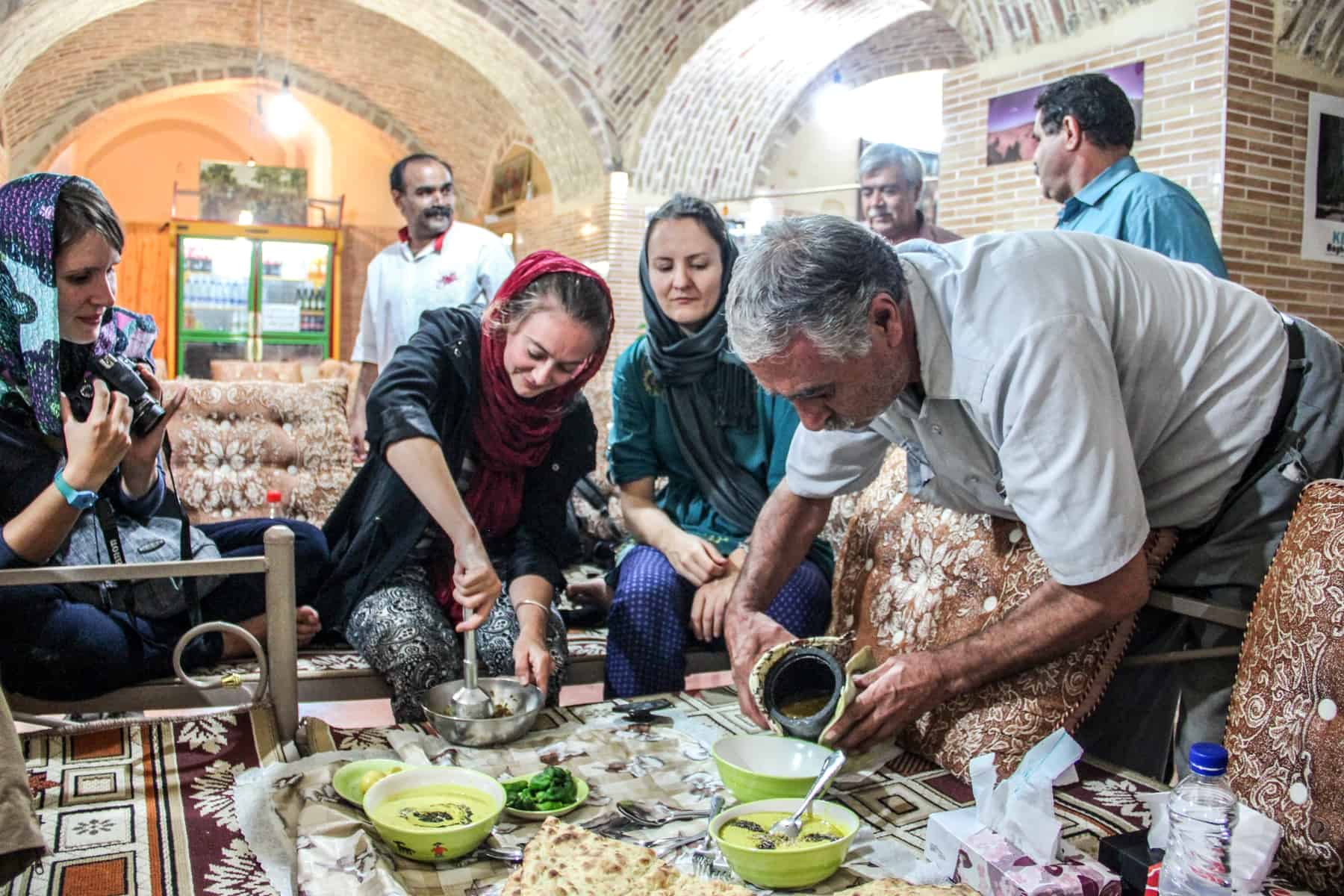
Food in Iran is better when locals show you real Persian cuisine.
There’s no alcohol in Iran. No bars, no clubs. Nothing. The best you get is non-alcoholic beer in a variety of fruity flavours like peach, lemon and strawberry which grace most menus.
There’s no set of different rules for travellers in Iran and those visiting. A local might be being kind in offering to find you the real deal at some underground gathering, but really, don’t take the chance. They might be able to waver the punishment; you won’t.
Like any country, it is crucial to know, understand and adhere to cultural and religious customs and rules that can often be very different from those at home. Here are the main rules for etiquette in Iran and interesting Iranian culture facts:
- One of the primary forms of social etiquette is TAROF, which is where Iranians usually insist on offering things to people and sometimes they do not mean it. However, you should not accept the first time.
- In Muharram month (the mourning month of Imam Hossein) people DO NOT usually wear bright colours (especially red) to respect the religious values.
- In Ramadan month , in which the majority of people keep fast during the day, it is disrespectful to eat and drink in public.
- In restaurants in Iran , it is incredibly unpleasant to see anyone clear their nose, especially loudly. In general, restaurant or not, it is also unusual to see somebody break wind.
- Shaking hands between men and women is a complicated topic. Generally speaking, it is not okay for men and women who are not related to shake hands. However, it is entirely relative. Usually, it is not advised for female tourists to extend their hand towards men, and it’s best to wait and see if the men do so first.
- The thumbs-up hand signal a derogatory sign in Iran, and it is best not to use it, especially in the presence of older people.
- When it comes to public displays of affection , you’ll see that affectionate touching, kissing, and shaking hands between men and women who are relatives are very normal. Iranian dating customs are more complex. You can kiss your significant other on the cheek, but french kissing strictly goes beyond the line. Holding hands is not something one would raise an eyebrow about at all, whereas hugging, on the other hand, would seem to be crossing the line a little. It is relative as to what extent the public display of affection is tolerated. For example, inside holy places and religious cities, it would not be easily tolerated.
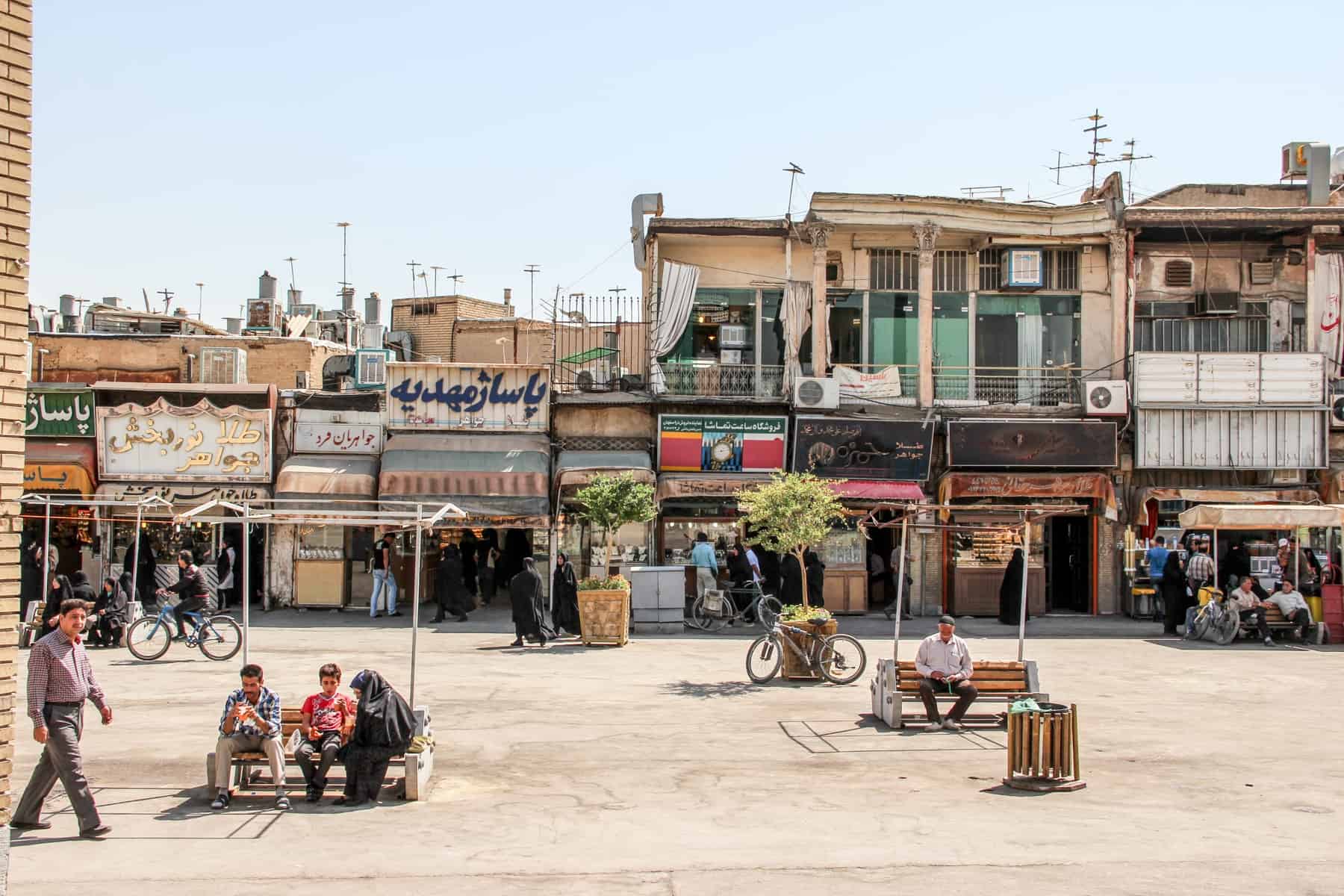
Wherever you are in Iran, it is important to adhere to cultural and religious customs and rules.
‘Persian Time’ is much like ‘Asian Time’ – things take much longer than you expect. When you travel Iran you’ll soon see that service is slower and the times you are given for things, like an arrival at a destination, are not always clear or roundabout correct, like this example:
Guide: “It takes four or five hours. So if we leave at 8 am, we will get there around 4 pm.”
Me: “But that’s eight hours, not four.”
Guide: “Yes, it takes about eight hours. We will stop at x, y and z on the way and arrive around 2 pm.”
In short, don’t rely on or worry about time, and pack a bit more patience than you would at home, especially when it comes to food, service and paying.
Ancient Persia isn’t an easily absorbed history lesson. While your guide (if you choose to have one or if you are a part of a tour group) will spout a level of information that will blow your mind, it is worth reading up on the history of Persia, as well as details on the lead-up to the Iranian Revolution in 1979. This will give a valuable understanding of the basic makeup of the country.
It will mean names like Zoroastrian, Cyrus the Great, the Achaemenid Empire, Reza Shah, Ayatollah Khomeini and Ayatollah Khamenei won’t be lost on you when you go to Iran.
Great books to read before you arrive include:
- Revolutionary Iran: A History of the Islamic Republic for a guide on the more recent history
Iran: What Everyone Needs to Know is by the same author, Michael Axworthy, and tries to explain how there’s more to Iran than its foreign relations, with part of the book also unravelling Iran’s economy, politics, culture and people.
Daughter of Persia: A Woman’s Journey from Her Father’s Harem Through the Islamic Revolution is about a woman who was born in Iran, left to study in the States and returned to a country in the grip of profound change.
- The Wind in My Hair: My Fight for Freedom in Modern Iran about a journalist in exile after being arrested for political activism
Best for when on the road:
- Easy reference for most of us came from the Lonely Planet Iran guide book . While it shouldn’t be your sole source of information, this particular Lonely Planet is a quick fix Iran travel guide, especially for historical hotspots. Having this paper guide was a handy resource for the entire trip, especially since quick access to the internet in Iran both at the hotels and while on the road is very limited.
Have you been to Iran? Are there any other pre-departure tips you would add? And if planning a trip there, and what difficulties are you facing, if any?
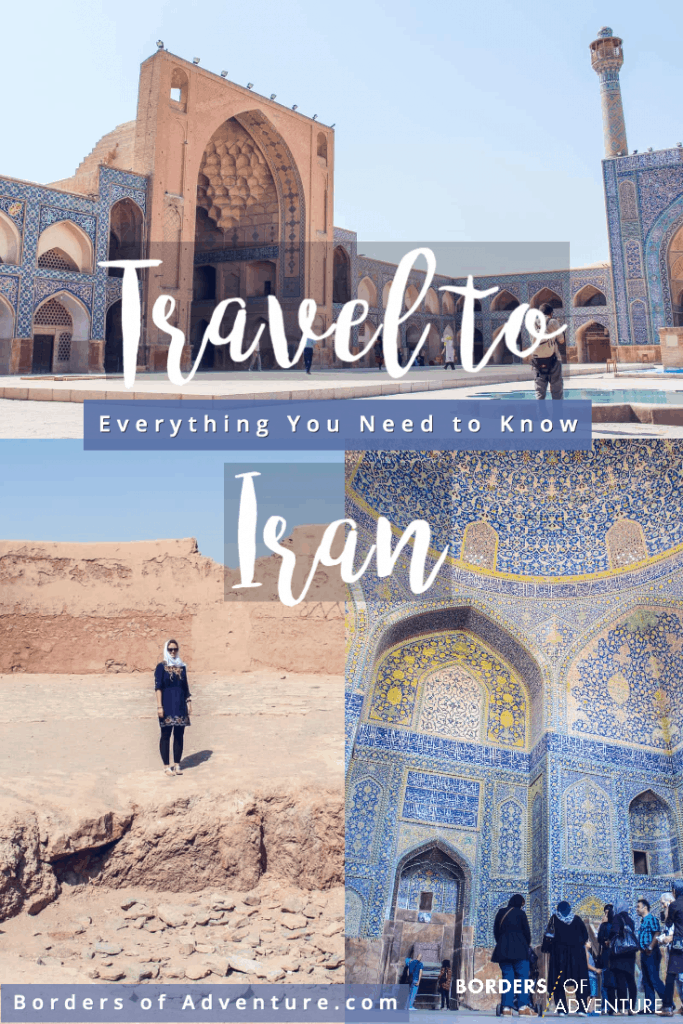
Any plagiarism of this Iran travel blog or any of its descriptions used on other sites and blogs without attribution is not information authorised by myself for use. Know your source.
About Becki
Becki Enright is a British Travel Press Award-winning writer whose work focuses on changing perceptions about misunderstood aspects of destinations. Her writing combines storytelling with insight into the social, historical, political and economic factors that shape the country or place in relation to tourism. Becki has appeared live on Sky News and CNN and has contributed to high profile media including National Geographic, Time.com, Guardian online, New York Times, Grazia and Buzzfeed.
Marcela says
19 April 2022 at 7:42 pm
Hi, is it possible to rent a car without a driver in Iran? Thanks, I loved your post!
28 April 2022 at 11:39 am
I think you can, yes! However, it isn’t something I know much about.
Hanieh says
28 March 2022 at 8:19 pm
Iran and Tehran are great🤩
7 August 2021 at 4:02 pm
Hello. I want to thank for this text. It is completely true about Iran and I as an Iranian approciate that describe Iran and Iranians truly. I really enjoy it. Most of Iranians think people of world consider us as a terrorist country while people of Iran differ from Republic Islamic Iran.
Miranda says
24 October 2019 at 8:53 am
I really like to travel to Iran, but I don’t know when is the best time to travel there, what is your recommendation?
24 October 2019 at 10:52 am
Hi Miranda. All the details are in the article. You can find an overview of the best time to visit Iran here: https://www.bordersofadventure.com/travel-to-iran-things-to-know/#When_is_the_Best_Time_to_Visit_Iran
- Article Archives
- Work with me
- Privacy Policy
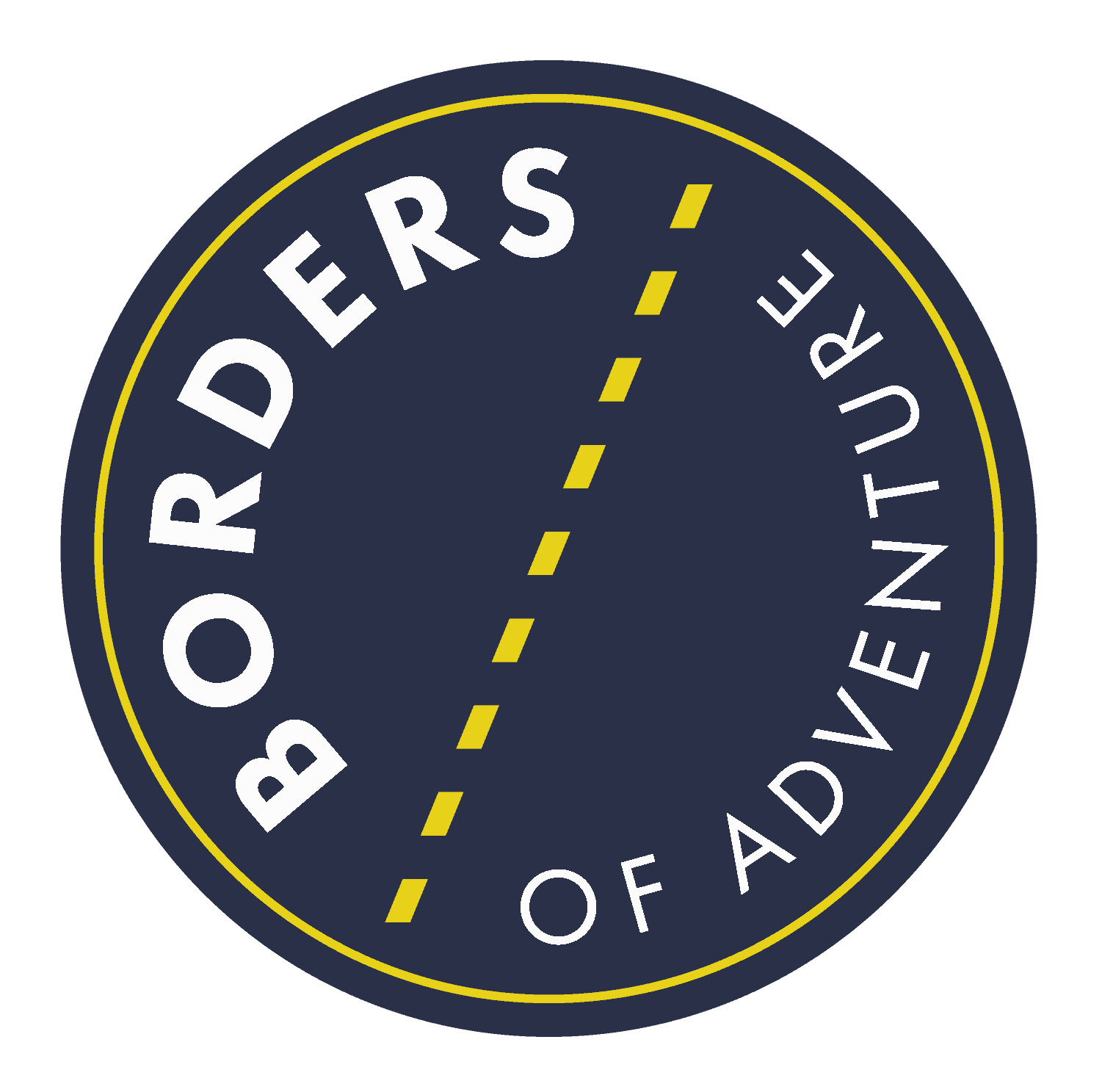
Cookies on GOV.UK
We use some essential cookies to make this website work.
We’d like to set additional cookies to understand how you use GOV.UK, remember your settings and improve government services.
We also use cookies set by other sites to help us deliver content from their services.
You have accepted additional cookies. You can change your cookie settings at any time.
You have rejected additional cookies. You can change your cookie settings at any time.
Bring photo ID to vote Check what photo ID you'll need to vote in person in the General Election on 4 July.
- Passports, travel and living abroad
- Travel abroad
- Foreign travel advice
Warnings and insurance
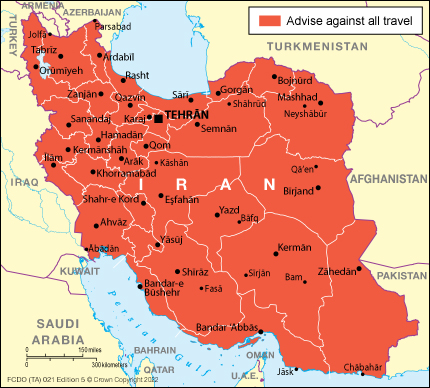
The Foreign, Commonwealth & Development Office ( FCDO ) provides advice about risks of travel to help British nationals make informed decisions. Find out more about FCDO travel advice .
FCDO advises against all travel to Iran
Your travel insurance could be invalidated if you travel against FCDO advice. Consular support is also severely limited where FCDO advises against travel.
If you’re a British national already in Iran, either resident or visitor, carefully consider your presence there and the risks you take by staying.
FCDO advises against all travel to Iran. British and British-Iranian dual nationals are at significant risk of arbitrary arrest, questioning or detention in Iran. Holding a British passport can be reason enough for the Iranian authorities to question you. If you are detained in Iran, you could face months or years in prison.
Find out more about why FCDO advises against travel .
Risks to British nationals in Iran
Consular support is extremely limited in Iran. If you need consular assistance you should contact the British Embassy in Tehran .
FCDO advises against all travel to Iran. British and British-Iranian dual nationals are at significant risk of arbitrary arrest, questioning or detention in Iran. Holding a British passport can be reason enough for the Iranian authorities to question you. If you are detained in Iran, you could face months or years in prison.
Find out more about why FCDO advises against travel
Dual nationals
The Iranian authorities do not recognise dual nationality. If you are a British-Iranian dual national and you are detained in Iran, the authorities will not tell FCDO or grant FCDO access to see you. If you are detained, your case will be in the hands of the Iranian authorities, who have shown a pattern of hostility towards the UK and British citizens.
Before you travel
FCDO advises against all travel to Iran.
No travel can be guaranteed safe. Read all the advice in this guide as well as support for British nationals abroad which includes:
- advice on preparing for travel abroad and reducing risks
- information for women, LGBT+ and disabled travellers
Follow and contact FCDO travel on Twitter , Facebook and Instagram . You can also sign up to get email notifications when this advice is updated.
Travel insurance
If you choose to travel, research your destinations and get appropriate travel insurance . Insurance should cover your itinerary, planned activities and expenses in an emergency.
Related content
Is this page useful.
- Yes this page is useful
- No this page is not useful
Help us improve GOV.UK
Don’t include personal or financial information like your National Insurance number or credit card details.
To help us improve GOV.UK, we’d like to know more about your visit today. Please fill in this survey (opens in a new tab) .
- 0 Shopping Cart 0 € -->

Everything to know before traveling to Iran (2024 Guide)
If you’re planning to visit Iran there are a few things you should consider before you go. We are trying to gather every fact & information you need to know before travelling to Iran to make your trip even better!
Iran is one of the most beautiful yet most maligned countries in the world. The western media has caused some misbeliefs about Iran, making some travelers hesitate before deciding to visit this amazing country.
In the following article we intend to clear these misbeliefs and give you some detailed information about the country, that every traveler needs to know before getting off the plane in Iran. Here are 25 things you need to know before travelling to Iran.
What to know before you visit Iran
Table of Contents
- Persians aren’t Arabs
- No hate towards Americans
- Confusing Currency and limited payment options
- Iran is safe and free of Islamic Extremists
- Driving and crossing the road
- Wi-Fi and VPN
- Prepare yourself for Squat toilets
- Iranians have various kebabs, stews and rice
- You’ll learn to have fun without alcohol
- Public affection
- Attention: Take of your shoes before entering
- Segregation in public transportation,gyms and pools
- Iranians are hospitable and welcoming
- Taxi in Iran
- Tap water is drinkable
- Many Iranians speak basic English
- Taarof , a confusing costume
- The weekend is on thursday and friday
- Ramadan, when restaurants and cafes are closed during the day
- You need a visa for Iran
- Don’t take photos of military settlements and equipment
- Hotels will keep your passport
- Any car can be a taxi
- You might need an electrical adaptor and power converter
1-Persians are NOT Arabs
Although Iran is located in the Middle East and is close to Arabic countries, Iranians are Persians not Arabs. Only 2 percent of the population of the country is comprised of the Arabic race.
While both Iranians and Arabs are mostly Muslims, Iranians have different traditions, language, calendar and national celebrations dating back to thousands of years ago. Moreover, the official language of the country, Persian is not to be confused with Arabic, despite their share of script and similar words.
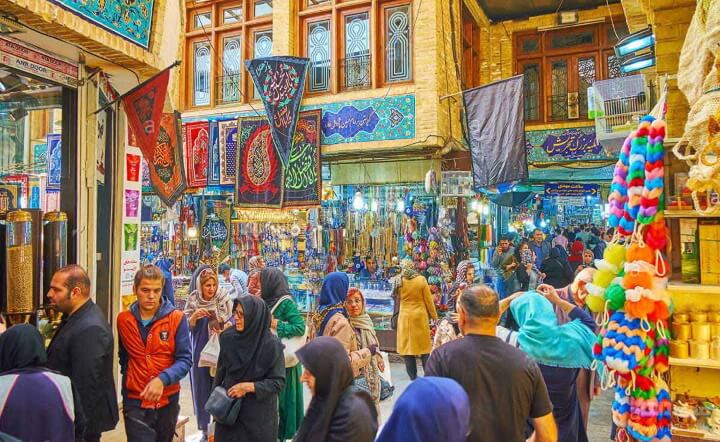
2-No hate towards Americans
The Iranian and American politicians have not had the best relationship since the Iranian Revolution in 1979. There have been few governmental protests since then.
The Down with USA slogan sometimes heard in these protests is only aiming American politics and has nothing to do with its citizens.
Despite the anti-America slogans and posters seen in some of the public areas in Iran,none of the Iranians even those participating in governmental protests have no negative feelings towards Americans and are kind and welcoming towards them.
If you’re travelling to Iran as an American, you can be sure that Iranians will welcome you like any other traveler and won’t let politics get in the way of showing you their hospitality. You can also read former American travelers’ reviews on Trip Advisor and ask them about their experience in Iran.
We also recommend you to see this & this video, made by an american tourist who has traveled to Iran several times.
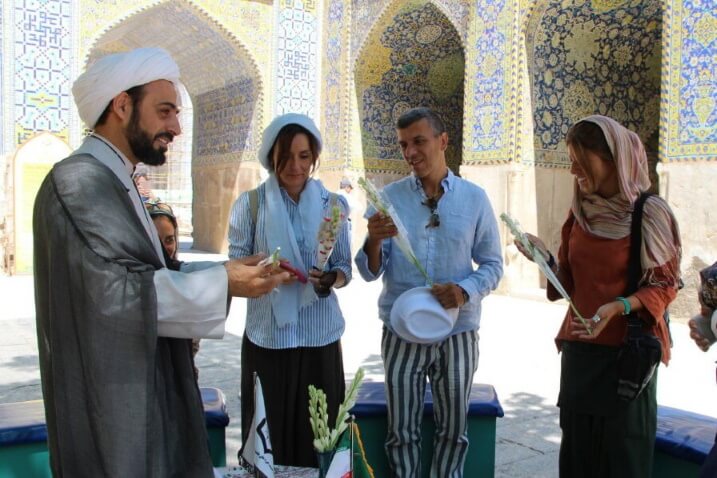
3-Confusing Currency and limited payment options
The official currency of Iran is Rial; however, due to the dramatic decrease in its value in the last few decades the prices are now indicated in Toman. Each Toman equals 10 Rial.
The bills and coins are still in Rial so in order to find out the value in Toman you just need to omit one zero. Nowadays the regular range of prices is in thousand Tomans so the locals don’t bother with all the zeros and sayToman instead of thousand Toman.
To clear things more let’s see some examples:

Iranian/Persian numbers
The price of a pack of gum is usually around 50000 Rials or 5000 Toman . When asking for the price the seller will probably tell you 5 Toman, which equals one of these 50000 Rial bills:
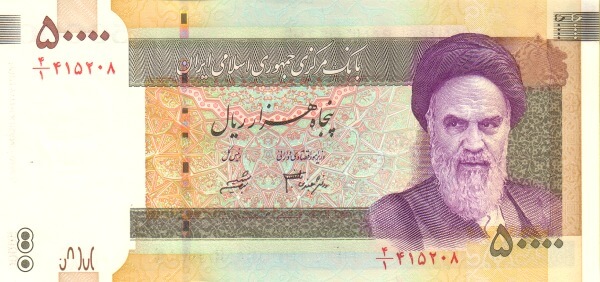
50000 Rials, equals 5000 Tomans, often referred to as 5 tomans (Panj toman in Farsi/Persian language).
Note: The price written on products or restaurant bills can be stated in Toman or Rial.It’s best to ask the seller to make sure.

100000 Rials,equals 10000 Tomans, often referred to as 10 Tomans (Dah Tomans in Farsi/Persian language)

500000 Rials,equals 50000 Tomans, often referred to as 50 Tomans (Panjah toman in Farsi/Persian Language)
Payment methods
Unfortunately, credit cards and international debit cards such as visa and mastercard are not supported in Iran. This leaves the travelers with two options.
Carrying all the money in cash You can exchange money at the airport, banks and exchange offices available in cities. Avoid exchanging money in the street or paying for the things you’ve bought with euros or dollars as the exchange rate is constantly changing.
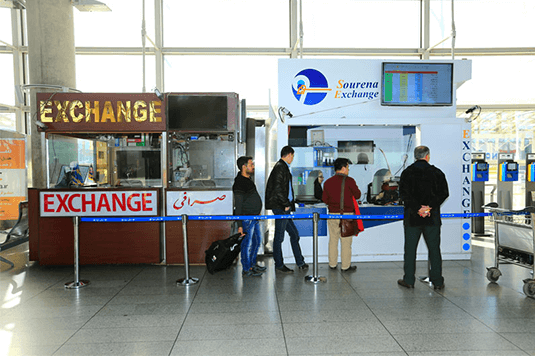
Imam Khomeini Airport Currency Exchange
Buying an Iranian debit card If you find carrying a large amount of cash hard and insecure, it’s possible to buy a debit card from the various companies available. You can then pay directly with the debit card at most shops all over the country or purchase cash from ATMs.
We at Cheetah-Adventures provide our travelers with a local debit card during their tour as a charge-free service .
4-Iran is safe and free of Islamic Extremists
We’ll start by rejecting one of the most common misbeliefs about safety in Iran. Despite being in the Middle East there are no traces of war or Islamic groups such as ISIS in any part of Iran. In fact, Iran is a safe country for traveling and besides regular pickpocketing seen in any other busy location in the world, there is nothing to worry about.
This being said, it’s still important to take necessary precautions like locking the door to your hotel room, keeping an eye on your valuable belongings and avoiding walking alone in uncrowded streets at night.We recommend you to check other travelers’ reviews on Trip Advisor to be sure that none of them haven’t had an unpleasant experience regarding safety in Iran.
Our Iran Safety article goes through the different factors of safety in Iran. You can also contact us on WhatsApp 24/7 for further information.

Tourists in Naqsh-e Jahan Square, Isfahan, Iran
5-Driving and crossing the road
Iranians have their own way of driving. Although they may seem careless as first,their way of driving is safe for locals. However, the driving culture in Iran is rather different from what most travelers are used to,making driving a difficult task for foreigners.
We recommend travelers to use public transport and taxis for their inner-city transportation rather than renting a car. Another thing that should be taken into account is that crossing the streets in Iran requires a bit of courage.
The cars won’t stop until you start walking in the middle of the street and speed up at the sight of the yellow light to pass before it turns red. So don’t be afraid and start crossing the street instead of waiting for the cars to stop before that and avoid crossing the street at yellow light.
You can ask a local to accompany you the first few times.

A view of one of Tehran streets.
6-Dress code
As Iran is an Islamic country, following a certain dress code is a law that applies to everyone including travelers. This dress code requires women to cover their hair with a scarf, wear long-sleeve shirts that reach below the waist and long pants.
Men must also avoid wearing sleeveless shirts and shorts. Although it seems hard at first, the dress code for Iran is rather flexible and it’s even less strict for travelers.
Note : The dress code must be followed from the moment your plane lands in Iran. You can read our complete guide to Iran dress code .
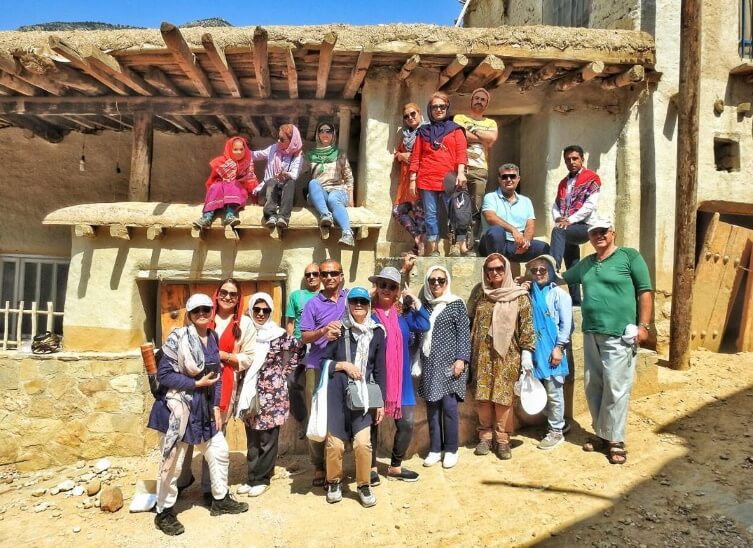
7-Wi-Fi and VPN
Unlike most European countries free Wi-Fi is not available in most restaurants, cafes and malls ;however,most hotels, hostels and homestays offer free Wi-Fi to their guests. Thus to make sure you can access the internet everywhere, it’s best to buy an Iranian SIM card and use its data package.
4G data is available throughout the country with Iranian SIM cards. In addition, it’s important to have a VPN (virtual private network) installed on your phone beforehand as many social media websites and some other ones such as YouTube, Facebook , Twitter, etc.
are blocked by the government. WhatsApp is not blocked and is working fine. We at Cheetah-Adventures provide our travelers with a portable modem with Wi-Fi during their tour as a charge-free service.
8-Prepare yourself for Squat toilets
Although western toilets are now available in many restaurants, malls and hotels, most of the homes and public areas still only have Iranian toilets or squat toilets, so prepare yourself for some extra effort.
In addition, many of the public restrooms don’t have toilet paper, leaving you with two options: either having a roll of toilet paper with you all the time or adapt to the situation and use water instead (with a hose) like locals.

Squat toilets – hotels usually have western toilets as well.
9-Iranians have various kebabs, stews and rice
Persian Kabab may be the most famous Persian food but Iranians have various delicious and healthy foods. Don’t restrict yourself to kebabs or fast food when traveling to Iran and try their various local homemade dishes.
Most of the Iranian dishes are served with a large amount of rice or bread, so if you feel like you’d like your meal with less rice you can let the waiter know when ordering. Furthermore, aside from Kebabs Iranian dishes are usually stews or rice mixtures containing either beef or chicken and several vegetables and grains.
If you’re a vegetarian make sure to ask the waiter or your guide to tell you the ingredients. See Iranian Cuisine articles here .

Different types of Iranian Kebab!
10-You will learn to have fun without alcohol
Being an Islamic country, Alcoholic drinks are banned in Iran and are not served in restaurants. There are also no bars in the country and alcohol is only found in the black market which can be risky to buy.
There are plenty of other drinks offered in restaurants and bars, ranging from the typical coca-cola to juices, various types of coffee, tea, and several local drinks.
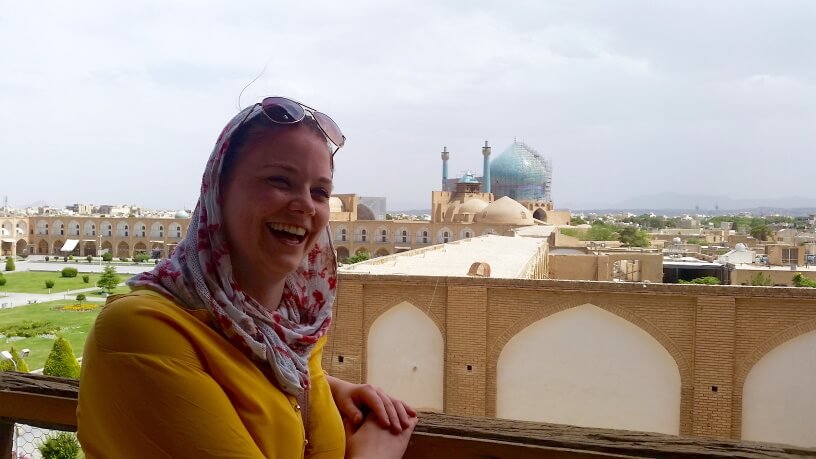
11-Public affection
The rules of Islam forbid men and women who are not married or related to each other from touching in public; however, this rule is not strictly followed in reality.
If you’re traveling with your partner, it’s ok to hold hands and hug but it’s best to save further affection for private areas especially in more religious cities such as Yazd and Kashan.
Moreover, many men and women shake hands despite what is spread in the media but to avoid any further misunderstanding, it’s best to wait for locals to offer you their hand.

12-Attention: Take off your shoes before entering
Carpets are seen in almost all Iranian homes, mosques and hotel rooms, thus Iranians take their shoes off whenever entering their home or a mosque.
It’s recommended to take your shoes off if you’re invited to somebody’s home or when entering the praying hall of a mosque, but it’s unnecessary when it comes to your hotel room.

Notice that tourists has taken their shoes off before entering the mosque.
13-Segregation in public
transportation, gyms and pools
If you’re the type to use public transportation for inner-city transport, it’s important to know that buses and subways have two separated sections. One of these sections is restricted to women only and the other is coed. This segregation is not taken very seriously in subways and men enter the women’s section very often during the rush hour.
Furthermore,Gyms and pools have separate schedules for men and women. They’re usually open to women from early morning till 4 5 pm and then for men till midnight. Even if you’re travelling with family, women and men aren’t allowed to use gyms and pools together.

Women-only wagons of Tehran metro . women can use other wagons as well.
14-Iranians are hospitable and welcoming
Iranians are famous for their unique hospitality and kindness towards travelers. While it might seem strange in other countries, people will approach you very often in Iran just to greet you and welcome you to the country.
As a traveler you might also get invited to have a cup of tea or coffee many times. While travelling in Iran you’ll be greeted by locals everywhere and probably get invited to lots of homes. In addition, the locals are always ready to help if you’re lost or in need of any help.
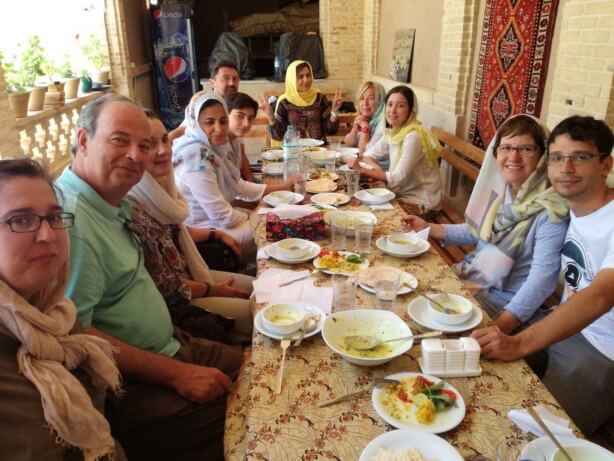
15-Taxi in Iran
The taxi system in Iran is a little different from anywhere else around the world. There are three types of taxis in the country:
The calling taxi : These types of taxis are the most popular type among locals and the cheapest as the price is divided among the 4 passengers.
How it works is usually the driver is waiting by a junction or in a taxi station, calling out its destination until the car is full.
It also works vice versa and sometimes the passengers call out their destination to the taxis passing by until one of them stops. This type of taxi is not usually recommended to travelers.
The normal European taxi : This type of taxis work the same way a normal taxi in most European countries does. Just remember to be clear about your destination and agree on a price with the driver before getting in.
It’s better to ask the locals about the usual cost of taxi for your destination as the taxis in Iran don’t have taximeters.

Iranian Taxi
Iranian Uber : Using the Iranian Uber is the easiest and least time consuming way
to get around inside the cities. The mobile application, named Snapp, can be installed from Google Play and app store and works just like Uber.You can download it from here too. The price is always stated in the application as soon as you mark your destination.
Note that the driver may call you to ask where you are if so you can just respond with location and remember to mark your exact location on the map. Snapp is available in all major cities and many of the smaller ones.
Tap30 (pronounced as Tap-si, just like taxi) is another application similar to Uber and Snapp. you can download it here .

Iranian Uber application, named Snapp.
16-Tap water is drinkable
The tap water is drinkable in most of the cities in Iran, but it’s necessary to ask the locals to make sure.
There is also drinkable water available in most parks, subway stations and malls so we recommend having a refillable bottle with you throughout your trip in order to avoid buying numerous plastic bottles.
17-Many Iranians speak basic English
Persian is the official language of Iran and its various dialects are spoken all over the country. Many of the educated people in Iran speak basic English and among them people under the age of 30 speak it better.
In spite of this, it’s recommended to learn basic Persian phrases like greeting, addressing and asking for prices to facilitate communication during your stay.
It’s also beneficial to learn the written form of numbers in Persian as the prices are usually written on products.

18-Taarof, a confusing costume
Taarof is considered one of the strangest Iranian costumes. It’s usually done to show respect towards the other person. For example Iranians may often ask you to walk through a door before them to respect you.
Another example of Taarof is Iranians, including shopkeepers, taxi drivers etc.tend to reject your payment at first but you have to keep insisting until they accept.
If they don’t accept after 3 4 rounds of rejecting and insisting then it means they wanted to give you a complimentary service.

A picture of Rasht bazaar, be aware of “Taarof” when you go shopping!
19-The weekend is on thursday and friday
The Iranian Calendar is a bit different from the rest of the world. The Persian week begins on Saturday and ends on Friday, with Thursday and Friday being the weekend.
The shops are usually open from Saturday to Thursday and from 10 pm to 9 pm. However; grocery stores tend to open around 6:30-7 Am and close at 10-10:30 pm daily. Furthermore, malls and shopping centers usually open at 10-11 Am and are open until 11:30-12 Pm and they’re also open on Fridays.
The restaurants and cafes in major cities usually have long opening hours with the cafes working from 8 AM to 12 PM and restaurants from 11 AM to 12 PM every day.
Note: During summer many local shops and bazaars are closed from 2 to 4 PM in hot cities.
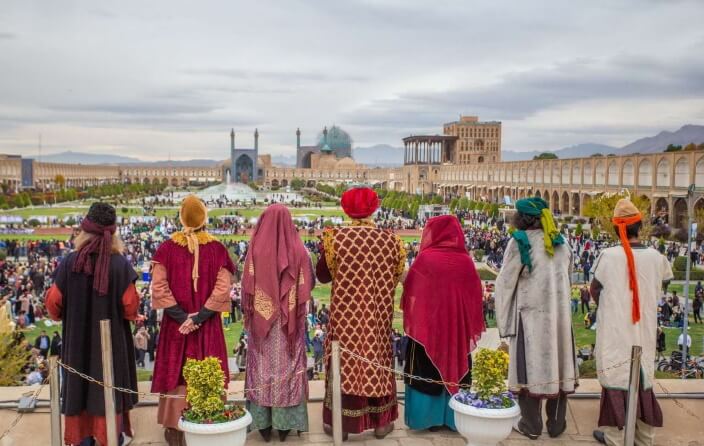
20-Ramadan, when restaurants and cafes are closed during the day
Muslims all over the world fast for a month each year, meaning they avoid eating, drinking and smoking from sunrise to sunset.
This month is called Ramadan and it’s the ninth month of the Islamic( Arabic) calendar. As most restaurants, juice bars and cafes are closed from sunrise to sunset, it’s best to avoid traveling to Iran during this time.
21. You need a visa for Iran
Most of the countries around the world, with the exception of a few, require a visa to enter Iran. For most nationalities both visa on arrival and visa in advance are available; however, a few are not eligible for a visa on arrival and some can only apply for a visa through a travel agency. The process of obtaining an Iran visa is a rather easy one and travelers are usually granted a visa that is valid for 3 months and allows them to spend up to 30 days in Iran. Even though many nationalities are eligible for a visa on arrival, it’s recommended to apply for a visa in advance to avoid long waiting lines at the airport. You can apply for an Iran visa using the official website of the ministry of foreign affairs or through a travel agency such as Cheetah-Adventures . For a complete guide on how to get Iran visa check out the Iran Visa Application page .
22. Don’t take photos of military settlements and equipment
As a traveler, you will definitely find many things interesting and take many photos but you should be aware that photography is banned in some locations. Taking photos of military settlements, police stations and forces, factories, power plants and other strategic buildings such as ministries is legally banned due to national security matters. It’s best to pay attention to no photography signs and ask permission before taking photos if you’re not sure.
23. Hotels will keep your passport
Some of the hotels may keep your passport for the duration of your stay; however, there’s no need to worry as they will be kept safe. As your passport may be your only identification document during your trip, it’s recommended to have a copy of your passport with you. You can also ask the hotel reception to make copies of your passport and return the original.
24. Any car can be a taxi
Taxis are usually yellow or green all around the world but things are a little different here in Iran. In addition to the normal green or yellow taxis, many of the taxis are normal( private) cars, especially the ones working in Snapp (Iranian Uber). This type of taxi is very common and is usually safe; however, it’s better to try to find yellow taxis as they have a valid work permission.
25. You might need an electrical adaptor and power converter
The standard voltage of the electricity in Iran is 220 V and the frequency is 50Hz, thus you’ll need an adaptor to use electrical appliances working in a different voltage range. In addition, the plugs in Iran are the European type (type c) and you’ll need a converter for other sockets.
- Isfahan Travel Guide
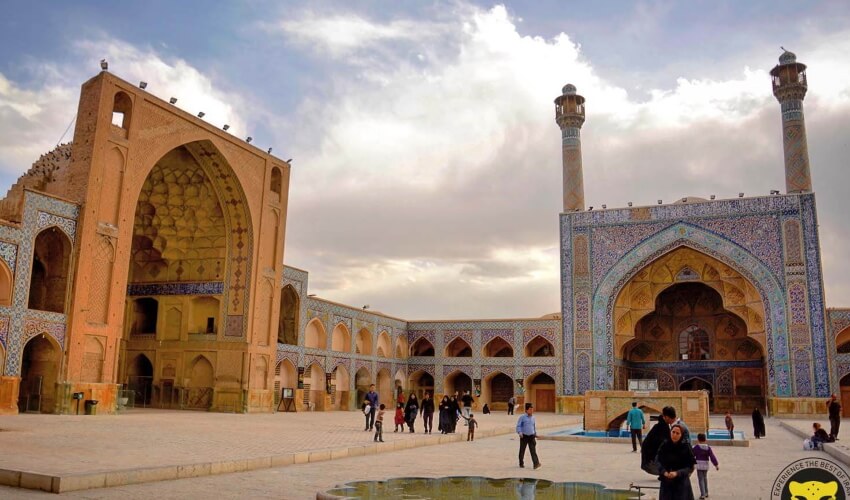
- Kashan Travel Guide
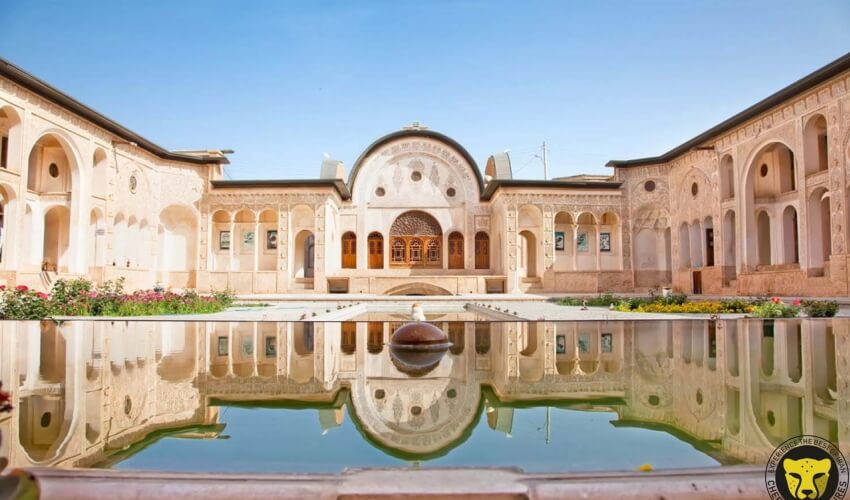
- Tehran Travel Guide
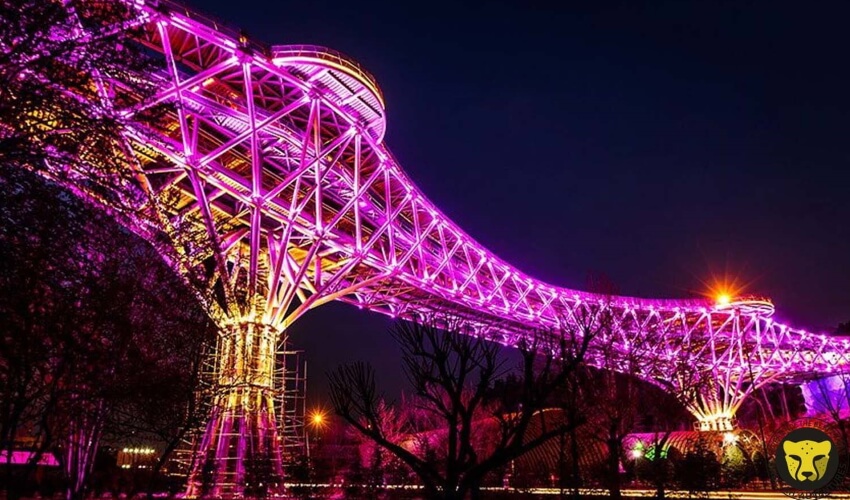
- Shiraz Travel Guide
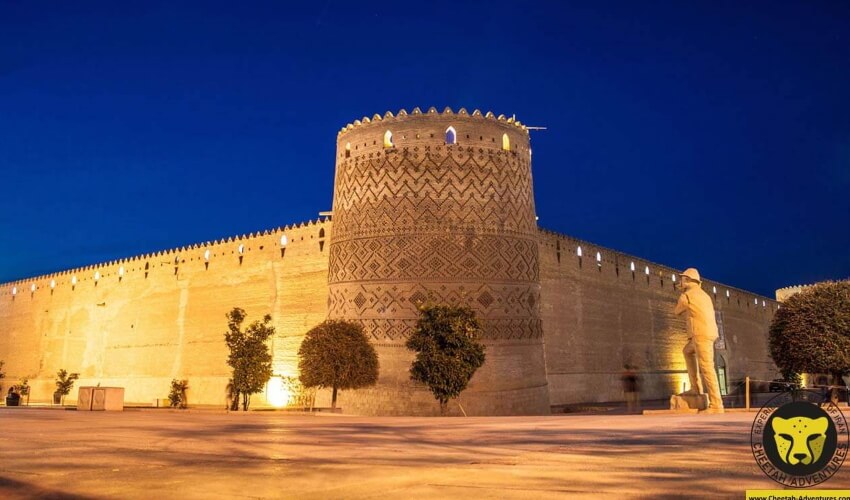
- Yazd Travel Guide
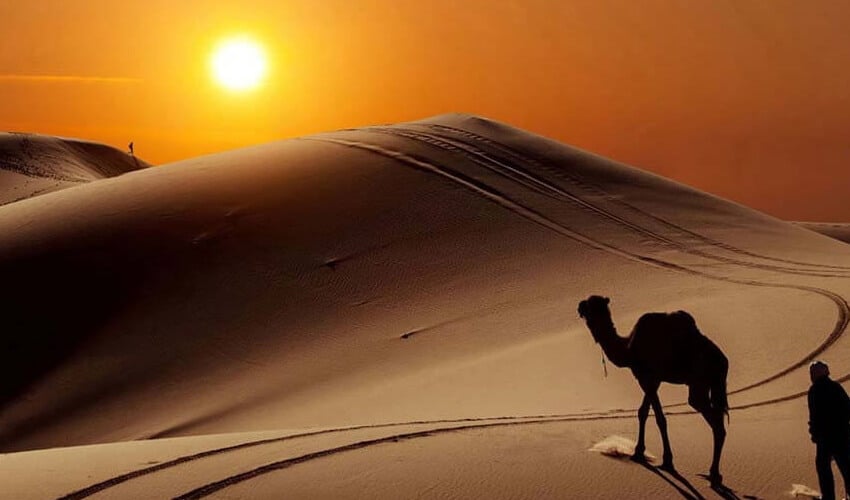
- Kerman Travel Guide
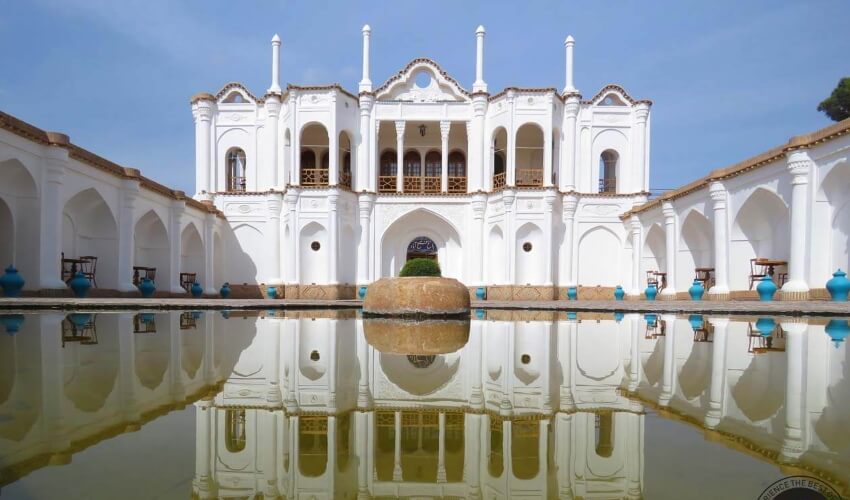
- Tabriz Travel Guide
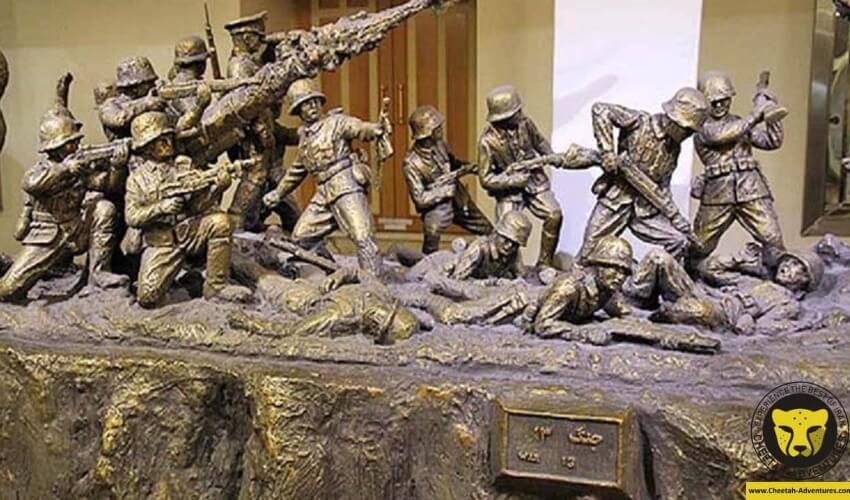
- Rasht Travel Guide

Book an Iran Tour Package
Best Iran Private & Group Tours
Apply for Iran Visa Online
Iran Tailor-Made Tours
Customize your own trip to iran
Iran Travel Blog Latest Posts
Iran Travel Blog Newsletter
Email Address *
Iran Travel Tips
- Iran Safety
- Every Thing to know before travelling to Iran (2024 Guide)
- Iran Dress Code
- Ardabil Travel Guide
- Qazvin Travel Guide
- Qeshm Travel Guide
- Bandar Abbas Travel Guide
- Iran Deserts
- Iran Cultural Tours
- Damavand Tour
Iran Travel FAQ
Can females drive in iran.
Yes. women are allowed to drive in Iran given that they have a driver’s license like in any other country.
What is the full face veil called? (Burqa)
The face veil that some Muslim women wear is called Burqa.
Is wearing Burqa Mandatory in Iran?
Absolutely not! Wearing Burqa or Chador is not obligatory in Iran but women are required to wear hijab in public areas. Wearing Chador is only obligatory when entering holy shrines.
Read all about Iran dress code .
Can Tourists buy alcohol in Iran?
Not Legally. Alcoholic drinks are banned in Iran but they can be found on the black market.
Is dating allowed in Iran?
Of course it is. Iranians date each other like people living in any other country but public physical affection such as kissing is frowned upon especially in religious cities such as Yazd and Kashan.
What should I buy from Iran?
Iran has a variety of arts and handicrafts specific to each city. The most popular ones are carpet, enameled glass, khatam, etc. You can also buy various local sweets such as Baklava, Qottab, Halva, and fruits such as pomegranate and pistachio. All souvenirs related to Iran cities are introduced in Iran Destinations Page
How much is saffron in Iran?
The price may vary but normally it’s about 2 dollars per gram.
Is saffron cheaper in Iran?
Saffron is generally cheaper in Iran as it is one of the top countries producing it.
What is Iran famous for producing?
Iran produces a variety of foods from sweets to Kaviar and pistachio. There are also many beautiful handicrafts such as carpet, clay pots, and enameled glass found in different cities.
Got questions? We’ll be glad to answer!
Leave a Reply
Leave a reply cancel reply.
Your email address will not be published. Required fields are marked *
Save my name, email, and website in this browser for the next time I comment.
Click to send a message on WhatsApp
Subscribe for Hot Deals
About cheetah adventures.

Cheetah-Adventures is an Iran tour operator & Iran travel agency aiming to provide services for travelers from around the globe who aim to visit Iran. Cheetah-Adventures is named after the Iranian Cheetah, a critically endangered cheetah subspecies surviving today only in Iran.

Why you should travel to Iran as an American (and what to expect)
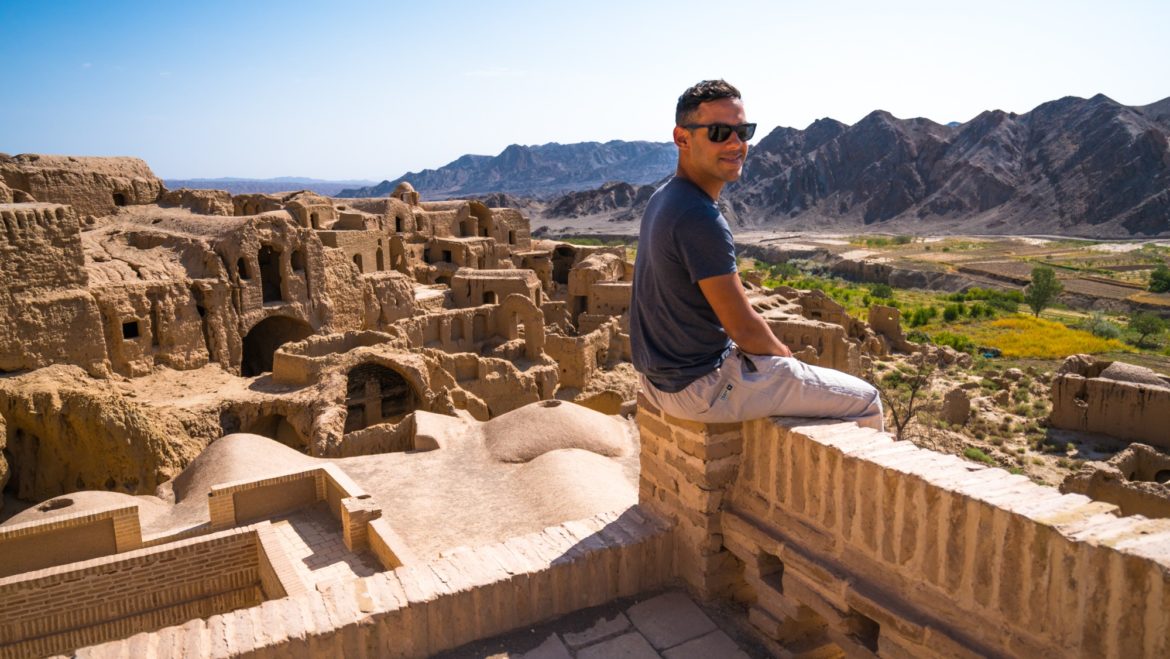
Packed with over 5,000 years of history, Iran is a destination everyone must experience at least once in their lifetime. From the ancient Persian Empire to the Zoroastrians temples, the countless mosques, and even the modern cities like Tehran, there is so much to see that one visit will not be enough.
After traveling to Iran on Intrepid Travel’s 14-day Iran Adventure trip, I shared my experience with many of my friends. Most of them replied with a similar response, “I’d love to go to Iran!”
This is a common response among travelers, yet not many actually plan a trip to the country due to misinformation, lack of information, or fear.
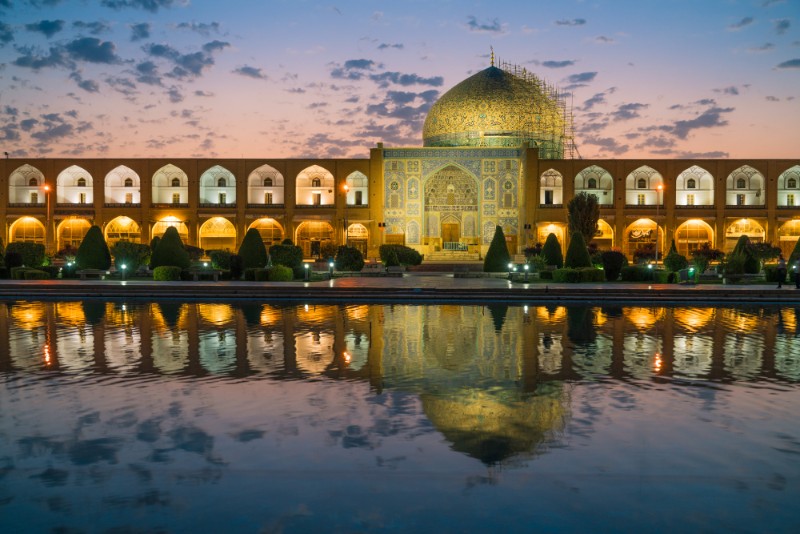
Sunrise at Naqsh-e Jahan Square, Esfahan
To encourage you to plan a trip to this wonderful destination, I’ll share with you a few reasons why you should travel to Iran as an American, debunk a few myths, and tell you what to expect there.
No, they don’t hate Americans
Contrary to what you see in the media, Iran is one of the friendliest and culturally-rich countries you’ll ever visit. And no, they do not hate Americans or any other Western nation. That’s just fear-mongering and it is far from reality.
READ MORE: 6 COMMON MISCONCEPTIONS ABOUT TRAVEL IN IRAN
When I arrived, I debated how open I wanted to be about my nationality. But as soon as I met Nadia, our Intrepid Travel guide, she put to rest any mild concerns I had about sharing openly that I’m American. No one has an issue with it.

Intrepid leader, Nadia
MEET NADIA, THE INTREPID LEADER WHO WILL CHALLENGE YOUR PRECONCEIVED NOTIONS ABOUT IRAN
As we traveled the country, countless locals approached me and my other tour companions to chat with us. They were all curious to know about us, our life in our respective countries, and how we were enjoying Iran. On our part, we were just as curious to learn about them, so we fed each other’s curiosities over tea and casual chatting.
One of my favorite random encounters happened just before leaving Iran. I spent my last few hours in the country visiting the Azadi Tower, where I met a few early 20-something local guys. As soon as one of them learned I was American, he expressed with joy how much he’d love to visit the US and shared his vast knowledge of the country. In fact, he was wearing an American flag bandana.
Everywhere you go, you always feel that warm welcome Iranians are known for.
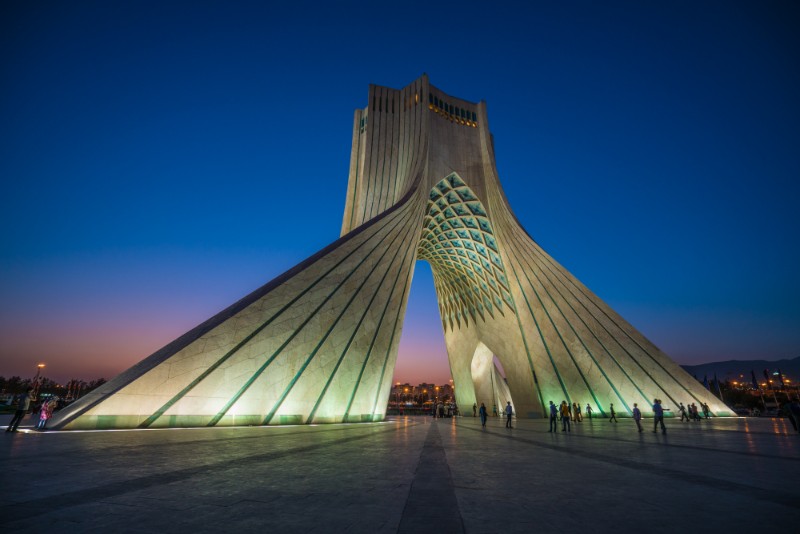
Azadi Tower in Tehran
The visa process is extensive, but worth it in the end
Yes, the visa process is more complicated than in many other countries, but it should not be a deterrent to visiting Iran. Due to the current political environment, Americans are having a tougher time to get their tourist visas approved, but still, it is possible to get them. Thankfully, Intrepid Travel helps you get your visa by guiding you every step of the way with their visa application form.
HERE’S EVERYTHING YOU NEED TO KNOW ABOUT THE VISA SITUATION
Once you get the visa, set foot in the country, and experience everything it has to offer, you’ll see that that the extra process was all worth it.
There’s so much history to be learned and experienced
As the host to one of the oldest civilizations in history, Iran has no lack of ancient ruins and historical sites. Everywhere you go, you’ll be surrounded in hundreds, if not thousands of years of history.
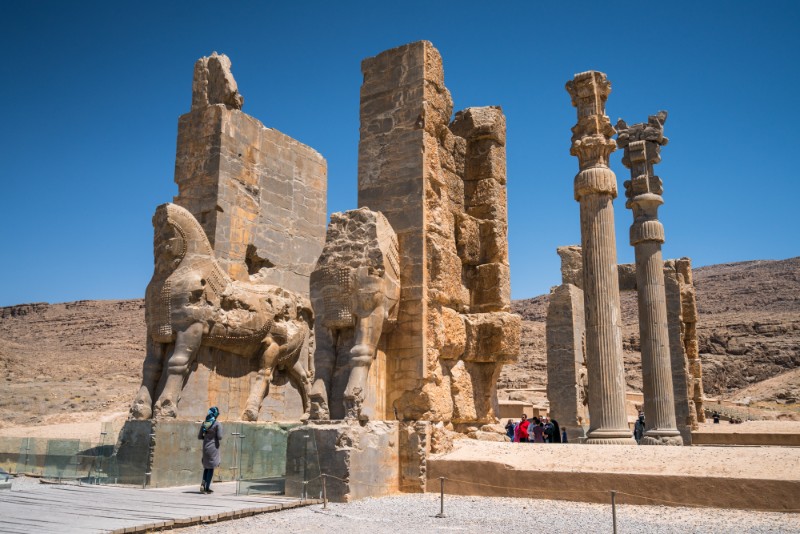
Gate of All Nations in Persepolis
From the Elamite Kingdoms, to the Persian Empire, Alexander the Great’s conquest, the Arab invasion, and even the 1979 revolution, each city you visit will show you a piece of the historical puzzle and how they played a part in the development of Iran as we know it, its neighboring countries, and even the rest of the world.
One of my favorite experiences on this trip was spending a night at the Zein-o-din Caravanserai. A caravanserai is an ancient fortress-like facility used by merchants traveling along the silk road around 450 years ago. They would spend the night there to rest, feed their camels, and trade goods before continuing their journey. Today, this one caravanserai is open for us to spend the night right where merchants used to sleep.
BROWSE INTREPID TRAVEL’S RANGE OF TRIPS TO IRAN
You’ll experience a positive culture shock
I think some of the best travel destinations are the ones that teach you something new through experiences, and Iran has no shortage of that. The level of culture shock in the country is significant, but in a positive way. You’ll see how, despite their current economic and political status, Iranians still welcome you with a smile and the warmest hospitality you could hope for.

You’ll be welcomed with an abundance of food, too!
You’ll see how women are proud of their trendy fashion, how their carpet artistry is among the finest in the world, how the nomadic culture is still alive, how their local markets are the center of activity, and how families gather at parks and squares to picnic at night until well past midnight (it can get too hot to picnic during the day).
You’ll also see how religion is deeply tied to their society and the many intricate details that make their culture unique. You’ll see all kinds of people, from the most conservative to the most liberal, and the beauty of all of them coexisting in one place.
SUBSCRIBE TO INTREPID’S NEWSLETTER FOR TRAVEL TIPS, STORIES, GIVEAWAYS & MORE
It’s good to be ambassadors of our country
As I mentioned previously, locals will talk to you and ask you about life in the US or your country. This is our opportunity to show them who we really are not only as a Western nation but also as humans. There is no better way to learn about a country than by talking firsthand with locals, the people who live and breathe their country every day. They will share with you their proudest moments, their struggles, and their desires.
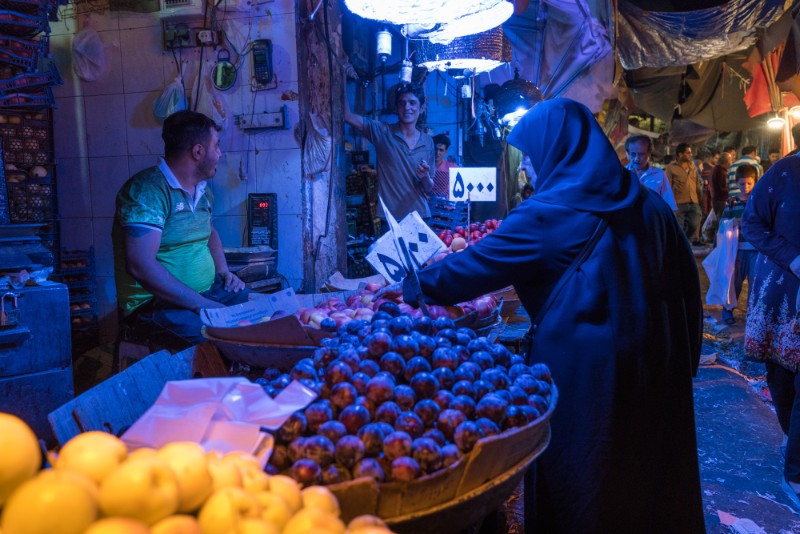
Locals in the vegetable market in Shiraz
Another fear-mongering myth is that Iran is not safe. But again, it is the opposite. Locals aren’t looking to harm, kidnap, or threaten Americans. I never felt in danger, not even when I walked on my own in the city of Esfahan past midnight.
Traveling solo is safe, but as Americans, you will be traveling on a tour (since it is required), so that’s even another safety layer.
TRAVEL STORY: “I’VE CYCLED THROUGH OVER 40 COUNTRIES; HERE’S WHY IRAN STANDS OUT”
There’s no alcohol, pork, and no American/Western chains
For good or for bad, alcohol has been banned in the country since the revolution in 1979. Pork isn’t found either, but this is more because of Islamic customs. American and Western chains are not found in the country due to economic sanctions and the complicated political relationship Iran has had with the Western world for decades now.
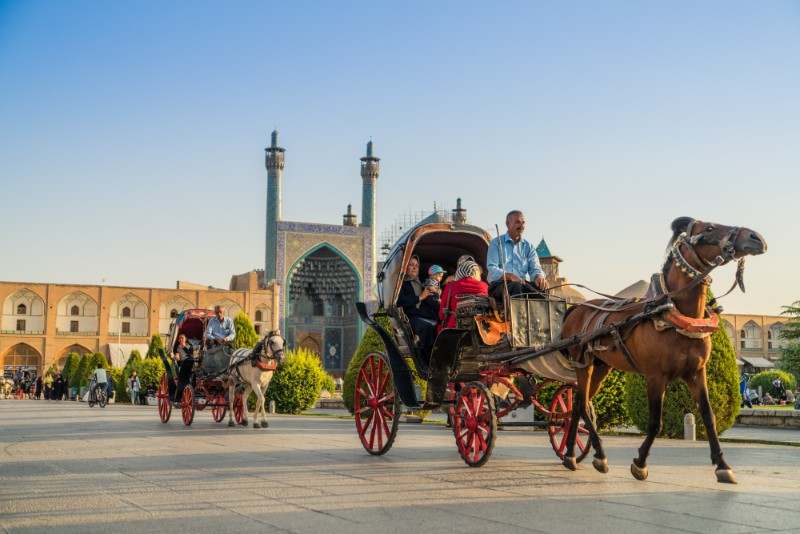
Esfahan – one of Iran’s many unique and compelling destinations
What you will find, though, are knock-off versions of popular fast foods like McFood, a different KFC, Burger Queen, and so on. It’s fun to see how they reinterpret and adopt the Western culture not only on their food but also on their fashion and entertainment too.
There is so much more to be discovered and experienced in Iran and no post will compare to the beauty of seeing it all firsthand. If you are as intrigued by the country as I was before I went there, I’ll tell you, it will impress you and possibly even surpass your expectations. At least, it surpassed mine.
Ready to visit this incredible destination for yourself? Check out Intrepid’s small group tours in Iran.
Further reading
- Travel to Iran: a 2019 visa update for US, UK and Canadian citizens
- Everything you need to know before visiting Iran
- Why you should visit Iran now, more than ever
- 5 unique experiences you shouldn’t miss in Iran
- What to wear in Iran: a packing guide
(All images courtesy of the writer, Norbert, and taken on Intrepid Travel’s Iran Adventure trip.)
Feeling inspired?

Norbert Figueroa
Norbert Figueroa is an architect from Puerto Rico who hit pause on his career in 2011 to travel the world long-term. So far he’s traveled to over 125 countries in hopes of achieving his goal of visiting all 195 UN-recognized countries. You can follow his adventures at globotreks.com and on Facebook and Instagram @globotreks.
You might also like
The undeniable benefits of slow travel, over 20 years of the intrepid foundation: a..., everything you need to know about a night..., 5 places to escape the crowds in italy..., the 7 best places to go on a..., 10 surprising facts about ethiopia, from delhi to udaipur, here are the five..., galapagos or madagascar which unique destination should be..., travelling to chile here’s the best time to..., 10 reasons to visit samoa, travel globally and think locally with intrepid leader....

Is It Safe to Travel to Iran Now? Iran Travel Safety Advices 2023
“the first condition of understanding a foreign country is to smell it” rudyard kipling.
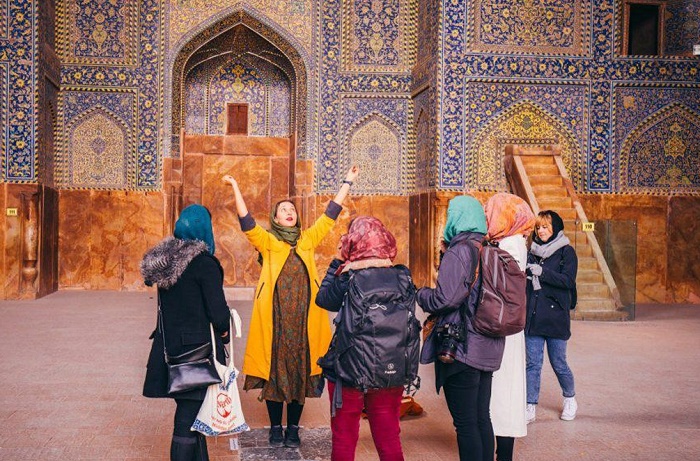
Despite what mainstream media wants you to believe, Iran has always been one of the safest places for tourists. So much so that some have even described the Iranian people as the friendliest and most hospitable people they’ve met! And it is no exaggeration! Iranians go out of their way to make a tourist feel welcome. This hospitality ranges from a kind welcome and a lovely chat, to generous treats and warm invitations. What about a trip to Iran during the protests? Is it safe to travel to Iran? Stay with me to find out and read more about Iran travel safety.
- 1 Where Does the Iranian Hospitality Come From?
- 2 Is It Safe To Travel to Iran Now?
- 3 Iran Safety
- 4 Is It Safe to Travel to Iran as an American?
- 5 Travel to Iran Safety, What should I know before going to Iran?
- 6 Iran Travel Safety Frequently Asked Questions
Where Does the Iranian Hospitality Come From?
Iranian culture ! Looking at Iranian literature, major beliefs ( Zoroastrianism and Islam ) and local’s behavior you can trace the importance and even the sacredness of hospitality in the Iranian culture. Iranians are taught that guests are from God and they have tales in praise of hospitality. When the culture honors and applauds going out of your way to serve your guests well and make them feel good so much, no wonder that many tourists will have memorable experiences on their trip to Iran. So, it’s always safe to travel to Iran , because the kind people will be there for you. Especially in the western and southeastern part of Iran, seeing how people in deprived circumstances take pains to serve you with the bests they have and are protective of you will melt your heart.
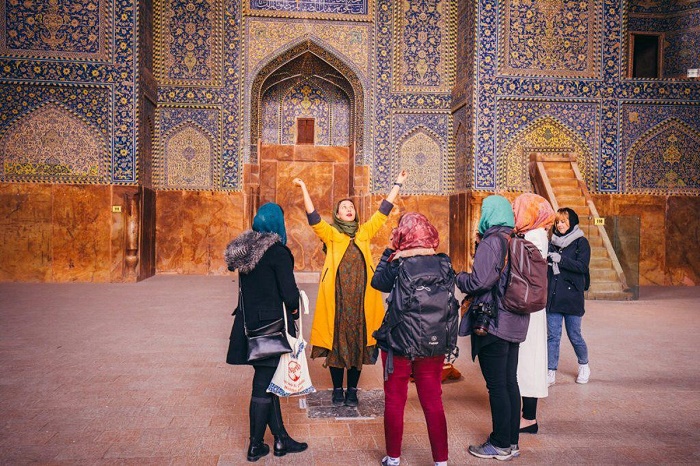
Is It Safe To Travel to Iran Now?
At the moment, even in the midst of protests for compulsory hijab, you can have a safe and pleasant trip throughout Iran. The protests are often at nighttime when you will be resting peacefully at your hotel. And you can just get away from any protests you might encounter in daytime. The truth is, life is routine for many Iranians who are not protesting and many haven’t even encountered the protests. It is all a matter of getting a knowledge of the usual times and places for protests.
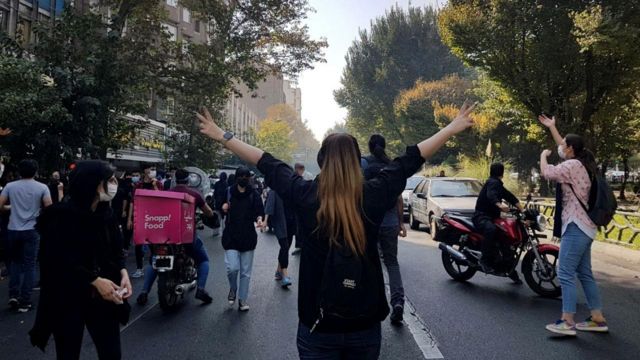
Iran Safety
Is Iran safe to visit? Indeed it is! Iran is a safe country because of its’ hospitable people. In fact, Iranian people are the reasons behind the safety in Iran. If you are about to visit Iran and you are worried about Iran safety, perhaps you will be surprised by Iranian’s kindness and hospitality as you get here.
Is It Safe to Travel to Iran as an American?
Iranian people don’t have a bad attitude toward another nations. On the contrary, Iranian people love to spend time with tourists coming from different countries. American tourists are so welcome in Iran as well. Numerous Americans who have traveled to Iran can vouch for the warmth and friendliness of the Iranian people. Because of this, visiting Iran as an American is not only safe but also a wonderful experience.
Travel to Iran Safety, What should I know before going to Iran?
Dress Code : Modesty is the key of dress code in Iran. Women should put on a scarf. But the great thing is that the rules are lax and you can be fashionable about it.
Travel to Iran Safety : Iran is a safe country for tourists. Political-wise, as long as you don’t enter illegal areas like military places, or don’t have political activities
The Vitality of VPNs : If you’d like to keep in touch with your loved ones back at home, you’ll need to go the Iranian style, meaning having a few good VPNs to try if one stops working.
Find more Iran travel tips here .
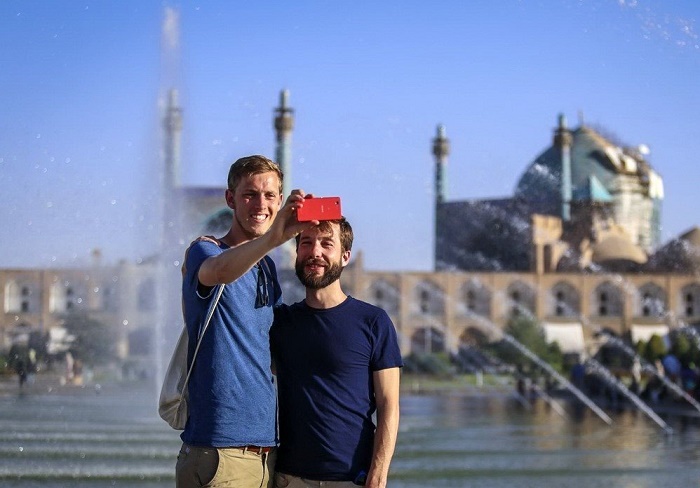
Iran Travel Safety Frequently Asked Questions
Iran safety, do tourists have to wear hijab in iran.
Yes, the rule for all women is to wear a hijab and don’t show skin. But Iranian women are very lax and fashionable about it and so can you. A long-sleeved shirt, pants that come down to your ankles, and a shawl that covers part of your hair is enough.
Iran Travel Advice, What happens if you don’t wear hijab in Iran?
Since the present rules of Iran demand women to wear a hijab, tourists must follow the rules as well, even more so. If the rule is not followed, you might also have to expect confrontation from some people or the morality police.
How Safe is Iran? Are Iranians nice people?
You will probably not find kinder, more hospitable and more welcoming people than the Iranians. Hospitality is so valuable in the Persian culture that Iranians believe ‘guests are from God’. That’s why they’ll go above and beyond to make you feel welcome, safe and cared for.
Travel to Iran Advice, Is there red light area in Iran?
Like in any other country around the world, military, para-military and sensitive governmental areas are of course red light areas in Iran.
Keywords: Iran tourism safety, is it safe to travel in Iran, is it safe to go to Iran, Iran safe to travel, travel advice Iran, travel advice for Iran, is traveling to Iran safe, is Tehran safe to visit, is traveling to Iran safe

Zahra Soltani
Content manager, international relations manager.
To Zahra, introducing the beauties of Iran is a delight and an inherent mission! Beyond that, arts, culture, literature, mythology, and all the astonishing secrets of our marvelous universe set her soul on fire! This is what makes Zahra a filmophile, an insatiable reader, and a passionate writer.
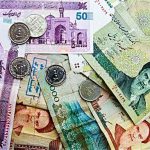
Iranian Rial: The Official Iranian Currency – Iran Travel Information
Best time to visit iran – when to travel to iran.
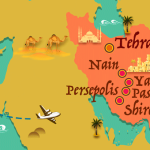
Related Posts
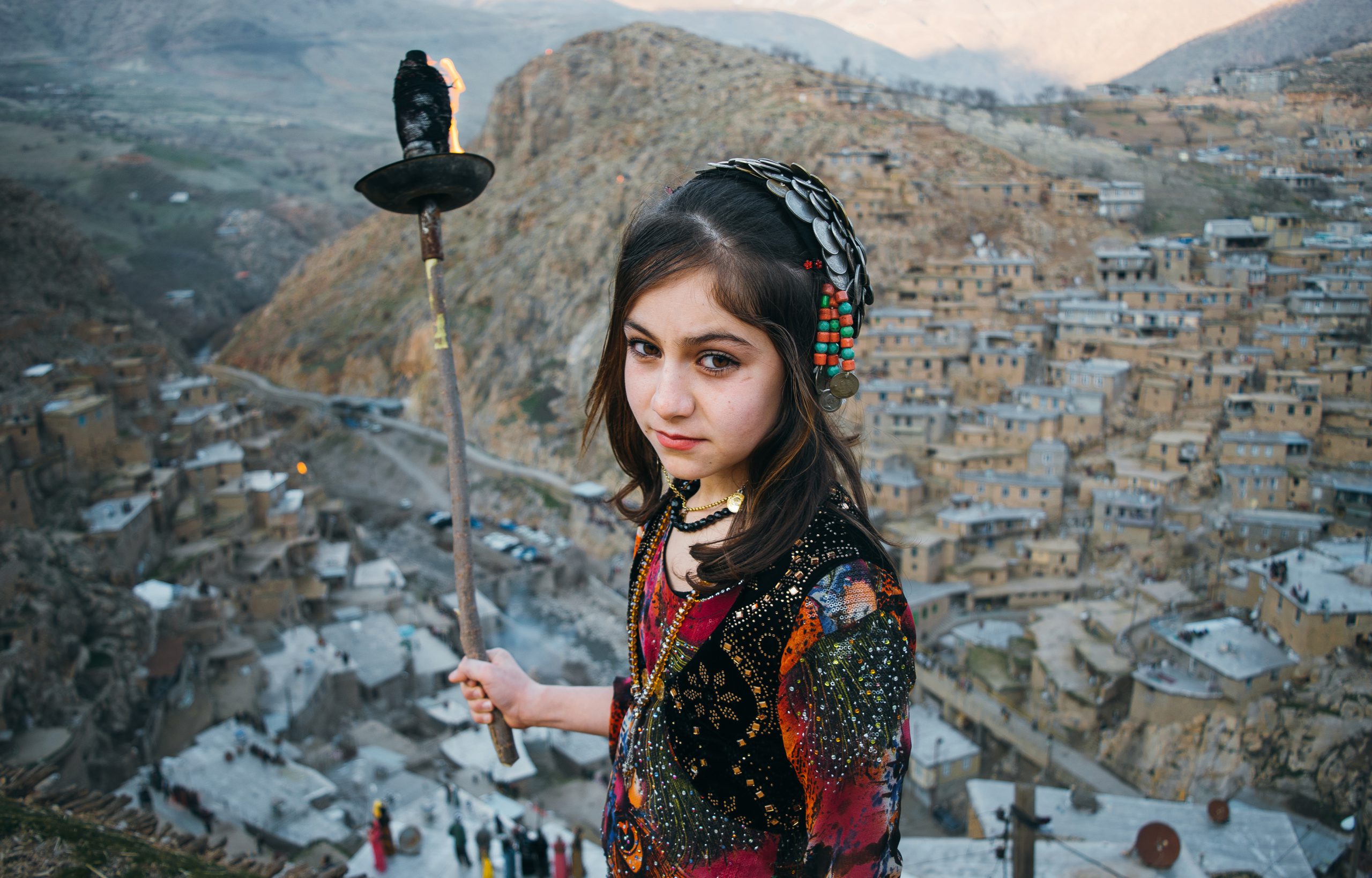
Iran Holiday: National & Public Holidays in Iran (Persian Holidays)
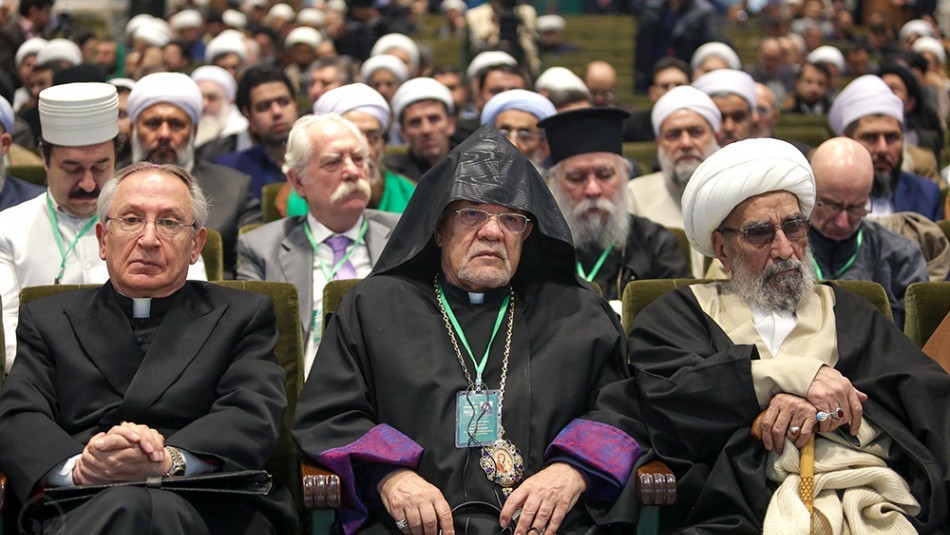
Sunni Tourists in Iran | Can a Sunni visit Iran?
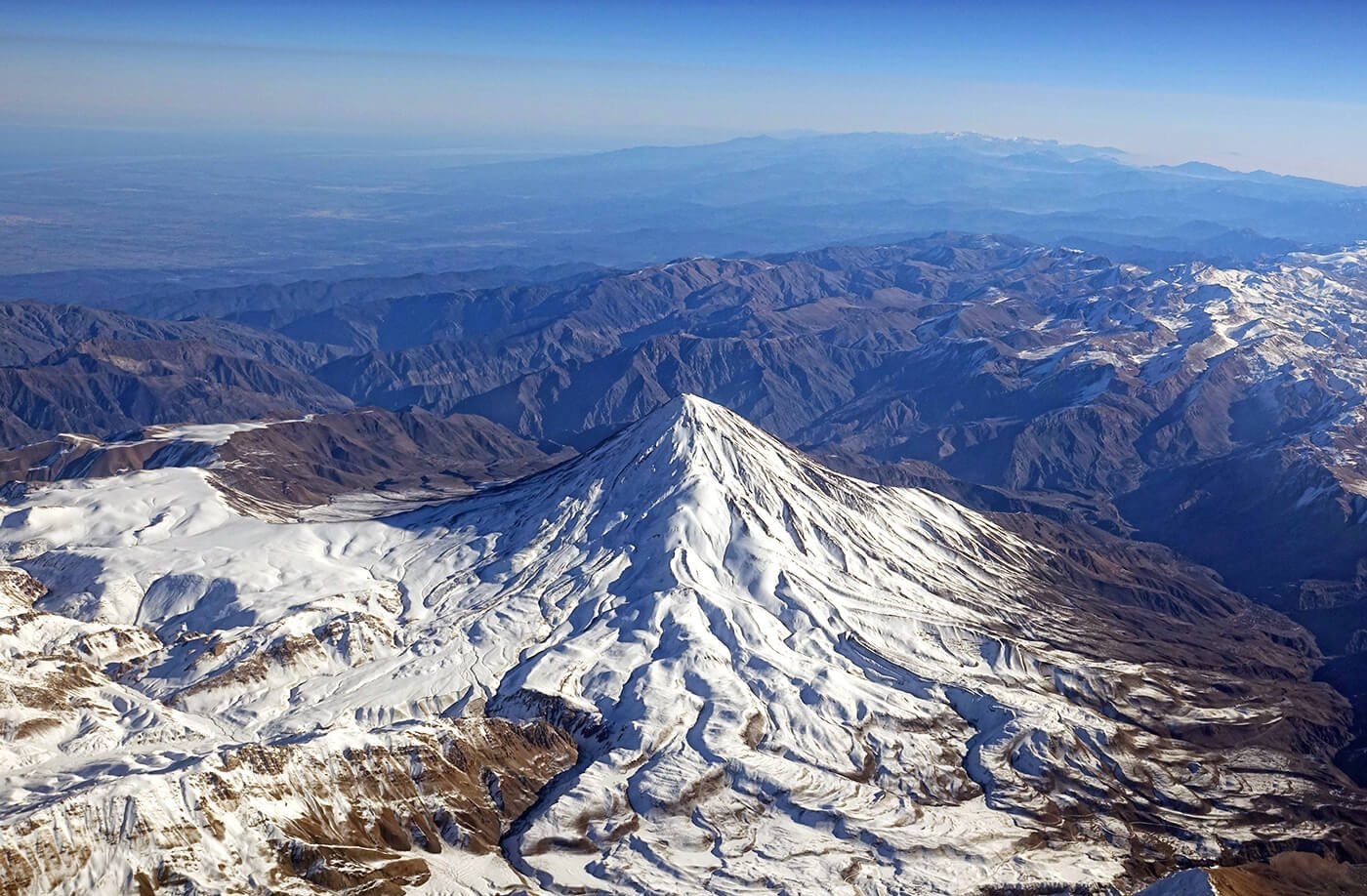
Iranian Winter : BEST Places to Visit in Winters of Iran

WhatsApp us
Is Iran safe in 2024?
By Joan Torres 43 Comments Last updated on April 1, 2024

I love Iran and I absolutely enjoyed my time there, not only because this is home to the most striking Islamic architecture and some of the most hospitable people I have ever met but also because Iran is one of the safest countries in the Middle East and in the world .
True story.
This guide is a personal and thorough analysis that will take you through all the reasons why Iran is safe , without forgetting its internal political problems and, of course, a series of super useful safety tips.

In this Iran safety guide you will find:
Table of Contents
- My personal experience
- Sensitive areas
- Safety tips
- How to behave
- Getting arrested
- Solo female travel
- Americans and British in Iran
- Driving in Iran
- More Information
How to book hotels, flights and tours in Iran
Because of the sanctions, foreign cards or popular sites such as booking.com can’t be used in Iran, but now you can thanks to 1stQuest .
1stQuest is a local company that offers services such as visa LOI, hotel booking, tours, domestic flights, and travel insurance for Iran.
5% discount on ALL bookings with voucher code:
Iran is a complex country and, in order to make the most out of your trip, I recommend reading 1 or 2 books about the country. In this list, you can find: The best books about Iran
Is Iran safe? My personal experience
I have been to Iran twice.
The first time, I barely spent 10 days there.
On the second trip, I spent 2 months.
Now, I am planning to go a third time, and I am pretty sure there will be a fourth.
Iran is amazing.
On the one hand, the country is huge and it is home to endless different things to see, from dreamy islands to alpine mountains, desert and historical cities. Each and every region has something very different to offer and it would take an eternity to visit everything.
If you want to know the places I visited, check my 1-month itinerary .
On the other hand, Iranians are great people, extremely hospitable, well-educated, kind-hearted and, overall, beautiful people who are very curious to meet foreigners and help them, most of the time expecting nothing in return.

It is one of those countries where you are continuously making local friends.
Tea and house invitations, endless random conversations, sharing street meals…
During my journeys, the local interactions were always great, and genuine, and this is one of the things that will make you realize that Iran is a safe destination, because Iranians make you feel so .
I can’t recommend Iran enough and, based on my wonderful experiences, I am really comfortable saying that this is indeed one of the safest countries I have ever been to.
However, there are a few things you need to know about safety in Iran and this is the reason why I wrote this post. Continue reading to learn more.

Is it safe to travel to Iran? The situation nowadays
Skip all content and get expressvpn.
Get unrestricted access with the fastest VPN for Iran country.
According to Wikipedia, official sources say that, in 2013, as many as 4.76 million foreigners visited Iran and, since then, the country has increased massively in popularity, which means that the figure may have easily doubled or even tripled – just a guess .
These statistics are just insane for Iran, especially if we take into account that the Western media, especially American, has been portraying the country as the worst, most dangerous and repressive of all countries.
Today, historical Persian cities such as Shiraz , Esfahan or Yazd, are filled with both tourist groups and independent travelers, perfectly lined souvenir stalls and cute boutique hotels.
And this can only mean one thing: Iran is extremely safe.
To make the situation even more dramatic, Iran shot down a commercial Ukrainian plane but apparently, it was an accident and the world believes it.
Nobody knows what will eventually happen but it seems that the situation has calmed down and, according to several local sources, life in Iran today is just normal, with the exception of the occasional protests that tend to happen in the center of Tehran , that’s it.
Personally, I would still travel to Iran.

The media: is Iran perceived as dangerous because of the Western media?
If anyone thinks Iran is a dangerous country, that is because of the media.
For decades, American newspapers have been selling a completely biased image of Iran, exclusively focused on nuclear weapons, religious fanatics, human rights abuse and, basically, a dictatorial regime.
In Europe, it used to be the same story but I feel that they have softened their speech and today, while they are still talking about all the crazy things going on there, they are continuously publishing reports and chronicles talking about its great tourist attractions and people, and this is one of the reasons why many travelers have started to consider Iran a safe destination to travel to.

This is not the case of the American media, however, especially with the current Administration, which keeps on contaminating public opinion with the idea that Iran is the ultimate arch-enemy and one of the unfriendliest countries on Earth.
You would be surprised to know how many Americans believe that.
In fact, I have had a few small arguments on social media, like the day when that American dude replied to one of my tweets – see below – asking why would someone want to visit such a dangerous place and, to support his reasoning, he posted one article from Fox News . Hilarious.

I am aware that this has been said over and over, but don’t trust what the media has to say about a country and do believe the hundreds of thousands of travelers who have been there.
Problems: is it safe to travel to Iran now?
Is Iran safe to visit despite all the current problems?
Sure, Iran is safe for tourists, but we can’t ignore that there are some serious internal issues.
- Iran is a dictatorial regime ruled by Islamic Law – As much as I love Iran, we can’t ignore that this is a repressive dictatorship that violates human rights every now and then. However, having a bad Government doesn’t make their people bad as well and, as long as you follow some simple rules – more on that later – you shouldn’t be worried about it.
- Violent protests (update 2019) – You probably heard about some violent protests in 2019 which involved several dead civilians and the Government shutting down the internet for nearly a week. Sure, the Government’s response to demonstrators will always be repression and more repression, but this is happening across the world, including in Chile, and I don’t see Donald Trump complaining about it. The best you can do is to stay away from any public demonstrations.
- Terrorist attacks – There have been some terrorist attacks in Iran, the last big one being in 2017 in Tehran , when several Iranians died. It was an unfortunate event but terrorist attacks also happen in Europe – more often than in Iran – and, in the USA, there is a mass shooting every other day.

Regions in Iran which are not safe for tourists
According to the FCO Advice , the province of Balochistan and the areas bordering Iraq and Afghanistan are advised against for all travel, for obvious reasons.
The rest of Iran, however, is totally safe for tourists.

Nevertheless, there are two things you need to know about these dangerous regions :
- First of all, they are far away from all touristic places
- Second of all, the FCO advice will always be totally exaggerated
Relatively dangerous regions in Iran
- Border with Iraq – There may be some tension on the southern part of the border but I myself crossed the northern Iran-Iraq border , in Kurdistan, and I can assure you that that part of Iran is safe to visit.
- Border with Afghanistan – I haven’t been there but intrepid travelers cross that border all the time and, so far, I have never heard of any bad experiences or reports.
- Balochistan – Balochistan is a province where the majority of people are Sunni so, for the last few years, there have been some tensions but the situation has improved; plus, with the increase in popularity of Pakistan, every day this region receives more and more travelers on their way to Pakistan .
As I said, I strongly believe the FCO Advice is overly cautious but, if you are not sure about it, you just need to remain in the touristic and safe part of Iran.
You should also read: Is Afghanistan safe to visit right now?

Is it safe to visit Iran? – My top safety tips
It’s mandatory to have a travel insurance to get your visa on arrival in Iran. Because of the sanctions, most insurance companies don’t provide coverage for Iran, but IATI Insurance does. Get your exclusive 5% discount if purchasing via this link .
These are just some extra safety tips for Iran:
How to behave in Iran (cultural etiquette)
As I said, Iran has some strict Sharia rules but they are actually more relaxed than in Saudi Arabia for example, a country with a large Western expat community.
For men, the only thing you can’t do is wear shorts.
For women, it is a bit more complicated but all you have to do is cover your hair and not show any of your curves.
Other than that, just apply common sense and know that public shows of affection are not tolerated – like in Dubai – and alcohol is not allowed, even though it is widely available in the black market and locals do drink often.
About religion in Iran In Iran, most people are Shia, a branch of Islam different from Sunni, the prevalent branch across the Arabic countries. By nature, Shia people are more relaxed than Sunni, which means that, when it comes to religion, Iran is more liberal than countries like Oman or the United Arab Emirates, plus Iran has also a large population of atheists, more than any Arab country, as you will see it when you go there. In any case, religion still plays an important role in the country, so be always respectful like you would be in any other Muslim country.

Is there a danger of being arrested?
Another of the reasons why Iran is often perceived as dangerous is because, whenever a foreigner gets arrested, it appears all over the news, and reports say that foreigners may be locked in a cell for months without being able to communicate with the outside world.
However, there are two kinds of foreigners who get arrested: journalists and travelers doing stupid things, like those bloggers who got arrested because they flew a drone over a military facility or those Americans who were caught crossing the Iranian border illegally from Iraqi Kurdistan .
Just be smart and you will be fine.
Keeping your money safe in Iran
This isn’t a safety tip but a precaution.
In Iran, international credit cards do not work, which means that you will need to carry all your cash for whatever time you are in the country.
For this, you have two solutions:
- Buy a local credit card and top it up – There is a service for foreigners which consists of a local debit card which you top-up with cash upon your arrival, so you don’t need to carry all the money. Mah Card is one of these services which you can trust.
- Book your hotels ONLINE through 1stQuest – 1stQuest is a local company that provides a large variety of booking services for Iran, including visa services, hotels, travel insurance and tours. You won’t be able to purchase these services online through a local website – as they don’t accept credit cards – but 1stQuest is one of the very few companies which does so, at least, you won’t need to carry all the cash, which might be half of it.
You can get a 5% discount on ALL your hotel bookings.
Use my promotional code: ATC-QST
Surfing the internet safely
As you may know, in Iran the internet is censored, so a lot of websites are blocked, from Facebook to YouTube.
In order to access these websites, you will need something called a Virtual Private Network (VPN) and you can find more information about it here .
But, isn’t it illegal to use a VPN? Why should this be a safety tip?
Yes, using a VPN is illegal but everybody in Iran uses it – really, everyone – and the only people who get punished for using it are, for example, those who use the internet to organize protests against the regime.
Also, a VPN will not only allow you to access blocked sites but also, it allows you to browse more privately and safely and, in this type of authoritarian regime where anyone could be spied on, you really want to use one.
I personally use ExpressVPN , one of the fastest VPNs available in the market.
If don’t know anything about VPNs, read my tutorial: Why and how to find the right VPN for Iran

Is Iran safe for solo female travelers?
This is one of the questions I get asked, most often from women.
Is it safe to travel in Iran as a solo woman?
Well, I am a man, so I obviously had a very different experience from most women, but I don’t know a single lady who didn’t have a wonderful experience so, based on their opinions, I can certainly say that Iran is a safe destination for women.
If you want to know more details, I interviewed Eveline from Earth Wanderess , who shares her travel expertise about solo female travel in Iran .

Is Iran safe for Americans and British?
The million-dollar question.
Nobody has ever asked me this because I am neither American nor British, but I do know some people from these countries who have been to Iran and all of them said that it didn’t really make a difference.
As I said, Iranians are curious to meet any foreigner and, actually, they might probably be more excited to meet an American than any other tourist.
Moreover, I can assure you one thing which is that an American will feel 10x safer and more welcome in Iran than an Iranian will feel in the USA, where they might be subjected to racism and prejudices. True story.
In this post, Jackie wrote about American tourists in Iran .
Is driving safe in Iran?
Like in most countries in the Middle East , the locals don’t really follow the traffic rules, so car accidents do abound.
However, I felt that in places like Egypt or Saudi Arabia, the locals are crazier.
Crossing the streets in Iran
One of the potential threats most tourists face in Iran is crossing the street, especially in Tehran , as crosswalks are completely useless so, when trying to cross, cars don’t stop and simply avoid you.
The first few times you do it, you think you are going to die but after some practice, you get used to it. In any case, it is always recommended to cross the road next to a local person.
Public transportation in Iran
The whole of Iran is really well-connected by a super-effective and efficient bus network, so it is the most popular method of transportation among independent travelers.
There are two types of buses, normal and VIP and, in order to travel more safely, you should get the VIP one, as it only costs 20-30% more, which is a few more € and, since they are newer and bigger, they are definitely safer.
Because of the sanctions, in Iran, most booking sites don’t accept international foreign cards. Before, you could book them via 1stQuest but they are not offering this particular service anymore. However, you may still use 1stQuest for visa services, hotels, flights, travel insurance and tours.
Conclusion: Is Iran a safe country to visit?
Overall, Iran is a safe destination and this is the reason why the country has undergone a tourist boom in the last couple of years.
Like in any other country, however, there are, of course, some small threats but the good news is that these tiny dangers are not specific to Iran but they happen in many countries across the world.
More information for traveling safely in Iran
📢 In my Travel Resources Page you can find the list of all the sites and services I use to book hotels, tours, travel insurance and more.
All our guides to Iran
- Iran Travel Guide
- Iran itinerary
- Best Books about Iran
- Travel insurance for Iran
- VPN for Iran
- Solo Female Travel Guide to Iran
- Tehran Travel Guide
- Qeshm Island Travel Guide
- Travel Guide to Shiraz
- A trip to the desert of the Kaluts
- Trekking Guide to Zagros Mountains
- Meeting the Qashqai People
- Fars Province Travel Guide
- Visa Guide for Iran
- Masuleh Travel Guide
- Travel Guide to Golestan Province
- Iran-Iraq border crossing
- Darband Travel Guide
- Best Hotels in Tehran
Check more safety guides
- Is Afghanistan Safe?
- Is Iraq Safe?
- Is Lebanon Safe?
- Is Mali Safe?
- Is Mauritania Safe?
- Is Middle East Safe?
- Is Oman Safe?
- Is Pakistan Safe?
- Is Sudan Safe?
- Is Syria Safe?
- Is Tunisia Safe?

43 comments
Hi Joan, I am an American married to an Iranian. I would like to visit Iran this year (first time) to visit my Mother in Law and do some sight seeing. What would be best route, Visa as a tourist (would my MinL have to fill out something? Would it be a problem traveling with my husband?) or Visa as wife of Iranian and submit all that paperwork? How long is Visa valid? I’ve read up a bit and called embassy but am still a bit confused. Any info would be very appreciated. Cheers, Leticia
Hi Leticia, For Americans, Canadians and British, the visa process is completely different and since you have family in Iran, it will be even more different, so I can’t really help you. The embassy is the one who should help you with this but typically, for regular tourist visas, you need to book a full tour with a tour operator and today, because of the current situation, they are denying many American/Canadian visas. For things to do, best route, etc, check this post: https://againstthecompass.com/en/iran-itinerary/
Hi Joan, I’m planning to visit Iran in March and would appreciate information about Visa on Arrival at Imam Khomeini Airport. When I visited in October 2018, I obtained VOA at IKIA without being asked for an onward ticket, and bought one to Australia in Tehran.
I would appreciate any information as to whether this situation persists, or has changed, as I am thinking of going to Nepal next, or Turkey, hence my lack of interest in obtaining an onward ticket.
I want to go to the Caspian Sea, across to Mashhad, down to the Persian Gulf, up to Yadz, then Qom.
Thanks, Mark Govier
No, there should not be any issue.
I did get VOA during my last visit and left Iran overland, so it shouldn’t have changed.
However, if you wanna make sure, perhaps you could get the visa code (1stQuest) so they won’t ask you any questions when you reach the airport
Hello, I’m thinking of going to Iran but my only concern is that I also have to go in US. Do you know if there is any issue to have Iranian stamps to get a visa for us. I’m French
yes, in this case, you will have to get the USA visa through the embassy
I was once told this saying. ” Believe nothing of what you hear and half of what you see! “. I remember how the western media would deliver similar narratives about Colombia and how dangerous it is. Definitely not the case since I have traveled there on numerous occasions.
Would be curious to know the perception of Iranians to people of color. Do they share similar views like in Saudi Arabia? As an example. Was told the darker your skin color. The less likely you will feel welcomed. Any thoughts on this?
Absolutely. The media is making the issue worse. I’m Sunni Muslim and I know there’s a conflict between us but they are still friendly and like to talk with me. Most of the people there are friendly. Especially when they know that you are a tourist they will give you a warm smile. I can say that some people are bad and some people are good. It really depends on the human.
Im from New Zealand and like many western countries media fuels misconception about Iran. I visited in 2017 Frankly it was one of the most amazing countries I have visited and half of that we’re the people and friends I made there. It is full of beautiful pleasant surprises. Thanks for the tip about the local debit card.. useful. My advice is but an Iranian SIM before going through customs in Tehran airport.. I wasted a few days buying a phone and registering a SIM in Tehran. VPN are essential too as most western search engines and sites are censored including Google.
Hi Joan, Your blog was a great reference when I backpacked in Iran last November (amidst the protest and internet shutdown, crazy!) Iranian hospitality is the greatest and like you have mentioned visiting once will never be enough!
Hey I’m an Iraninan I just wanted to thank you for showing the world who we REALLY are and what our country REALLY holds. Most of the big big problems we have are only problems for locals and most tourists won’t have to even face them (like the stuff about human rights, economics, etc) But afterall we’re not our regime and our country is not what most people think. We literally LOVE to see tourists. And if you ask me, so many people treat toursists better than the locals. We really want them to have a beautiful memory when they go back home. Sending love from Shiraz, Iran Hope to see you soon ♡
Hey Saghar,
You’re most welcome! Speaking of Shiraz, it leaves the biggest regret because I wasn’t able to spend more than two days there. Hence, I actually missed Persepolis and Pink Mosque (like what!!) and I met a druggy local at Hafez Tomb who bought me around in his car haha. I’ll definitely return to Shiraz to cover more spots!
Anyway, if you would like to connect, my Instagram username is ed.woon I’ve uploaded many photos taken during the trip 🙂
Omg you definitely should visit Persepolis and the Pink Mosque. Shiraz is best in Ordibehesht (April 21st to May 21st) and if you were visiting through that time, make sure to visit the “Jahan Nama” and “Eram” garden as they are -especially the Eram garden- two of the must-sees of the city. And thank you for the instagram username I’ll definitely follow you Mine is temporarily deactive rn but it’s “@/heysaghar” If you ever visited Shiraz and needed some local guides I’d be so happy to help! Hope you come back soon and stay longer this time! you’re always welcomed here ♡
I did visit Eram Garden and it’s beautiful!! Especially the rainbow effect casting over the water fountain!
Sure, let’s connect on Instagram!
Hi I am planing to visit Tehran in june 2021 with my wife due to a medical treatment on medical visa, please guide what is the current situation specially covid and other travel restrictions.
Just saying Im iranian If u wanna visit here its better to go to esfahan It is the most beautiful city of iran:)
Hello there. I’m Prisha and I was born and raised in Tehran. Thanks for telling the truth about my country. Yes it might get some bad media perspective but actually living in IRAN is really fun and these days, not even local access to alchoholic drinks has improved, but access to weed in really common and easy and its kinda like its leagal. I mean we rolled and smoked pot in front of police officers and they didn’t even look at us. By the way the Hijab thing is only a matter for locals. For a female tourist the worst thing that could happen is that police might mention that they fix their apearance. It’s rude i know but not even hard language for a tourist. Everyone loves them. Mark my word.
That sounds crazy haha! From my conversation with the locals (young people especially), you guys are definitely an educated bunch and it just saddens me that opportunities are robbed because of the circumstances. I hope to see things change for the better because you all deserve more than what you are given now. Best wishes from Singapore 🙂
Hi, What a beautiful website you have, thank you for sharing all these beautiful stories! I am dutch (live in Barcelona) and I want to go end of October to iran, do you maybe know if that is possible (due to Covid-19)? I saw that there are flights with Pegasus airlines (with a stop in Istanbul ) going there, and also cheap 🙂 (300 euro). Many thanks! Rob
Hi Rob, so far, currently they aren’t issuing tourist visas (only business and medical) but my local contacts told me they plan to resume them soon. I will let everyone know as soon as the country opens. If you want to get noticed, you should subscribe to my email list though
Hello everyone! visit Iran! If you want to visit the whole world at once, just visit Iran, different climate at once, historical places up to millions, amazing sightseeing. Whatever you want, you can find it here, sea, islands, mountains, deserts, jungles, hot, cold, cool, tropical weather. everything. just name it. and by the way, too cheap. with less than 500 $ you can spend a month and buy as many souvenirs as you want. the rate of 1 dollar is 300000 Rial. that’s the price of an excellent meal! come and enjoy here!
and by the way, people and the government are separated. people are nice, welcoming and friendly.
My favorite part:
“Moreover, I can assure you one thing which is that an American will feel 10x safer and more welcome in Iran than an Iranian will feel in the USA, where they might be subjected to racism and prejudices. True story.”
An American? There are some Americans who experience racism everywhere. Not all Americans are white. So, again, is Iran safe for AMERICANS. This does not just mean white Americans. Or able bodied Americans. Or straight Americans.
Try again. This is a good beginning of a resource, but it sounds as if you are assuming all travelers are not at all familiar with the truths of racism in the world. True story. As a Black female traveler, I was hoping for more than this.
Nice work Joan, I really enjoyed this. I am planning an overland trip with my wife to the UK from the UAE starting April 2022 and we are keen to learn as much as we can about the route which will essentially start in Iran. We will be on some kind of schedule so I am guessing we’ll have about 5-8 days in country heading for Turkey. Do you have any thoughts on the route and the ‘must-sees’ along the way? Thanks for a great resource and any tips or ideas you can share.
Guys im iranian Im just saying that although iran is not a good country to live there Its a pretty beautiful and safe country If u have enough money U defenetly should visit iran onec Iran has not a good Government But there are cool and friendly ppl 🙂 Again if u are reach just visit iran
U defenetly should visit our country 🙂
Hello, I am an Iranian and I live in Tehran. I suggest you to travel to Iran And visit the Nature Bridge, Milad Tower and Azadi Tower. These are all very small parts of the beauties of Iran As for the coronavirus, the condition is good and vaccination is fast And I’m really upset about the media saying negative things about Iran. Iran is the safest country in the region and we have no insecurity in Iran And it really is safer than countries like America and Britain.Thank you for your good site and I hope to see you in Tehran, goodbye to all of you.
Hi Joan. While I appreciate your article (always good to see travel blogs), as an American and a female I have huge reservations about visiting Iran. I would certainly not do so on an American passport. While I am sure the everyday folks you meet are great (they usually are) when there is significant political disagreement and tensions between countries it can be a very different story for travelers. I believe you overplayed the “America media” making it sound dangerous. Have you seen what the Iranian regime says about Americans? While I want to visit historic sites, etc. I will not do so at this time or on an American passport.
Hello dear Joan, is is safe to travel to Iran now? Dec 2022. I can’t rely on what the media says, i would like to go to Mashhad as a female solo traveler. Kind of hesitant about it because of the possible riots, demonstrations… but i don’t know if a tourist could get affected? I will definitely apply common sense and dress arabic clothes. What would you recommend me? Are they issuing VOA as a spanish citizen nowadays?
Hi Kristel, I know quite a few people currently traveling in Iran, and as long as you stay away from protests, it will be fine.
Hi Joan, First I have to say thank you so much for sharing all your travel wisdom in this blog! I always come here to check my next destination before planning. You helped us a lot in our trip to Palestine a few years ago and I am now looking forward to exploring a country which has been in my list for way too long: Iran. I am planning to visit in October, but as many people in the comments, I feel a little hesitation regarding some aspects, I was convinced 2023 was the year, but since the protests arised, I have been both fascinated by the courage of Iranians and also concerned about the repression of the government. Do you have any insights on the safety of traveling to Iran (TEHRAN, ESFAHAN, SHIRAZ, PERSEPOLIS and YAZD) as a female traveller? What other reliable sources for travel information do you recommend? Again thank you for all your work and happy travels! Cora
Hi Cora! As long as you keep away from public demonstrations, you should be fine, that’s what all recent travel reports suggest 🙂
Joan, While travel always comes with a certain amount of risks, I do feel that you’ve underplayed the risk specifically regarding women. There have been reports of foreign women being harassed by police in Iran for not wearing their hijab properly. I understand you’re trying to convey that travelers will be fine if they stay “smart” and avoid trouble, but ultimately, an extremist regime is not one that is reliable. Mahsma Amini was arrested and died over unclear hijab regulations, and it only takes the subjective judgment of one person of authority to infringe on someone’s rights or even end a life. I agree that most people would likely be safe if they traveled in Iran, but I think your post gives readers a false sense of confidence that Iran will completely safe. Clumsy people, those unfamiliar with Iranian culture or customs, or women who are unaccustomed to wearing hijab should be more cautious and perhaps rethink their travel plans.
I am a dual citizen of Sweden-USA, and visited Iran a few years ago for an academic conference in Tehran. Because I was born in USA I had a long processing time at Tehran airport, even though I had a visa from Iranian embassy in Stockholm and an invitation from the university in Iran. After the conference I traveled solo for about a week. People were very friendly and curious about me, often asking where I come from. When I replied Sweden, it often didn’t register with people. But if I said America, people’s faces lit up, and many wanted to shake my hand. I felt very safe, even at night.
thanks for sharing your positive experience, Ramon!
Hello, I consider adding Iran in my travel around the global. But my concern is that I love photography and I might carry quite some gears in my luggage (1 camera, 5 lens, tripod, computers, hard drives, sd cards etc…) So I’m a bit worried to be considered as a journalist or spy or whatnot. Is there anyone who travelled there with equipments who have some feedbacks about carrying photography equipments around ?
Hi François, as long as you take photos or touristic staff and don’t carry a drone, you’ll be fine. Iran is a very touristic country and there are many travelers carrying a lot of gear. As per myself, perhaps I don’t carry as much gear as you but I did bring one camera, 2 lenses and 1 manfrotto tripod, all was good!
Hello everyone, I recently traveled to Iran and completely fell in love with their customs and culture…I think Iran is one of the safest countries in the world and very safe even for a single woman. I did a lot of research on Iran’s internal tensions before the trip. Iran’s internal tensions are not high and often a small group of people protest because of the economic problems caused by the US sanctions. There are many amenities in Iran and the streets of this country are very clean. Iran’s government is a religious government, but in my opinion, it is not authoritarian, and in spite of small and big mistakes, it is a powerful central government, and the majority of Iranian people are satisfied with the government of this country. I hope my experience was useful for you
Thanks for sharing the experience, Michael!
Thank you for this blog post – very informative.
I am planning to cycle around the world and I am looking to enter Iran from Azerbaijan. I am thinking of cycling in a South-East direction all the way to the Balochistan region of Pakistan. Eventually I will get to Karachi and then cycle along the Indus river up to Lahore, where I will cross into India. How dangerous would you think this trip is? Any advice from people who have been to this area would be greatly appreciated.
Only Pakistani Balochistan can be sketchy but most likely, the local police will escort you all the way to Quetta, since independent travel in Balochistan wothout the permits isn’t really allowed.
Thanks for this great write up and the tips, Joan! I am from the US and when I tell people I am planning a trip to Iran, they have the same question you got from the R Morrison guy. Simply so ignorant! The vast majority of Americans (and Brits, I am sure) do not know the history of our involvement there, particularly wrt to the coup we orchestrated in ’54 and all the injustices we have committed since then. All they know is what the ignorant media here says. You will never find a positive line in our media about Iran (or China, Russia, etc.) and so people here are simply clueless. I had been to Iran as kid in the late seventies. I have been wanting to go back for a few years now because I am concerned that the US/Israel will bomb and destroy this beautiful place and then it would be too late. I missed out on Syria and Yemen.
thank you for this positive comment, Matthew!
Leave a Comment Cancel reply
Your email address will not be published. Required fields are marked *
Notify me when new comments are added.
Join our Expeditions
From Syria to Iraq in Pakistan, Against the Compass is finally running expeditions to the most epic and off-the-beaten-track countries.
We have scheduled expeditions for every month of the year.
Latest posts
- How to travel to Afghanistan during Taliban rule (2024)
- How to Travel to Libya in 2024
- Backpacking Venezuela Travel Guide (2024)
- How to visit Los Llanos in Venezuela
- How to visit Angel Falls and Canaima National Park
Why Iran Is a Safe Destination for International Travelers: Dispelling Misconceptions
- February 22, 2024
- VOI Travel Agency
- Updated at: May 24, 2024
Iran’s commitment to safety extends beyond its warm hospitality, providing travelers peace of mind as they explore its diverse landscapes and cultural attractions. Whether wandering through ancient bazaars or seeking local delicacies in family-run eateries, visitors can rest assured that their well-being is a top priority.
From well-maintained tourist sites to efficient transportation systems, Iran takes proactive measures to ensure a secure environment for tourists, allowing them to immerse themselves fully in the country’s vibrant culture without any safety concerns.
In addition to its tangible safety measures, Iran’s welcoming atmosphere creates a sense of security beyond physical protection. The genuine kindness and respect locals show create a supportive environment for travelers to engage with the community and start meaningful connections. This unique combination of safety measures and genuine hospitality makes Iran an inviting destination and a place where visitors can explore with confidence and peace of mind.
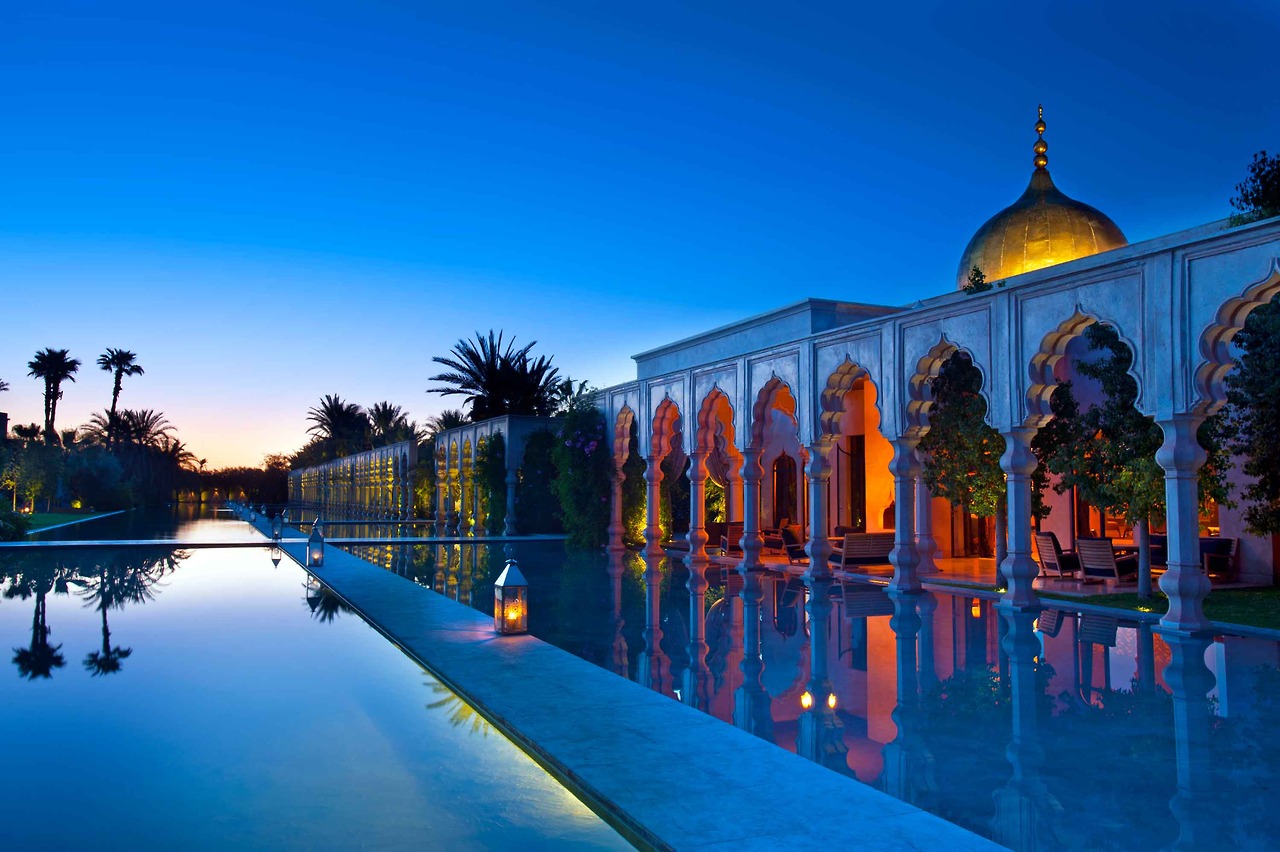
Peaceful Persia: Haven of Hospitality and Security
Iran is a country of peace and harmony, where the warmth of its people is as welcoming as its rich cultural heritage. With a history spanning millennia, Iran has cultivated a society that values unity and understanding, where differences are embraced and celebrated rather than feared. From the bustling streets of its cities to the serene landscapes of its countryside, visitors are greeted with open arms by locals who embody the true spirit of hospitality.
At the heart of Iran’s peaceful identity lies its vibrant culture, a tapestry woven from the threads of ancient traditions and modern innovation. From the beautiful patterns of Persian rugs to the melodious strains of traditional music, Iran’s cultural landscape reflects a deep reverence for peace and harmony. Through art, literature, and everyday interactions, Iranians demonstrate a profound commitment to building bridges of understanding and cooperation in an environment where peace flourishes.
As travelers explore Iran’s diverse landscapes and cultural landmarks, they discover a nation where peace is not just a concept but a way of life. This enduring spirit of peace and hospitality leaves an indelible impression on those who journey through the enchanting land of Iran.
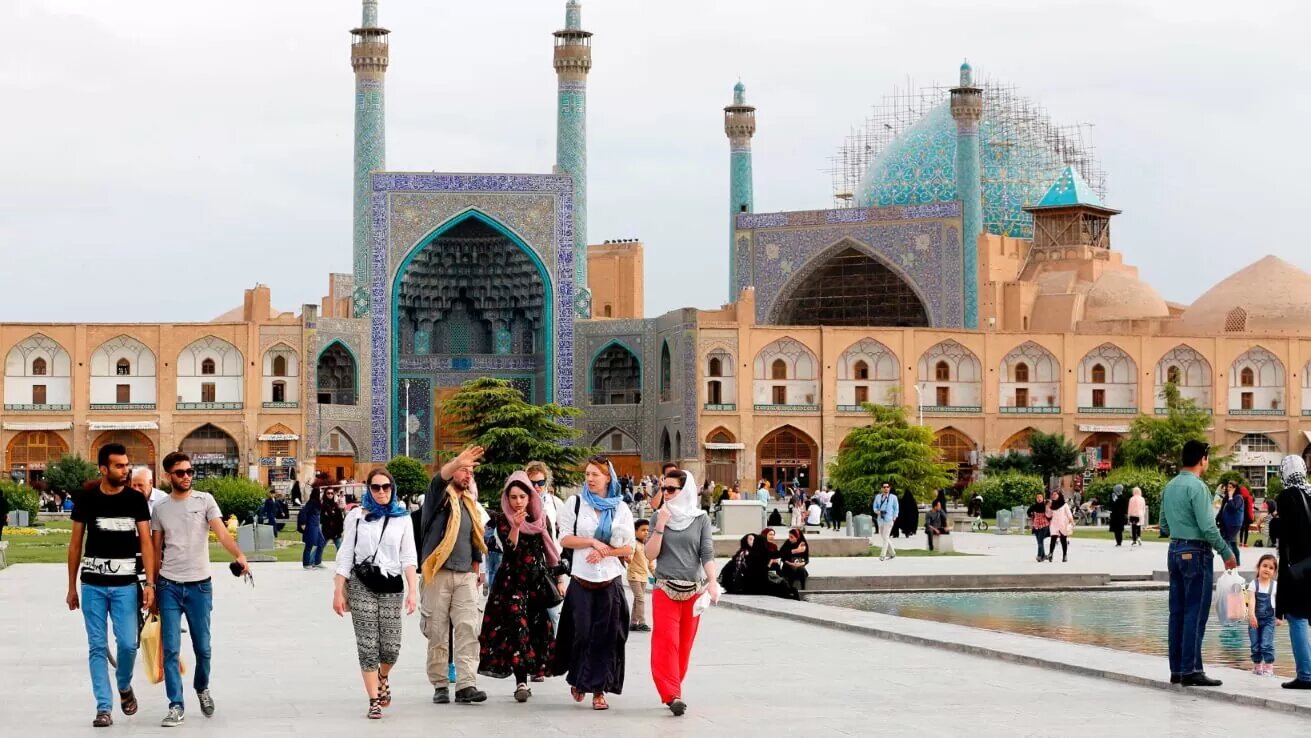
A Closer Look at the Measures Ensuring Tourist Safety
In the Islamic Republic of Iran, tourists’ rights and privileges are fully supported and upheld by the principles of Islam and the government. Every visitor to Iran enjoys all-inclusive immunity and security, guaranteeing the protection of their life, property, dignity, and employment opportunities. It is integral to Iran’s hospitality to ensure that tourists are treated with respect and dignity throughout their journey.
Under the Islamic principles and laws governing Iran, nobody has the right to offend or harass tourists. Should visitors experience such mistreatment, the government must intervene and safeguard their rights. The Iranian government is committed to providing necessary support and protection to tourists, ensuring they can explore the country peacefully. This unwavering commitment underscores Iran’s dedication to developing a welcoming and secure environment for travelers from all walks of life.
Health and Medical Facilities
Iran supports international tourists and provides them with medical assistance in case of illness. Tourists are often surprised that Iran offers comprehensive insurance coverage for visitors, ensuring they receive quality medical treatment without financial burden. Moreover, Iran’s healthcare system is renowned for its affordability and high standards, making it an attractive destination for medical tourism.
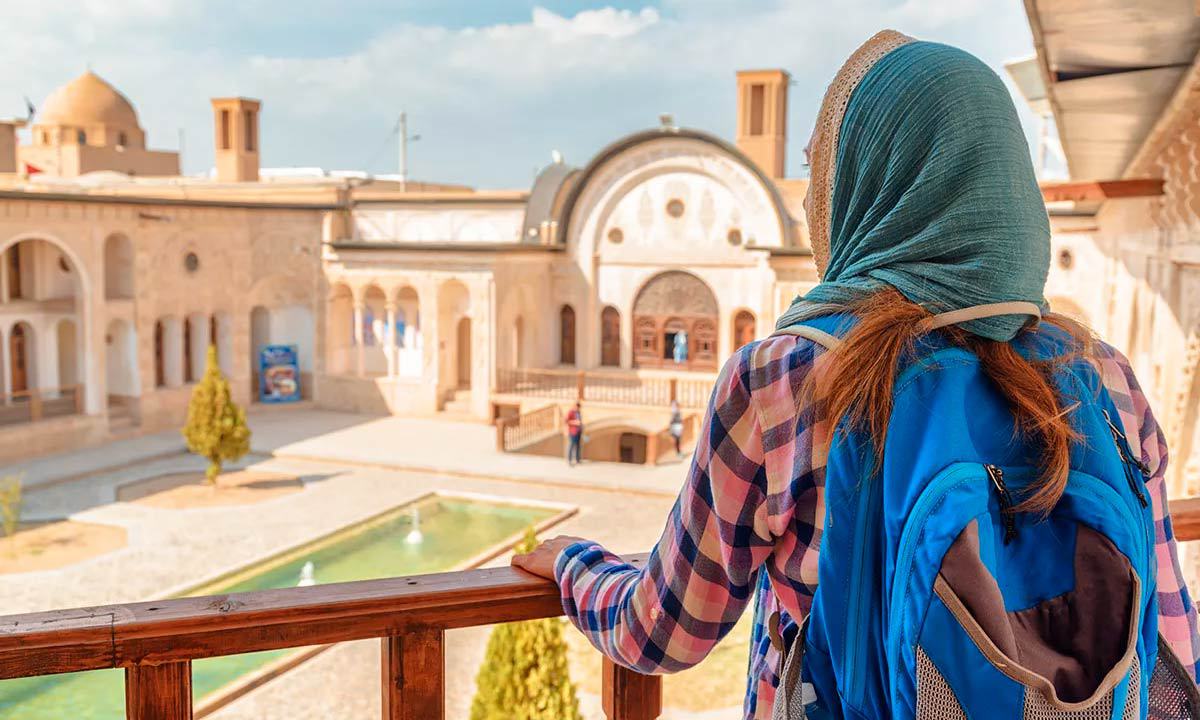
In addition to medical care, tourists find everything in Iran, from accommodation to dining and transportation, is remarkably affordable without compromising quality. The country’s commitment to providing exceptional services at reasonable prices contributes to its appeal as a budget-friendly travel destination. Moreover, Iran’s dedication to ensuring the safety and well-being of tourists further enhances its reputation as a secure and welcoming destination for travelers worldwide. Whether exploring its rich cultural heritage or seeking medical treatment, visitors can rest assured that Iran offers a safe and affordable experience.
Iran prides itself on maintaining a high standard of cleanliness, a tradition deeply rooted in its Islamic principles and rich historical heritage. Travelers will find health safety emphasizing hygiene and sanitation, reflecting Iranians’ commitment to health and well-being. From public spaces to private accommodations, cleanliness is prioritized, with ample water, soap, and sanitary facilities readily available for all.
This dedication to cleanliness extends beyond mere convenience; it reflects Iran’s cultural values and respect for locals and visitors alike. The abundance of clean facilities and the meticulous upkeep of public spaces ensure that travelers can confidently explore Iran, knowing that their health and comfort are safeguarded. In every corner of the country, from lively urban centers to remote villages, the emphasis on cleanliness proves that Iran is a safe and welcoming environment for all who journey through its storied lands.
Iran Transportation System
In Iran, tourists can access various public transportation options, including buses, taxis, subways, trains, and airplanes, catering to their travel needs within cities and across long distances. These transportation services are widely available and affordable, ensuring convenient and economical travel for visitors. Moreover, tourists can utilize local ride-hailing applications such as Snapp and Tapsi, the Iranian version of Uber, for efficient and reliable transportation.
One notable aspect of transportation in Iran is its emphasis on safety. All modes of public transit undergo rigorous inspections and adhere to safety standards, providing passengers with peace of mind throughout their journeys. Whether traveling by bus, taxi, or ride-hailing services, tourists can trust that their safety is a top priority, contributing to a secure and enjoyable travel experience in Iran. These transportation options are popular among solo travelers, offering them a convenient and safe means of exploring the country independently.
Low Crime Rate: Safety on the Streets
Iran boasts a low crime rate, ensuring safety on its streets for locals and international tourists alike. The streets are characterized by tranquility and security, with citizens often going out of their way to look out for one another, especially for international visitors. Even during the nighttime, when darkness typically raises concerns in other places, Iran remains safe and welcoming, with streets illuminated by the warmth of hospitality rather than the shadows of fear. This sense of communal care extends to solo female travelers, who can confidently explore the country’s rich cultural heritage. You can read another article on our website to explore the experiences of female solo travelers in Iran .
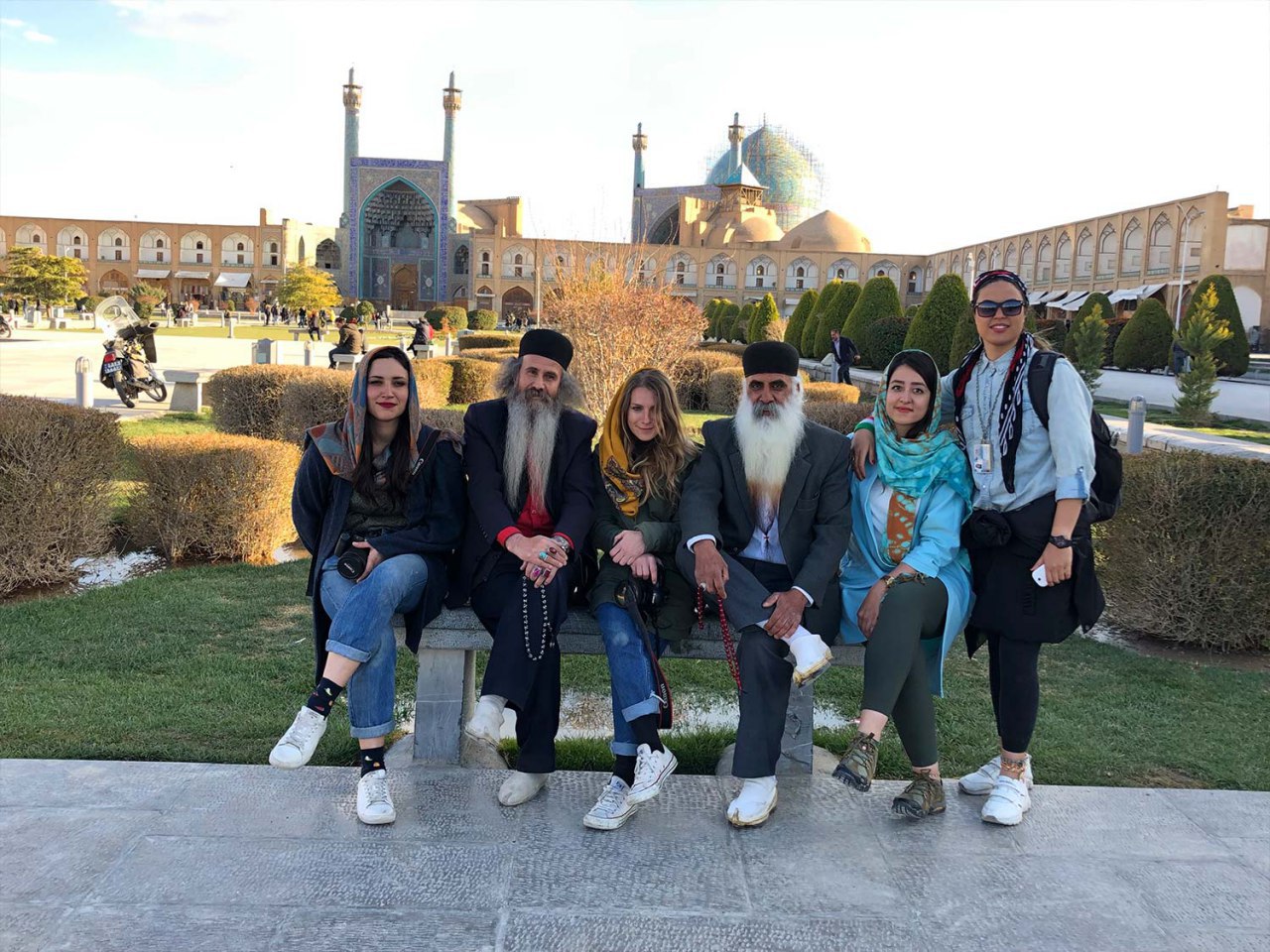
In Iran, the safety culture permeates every aspect of daily life, creating an environment where tourists can always feel secure. Whether wandering through ancient bazaars, admiring historical landmarks, or simply strolling through picturesque neighborhoods, visitors are met with friendly faces and genuine warmth. Taking care of the safety and well-being of all who tread its streets is evident in its population’s harmonious coexistence and mutual respect. As a result, solo travelers can embark on their journeys without hesitation, embracing the enriching experiences that Iran has to offer while feeling protected and welcomed by its people.
Common Questions
Here are some common questions and misconceptions about visiting Iran, along with answers to help you gain a better understanding of traveling to this fascinating country.
Is it safe to Visit Iran for US citizens?
Despite any misconceptions, Iranians welcome tourists from all corners of the globe, regardless of nationality. American tourists, in particular, are safe and embraced with open arms by the Iranian people. Iran’s culture values cultural exchange and celebrates diversity, making it a haven for travelers seeking authentic experiences. The nation’s rich history exemplifies a long-standing tradition of hospitality, where interactions with diverse races and cultures are welcomed and cherished as opportunities for mutual understanding and appreciation.
Do you need a tour guide to be safe while visiting Iran?
No, you do not need a tour guide to be safe in Iran. Many solo travelers, hitchhikers, and adventurers visit Iran independently and share their positive experiences on social media platforms. Iran is generally considered safe for tourists, who can explore the country confidently. However, choosing a tour guide or travel package is a personal choice. Some travelers may prefer a personalized itinerary to ensure they visit all the sightseeing and historical places, while others enjoy the freedom of exploring independently. Travel agencies can provide quick support and assistance if needed, but ultimately, the decision depends on individual preferences and travel styles.
Will tourists be arrested for not wearing proper hijab due to morality policies?
When visiting any country, respecting its laws and cultural norms is essential. However, Iranians generally don’t adhere to strict hijab requirements like some other Muslim countries. In Iran, the police are committed to ensuring the safety of tourists, and it’s advisable to trust them. Respecting the hijab culture in Iran can contribute to a more peaceful and enjoyable experience, enabling visitors to immerse themselves in the country’s cultural heritage with peace of mind.
Is it safe to cycle in Iran?
Yes, it is safe to cycle in Iran. The country welcomes eco-friendly activities, and cycling is a common and standard practice among Iranians.
What are emergency numbers in Iran?
Below are essential emergency phone numbers you should keep saved on your phone while traveling across Iran:
Police: 110 Ambulance: 115 Fire Brigade: 125 Iranian Red Crescent Society: 112 (for hikers and outdoor adventurers)
Where is photography prohibited in Iran?
Photography near military and government installations is strictly prohibited in Iran. Also, avoid photographing police, military bases, and protests.
In Iran, safety is ingrained in everyday life, offering travelers a reassuring environment no matter where they venture. From the busy streets of Tehran or wandering to Shiraz’s landscapes, travelers can confidently explore, knowing that their well-being is a top priority. Day or night, Iran offers a secure environment where visitors are welcomed with open arms by locals who take pride in ensuring their safety and comfort.
With its low crime rate and strong emphasis on hospitality, Iran stands out as a beacon of safety in the region. Whether you’re exploring ancient historical sites, bazaars, or remote villages, the warmth and generosity of the Iranian people create an atmosphere of trust and tranquility. From the moment you set foot in Iran until the end of your journey, you’ll experience firsthand the genuine hospitality and unwavering commitment to safety that define this remarkable country.
Table of Contents
Iran Travel: The Complete Guide You’ve Been Waiting For!
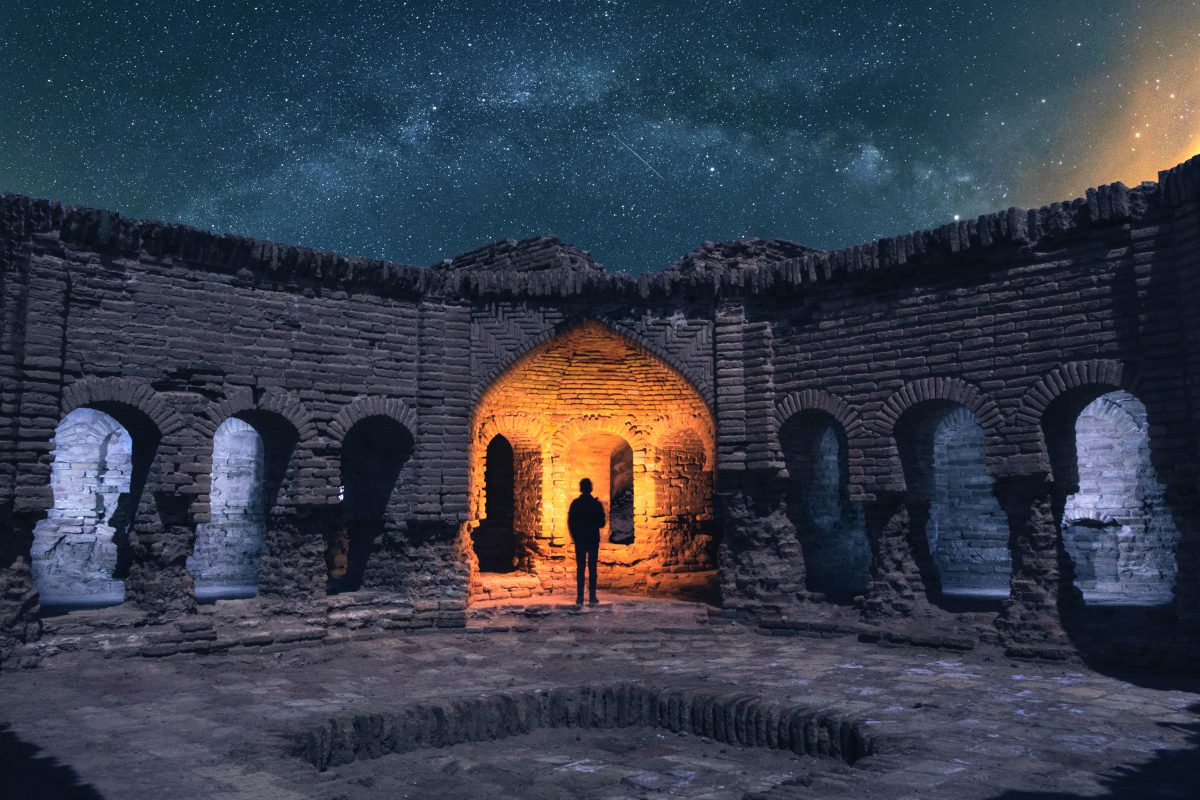
Table of Contents
Welcome, fellow explorers and adventure seekers! If you’ve ever dreamt of embarking on a journey to a land where ancient history, stunning landscapes, and warm hospitality converge, you’re in for a treat. In this Iran Travel Guide, we’re about to unravel the secrets of Iran, a country that has captivated the hearts of travelers for centuries.
Whether you’re considering Iran Travel as your next trip or you’ve already booked your ticket, our aim is to equip you with the knowledge you need to make your trip an unforgettable experience, from understanding the intricacies of obtaining an Iran visa to managing your finances while in the country, we’ve got you covered. We’ll also delve into the nuances of Iranian etiquette and dressing codes, ensuring that you navigate this beautiful nation with grace and respect.
So, get ready to embark on an enriching journey through the enchanting realms of Iran. Pack your curiosity, an open heart, and a sense of adventure because Iran is waiting to reveal its treasures to you. Let’s begin this odyssey together!
Iran Travel Guide: Why Visiting Iran?
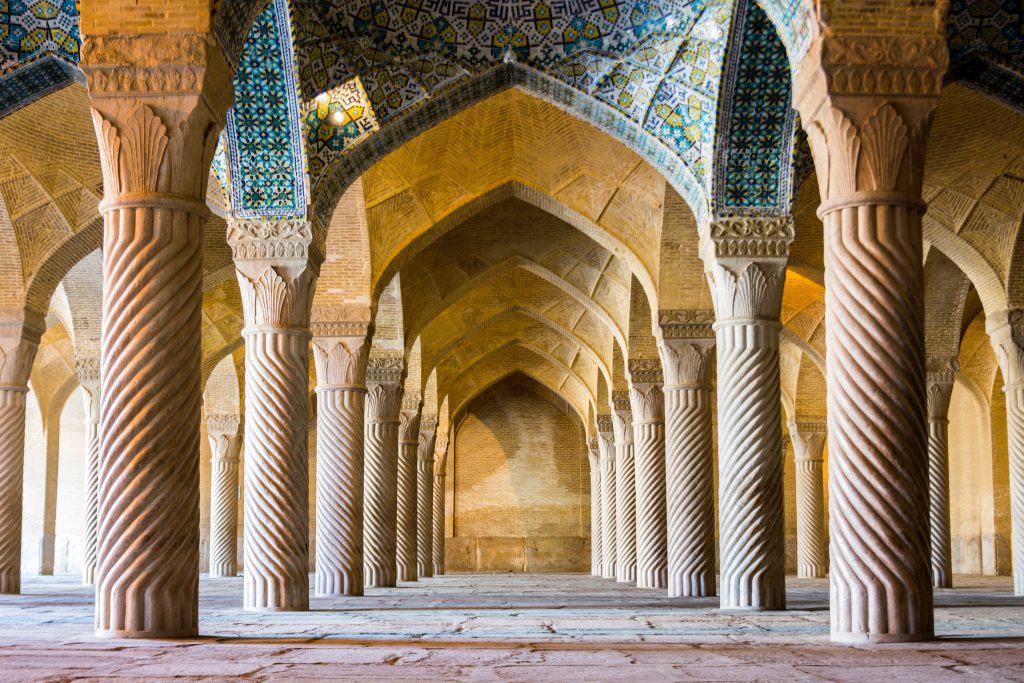
Visiting Iran is an absolute must for any adventurous traveler! With its rich history, breathtaking landscapes, and warm-hearted locals, Iran offers a truly unique and unforgettable experience. Imagine wandering through ancient cities like Isfahan, where stunning mosques and palaces adorned with intricate tile work transport you to a bygone era.
Don’t miss the mesmerizing beauty of the deserts, where the sand dunes seem to stretch on forever under a sky painted with stars. And, of course, the delicious cuisine will tantalize your taste buds with aromatic kebabs, fragrant saffron rice, and sweet baklava. But what truly makes Iran special is the warmth and hospitality of its people, who are eager to share their culture and stories with visitors. Here we listed a few reasons why to visit Iran:
1. Embrace the Timeless History
Iran boasts an ancient civilization that dates back thousands of years, and its historical significance is awe-inspiring. From the magnificent ruins of Persepolis , a UNESCO World Heritage site, to the grand Golestan Palace in Tehran , each structure is a testament to the country’s glorious past. Wander through winding alleys of historic cities like Isfahan and Yazd, where intricate architecture and the echoes of the past transport you to a bygone era.
2. Immerse in Vibrant Culture
Iran’s culture is a tapestry of diverse influences, from Persian, Arab, and Turkish to Central Asian and European. Experience the warmth of its people as they welcome you with open arms and indulge you with their hospitality. Marvel at the vivid colors of traditional clothing and savor the flavors of Iranian cuisine , renowned for its aromatic spices and delicately prepared dishes.

3. Mesmerizing Landscapes
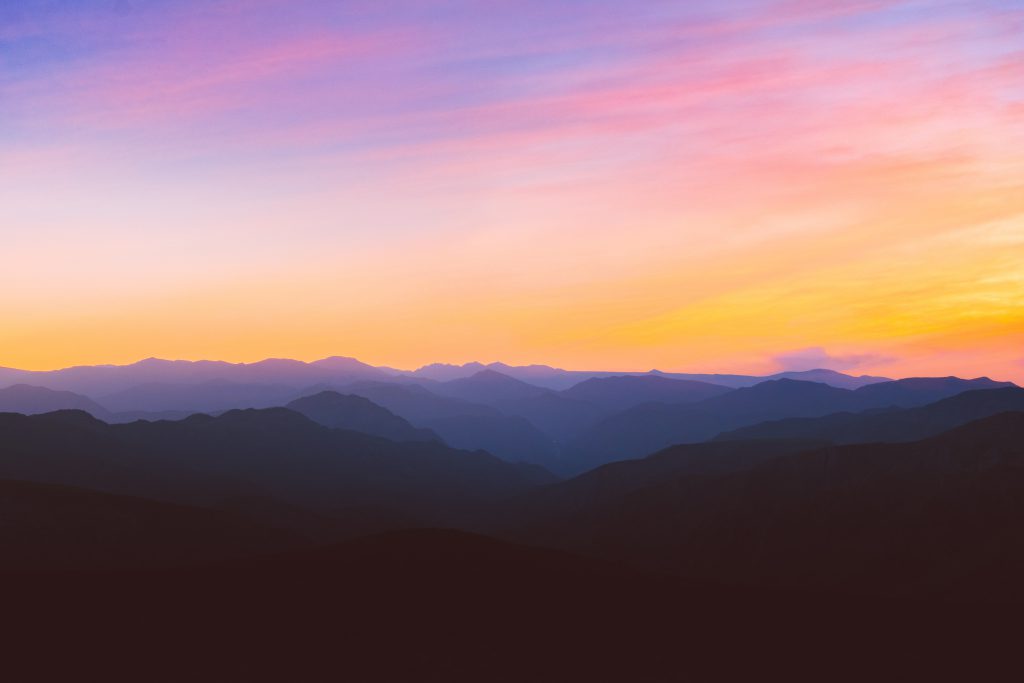
Venture beyond the cities, and Iran unfolds its breathtaking natural beauty. From the lush greenery of the northern forests (Hyrcanian Forests) to the stunning deserts of Dasht-e Kavir and Dasht-e Lut , each landscape is a masterpiece of nature’s artistry. Don’t miss the serene beauty of Mount Damavand or the otherworldly Kaluts, where wind-sculpted sand dunes create a surreal landscape.
4. UNESCO World Heritage Sites
Iran is home to an impressive array of UNESCO World Heritage Sites , and exploring them is like traveling back in time. Discover the ancient city of Bam and its adobe citadel, the awe-inspiring ancient aqueducts of Shushtar , and the magnificent Armenian Monastic Ensembles of Iran. Each site offers a unique glimpse into the country’s diverse heritage and architectural brilliance.
5. Dazzling Art and Architecture
Iran is an art lover’s paradise. Delve into the mesmerizing world of Persian carpets , renowned for their intricate designs and craftsmanship. Admire the mesmerizing beauty of Islamic architecture in mosques like Nasir al-Mulk in Shiraz , where colorful stained glass windows cast a rainbow of hues on the floors.
6. Experience Festivals and Traditions
Plan your visit to coincide with one of Iran’s vibrant festivals, and you’ll be treated to an immersive cultural experience. Witness the exuberant celebrations of Nowruz , the Persian New Year, or be part of the spiritual fervor during Ashura . These festivals offer a window into the soul of Iran’s traditions and values.
7. Warmth and Hospitality of Locals
Iranians are known for their exceptional warmth and hospitality towards visitors. Prepare to be embraced with open hearts and enjoy a genuine connection with the locals. The enriching interactions you’ll have will undoubtedly leave a lasting impression on your travel memories.
8. Safe and Welcoming Environment
Contrary to misconceptions, Iran is a safe country to visit. The people are warm and friendly, always ready to assist travelers. While you should exercise usual caution as with any foreign destination, Iran’s reputation for safety is well-deserved.
9. Off-the-Beaten-Path Adventures
If you yearn for unique experiences, Iran has plenty to offer. Explore the enigmatic village of Masuleh, nestled in the Alborz Mountains, where houses are built into the mountainside. Trek through the lush valleys of Golestan National Park, spotting rare wildlife along the way. These off-the-beaten-path adventures will leave you with unforgettable memories.
10. Photography Paradise
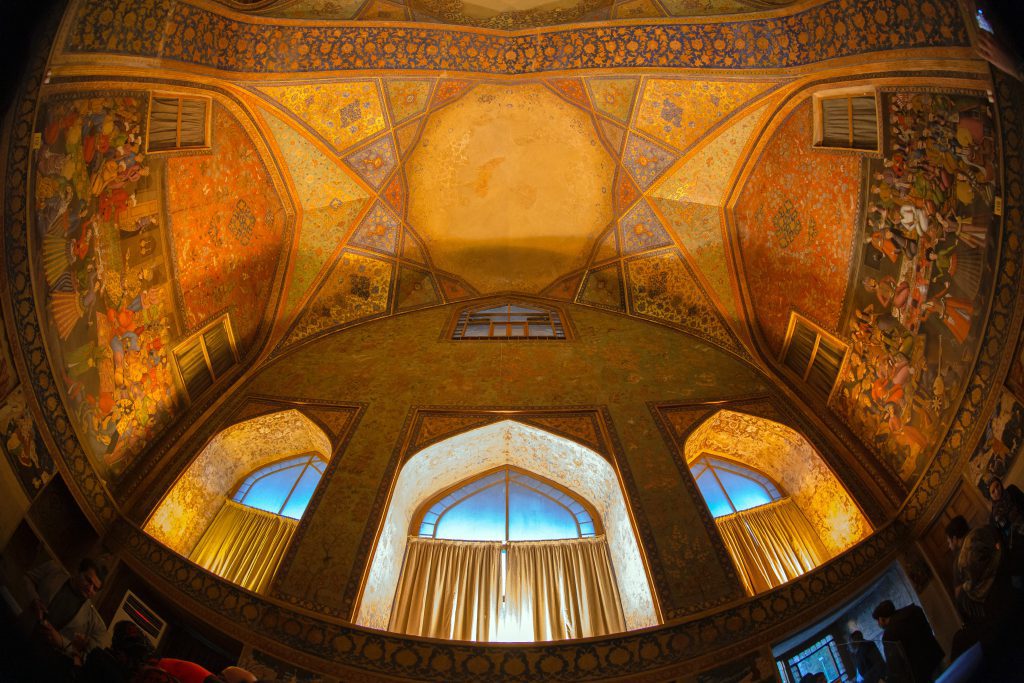
Photographers will find Iran to be a haven of visually stunning landscapes and architectural marvels. From the colorful bazaars to the ancient ruins, every corner of Iran is a potential masterpiece waiting to be captured through your lens.
Persia or Iran: Are They the Same?
Have you ever wondered if Persia and Iran are the same thing? They’re often used interchangeably, but there’s an incredible history to each.
Persia refers to the ancient Persian Empire , which existed around 550 BC to 330 BC. Persia was famous for its amazing art, culture, and architecture back then. It left a big mark on the Middle East and beyond. Today, we use “Persia” to talk about this old kingdom and its impact.
In 1935, the country officially switched its name from Persia to Iran , which means “land of the Aryans.” This change was meant to highlight Iran’s deep ties to the Aryan people who came to the region thousands of years ago. Nowadays, we use “Iran” to talk about the modern-day Islamic Republic of Iran in the Middle East.
Even though people often use Persia and Iran interchangeably, it’s cool to know the history behind each name. By learning about the fascinating history of Persia, you can better appreciate the rich culture and heritage of this beautiful country.
When we dive into Persia’s awesome history and how it influenced the world, we can start to really admire Iran’s amazing culture and heritage. So, let’s explore and learn!
Can Everyone Travel to Iran?
Iran has become a popular travel destination that attracts wanderers from all over the world thanks to its rich history, captivating culture, and breathtaking landscapes. However, some prospective travelers may have lingering questions about whether everyone can travel to Iran. Let’s answer that question!
The answer to whether everyone can travel to Iran is a resounding yes ! Iran, in recent years, has taken significant steps to facilitate travel for visitors from diverse backgrounds and nationalities. The Iranian government, recognizing the potential of tourism and the desire of travelers to explore its wonders, has streamlined visa procedures, making it easier for tourists to obtain necessary travel permits.
While some nationalities can enjoy visa-free entry for short stays, most visitors can apply for a visa through a simple process. The option of a visa on arrival at major airports has also been extended to many nationalities, further enhancing accessibility. These measures reflect Iran’s commitment to being a welcoming and inclusive travel destination. We will talk about getting Iran visa in detail later in this article.
Safety and security are crucial considerations for travelers, and Iran stands as a country with a relatively low crime rate. Misconceptions surrounding its geopolitical situation often overshadow the reality on the ground. The Iranian people are known for their warm hospitality and friendliness towards visitors, making travelers feel welcomed and safe throughout their journey.
Cultural sensitivity plays a significant role in ensuring a smooth travel experience in Iran. The country has a rich cultural heritage, and respecting local customs is essential. While the dress code is more conservative compared to Western norms, adhering to it when visiting public places and religious sites is not only a sign of respect but also fosters positive interactions with the locals. If you’re interested in reading about someone’s experience traveling to Iran with To Iran Tour, we have a fantastic travelogue from one of our guests below. It’s definitely worth checking out!
Iran Travel Story: A Memorable 15-year-old’s Wanderlust Through Iran
Iran is making strides in improving accessibility for people with disabilities. Although there may still be challenges to overcome, many public places, hotels, and tourist attractions have taken steps to accommodate travelers with mobility challenges. Efforts are continuously being made to make Iran a more inclusive destination for travelers of all abilities.
When traveling to Iran, some people may worry about language barriers since English may not be commonly spoken. However, this should not discourage anyone from discovering this fascinating country. The Iranian locals are renowned for their kind-heartedness and eagerness to help tourists communicate, often using hand gestures and basic English phrases. Additionally, many young Iranians speak English as a second language, and it is taught in high schools.
Financial transactions and currency exchange are essential aspects of travel planning. Iran’s official currency is the Iranian Rial (IRR) . While international credit cards may not be widely accepted, travelers can use US dollars or euros and exchange them at official exchange offices or banks. Carrying sufficient cash is advisable, especially when visiting more remote areas where ATMs may not be readily available.
Iran has its unique cultural norms, particularly regarding gender segregation and LGBTQ+ rights. Travelers need to approach these considerations with cultural sensitivity and respect. Understanding and adhering to local customs can create a harmonious travel experience and foster positive interactions with the local community.
Healthcare is a crucial aspect of any travel experience. Iran boasts a well-developed healthcare system with competent medical professionals. While the likelihood of medical emergencies is low, having comprehensive travel insurance is recommended to ensure peace of mind throughout the journey.
To sum up, Iran has made significant strides in improving its travel accessibility in recent years, making it a warm and inclusive destination for visitors from all over the globe. With simplified visa processes, increased safety measures, and a commitment to meeting diverse needs, Iran warmly welcomes travelers. Adapting to local customs, respecting cultural sensitivities, and being open to new experiences will undoubtedly enhance the travel experience in this captivating country where history, culture, and natural beauty unite seamlessly.
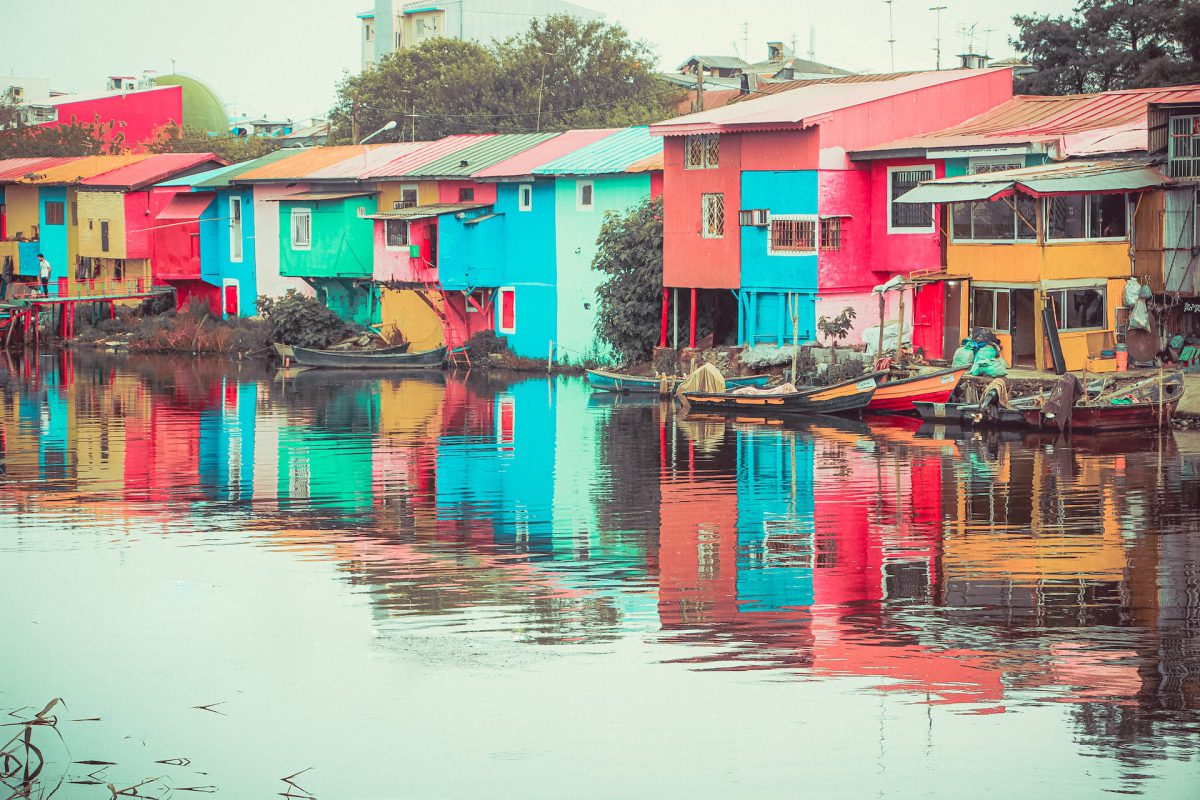
Thank you for joining me on this journey through the historical tapestry of Persia and Iran. Now, we want to extend a personal invitation to each one of you. If you’ve been captivated by the allure of Iran and are considering a visit, or even if you’re just curious to learn more, I invite you to explore our Iran travel guide. It’s a labor of love, crafted to share the magic of Iran with fellow travelers. From general steps to plan your travel to Iran to everything you need to know about Iran visa that might confuse you, our guide promises to be your trusted companion on your Iranian adventure.
How to Plan Visting Iran? (12 Steps)
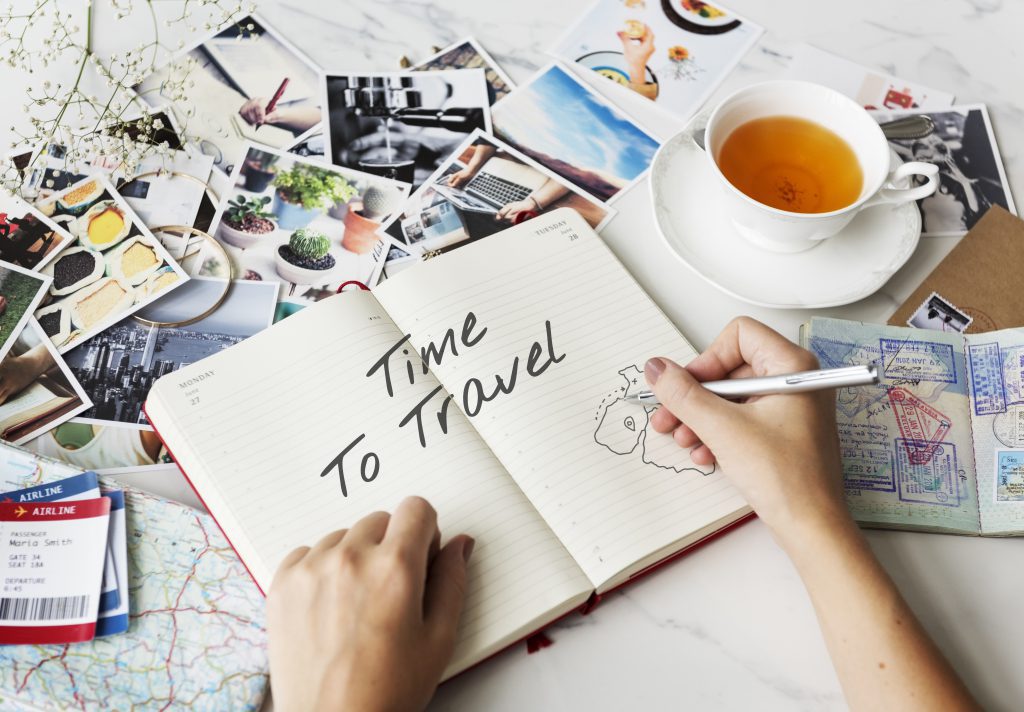
Traveling to Iran, with its rich cultural heritage and stunning landscapes, requires meticulous planning to ensure a smooth and fulfilling journey. Follow this step-by-step guide to efficiently plan your trip to this captivating destination.
Step 1: Research and Itinerary
Start by researching Iran’s diverse attractions and destinations . Identify the places you wish to visit and create a detailed itinerary. Consider the duration of your trip, the activities you want to engage in, and the must-see landmarks you don’t want to miss. You can check ToIranTour packages and customize your desired tour itinerary.
Step 2: Visa and Travel Documentation
Check the visa requirements for your nationality. Most visitors can obtain a tourist visa for Iran through the Iranian embassy or consulate in their home country. Alternatively, you can opt for a visa on arrival at major airports or use of visa services of an authorized tour operator/travel agency. Ensure your passport is valid for at least six months beyond your planned departure date. There is more information about getting Iran visa in the rest of the article and also on our blog .
Step 3: Best Time to Visit
Consider the best time to visit Iran based on your preferences. Spring (March to May) and autumn (September to November) offer mild temperatures and pleasant weather, ideal for exploring the country. Also, the best time to visit depends on the tour and activities. However, each season has its unique charm, so choose according to your interests.
Step 4: Cultural Awareness
Familiarize yourself with Iranian customs and etiquette to show respect for local traditions. Note that women should wear modest clothing that covers the arms, legs, and hair when in public places. Understanding and embracing the culture will enhance your travel experience.
Step 5: Language and Communication
While English is not widely spoken, the Iranian people are known for their warm hospitality. Learn a few basic Persian phrases to facilitate communication and connect with the locals. This will enrich your interactions during your journey.
Step 6: Accommodation and Transportation
Book your accommodation in advance to secure the best options that suit your budget and preferences. Iran offers a range of accommodations, from luxurious hotels to budget-friendly guesthouses. Plan your transportation within the country, whether by domestic flights, trains, or buses, to efficiently navigate between destinations. You can check the accommodation and transportation with a local tour operator.
Step 7: Health and Travel Insurance
Prioritize your health and well-being by consulting a healthcare professional for any required vaccinations or health precautions before traveling to Iran. Additionally, consider purchasing comprehensive travel insurance to provide coverage in case of unexpected medical emergencies or trip disruptions.
Step 8: Currency and Money Matters
Familiarize yourself with Iran’s currency, the Iranian Rial (IRR), and its exchange rates. While credit cards are not widely accepted, carrying sufficient cash is advisable, especially when traveling to remote areas where ATMs may not be readily available. Also, read about travel costs in Iran to plan accordingly.
Step 9: Safety and Security
Iran is considered a safe destination for travelers, with a low crime rate and a welcoming local population. However, exercise standard safety precautions and stay informed about local conditions to ensure a worry-free journey.
Step 10: Respect for Religious Sites in Iran
Iran is home to numerous significant religious sites. Show respect when visiting mosques, shrines, and other places of worship by adhering to dress codes and rules for visitors.
Step 11: Iran Local Customs and Traditions
Respect local customs and traditions to foster positive interactions with the Iranian people. Greetings, gestures, and dining etiquette -which we are going to talk about later in this article – may differ from your home country, so be open-minded and willing to embrace cultural differences.
Step 12: Packing Essentials
Pack appropriate clothing for varying weather conditions and cultural considerations. Don’t forget essentials like sunscreen, comfortable walking shoes, and a reusable water bottle for staying hydrated.
DIY or Tour for Traveling to Iran? Our Iran Travel Guide Perspective
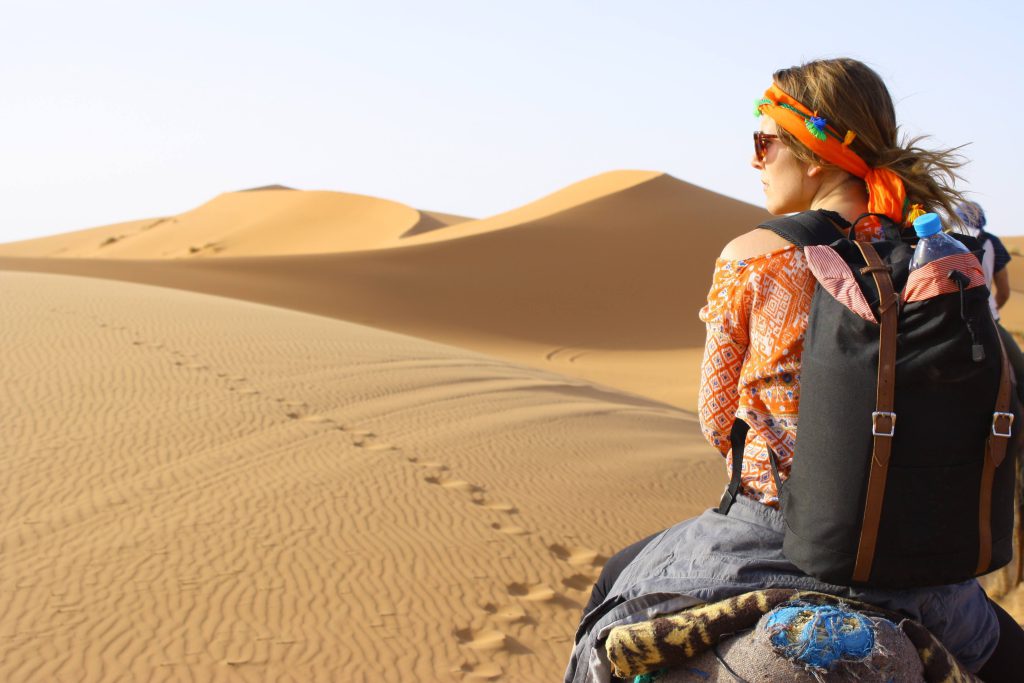
When you’re thinking about having an awesome trip to Iran, you’ve got to decide if you want to plan everything yourself or join a guided tour . Each option has its own good and not-so-good points, so it’s important to pick what suits you and your travel goals best. In this comparison, we’ll look at the perks of DIY travel to Iran or going on a tour for visiting Iran. We’ll highlight why it’s a great idea and show you why tour services are valuable.
DIY (Do-It-Yourself) Travel to Iran
- Freedom and Flexibility: DIY travel offers the freedom to create a personalized itinerary, exploring off-the-beaten-path destinations at your own pace. It caters to adventurous spirits who relish the thrill of independent exploration.
- Cost Control: Traveling independently allows budget-conscious travelers to choose accommodations, transportation, and dining options that align with their financial preferences.
- Authenticity in Interactions: With DIY travel, you have the opportunity to interact with locals on a more personal level, leading to genuine cultural experiences and connections.
Weaknesses:
- Logistical Challenges: Planning transportation, accommodations, and activities can be time-consuming and potentially overwhelming, especially in Iran with language barriers and unfamiliar customs.
- Navigating Language Barriers: English is not widely spoken in Iran and this will lead to communication challenges in certain situations.
- Cultural Awareness: Researching and adhering to local customs and etiquette may require extra effort to ensure respectful interactions.
Travel to Iran by Tour
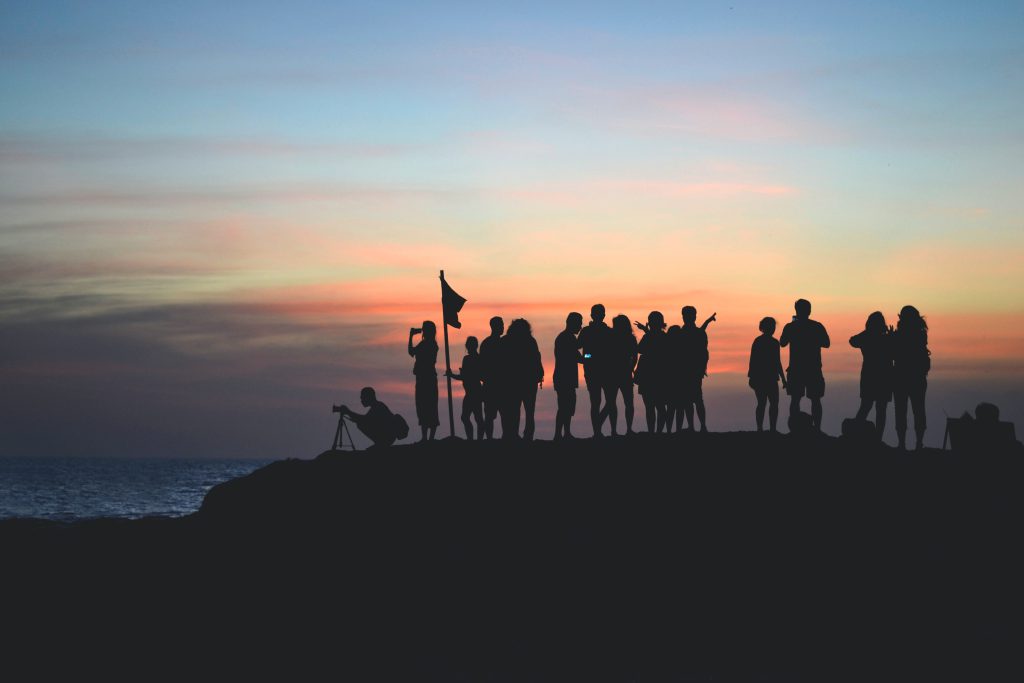
- Reasonable Pricing: Contrary to common misconceptions, tours to Iran often offer excellent value for money, including a comprehensive package of services and experiences at a reasonable cost.
- Local Knowledge: Tour guides possess extensive knowledge of Iran’s history, culture, and landmarks, providing enriching insights and context to enhance your understanding of the destination.
- Close Connections with Locals: Tour operators often have well-established relationships with local communities, facilitating authentic encounters with Iranians and unlocking hidden gems inaccessible to DIY travelers.
- Awareness of Subtleties: Experienced tour guides are attuned to cultural nuances, ensuring that travelers navigate social interactions with grace and sensitivity.
- Authentic Experiences: Tours curate experiences that offer a balance between must-see landmarks and off-the-beaten-path wonders, providing a more authentic and immersive travel experience. Since Iran is a less-known destination, this issue becomes more important.
- Fixed Itineraries: Tours operate on pre-planned itineraries, which may not cater to individual preferences for spontaneity and exploration. To solve this problem, you can use individual and customized tours. ToIranTour can help you in this matter.
- Group Dynamic: Traveling with a group may limit personal freedom and require compromise on specific preferences. However, using the services of tour operators who are committed to organizing tours with small groups can solve this problem to a large extent.
While both DIY travel and guided tours have their perks, let’s talk about why you might want to consider taking an Iran tour. Tours in Iran are like having a friendly local show you all the best stuff. They know the coolest places, the tastiest food, and the most interesting stories.
When you join a tour, you don’t need to worry about all the nitty-gritty details of planning. The tour guides take care of everything, so you can relax and enjoy your trip. Plus, they know all the ins and outs of Iran’s beautiful landscapes, so you won’t miss a thing.
But the best part? You get to connect with the local folks, discover hidden gems, and dive deep into Iran’s rich history and culture. It’s an adventure you won’t forget! So, if you’re looking for a stress-free and amazing way to explore Iran, consider joining a tour .
How Can I Buy Iran Tours?
To make sure your trip is fantastic and easy, you need to think about a few important things when choosing your tour. We’re here to help you with that. Check out these key factors to find the perfect tour for your travel to Iran:
1. Attractiveness of the Itinerary
Examine the tour itinerary closely to determine its appeal and alignment with your interests. A well-crafted itinerary should encompass a balance of must-see attractions and off-the-beaten-path gems, offering a comprehensive exploration of Iran’s diverse landscape. Look for unique experiences, cultural encounters, and opportunities for authentic interactions with local communities.
2. Licensed Tour Operator
Verify whether the tour operator is licensed and accredited by relevant authorities. A licensed operator adheres to specific standards, ensuring compliance with safety regulations, customer protection, and quality of services. This validation offers peace of mind and enhances the reliability of the tour.
3. Right Price vs. Misleading Pricing
Price is a crucial consideration, but it should not be the sole determining factor. Be cautious of tours that offer significantly lower prices than competitors, as they may compromise on the quality of services and experiences. Compare the inclusions of each tour to assess its true value and avoid being misled by seemingly inexpensive options.
4. Customer Support
Good customer support is integral to a satisfying travel experience. Look for a tour operator who is responsive to inquiries, provides detailed information, and is attentive to your needs and preferences. A reliable tour operator should be readily available to address any concerns before, during, and after your journey.
5. Communication with the Tour Operator
Efficient and clear communication with the tour operator is vital for a seamless travel experience. Ensure your Iranian tour operator is accessible through various communication channels, such as email, phone, or chat. Prompt responses and transparent communication demonstrate the operator’s commitment to customer satisfaction.
6. Group Size and Dynamics
Consider the group size of the tour and how it aligns with your preferences. Smaller groups offer a more intimate experience, while larger groups may foster camaraderie with fellow travelers. Choose a group size that complements your travel style.
By picking a tour that matches your interests , you can have an incredible adventure exploring Iran’s history, culture, and beautiful natural sights. So, get ready to discover the magic of Iran and enjoy every moment of your unforgettable journey!
Local Tour Operator or International Tour Operator?
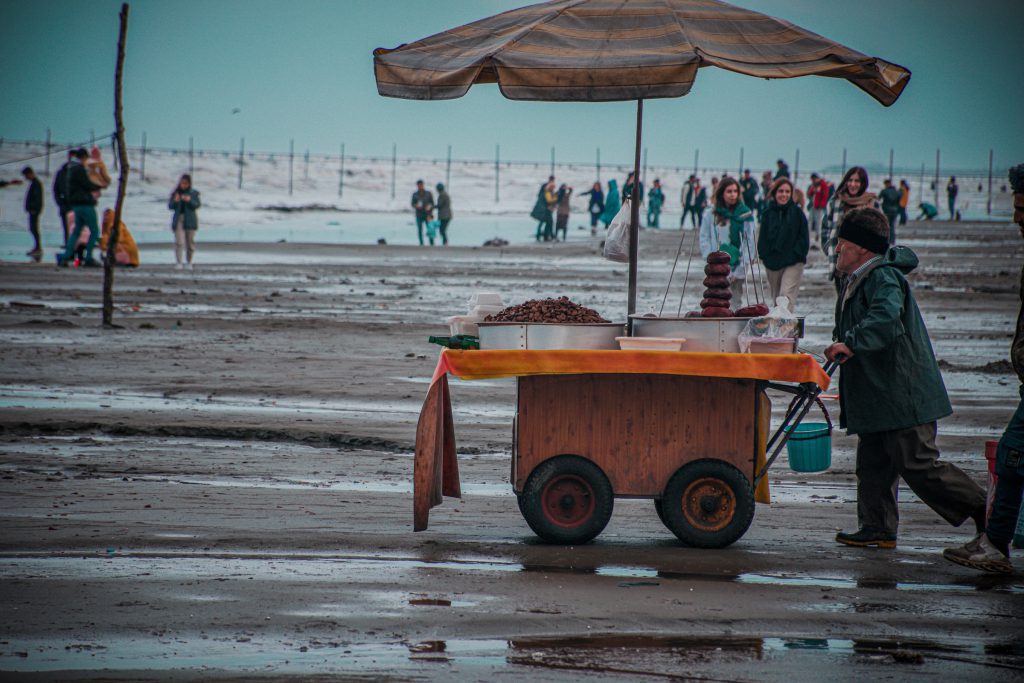
When you’re planning your trip to discover the amazing attractions of Iran, you have two choices: you can either go with a local tour company or an international one. Each of these options has its own good sides and not-so-good sides, and they’re better suited for different kinds of travelers. In this comparison, we’ll focus on why using a local tour company can be a great idea. We’ll talk about what they’re really good at and how they can make your travel experience even more special.
Local Tour Operator
- Reasonable Pricing: Local tour operators usually have great prices because they really know the local scene. They can talk with suppliers and get good deals, often saving you a lot of money – up to 80-100% less than international tour operators. One reason is that local operators have lower taxes. On the flip side, many international tour companies team up with locals to run their tours. When they add an extra layer like an intermediary, costs go up, and so does the price for you.
- Local Knowledge: Utilizing the expertise of a local tour operator grants travelers access to a wealth of insider knowledge. Local operators possess an in-depth understanding of Iran’s history, culture, and attractions, allowing for enriching insights and personalized recommendations.
- Close Connections with Locals: Local tour operators have well-established relationships with local communities, leading to meaningful cultural interactions and authentic experiences that might not be possible with international operators. Local tour operators are attuned to cultural nuances and customs, ensuring that travelers navigate social interactions with respect and grace, leading to more immersive and respectful experiences.
- Flexible Itineraries: Local operators can offer more flexibility in tailoring itineraries to individual preferences, allowing travelers to focus on specific interests and personalize their journey.
- Unknown brand and trust: Naturally, international tour operators have a more well-known brand, and it is easier to trust them. Of course, you can trust local tour operators who have an official license and also have good performance in their previous services. On the other hand, you can book your tour with just a small deposit.
International Tour Operator
- Global Expertise: International tour operators often have a wider network of destinations and resources, offering comprehensive tour packages that cover multiple countries or regions.
- Ease of Booking: International operators usually have user-friendly websites and customer service in various languages, making booking and communication more accessible for a diverse clientele.
- Higher Costs: International tour operators may have higher overheads and administrative expenses, which can be reflected in the pricing of their tours, making them comparatively more expensive.
- Limited Local Insights: While international operators offer broad coverage, their understanding of the local culture and customs in specific destinations may not be as deep as that of local operators.
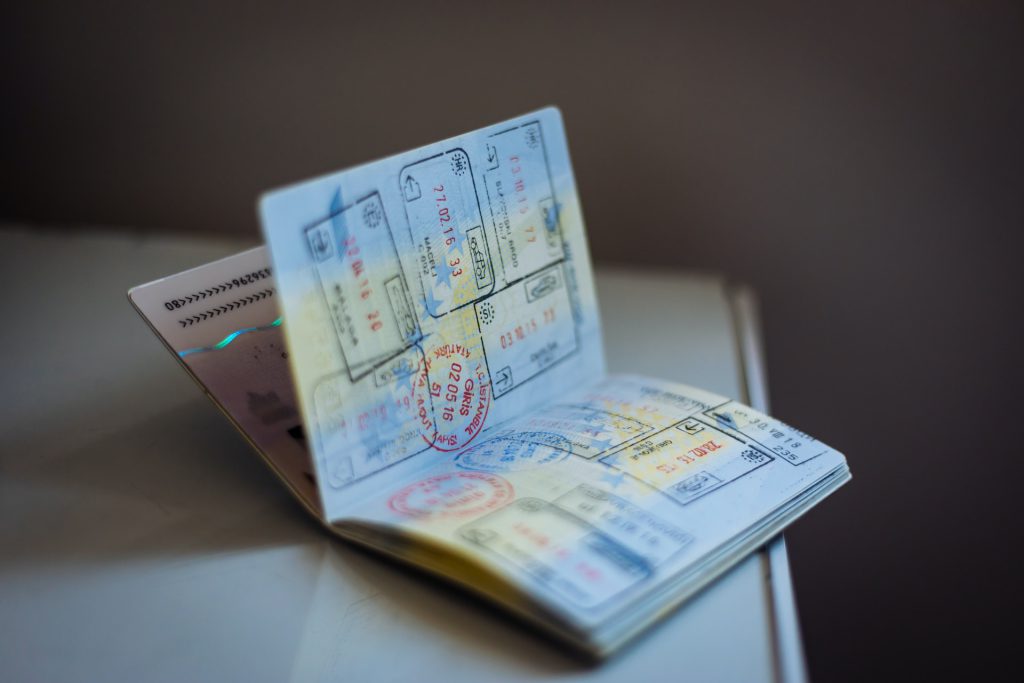
Are you having trouble with the Iran visa application process? You’re not alone. Getting a visa for Iran can be tricky for many travelers. It’s important to determine if you’re eligible and what rules you need to follow.
Generally, visiting Iran needs a visa, except for a few countries that can travel to Iran visa-free. There are some countries that can get their visa on arrival, but some countries are not eligible for Iran visa on arrival, and they must get their visa before their trip (which normally takes about 3 to 7 days to get your visa). There are some countries that don’t need any visa for visiting Iran. Keep reading to find out which group you belong to.
To get your visa, you can go to Iran’s embassy in your country, or apply for your Iran visa online , or even easier, use an authorized tour operator to do the process for you.
For some countries like the US, the UK, and Canada , things might be more complicated. Their governments don’t have good relationships with Iran’s government, which can make getting a visa even harder. Right now, there’s no Iranian embassy in the US.
Don’t let this process stop you from exploring the great things Iran has to offer. With some planning and looking into things, you can make the visa application go smoothly. Make sure you know what your nationality needs and give yourself enough time.
Even though getting a visa can be tough, Iran is an amazing place to visit. There are ancient cities with beautiful buildings, delicious food, and friendly people who will make you feel welcome. So, don’t let the visa process hold you back. Start planning your trip to Iran today, and To Iran Tour can help you make getting your visa easier .
How to Get an Iran Visa on Arrival?
Feeling a bit stressed about getting your visa to Iran? Well, here’s some good news! If you’re from one of 180 countries, you might not need to stress too much.
Starting from February 14, 2016, Iran’s Ministry announced something cool. They said that at their airports, they can give 30-day visas to people from those 180 countries. This makes things super simple if you want to visit Iran and see all its amazing stuff.
But hold on a second! Not everyone from those 180 countries can just show up and get a visa. It might depend on where you’re from, and there could be some rules you need to follow. Before you pack your bags for Iran, make sure to check what you need to do based on where you’re from.
If you’re allowed to get an Iran visa on arrival, you can do it at different airports, like Tehran Imam Khomeini Airport (IKA), Mashad Airport, Shiraz Airport, and more. Here’s what you’ll need to do:
- Answer some questions about your Iran trip,
- Show them where you’re staying (like a hotel reservation),
- Share a copy of your travel insurance,
- Prove you have a return flight ticket
By keeping yourself informed and being careful, you can have a great and safe trip to Iran!
Iran Visa Requirements: Best Guide 2023
Travel to Iran Without a Visa
There are 14 countries in 2023 that can visit Iran without any visa at all. These countries include Turkey, Azerbaijan, Georgia, Malaysia, Oman, Venezuela, China (for 21 days), Hong Kong, Macau, Egypt, Armenia, Lebanon, Bolivia, and Syria. To read more about Iran travel without a visa, read the article below:
Travel to Iran Without a Visa in 2024: Your Ultimate Guide
Non-eligible Nationalities for Iran Visa on Arrival
It’s important to know who can get a visa when they arrive in Iran. If you’re from countries like Afghanistan, Bangladesh, Colombia, India, Iraq, Jordan, Pakistan, Somalia, the United States, Canada, and the United Kingdom, you can’t get a visa on arrival.
If that’s the case for you, don’t worry! You can still get a visa in a few different ways. You can go to the Iranian embassy in your home country, apply online, or ask an authorized tour operator to help you out , which is the easiest option.
How to Get an Iran Visa; A Complete Guide
What is the Iran Visa Authorization Code
This code is necessary for everyone who wants to apply for an Iran visa and serves as a determining factor for your visa application’s approval.
For those who plan to travel in a group, the tour operator will generally process the visa process and get the authorization code.
For solo travelers or those who don’t have a tour agent, ToIranTour can be a reliable option that offers essential travel services for visiting Iran. Alternatively, you can source an Iranian travel agency or seek direction from the embassy where you plan to obtain your visa.
When applying for the Authorisation Code, you’ll need to specify the embassy or airport where you’ll be processing your visa (unless you’re American, Canadian, or British because Iran doesn’t have embassies there). This can be a bit challenging for those traveling without solid plans or those who plan to visit multiple cities in Iran. It’s wise to choose an embassy in a city you’re likely to fly into Iran from, taking into account the processing time required for your visa application.
Remember, the Authorization Code isn’t your visa . It doesn’t guarantee you’ll get one. Once you have the code, you have to collect your visa label at the embassy/Iranian airport within three months . It’s a good idea to apply well ahead of your trip to handle any delays or issues. So, by getting the Authorization Code and applying for your visa early, you can have a smooth and fun trip to Iran.
Iran Tourist Visa Cost
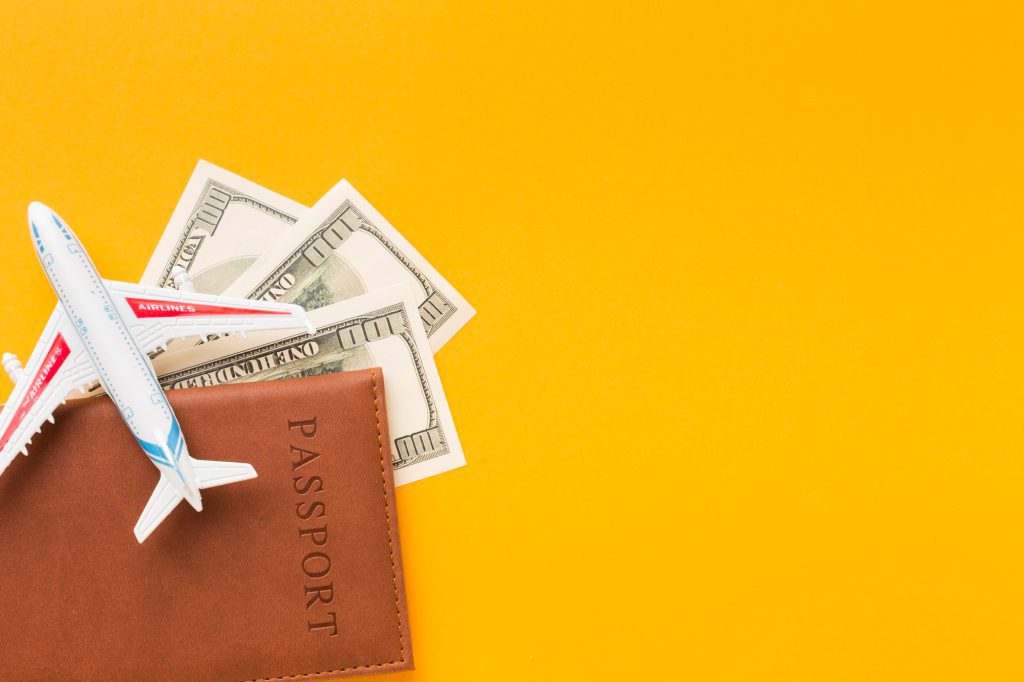
When planning to obtain an Iran tourist visa, it’s important to budget for the costs of the visa. The cost of the visa service varies depending on the agency, usually with an administration fee of 30 to 50 euros, unless booked along with a tour package.
To Iran Tour offers the most affordable service for this situation, and they even have promotions where it can be free. Plus, if you book a tour with To Iran Tour , you won’t have to pay for the visa service.
However, the price of an Iran tourist visa depends on your nationality and the embassy where you apply for it. There isn’t a fixed fee for the visa, so it’s essential to inquire about the current fees at the embassy where you intend to obtain it. Consequently, the visa cost can vary depending on the location where you submit your application. For instance, one traveler paid €180 for their visa in Tbilisi, Georgia, while another paid a slightly higher amount to process their visa in Paris.
An IMPORTANT note is that to pay the cost of a visa at the airport, have enough cash in your pocket as in Iran, international payment cards are not valid. We have travelers who put their cash money in bags and do not have access to their money when check-in and have administrative problems, So keep enough cash in EUR/USD by yourself while getting your stomp visa at the airport.
It’s recommended to budget for the highest possible cost when planning your trip, as visa fees can change without notice. By budgeting accordingly and planning in advance, you can ensure a smooth and hassle-free visa application process and enjoy your trip to Iran with ease.
Iran Visa Timings
Obtaining an Iranian tourist visa is not a time-consuming process, but travelers should plan accordingly to avoid any last-minute stress. It’s important to be aware that the Authorisation Code, necessary for obtaining a visa label, could take 3 – 7 working days to process except for US, Canada, and Britain passport holders, which take more time (around 30-45 working days). Even if you fast-track the process, it’s likely that the code will arrive with only a few days to spare before your planned arrival in Iran or tour start date.
This means that before any trip to Iran, especially when traveling on a tour, you’ll need to plan in advance and be prepared to rush to the embassy to process your authorization code. You may have to pay extra for fast-tracking and organizing your flight ticket to Iran at the last minute, which doesn’t always guarantee the best price. So, it’s a good idea not to book your flights to Iran or any travel arrangements until you know your Iran visa will be processed.
By planning ahead and being aware of the potential delays and challenges in obtaining an Iran tourist visa, travelers can have a stress-free and enjoyable trip to this beautiful country.
How Can US citizens Travel to Iran?
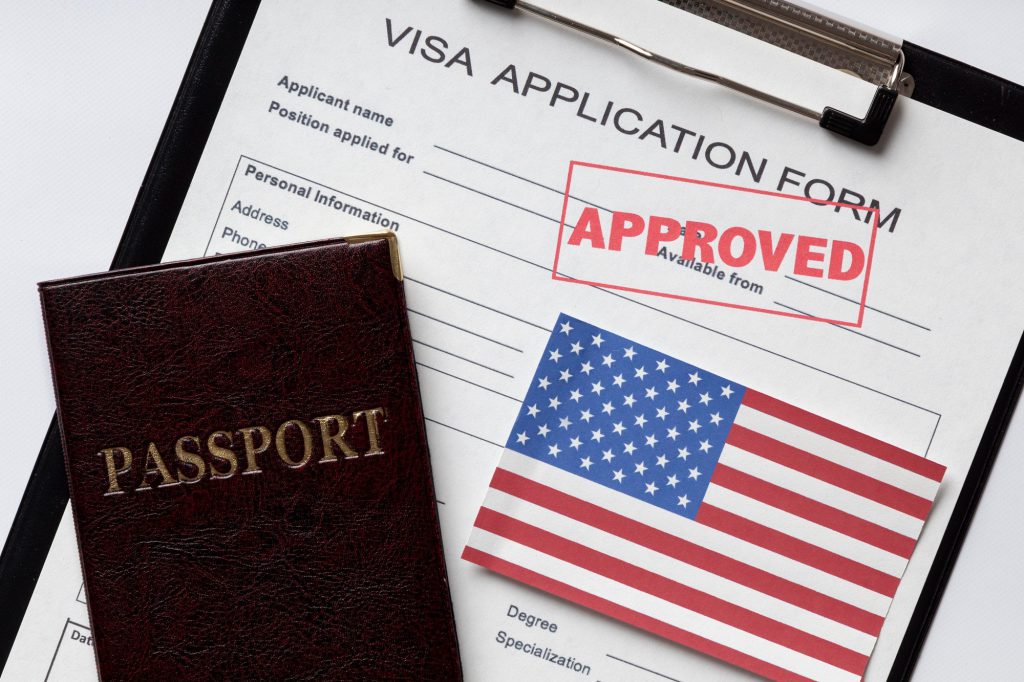
For American citizens, exploring the wonders of Iran can be an enticing prospect, but it comes with a unique set of considerations due to the complex relationship between Iran and the United States of America.
When it comes to visas, Iran has stricter conditions for American citizens, and the United States has similar policies for Iranian nationals. While the process of obtaining a visa for American citizens traveling to Iran may require more time and effort, it is entirely possible with the right approach . Here’s a brief explanation of the process.
1. Visa Application Process:
If you plan to travel to Iran, it’s best to start the visa application process well before your intended departure date. It’s recommended to begin the process at least two months in advance to ensure there is enough time for processing.
2. Contacting the Iranian Interests Section or Embassy
American citizens seeking to obtain an Iran visa must contact the Iranian Interests Section located at the Embassy of Pakistan in Washington, D.C. This is due to the absence of any direct embassy or consulate representation of Iran in the United States. Alternatively, they may choose to contact an Iranian consulate in a third country.
3. Application Documentation
Applicants will need to submit specific documentation to support their visa application, including a completed visa application form, a valid passport with at least six months’ validity beyond the planned departure date, passport-sized photographs, a detailed travel itinerary, and their resume which you can download its sample resume here .
4. Letter of Introduction
If you’re an American citizen planning to visit Iran, you’ll need something important: a special letter. This letter can be easily obtained through a trusted travel agency in Iran. They’ll help you get this letter from the Iranian Ministry of Foreign Affairs.
This letter is like your travel pass. It should explain why you want to visit Iran, your travel plans, and if someone in Iran is helping you, they should be mentioned too.
5. Group Tour vs. Independent Travel
American citizens can choose between traveling as part of an organized group tour or in a private tour.
IMPORTANT note: Both should be escorted by an authorized tour guide. Joining an organized group tour can simplify the visa process, as the tour operator may assist with obtaining the letter of introduction and navigating the application procedure.
6. Additional Screening and Processing Time
Due to the sensitive nature of the bilateral relationship, visa applications from American citizens undergo additional screening, which may contribute to longer processing times compared to citizens of other countries. However, it is crucial to remain patient and diligent throughout the process.
7. Visa Validity and Duration
After approval, the visa will specify its validity period and the permitted duration of stay in Iran. It is crucial to strictly adhere to these limitations to prevent any complications while traveling.
Therefore traveling to Iran as a US citizen may require navigating a more intricate visa application process due to the existing differences between Iran and the United States. However, with careful preparation, proper documentation, and patience, obtaining an Iranian visa is entirely possible. By adhering to the specified requirements and following the recommended steps, American travelers can embark on an unforgettable journey to discover the rich history, culture, and beauty of Iran, making memories to cherish for a lifetime.
Iran Visa for US UK and Canada Citizens: A Comprehensive Guide
How Can British and Canadian Citizens Travel to Iran?

British and Canadian citizens can travel to Iran following a similar process as American citizens . They must apply at the Iranian embassy in England or Canada, considering the required documentation and a letter of introduction from an authorized travel agency in Iran. Notably, these nationalities cannot obtain airport visas and must only use escorted tour services through a tour operator.
If the office of the custodian of Iran’s interests in Washington or other embassies located in Canada and England is far from your place of residence, or if you cannot visit them for any reason, you can receive your visa through the postal service. You should send the necessary documents, including your passport and your photo, along with a special form filled out by mail to the office of Iran’s Interests Protector or the embassy of your choice. After completing the administrative formalities, they will send the passport along with the visa to you.
Visa Refusal Possibilities
Travelers need to be aware that there is a risk of visa refusal for Iran if there is proof that they have traveled to Israel. This is due to the political tensions between the two countries and the Iranian government’s strict stance on the matter.
Additionally, visitors who work in certain industries, such as journalism or media, may also face scrutiny from Iranian authorities. This is because the Iranian government is sensitive to the portrayal of the country in the media and may view journalists and media workers as a potential threat to their national security.
If you have traveled to Israel in the past, it’s important to be transparent about this when applying for an Iran tourist visa. While this may increase the likelihood of visa refusal, it’s important to be honest to avoid any potential legal issues or complications during your visit.
It’s also recommended to avoid discussing any sensitive topics related to politics or religion during your stay in Iran, as these may be viewed as provocative and lead to unwanted attention from authorities.
Nationality Restrictions- Israelis Travel to Iran
It’s really important to know that if you’re from Israel, you can’t go to Iran. The two countries don’t get along right now, so this rule probably won’t change for a while.
We understand that it might be disappointing if you’re from Israel and you want to visit Iran to learn about its amazing culture and history. But it’s super important to follow the rules and not try to sneak into Iran. If you do, you could get into big trouble with the law, and your safety could be in danger.
Even if you have another passport from a different country, don’t try to go to Iran if you’re also an Israeli citizen. It’s just not safe.
Travel Insurance for Visiting Iran: Insights from Our Iran Travel Guide
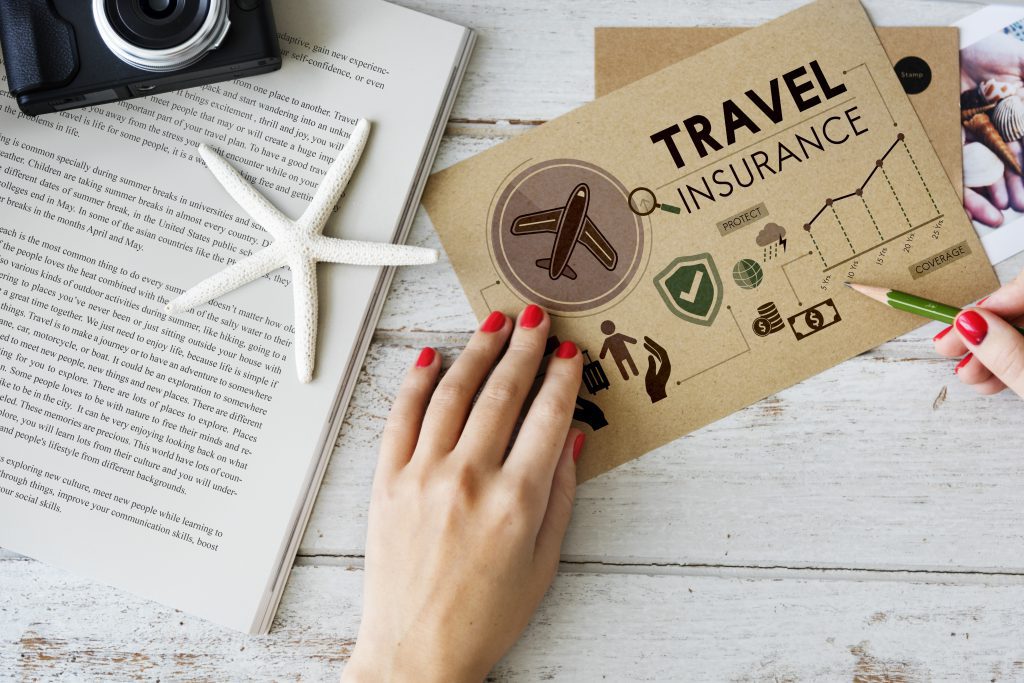
When you’re getting ready for a trip to Iran, remember this: You need travel insurance to get your visa. It’s like a permission slip for your trip.
But not just any insurance will do. Make sure your insurance covers all of Iran and all the stuff you want to do there. Some insurance might say no to certain places or activities, so read the fine print!
You can also ask your tour guide to set you up with health insurance from a company like Saman Insurance. This insurance will help if you get sick or have an accident, and it can cover up to 50,000 Euros in medical bills.
So, if you want to stay safe and have a blast in Iran, get good travel insurance and be careful. Happy travels!
Booking the Best Tour
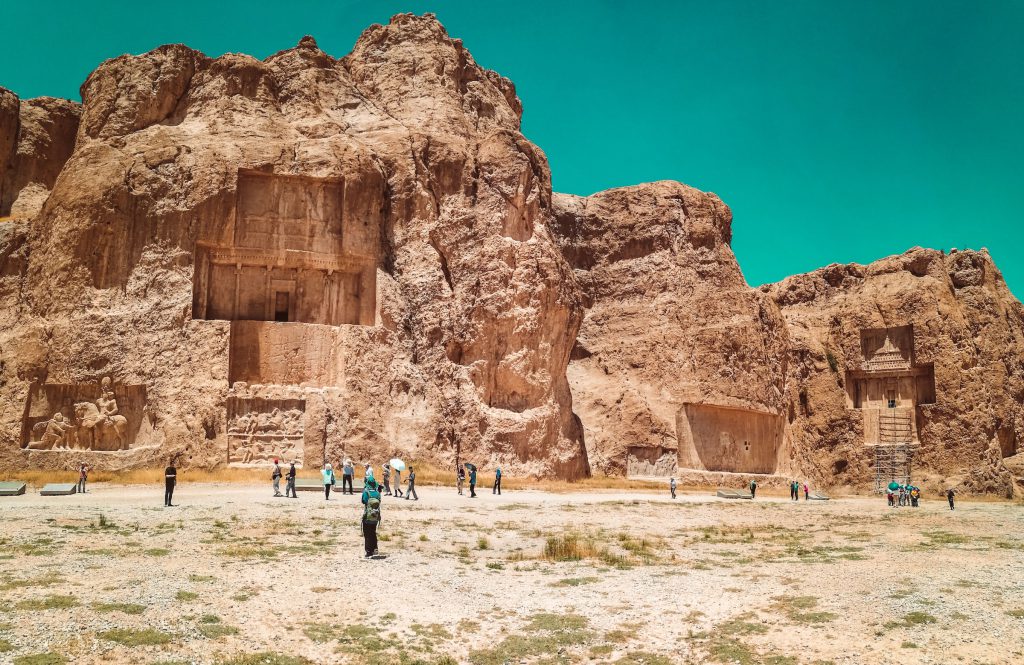
Booking an Iran tour package is a fantastic way to dive into the country’s incredible culture and history. It’s especially great if you want a smooth and stress-free trip. This might be your only option if you’re from the UK, the US, or Canada. You see, these countries have special rules that say you must join an official Iran tour operator or hire a private Iran guide.
Now, there are so many Iran tour packages out there that it can feel a bit overwhelming. But don’t worry! If you pick a trusted tour company like To Iran Tour , you’re in for a memorable adventure. We’ll take you to amazing places in Iran, ones that you might not easily reach on your own or using public transport. Plus, your local guide will be a treasure trove of info about Iran’s ancient history – perfect if you’re a history and culture fan.
You might think being in a tour group means you’re stuck all the time, but that’s not the case. You’ll still have plenty of free time to explore each place at your own pace. Even in a small group, we had loads of opportunities to discover Iran’s hidden gems on our terms.
Now, one thing to remember is that Iran tour packages can be quite packed. There’s not much downtime or rest days on the schedule, which might feel a bit rushed if you prefer a slower travel pace. But in just 12-14 days, you’ll see and experience so much that you’ll never forget.
All in all, booking an Iran tour package is an awesome way to soak up this incredible country and its rich culture and history. With a bit of planning and research, you’ll find the perfect tour that matches your interests and travel style. You’ll make memories that will stick with you forever.
Private Guided Tours of Iran
For those who prefer a more personalized travel experience, hiring a private tour guide in Iran is a great option. While it typically requires a minimum of two people, it offers the flexibility to customize your itinerary and travel at your own pace.
Private guided tours of Iran are particularly appealing to those who may have visa restrictions or prefer to avoid traveling in larger groups. With a private guide, you’ll have the benefit of local knowledge and expertise, and you can tailor your itinerary to suit your interests and preferences.
One of the advantages of a private guided tour is that you can have an intimate and authentic experience of Iran’s culture and history. Your guide can take you to off-the-beaten-path destinations and provide insights into local customs and traditions, giving you a deeper understanding and appreciation of the country.
Additionally, a private guided tour allows you to avoid the hassle and stress of planning logistics and transportation on your own. Your guide can handle all the details, from arranging accommodations and transportation to helping you navigate local customs and etiquette.
Iran Independent Travel
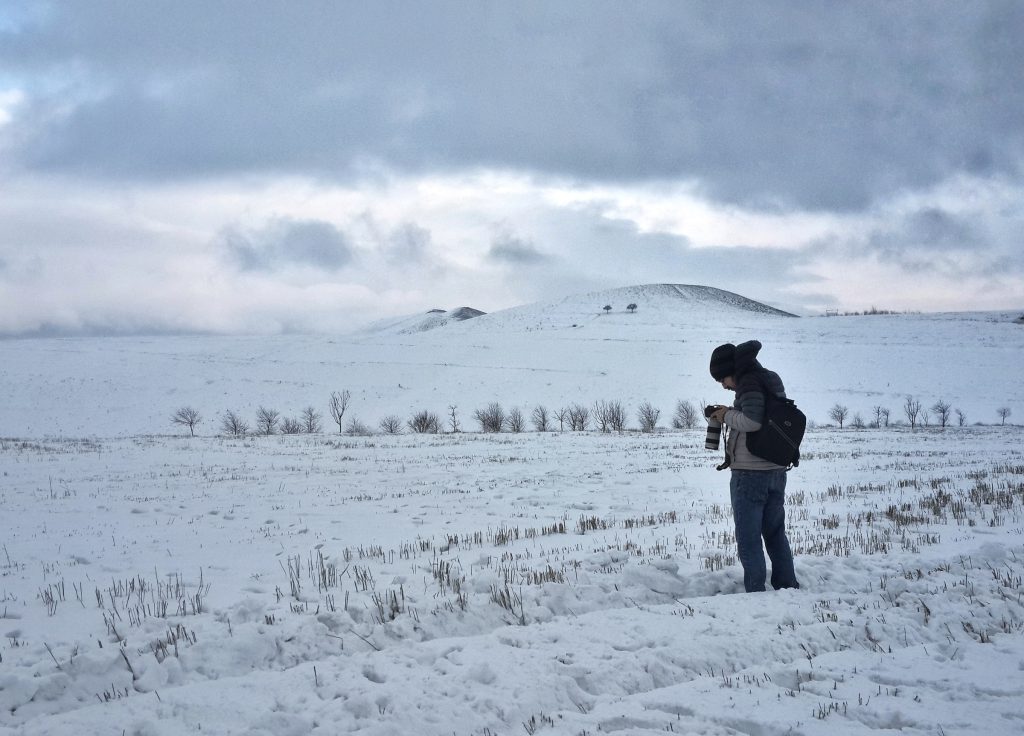
While solo and independent travel to Iran can be moderately easy for those with a free nationality, it’s important to note that the country is not yet well-trodden on the independent travel path. Hostels and guesthouses are scarce, and big, expensive hotels dominate the landscape, especially in Tehran. It’s also rare to come across a group of solo travelers to join.
However, that doesn’t mean that solo travel in Iran is impossible or unsafe. On the contrary, it’s a rewarding and exhilarating experience that offers a unique glimpse into the country’s rich culture and history. While it may require a bit more planning and effort, traveling independently in Iran allows you to create your own itinerary and explore at your own pace.
One of the advantages of independent travel is the flexibility to stay in smaller, locally-run accommodations and eat at local restaurants, giving you a more authentic and immersive experience. It also allows you to connect with locals and learn about their way of life, which can be a highlight of any trip.
Of course, traveling independently in Iran also requires some caution and common sense, such as being aware of local customs and dress codes and taking necessary precautions for safety. It’s also important to do your research and plan ahead to ensure a smooth and enjoyable trip.
Couchsurfing in Iran
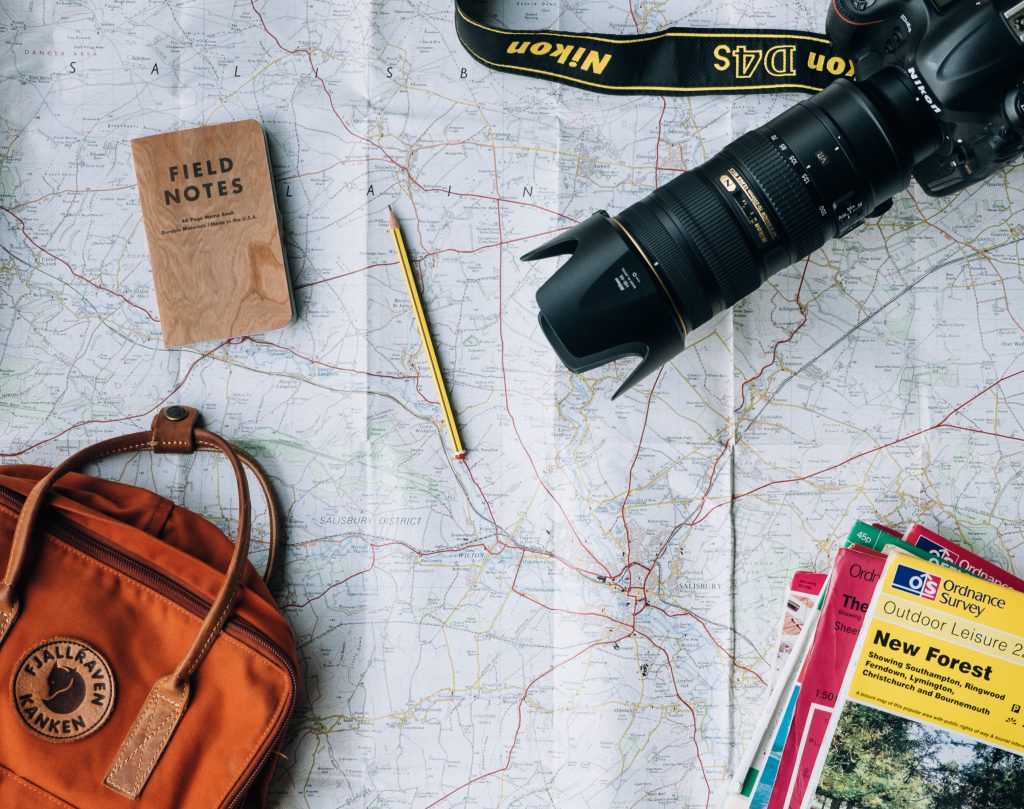
Couchsurfing can be a popular option for budget-conscious travelers looking to connect with locals and experience the culture firsthand. However, it’s important to note that Couchsurfing in Iran is officially illegal. While many independent travelers have reported using the resource and finding local hosts to be excellent guides, there are some risks involved.
One of the main concerns with Couchsurfing in Iran is the lack of official filters in place for hosts listed online. This means that travelers must exercise caution and take responsibility for their own safety. In the event that anything goes wrong, Couchsurfing hosts cannot be held responsible.
Despite these risks, Couchsurfing in Iran can be a rewarding experience for those who are willing to take the necessary precautions. It provides an opportunity to connect with locals and gain a deeper understanding of the country’s rich culture and history.
It’s important to note that while Couchsurfing may be illegal in Iran, it does happen anyway. However, travelers should be aware of the potential risks involved and take necessary precautions to ensure a safe and enjoyable experience. This may include carefully vetting potential hosts, staying in public areas, and communicating clearly with your host about your expectations and boundaries.
Solo Female Travel to Iran
Traveling alone as a woman in Iran can be a bit tough sometimes, but it can also be incredibly rewarding if you’re open to experiencing the unique culture and people here. While women might have some more rules to follow compared to men, many solo female travelers have found Iranians to be really friendly and kind.
Here are some things to keep in mind to make your trip smoother:
- Respect Local Customs: Especially in smaller and more traditional places like Yazd, Kashan, and Qom, it’s essential to dress modestly. That means avoiding clothes that are too revealing, as it might come across as disrespectful.
- No PDA: Public displays of affection, like hugging or kissing in public, aren’t allowed in Iran. However, friends of the same sex usually hug or kiss each other on the cheek and it’s considered normal.
Despite these things to watch out for, Iran is actually considered one of the safest countries for tourists . You can confidently explore its beautiful landscapes and rich culture, knowing that most locals will be warm and welcoming.
Just remember to be cautious like you would anywhere else. Stay away from poorly lit areas at night and keep an eye on your surroundings in crowded places. With some careful planning and an open attitude, traveling solo as a woman in Iran can be a really enriching experience that might change your life.
In the end, while it might require a bit more effort and attention to local customs, it’s a unique and rewarding way to discover this amazing country and make unforgettable memories.
Best Time to Travel to Iran
Iran is a year-round destination with diverse climates and landscapes, making it an ideal destination for travelers seeking a variety of experiences. However, the best time to visit Iran depends on the region you plan to visit and your personal preferences.
For the classic route , which includes popular destinations like Tehran , Kashan, Isfahan, Yazd , and Shiraz, the best time to visit is during the two high seasons. The first high season runs from early March to late May , while the second high season runs from early September to late November . During these periods, the weather is generally mild, and the landscapes are lush and green, making it ideal for sightseeing and outdoor activities.
If you’re planning to explore the Northwest and West route along the Zagros mountains , which includes destinations like Ardabil, Tabriz, Zanjan, Hamedan, Kermanshah, and Sanandaj, the best time to visit is during the high season from mid-April until mid-November . During this period, the weather is generally pleasant, and the landscapes are at their most picturesque.
If you’re thinking about visiting ski resorts in the northern part of Tehran like Dizin, Shemshak, and Tuchal, or if you’re headed to places in Southern Iran such as Ahwaz, Bushehr, Bandar Abbas, and the Persian Gulf Islands , the perfect time to go is from late November to late March . This is when the weather is cooler, and the ski resorts are at their busiest and most fun!
Keep in mind that July to September in Iran can get really hot, which might make the usual travel route not so comfy. But don’t worry! If you plan well and keep an eye on the weather, you can still have a great time visiting Iran during this time.
So, the ideal time to go to Iran depends on what you like and where you want to go. Iran has all sorts of landscapes and weather, so no matter when you decide to visit, you’ll always find something cool to do in this awesome country. For more detailed information about the best time to visit Iran based on your destination and weather, check out this article below:
Best Time To Travel To Iran: Your Ultimate Guide 2023
Iran UNESCO World Heritage Sites
Iran is a treasure trove of UNESCO World Heritage Sites that will leave you awestruck. With 26 sites recognized by UNESCO, including 24 cultural and two natural wonders , Iran boasts an ancient lineage that Iranians take pride in.
Each of these sites is the result of years of research and presentation of evidence to prove their significance to the world. From ancient palaces to stunning natural landscapes, these sites offer a glimpse into Iran’s rich cultural and historical heritage.
Visiting all of these sites would require multiple trips to Iran, but the effort is well worth it. Some of the most popular UNESCO World Heritage Sites in Iran include the ancient ruins of Persepolis , the stunning Sheikh Safi al-din Khanegah and Shrine Ensemble in Ardabil, and the beautiful Masjed-e Jāmé in Isfahan .
Other notable sites include the historic city of Yazd , the ancient hydraulic system of Shushtar , and the Tabriz Historic Bazaar Complex, which is one of the largest covered bazaars in the world.
If you’re into history, nature, and culture or want a fantastic travel adventure, Iran’s UNESCO World Heritage Sites have something for you. So, get your bags packed, plan your trip, and let’s explore the awesome things this amazing country has to offer. You can even join the UNESCO tour with To Iran Tour to see it all!
Dress Code in Iran
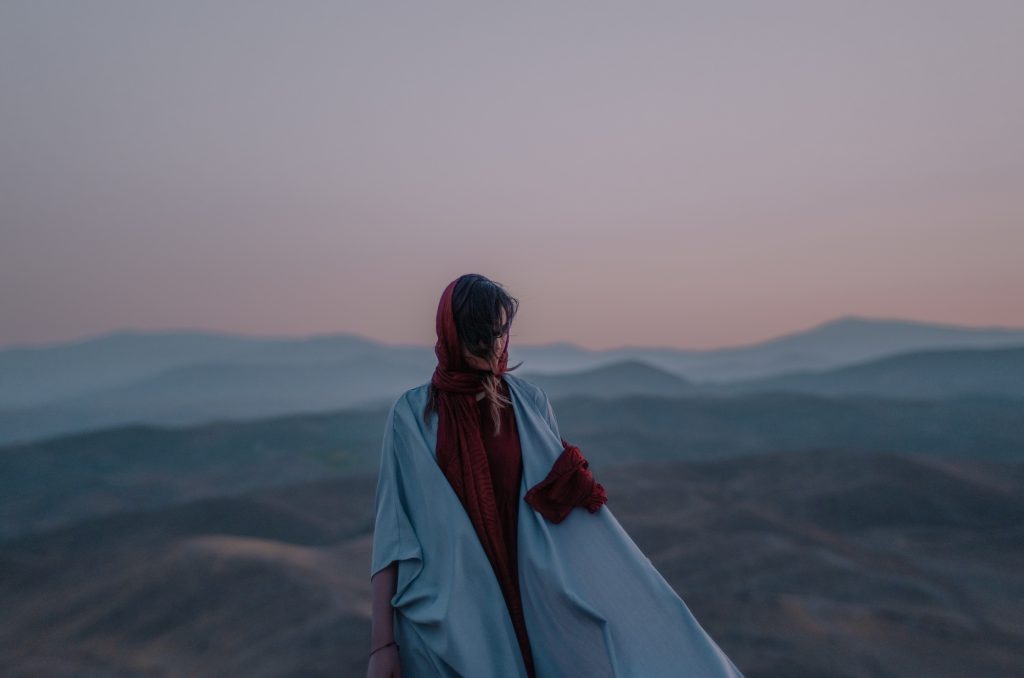
If you’re planning to visit Iran, it’s good to know that they have a dress code that you need to follow. As a woman, you should wear loose clothing that covers your body and a headscarf. But don’t worry, you don’t need to wear a burka or anything too concealing. You can still show off your personal style and wear clothes that make you feel confident and comfortable. Just keep in mind the local customs and you’ll be all set!
Even though there is a strict dress code in Iran, you’ll quickly see that it’s not as stereotypical as you might think. Iranian women are very fashionable and take pride in their appearance. Fashion is a way for them to express themselves and make a statement, and you’ll notice them wearing beautifully designed headscarves and stylish clothing that still comply with the Iranian dress code .
It’s also worth noting that the dress code applies to both men and women. Men are required to wear long-sleeved shirts and pants that cover their legs.
While it’s true that there is a “morality police” in Iran, whose job is to enforce the dress code and other moral codes of conduct in public, it’s important to note that they are not actively targeting foreign visitors. So, as a traveler to Iran, you don’t need to worry too much about being chased down by the morality police.
In general, if you show respect for local customs and adhere to the dress code regulations, you can have a secure and enjoyable travel experience in Iran. Therefore, don’t allow concerns about the morality police or any misunderstandings preventing you from exploring all the amazing things that this country has to offer.
Packing Tip for Travel to Iran
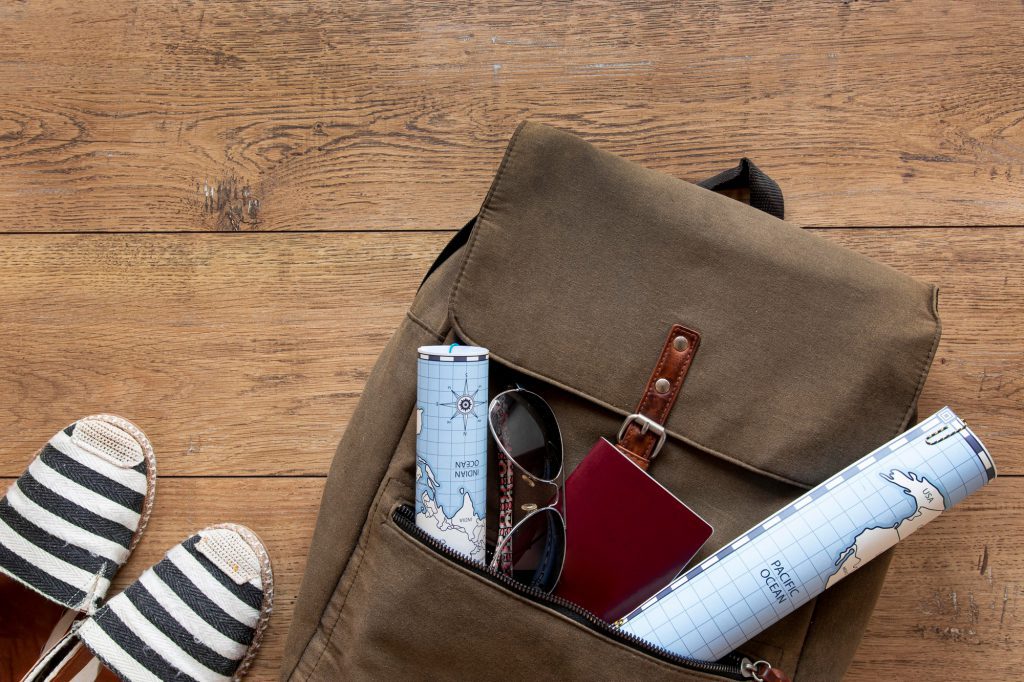
Packing for a trip to Iran can be a bit daunting, especially with the strict dress code regulations. However, with a little bit of preparation and the right mindset, you can embrace the local customs and still express your personal style.
The most immediate essential item to pack for Iran is a headscarf, also known as a ‘Roosari’ in Farsi. But don’t worry if it falls off – just put it back on again. While wearing a headscarf is mandatory, it’s common for Iranian women to wear it a little loose and halfway back on their head, with a high bun or ponytail to keep it in place. And if you’re worried about showing a little bit of hair, don’t be – it’s granted.
When it comes to tops, loose-fitting ones with three-quarter-length sleeves are ideal, especially in the heat. The general rule of thumb is that your body should be covered, and your arms should not be bare. As for trousers, they should be baggy, but tight, brightly colored leggings worn with a long, loose-fitting top are also acceptable, as long as your legs are covered down to the ankles.
The myth that you need to dress in dark colors or black tunics is just that – a myth. Embrace fashion the way the locals do, and bring some color into your Iran packing list! Open-toed sandals are OK, especially on hot days, and sports shoes are fashionable in Iran, especially in bright colors, so pack some for longer day trips.
If you’re worried about not having enough appropriate attire, fear not. As soon as you arrive in Tehran or Shiraz, hit the bazaars and local markets for plenty of options. And if you’re traveling with children, it’s worth noting that young boys can wear shorts and t-shirts, and girls under ten are not required to wear a headscarf.
For men, dressing in Iran is more straightforward, much like in Western countries, except for no short shorts, super short sleeves, or extremely tight-fitting clothing.
Overall, remember to approach the dress code with an open mind and respect for local customs. And don’t be afraid to express your personal style while still adhering to the guidelines. With the right attitude and a well-stocked suitcase, you can have a comfortable and enjoyable trip to Iran.
Is Iran Safe to Travel?
Even though some Western media might paint a different picture, Iran is a safe and friendly place for travelers. You might worry about safety because of politics and cultural differences, but the truth is that Iran is a great place to visit.
The people in Iran are super welcoming. You’ll meet lots of friendly locals who are excited to have you in their country. Whether you’re exploring busy markets or historical sites, Iran offers a one-of-a-kind travel experience.
Like anywhere else, it’s essential to be cautious and aware of your surroundings when you travel. But honestly, the chances of running into safety problems in Iran are pretty low. Many travelers say they feel safer here than in other popular tourist spots.
So, if you’re thinking about visiting Iran, don’t let safety worries stop you. With the right mindset and some preparation, you can have a safe and unforgettable trip to this fascinating country.
Iranians are known for their hospitality. They often go out of their way to help visitors, whether it’s giving directions, suggesting a great local restaurant, or offering you a ride. They might even share their contact info, just in case you need assistance. This shows how much they want you to feel welcome and at ease during your stay.
It’s also worth mentioning that Iranians want to break away from the negative image sometimes shown in the media. They’re proud of their culture and want you to see the beauty of their country and the warmth of their people.
As a visitor to Iran, you have a special chance to bridge cultural gaps and show Iranians that the world outside isn’t as unfriendly as they might think. By approaching your trip with an open mind and a desire to learn, you can make meaningful connections and get a deeper understanding of Iranian culture.
In the end, the hospitality and friendliness of the Iranian people are some of the best parts of traveling to this amazing country. So, don’t hesitate to engage with the locals and fully enjoy the rich cultural traditions that make Iran such a unique and captivating destination.
Is Iran Safe to Travel RIGHT NOW?
When thinking about visiting Iran, like any other place you might want to go, it’s a good idea to keep an eye on the news about politics and how your own country is getting along with Iran. But don’t worry too much because Iran is actually one of the safest countries in the Middle East for travelers.
Now and then, people in Iran might have protests about politics or money issues, but these usually stay in one place and don’t put tourists in danger. Just be smart and avoid those protest areas, like you would anywhere else.
Remember, Iran follows Islamic rules pretty strictly. So, things like drinking alcohol, doing drugs, or having romantic relationships with locals can get you in big trouble – like being kicked out of the country, getting arrested, or worse. But if you respect their way of doing things and follow the rules, you’ll have a great and safe time in Iran.
Overall, as long as you keep an eye on what’s happening and are careful, there’s no need to be super worried about going to Iran. If you go with the right attitude and prepare well, you’ll have a fantastic trip to this remarkable country.
Is Iran Safe to Visit 2024? A Comprehensive Overview
Essential Things to Remember When Visiting Iran
When you plan to visit Iran, it’s really important to be respectful and well-informed. Iran is a Muslim country where they take their rules seriously, especially Islamic law. So, it’s not a good idea to act like a clueless tourist and think you won’t get in trouble.
You see, what might be okay back home could get you into real trouble here. Iran has strict laws and customs, and it’s super important to follow them.
But here’s the good news. If you respect the local ways and follow the rules, you can have a safe and enjoyable trip to Iran. So, don’t let the strict rules scare you away. Come with an open mind and a desire to learn about the unique and fascinating culture of Iran. You’ll have a great time!
Is Iran an Arab Country?
There is a common misconception that Iran is an Arab country, fueled by its location in the Middle East, Muslim religion, and some similarities in culture and language. However, it’s important to note that Iran is not an Arab country, and Iranians are not Arabs.
Iranians speak Persian, also known as Farsi, which is not the same as Arabic. While there are many languages spoken within Iran, including Kurdish, Turkish, and Khuzi Arabic, the primary language is Persian. This is due to the many different ethnic groups that exist within the country, each with its own unique language and cultural traditions.
It’s crucial to acknowledge that misinterpreting Iranians as Arabs can lead to misunderstandings and hurt feelings. Although Iran has certain similarities with Middle Eastern Arab nations, it possesses a unique culture and history that distinguishes it.
In essence, when traveling to Iran, it’s vital to maintain an open-minded attitude and a genuine desire to explore the country’s distinctive cultural traditions and history. By recognizing the differences between Iran and its neighboring Arab nations, you can develop a greater appreciation for the richness and diversity of the entire region.
The Iranian currency system can be a bit confusing for those unfamiliar with it. Iran uses two units of currency, the Rial (IRR) and the Toman.
The Rial is the official currency of Iran. It has been the official currency since 1932, and the symbol for the Rial is “﷼”.
The Toman is not an official currency but is widely used in everyday transactions in Iran. The Toman is equal to 10 Rials. This practice of using the Toman as a unit of currency dates back to the early 20th century when the value of the Rial significantly decreased due to inflation.
To convert Rials to Tomans, you remove one zero from the Rial amount. For example, 1,000 Rials is equivalent to 100 Tomans. In practice, prices are often quoted in Tomans rather than Rials. For instance, if an item costs 10,000 Rials, it would be referred to as 1,000 Tomans. This pricing convention is used in everyday life, in markets, shops, and sometimes even on price tags.
The official currency notes in Iran are denominated in Rials, not Tomans. When you’re working with important papers, like contracts or international deals, you’ll often use the Rial as the currency.
The currency notes come in various denominations, including 1,000,000 Rials, 500,000 Rials, 100,000 Rials, 50,000 Rials , and so on.
Although the official currency is the Rial, the Toman is more commonly used and understood by Iranians in their daily lives. For example, if someone says a product costs 500,000, they most likely mean 500,000 Tomans, which is equal to 5,000,000 Rials.
Iran Travel Costs 2024: The Best Detailed Guide for Tourists
Currency Exchange in Iran
To get the best exchange rates , it’s recommended to take US Dollars or Euros with you and exchange them at reputable exchange offices. Let’s figure out more about exchanging money in Iran:
There are a few ways to exchange your money into Rials, and some are safer than others:
- One option is to go to the currency exchange at the airport. It’s a secure choice, but the exchange rate there might not be as good as what you’d find in the market.
- Another way is to exchange your money at the hotel or exchange offices in some hotels. Their rates are similar to what you’d get at the airport.
- If you’re in Tehran, you can also sell your foreign currency on Ferdowsi Street or at exchange offices in the city. These places have a wider range of rates, and they’re usually better than the airport rates.
The only catch is that you might not be headed to Ferdowsi Street on your trip. If you plan to visit the Tehran market, you can ask your guide (if you have one) to take you to Ferdowsi Street for currency exchange.
Just remember, it’s not a good idea to deal with people on the street who are buying and selling currency. Stick to the official exchange places for your safety.
Credit and Debit Cards during Iran Travel

If you’re planning a trip to Iran, it’s essential to understand the financial landscape and the options available for making transactions. Unfortunately, using credit or debit cards from outside of Iran is not possible due to the lack of an international card network.
This means that the best option is to bring enough cash with you to convert to an Iranian Rial. However, there is now a new option available for tourists and temporary visitors like the Mah Card and Irani Card .
The Mah Card is a prepaid debit card that can be used in Iran. Like most travel cards, you can instantly add funds to your card in your preferred or home currency, and it will be converted to Iranian Rial. The advantage of using the Mah Card is that it’s more convenient than carrying cash, protects you from unauthorized purchases, and is accepted country-wide.
So, if you’re looking for a safe and easy way to make transactions during your trip to Iran, consider getting a Mah Card. With this handy tool in your pocket, you can enjoy your travels without worrying about carrying large amounts of cash or the inconvenience of finding exchange offices.
Of course, there are other solutions, such as gift cards that are issued through banks, and to use this unofficial solution, you should ask your tour operator for help.
Public Transport in Iran
Exploring Iran’s cities is an adventure in itself, and luckily, there are plenty of public transport options available to help you get around!
Best Inner-City Transport Options
Metro (subway).
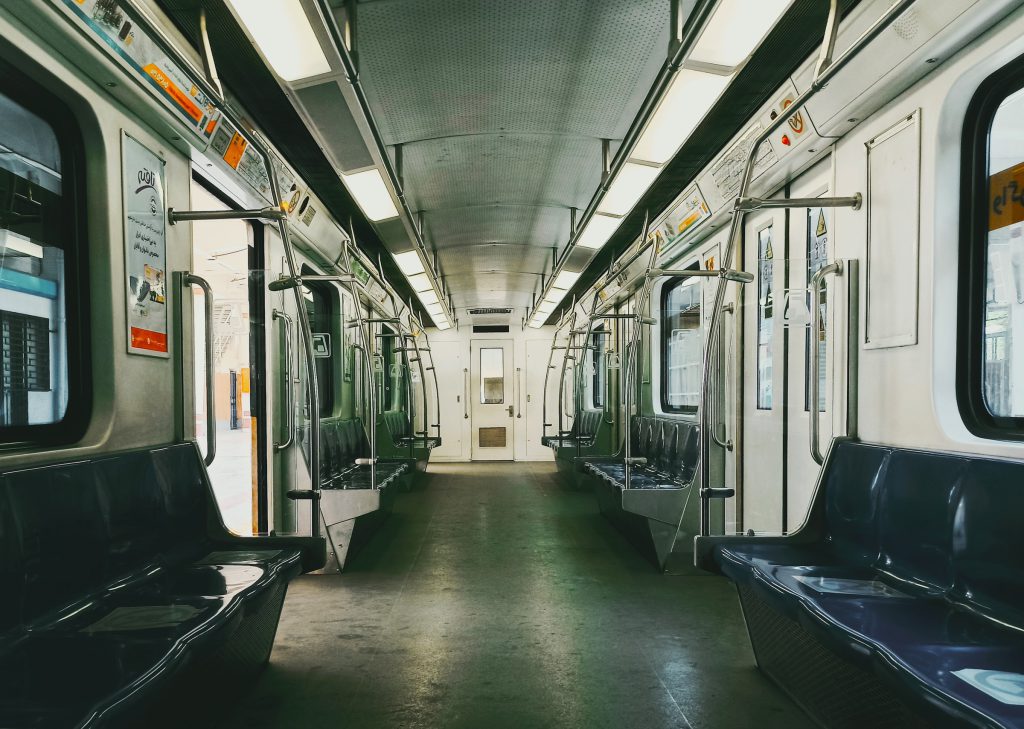
The Iranian Metro is a modern and efficient way to explore the city, especially in Tehran, Shiraz, Tabriz, Mashhad, and Isfahan. It’s the ideal option to get around Tehran, and the stations are easily accessible by taxi or bus.
The ticket price for one trip is about 3000 Tomans, which is equal to approximately 0.1$ in 2023, I know, it’s so cheap. Additionally, you can purchase a card to pay for the metro trips and even the buses in Tehran. Rush hours are typically from 7-9 a.m. and 5-7 p.m.
The metro guidance can be easily found in each station, but if you want to be prepared for your metro journey, check out the Tehran Metro website or other cities’ maps.
Buses are another popular option for inner-city transport in Iran. They are widely available and offer an affordable way to get around the city. Bus fares vary depending on the distance you are traveling, but they are generally inexpensive.
There are two main types of buses in big cities: Regular and BRT. You can pay for the buses using your Metro card, and fares typically range from 3000 to 10,000 Tomans (10 to 25 cents) per trip. You can easily locate all the bus and BRT stations on Google Maps.
In comparison to subways, buses are somehow time-consuming because of traffic jams. So, if your destination is near a subway station, our suggestion is to take the subway instead of the bus.
Another way to get around in the city is by taxi. There are different types of taxis available, including shuttle/shared taxis (Khatti in Farsi), private taxis (Darbast in Farsi), and non-registered taxis (Shakhsi in Farsi). Shuttle/shared taxis are a cheaper option, but they are for fixed destinations, and you may have to wait for the taxi to fill up. Private taxis are readily available, but you should negotiate the fare before getting in. Non-registered taxis are driven by people who are not licensed taxi drivers, and you need to negotiate the price with them too. It is advisable to get a shared Taxi or Private Taxi and not a non-registered one for your safety.
Of course, platforms such as Snapp and Tapsi have been launched, which have a function similar to Uber. You can download their applications from Google Play or directly from their websites and register with your Iranian SIM card.
Finally, if you need a taxi in a hurry, you can call the numbers 133, 1828, and 1833 in major cities in Iran to request a taxi wherever you are. This service is called “Bisim Taxi” and is available 24/7.
10 Essential Apps for Traveling to Iran: Empowering Your Exploration!
Intra-City Transport Options
Buses are a common and affordable way to travel between cities in Iran. There are two types of buses available: regular and VIP buses. VIP buses offer more legroom and comfortable seating, with space to almost lie down.
You can purchase bus tickets from the hotel front desk, local travel agencies, platforms such as SnappTrip, or directly from the bus terminal. Prices vary depending on the type of bus and the distance you are traveling. For instance, a VIP ticket from Tehran to Shiraz costs around 200,000 Tomans ($15).
There are three bus terminals in Tehran: Jonoub Terminal (South), Sharq Terminal (East), and Qarb or Bayhaghi Terminal (West). From these terminals, you can easily buy and board a bus and start your trip to other cities in Iran.
The train network in Iran is relatively extensive and offers a comfortable and scenic way to travel between cities. The trains are well-maintained and offer a range of seating options, from economy to first-class; But their speed and being on time cannot be compared with the European rail transport system.
Trains are the best and safest option for intercity travel in Iran. There are different types of trains available, including 4-bed, 6-bed, and bus trains. You can also choose between express and regular trains.
Book train tickets through online apps, local travel agencies, hotels, or directly at the train station. Prices vary depending on the distance and the type of train. For example, a ticket from Tehran to Yazd costs between 150,000 and 300,000 Tomans ($5 to $10).
Private Car
If you prefer a more flexible and personalized way to travel, you can also consider renting a private car with a driver. This option is more expensive than buses or trains, but it offers the freedom to explore at your own pace.
The Maxim platform has also provided the possibility of renting a car with a driver at a very reasonable price all over Iran. You can download its application from Google Play and register with your Iranian SIM card.
Domestic Flight
Finally, if you’re short on time or traveling long distances, you can opt for a domestic flight. The major cities in Iran are well-connected by domestic airlines, making it easy to get around the country quickly and efficiently.
Online platforms for selling Air tickets, such as Alibaba, provide the online purchase of domestic and international flight tickets.
By understanding the different transport options available in Iran, you can choose the one that suits your needs and budget and explore the country with ease.
Separated Men’s and Women’s Carriages in Iran’s Public Transport
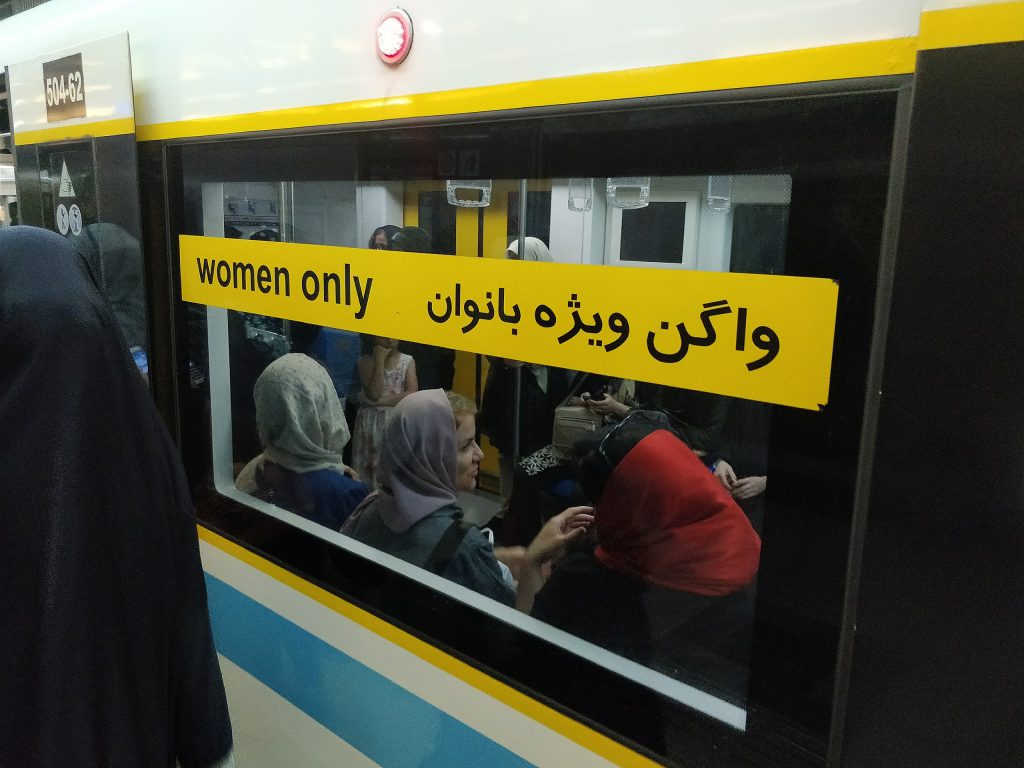
It’s important to note that there are some separate men’s and women’s carriages on public transport in Iran, both on the metro and buses for those women who prefer to use them. While subway cars are generally mixed-gender, women who want more privacy can choose to ride in the first and last wagon on both sides. On buses, there may be designated seating areas for men and women, with women sitting in the back and men in the front, or vice versa. However, couples can sit together in the men’s section but not in the women’s section. Respecting these gender-segregated arrangements while using public transport in Iran is essential.
Pre-register with the Foreign Office of Your Country
Before embarking on your journey to Iran, it’s important to research the specific travel regulations, rules, and warnings for your home country. Each country has its own guidelines, and it’s critical to be aware of them before setting off on your adventure.
To ensure your safety and peace of mind, it’s also a good idea to pre-register or alert your foreign office about your travel plans. This step is particularly important for British citizens , as there is no embassy representation in Iran. By registering with your foreign office, you can stay informed about any updates or changes in travel regulations or warnings.
It is important to note that certain travel insurance providers may ask you to inform the appropriate authorities about your travel plans before you can obtain coverage. To ensure that you are fully protected, it is essential to identify which authorities you need to inform before you leave.
By taking these steps before your trip, you can travel to Iran with confidence, knowing that you have done your due diligence to ensure your safety and security.
Internet Access during Iran Travel
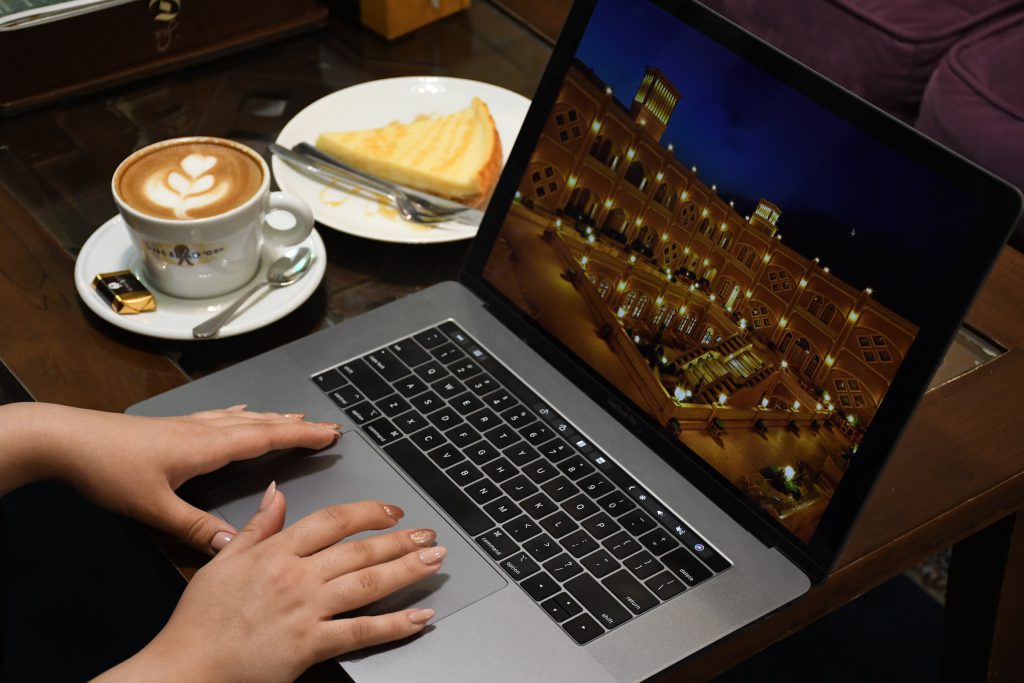
When traveling to Iran, it’s important to anticipate limited internet access and mandatory “digital filtering.” The Internet connection in Iran is known for being frustratingly slow, and many popular social media platforms such as Instagram, YouTube, and WhatsApp are blocked. Additionally, you need to pay fees for a good connection.
Make sure that you inform your family members or friends that you may be out of touch and to prepare for unreliable internet.
Recommended SIM Cards to Use in Iran
When it comes to buying a SIM card in Iran, Irancell is the top phone operator and offers temporary SIM cards specifically designed for tourists. These SIM cards come pre-loaded with a credit balance and 4G internet access, allowing you to stay connected with ease. They are sold at Tehran Imam Khomeini International Airport and are valid for 30 days.
Irancell’s temporary tourist SIM cards provide affordable and convenient connectivity throughout Iran.
You can buy regular Irancell SIM cards from their service centers located in almost every city. However, it’s important to note that you need to purchase charge and internet packages before using them. To do so, you can get assistance from Irancell staff at the centers, use the MTN Irancell application, or dial USSD codes.
Which VPN to use in Iran?
Staying connected while traveling in Iran can present unique challenges, particularly when it comes to accessing the internet and using your preferred VPN. To ensure that you can stay connected and protect your online privacy, it’s essential to find the right VPN for your needs.
There are several VPN options available for both Android and IOS users. For Android users, Hi VPN, Psiphon, v2ray, and Hotspot Shield are recommended, each offering reliable and secure connections. For IOS users, popular VPN options include Psiphon, Free VPN, and VPNProxyMaster, all of which are well-suited to use in Iran.
To have a suitable and safe VPN, you can ask your tour operator or tour guide for help. If you have any questions or help do not hesitate to ask To Iran Tour support team.
Persian Food
Iran is well-known for its varied and flavorful cuisine. If you’re a foodie who loves trying new things, you should definitely give Persian cuisine a try! Some must-try dishes include stews, Dizi (a lamb-based dish with broth and solids separated), Ash, and Haleem. To ensure you have the best experience, it’s important to do some research and find the top restaurants that serve these dishes so you can truly savor the flavors of Iran.
Persian Breakfast Guide: Irresistible Traditions!
Iranian food for vegetarians
In Iranian cuisine, meat is a staple ingredient, but there are also numerous vegetarian dishes that are just as delectable. Mirza-Ghasemi or Kashk-e Badenjan, both made with eggplant, are excellent choices. If you’re on a tight budget, go for Falafel, which is both inexpensive and delicious. However, it’s crucial to convey your dietary requirements to the restaurant staff and be ready to request that meat be omitted from your meal if needed.
By being open to trying new dishes, you can experience the rich and diverse cuisine of Iran with a little extra effort and creativity.
Drinking in Iran
When it comes to drinking in Iran, it’s important to note that alcohol is strictly prohibited, and there are no bars or clubs serving alcoholic beverages. Instead, you’ll find a variety of non-alcoholic beer options available, typically in fruity flavors such as peach, lemon, strawberry, etc.
Alcohol in Iran: A Complete Guide for Tourists
It’s important to understand that there are no exceptions when it comes to alcohol consumption in Iran, whether you’re a local or a traveler. While it’s tempting to take up offers from locals to find the “real deal” at underground gatherings, it’s not worth the risk. The punishment for alcohol possession or consumption can be severe, and there are no allowances made for tourists or visitors.
Did you know that Buttermilk, or “Doogh” as it’s called in Iran, is a delicious fermented dairy drink? It has a slightly sour taste and is often paired with dried herbs like mint for a refreshing flavor. It is very common to enjoy Doogh besides any kind of kebab.
Iranian Etiquette
When visiting Iran, it’s important to be aware of and respectful of the cultural and religious customs that may differ from your own. By following these customs, you can demonstrate your appreciation for Iranian culture and enjoy your trip to the fullest. Here are some etiquette guidelines and fascinating insights into Iranian culture to keep in mind:
- One of the primary forms of social etiquette is “ Taarof” , where Iranians may insist on offering things to people, even if they don’t mean it. As a visitor, it is important to be aware of local customs and not immediately accept an offer.
- During the Muharram month , which is the mourning month of Imam Hossein, to show respect for religious beliefs, it’s best to avoid wearing bright colors, especially red.
- During Ramadan, eating or drinking in public is disrespectful while most people are fasting during the day.
- Shaking hands between men and women can be a delicate matter, and it is generally unacceptable for unrelated men and women to engage in this gesture. As a female tourist, it is advisable to wait and observe if men initiate the handshake first, instead of initiating it yourself.
- The thumbs-up hand signal is OKAY in Iran, but it is better not to use it in the presence of older people. However, younger people understand its meaning.
- In Iran, there are certain limitations when it comes to public displays of affection. While affectionate gestures like touching, kissing and handshakes between family members are acceptable, French kissing is considered inappropriate. Holding hands is generally tolerated, but hugging might be regarded as crossing the line. It’s important to note that inside holy places and religious cities, any public display of affection may not be tolerated at all.
For a truly enriching travel experience, it’s important to embrace and appreciate the customs and culture of Iran. By respecting their traditions, you’ll gain a deeper understanding and connection to the country and its people.
Time in Iran and the Solar Calendar
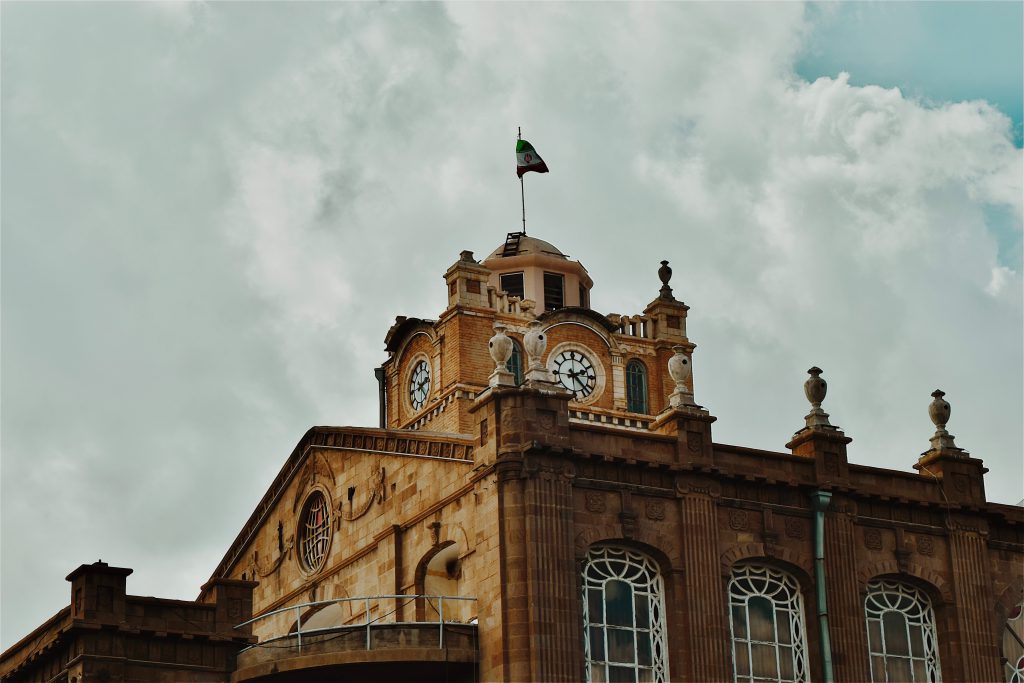
The country operates on Iran Standard Time (IRST), which is UTC+3:30.
The Solar Hijri Calendar
The solar calendar used in Iran is known as the Iranian calendar or the Persian calendar . It is a type of solar calendar that is based on the astronomical observations of the Sun’s movement. The calendar has its roots in ancient Persia and has undergone several modifications throughout history to align it with various astronomical and cultural considerations.
Here are some key differences between the Iranian calendar and the commonly used Gregorian calendar:
- Starting point: The Iranian calendar starts from the year of the Prophet Muhammad’s migration from Mecca to Medina, known as the Hijra. This event occurred in 622 CE in the Gregorian calendar. Therefore, the Iranian year is approximately 621 years behind the Gregorian year.
- Length of the year: The Iranian calendar is a solar calendar that consists of 12 months, each with varying lengths. The total length of a year in the Iranian calendar is approximately 365 or 366 days, depending on whether it is a leap year or not. Leap years occur every four years and consist of an additional day, just like in the Gregorian calendar.
- Naming of the months: The Iranian calendar has its own set of month names, which are deeply rooted in Persian culture and history. The names of the months are as follows: Farvardin, Ordibehesht, Khordad, Tir, Mordad, Shahrivar, Mehr, Aban, Azar, Dey, Bahman, and Esfand.
- Different New Year: The Iranian New Year , known as Nowruz, is celebrated on the vernal equinox, which usually falls on March 20th or 21st in the Gregorian calendar. Nowruz marks the beginning of spring and is one of the most significant holidays in Iran and several other countries in the region.
- Different era: The Iranian calendar uses the Islamic lunar Hijri era, which began with the Hijra mentioned earlier. In contrast, the Gregorian calendar uses the widely accepted Common Era (CE) system.
Time is a curious thing. It flows differently for each culture and place, shaped by history, geography, and tradition.
While visiting Iran, it’s best to keep an open mind when it comes to timeframes. It’s a good idea to bring along some extra patience and be ready to go with the flow. This is especially true when it comes to food, service, and payment. By embracing the relaxed pace of life in Iran, you can fully immerse yourself in the local culture and enjoy a more laid-back travel experience.
Read more on Iran’s History and Iran Travel
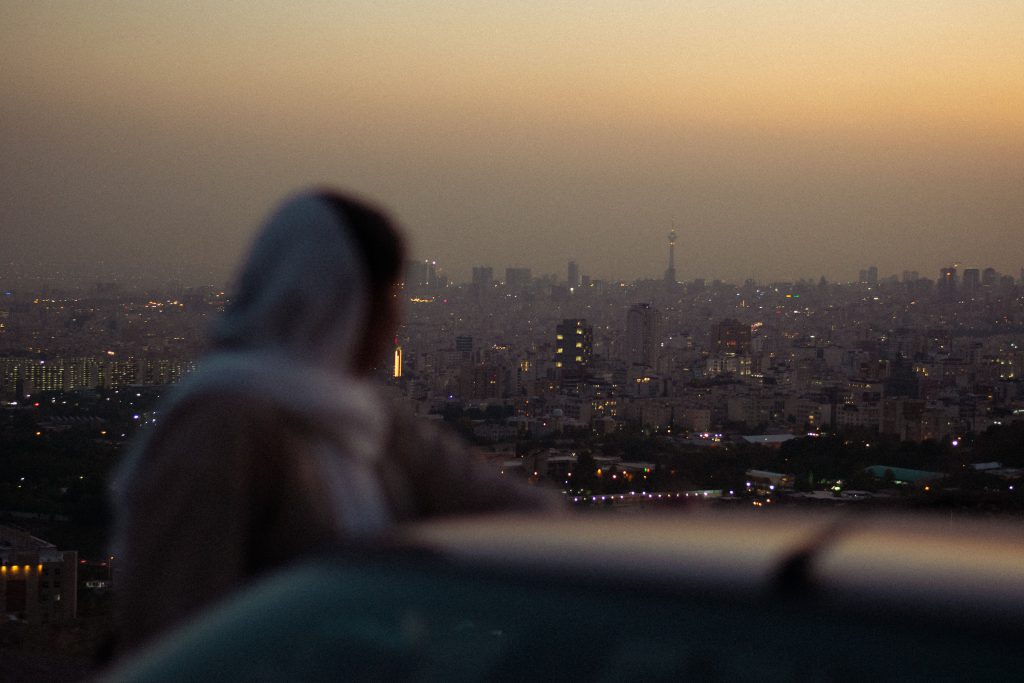
Iran boasts a complex and fascinating history, which can be difficult to comprehend without prior knowledge. Even though tour guides can be informative, it’s recommended to do some research on the history of Persia and the events leading up to the Iranian Revolution in 1979 before embarking on a trip to Iran. This will enable you to gain a better understanding of the country’s composition and value its abundant cultural heritage.
Book Recommendation
Here are some excellent books to read before your trip:
- “Revolutionary Iran: A History of the Islamic Republic” by Michael Axworthy provides a comprehensive overview of recent Iranian history.
- “Iran: What Everyone Needs to Know” is also by Axworthy and delves into Iran’s economy, politics, culture, and people.
- “Daughter of Persia: A Woman’s Journey from Her Father’s Harem Through the Islamic Revolution” is a fascinating book. The story follows a woman born in Iran who went to study in the United States and later returned to the country amidst significant changes.
If you’re traveling in Iran, the Lonely Planet guidebook can be a valuable resource for exploring historical landmarks. While it’s not the only source of information, it’s a helpful tool to have with you since internet access in Iran may be limited.
To make the most of your trip to Iran, it’s a great idea to get to know its history and culture beforehand. Trust me, it will definitely enhance your travel experience!
FAQs about Visiting Iran
Q1: do i need a visa to visit iran.
A1: Yes, most travelers require a visa to enter Iran. You can obtain one through an Iranian embassy or consulate in your home country. There are some countries that can travel to Iran without a visa, and there are also some countries that can get their visa on arrival.
Q2: What is the best time to visit Iran?
A2: Spring (March to May) and autumn (September to November) are ideal times to visit, as the weather is mild, and many attractions are at their best. But Iran has varied weather across different regions. For instance, the ideal season to tour Iranian deserts is winter.
Q3: Is it safe to travel to Iran?
A3: Iran is generally safe for tourists, with low crime rates. However, it’s essential to stay informed about the current political situation and follow local guidelines.
Q4: What is the official currency in Iran?
A4: The official currency is the Iranian Rial (IRR), but you’ll commonly see prices quoted in Toman, which is equivalent to 10 Rials.
Q5: Can I use my credit card in Iran?
A5: No, international credit and debit cards are not widely accepted in Iran. Bring cash in US dollars or Euros and exchange it locally.
Q6: Is it safe for solo female travelers in Iran?
A6: Yes, Iran is considered safe for solo female travelers, but it’s important to dress modestly and be aware of local customs and norms.
Q7: Can I drink alcohol in Iran?
No, alcohol is strictly prohibited in Iran due to Islamic law. You won’t find it in public places.
Q8: What languages are spoken in Iran?
Persian (Farsi) is the official language, but many Iranians also speak English, especially in tourist areas.
Q9: Can I use social media in Iran?
Most social media platforms like Facebook and Twitter are blocked in Iran. However, you can access them using a VPN.
Q10: What is Iran famous for?
Iran is famous for its rich cultural heritage, historical sites, and stunning architecture. It’s renowned for attractions like the ancient city of Persepolis, the vibrant bazaars of Isfahan and Tabriz, and the beautiful mosques, such as the Pink Mosque in Shiraz. Iran is also known for its contributions to literature, poetry, and art, with famous poets like Rumi and Hafez hailing from this region. Additionally, Iran is celebrated for its world-class Persian rugs, saffron production, and traditional handicrafts.
Discover the Beauty of Iran with ToIranTour Services
Leave a reply cancel reply.
Your email address will not be published. Required fields are marked *
Save my name, email, and website in this browser for the next time I comment.
Free Iran Travel Consultation
Let us know whatever you need for your trip, and we assist in arranging everything needed
Recent Posts
- Persian Tea: The Delight of Flavor and Tradition
- Yazd Water Reservoirs: A Marvel in the Desert
- Tower of Silence Yazd: From Rituals to Remembrance
- Jameh Mosque Yazd: Stepping into the Past
- Alexander Prison: From Dungeon Myths to National Heritage
Discover the most outstanding articles on all topics of life. Write your stories and share them
- Iran Visa Policy
- Apply for Iran visa
- Active Style
- Inside Style
- Discovery Style
- In-Depth Style
- Knowledge Based Style
- Daily Tours
- Why “To Iran Tour”?
- Partnership with To Iran Tour
Find Your Account
- (+98) 910 300 48 75

- Your cart is empty
- TripAdvisor
Travel To Iran Like a Local
Filter price, hotel theme, tour categories.
Iran Visa 2024 – Get your visa and travel to Iran – Apply Now
Free Personalized Itinerary
A tailor-made day by day plan based on your interests and budget
Explore Iran on Budget
Visit Best of Iran in 10 Days for 495€ only
Responsible travel, empowering locals

Iran experts

Licensed agency

Sustainable travel
Iran tour packages.
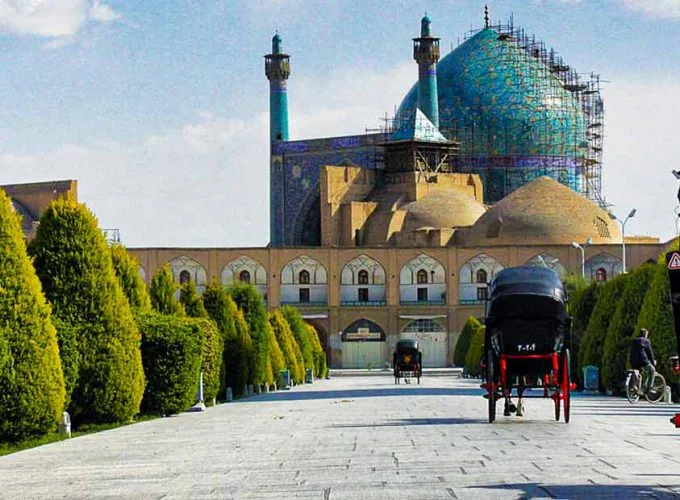
7 Days Classic Tour – History & Culture
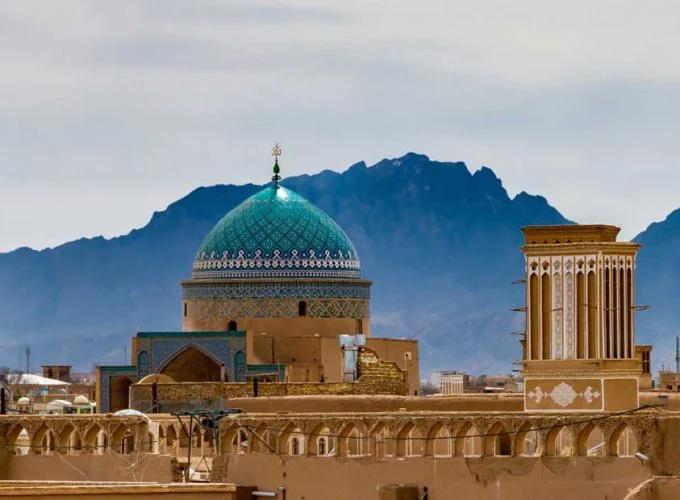
8 Days Culture Tour – Ancient Civilizations
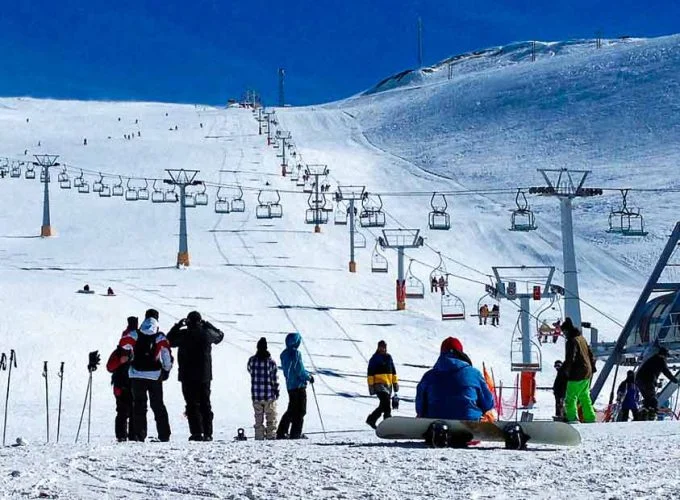
8 Days Adventure Tour – Snow, Sun & Sand
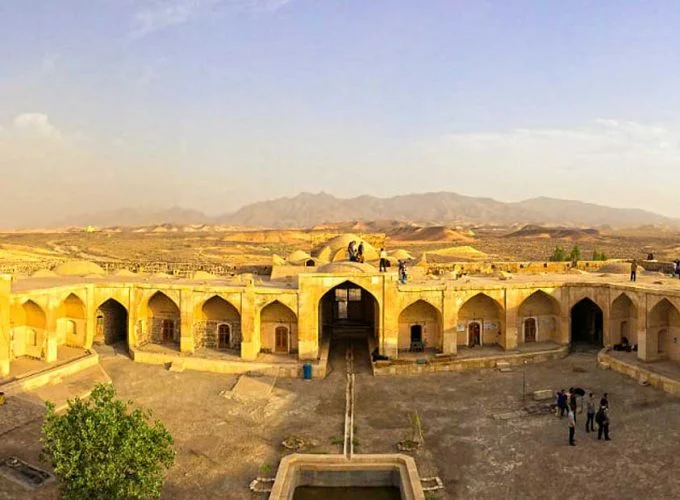
8 Days Culture Tour – Caravansary & Bazaar
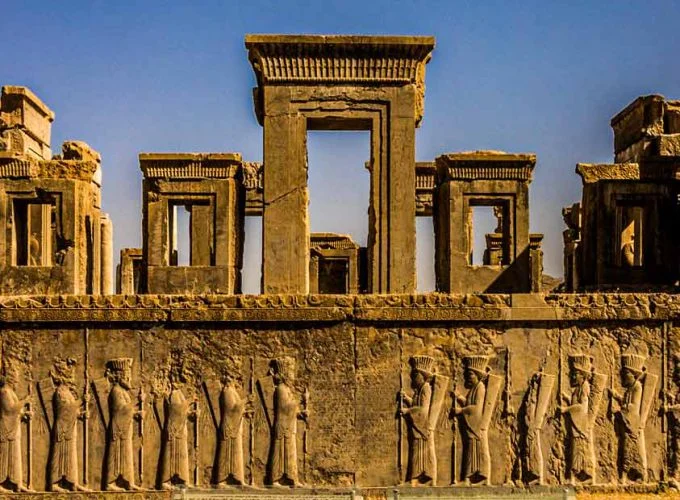
10 Days Classic Tour – History & Culture
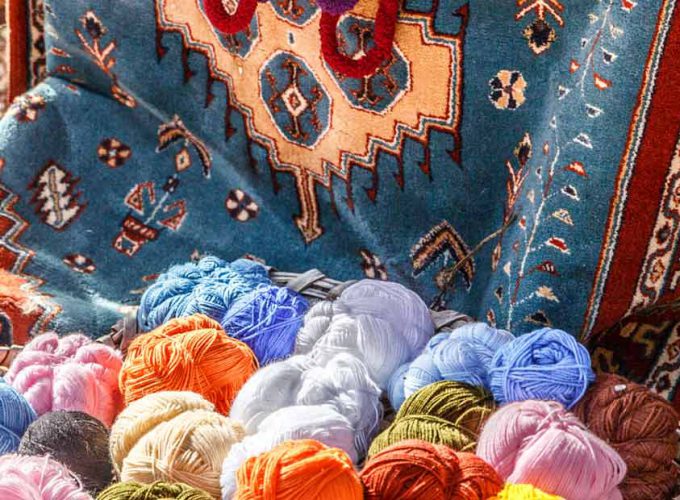
10 Days Art Tour – Handicrafts & Culture
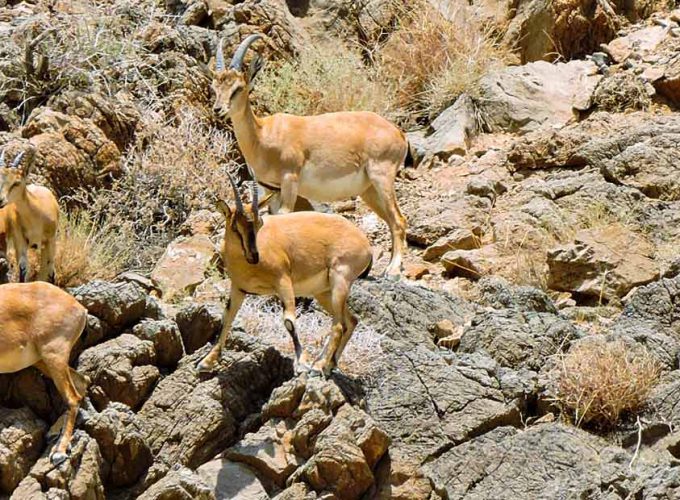
10 Days Wildlife Tour – Nature & Hiking
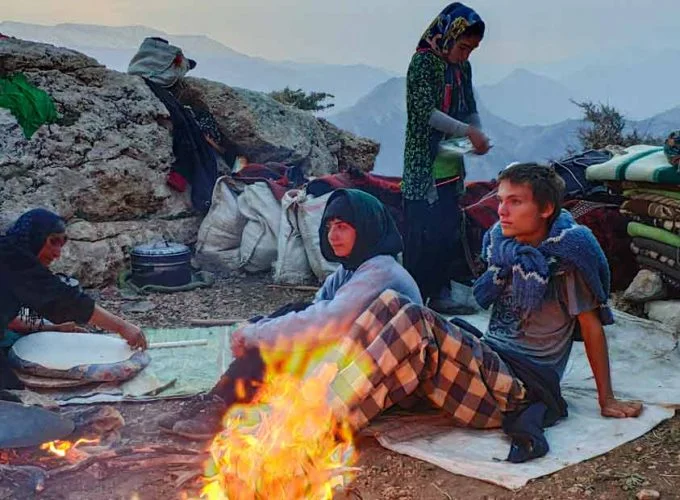
10 Days Nomad Tour – Tradition & Modernity
Why book with us, quick responses, free itinerary, flexible payment, top iran tours.
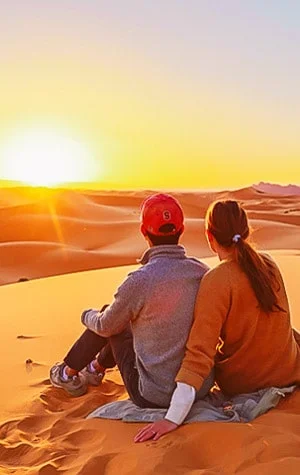
Pasargad, Shiraz, Fars Province, Iran
Persepolis & Necropolis Tour
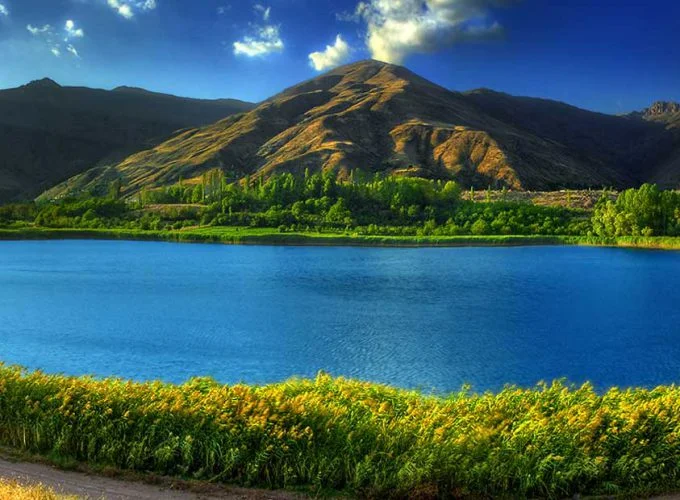
Alamut Valley and Assassins Castle Tour
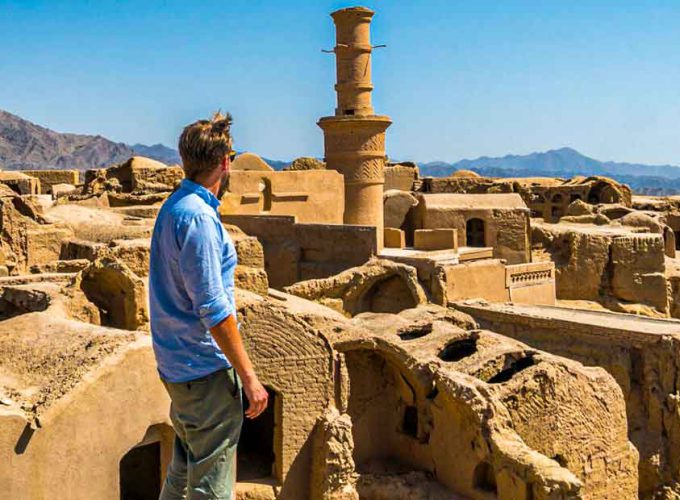
Yazd Province, Chak Chak Road, Iran
Meybod-Chak Chak-Kharanaq Village Tour
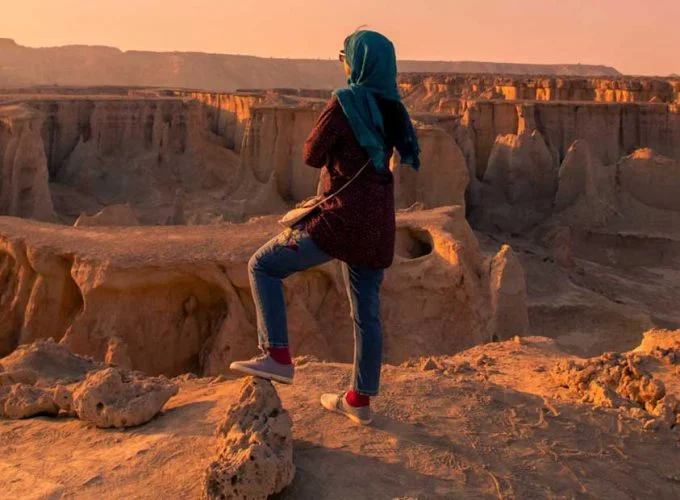
Qeshm, Hormozgan Province, Iran
Qeshm Island Tour
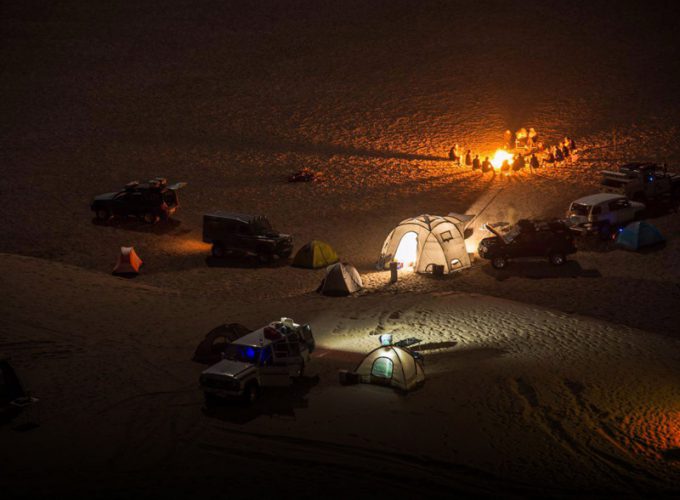
Varzaneh Desert, Isfahan, Iran
Camping at Varzaneh Desert
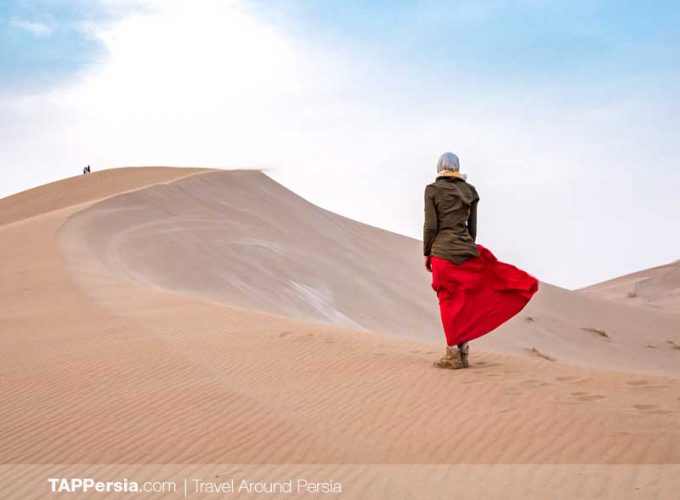
Varzaneh Desert, Iran
Varzaneh Desert & Guesthouse
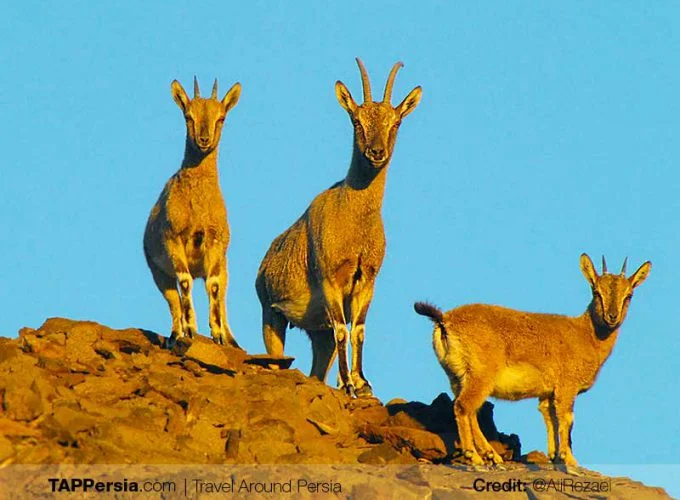
Rig-e Jenn Desert & Abbas Abad Wildlife Refuge
Wildlife & Desert Tour in Central Iran
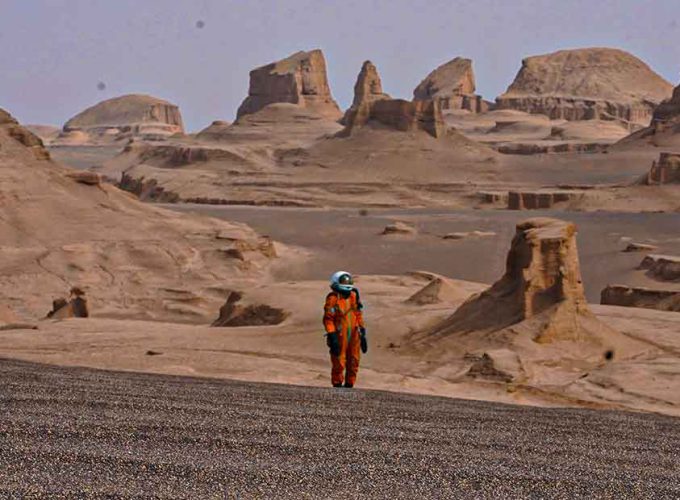
Shahdad Kalouts, Shahdad, Kerman Province, Iran
2 Days – Kalouts Desert
Your safety is our main priority.
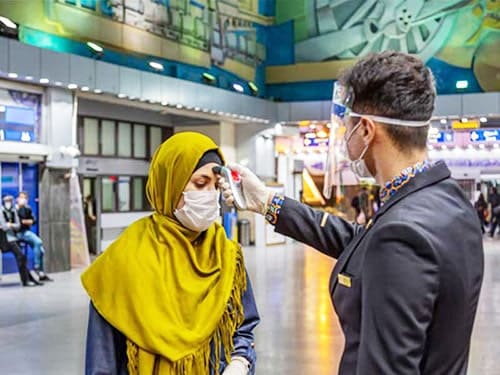
Health guidelines
We actively test our suppliers to ensure compliance with our COVID-19 Health & Safety Guidelines.
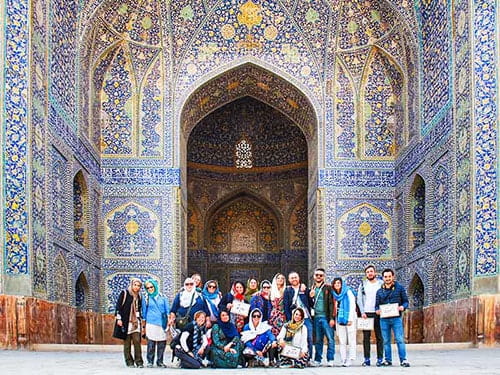
Local leaders
Our leaders across all of Iran are standing by to ensure your safety and wellbeing is the number one priority during travel to Iran.

24/7 Live Assistance
Late-night phone calls, last-minute changes, and unexpected events; we’re with you every step of the way.
Local Experiences
City Experience
from Isfahan
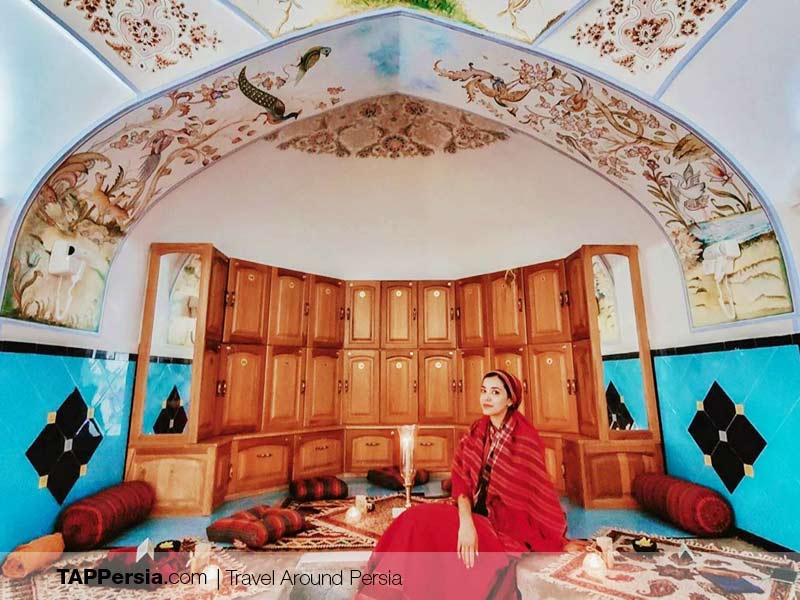
Traditional Bath in Isfahan
With qazi bath.
invite your friends
Cooking Class

Isfahan Cooking Class
With mehrnoush.
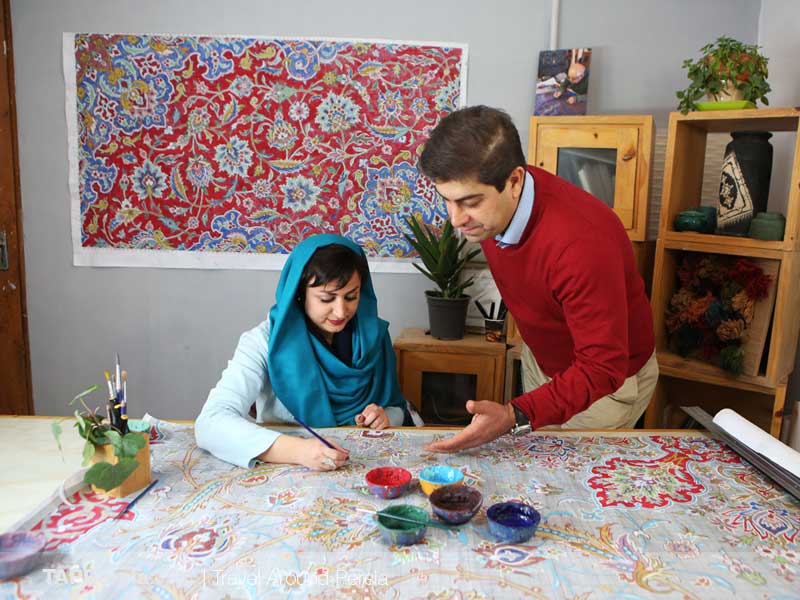
Make Persian Carpets
With rasool.
from Shiraz

Shiraz Dinner Party with Locals
With mojtaba.
View Tripadvisor
EXCELLENT Based on 947 reviews
Latest Articles

A Comprehensive Guide to Avoiding Common Mistakes When Applying for an Iran Visa
Iran beckons many with its ancient allure, but navigating the …
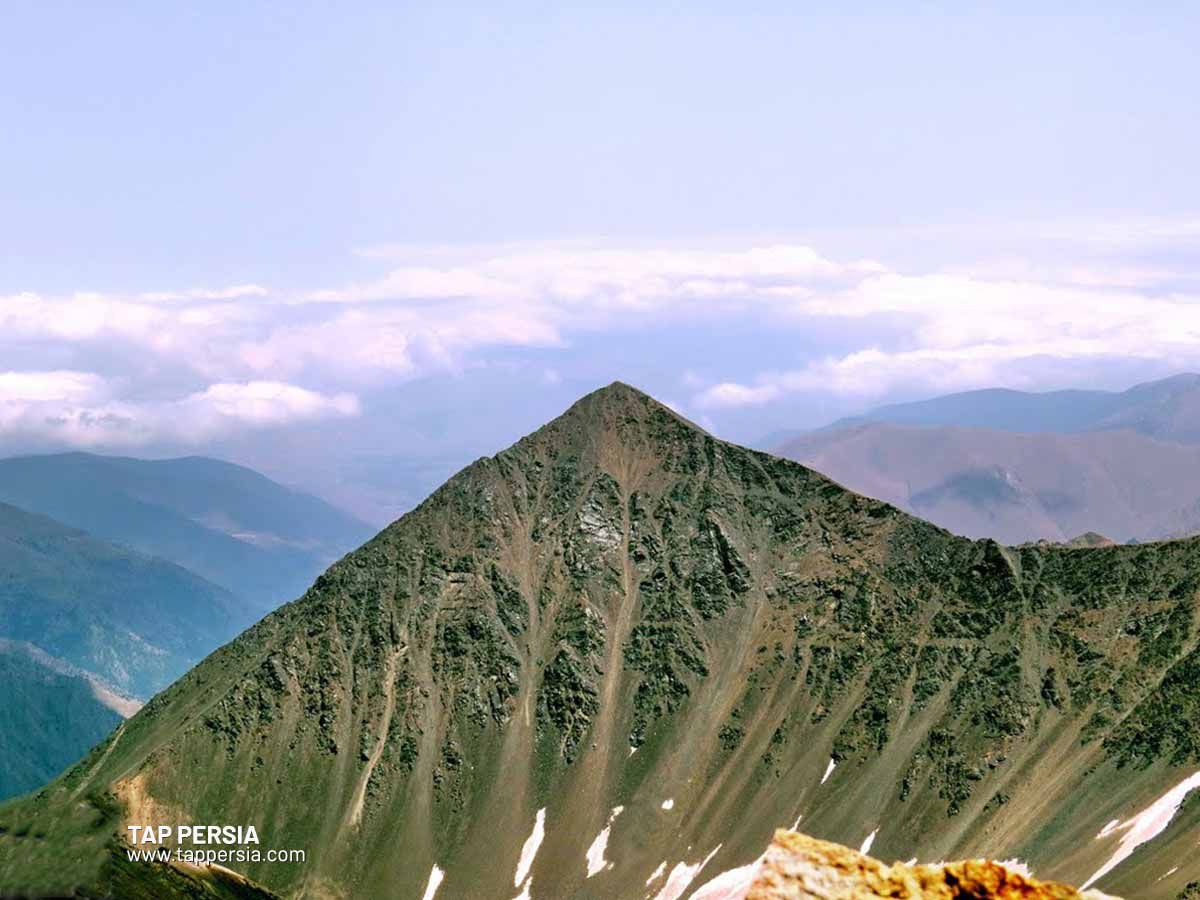
Tehran Mountains
Tehran Province is one of Iran’s mountainous regions when compared …
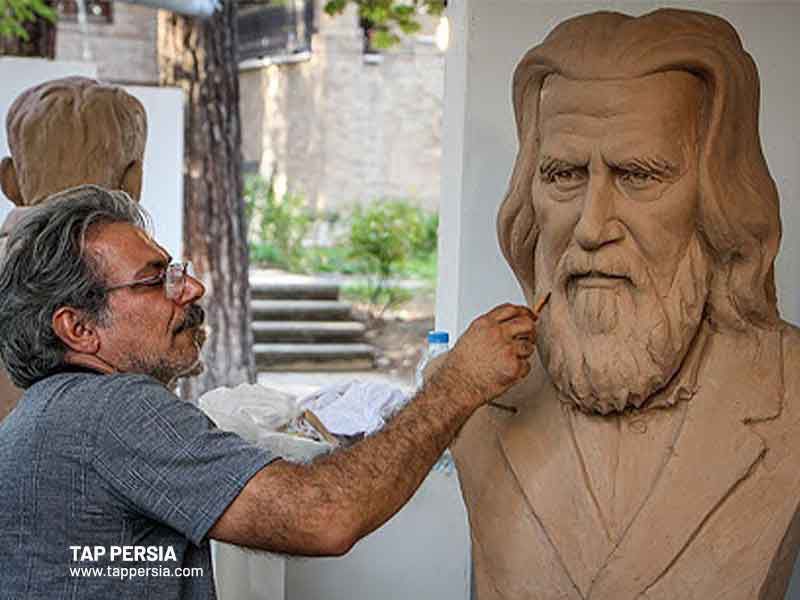
A History of Persian Art and Architecture
Persian art, often known as Iranian art, is a broad …

Enter the e-mail address associated with the account. We'll e-mail a link to reset your password.
[avangpress_form id="67964"]

" * " indicates required fields
(+98) 935 -122 0038
Ultimate iran travel guide [2024].
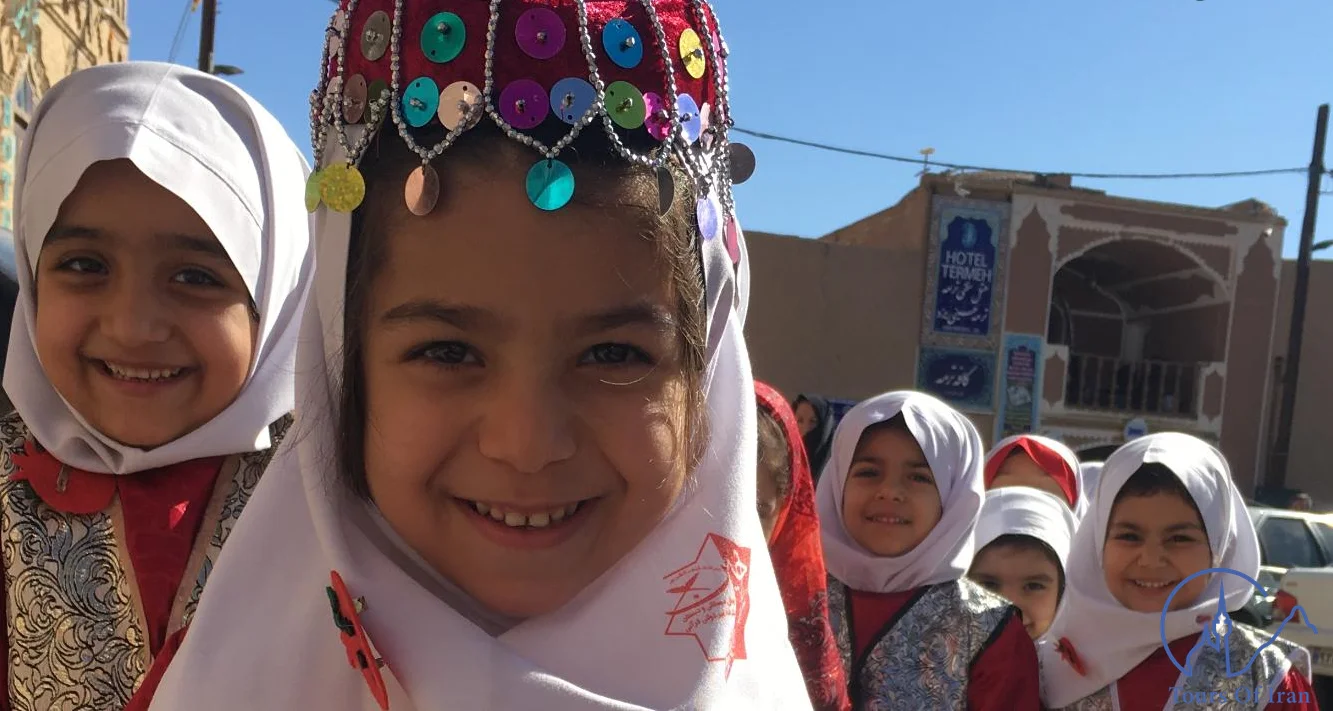
Table of Contents
Welcome to the ultimate Iran travel guide!
You will find all the information and insights you need to plan a memorable trip to this mesmerizing country in this comprehensive article. From the ancient ruins of Persepolis to the bustling bazaars of Tehran, Iran offers many experiences for travelers seeking history, adventure, and cultural immersion.
Iran a country steeped in history and culture, is located in Western Asia. With deserts, mountains, and lush green valleys, it boasts a diverse landscape. The country’s warm hospitality, rich traditions, and architectural wonders make it a top destination for intrepid travelers.
Let’s just dive in the Iran travel guide:
Plan A Perfect Trip To Iran
Planning is critical to a successful trip to Iran. Here are some essential steps to help you plan a perfect trip to Iran:
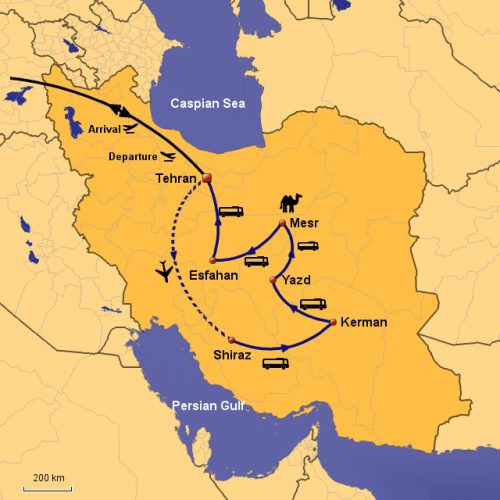
Get a thorough understanding of Iran
Taking the time to research Iran’s history, culture, customs, and places of interest is the first step in the Iran Travel guide. Make sure you are familiar with local traditions and netiquette to ensure a respectful and enjoyable experience.
Iran has been a crossroads of cultures and civilizations for thousands of years. From the ancient Persian Empire to the Islamic Golden Age, Iran’s past has left an indelible mark on its present. Discover the fascinating stories of Persian kings and poets at UNESCO World Heritage Sites such as Persepolis.
Documents Required for Travel to Iran
Make sure your passport is valid for at least six months after your intended departure date. The type of visa you need will depend on your nationality and the purpose of your visit.
Iranian visa requirements can be complex, so it’s important to check with your country’s Iranian consulate or embassy for the latest information. You can also simply submit your Iran Visa Application Form and Tours of Iran will handle the rest.
In Iran, tourist visas are usually valid for 30 days and can be extended. Visit Visa Information for more information on Iran visas.
Best Time to Visit Iran
Throughout the year, Iran experiences a variety of weather conditions.
Spring (March to May) and autumn (September to November) are considered the most ideal times to visit when the weather is pleasant and mild.
Iran’s landscapes come alive with colorful flowers in spring, making it an ideal time for outdoor activities and sightseeing. However, autumn is a great time to explore historical sites and hike in the mountains because of its cooler temperatures.
Plan a flexible itinerary
Make an itinerary that covers your preferred destinations while allowing for unexpected discoveries. You can find well-known sites as well as hidden gems off the beaten track in Iran.
Iran’s must-visit destinations
Isfahan is a city that will amaze you with its stunning architecture. Explore the majestic Imam Mosque and the enchanting alleys of the historic bazaar and marvel at the intricate designs of Naqsh-e Jahan Square.
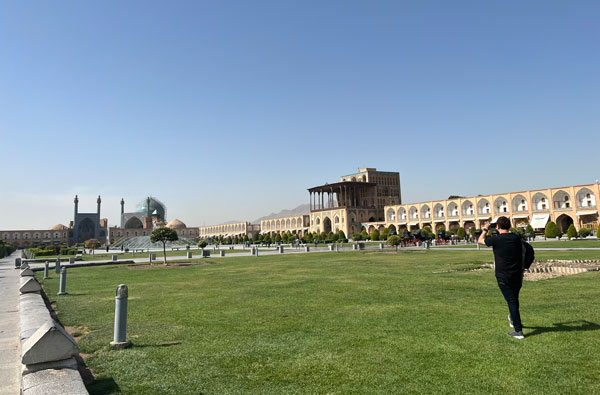
Persepolis: Step back in time at Persepolis, an archaeological marvel that was once the ceremonial capital of the Achaemenid Empire. Admire the colossal columns, intricate reliefs, and ancient tombs that narrate the glorious past of Persia.
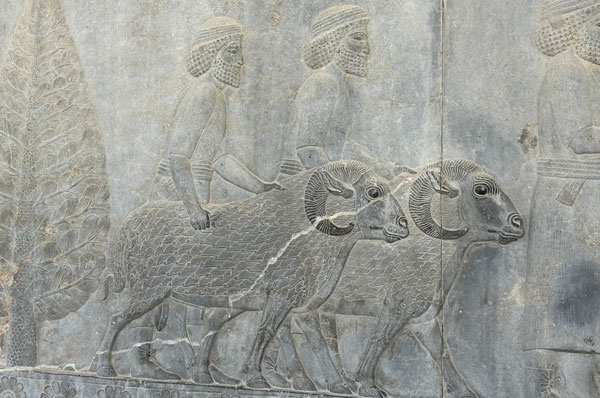
Shiraz: Shiraz, the city of poets and flowers, beckons with its poetic charm. Visit the tomb of Hafez, the renowned Persian poet, stroll through the tranquil Eram Garden, and explore the mesmerizing Nasir al-Mulk Mosque.
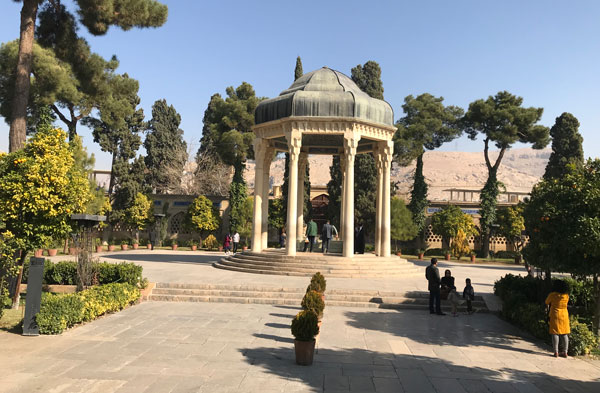
Tehran: Discover the dynamic capital city of Iran, Tehran , where modern skyscrapers stand alongside historical palaces. Visit the Golestan Palace, delve into Iran’s rich history at the National Museum, and enjoy panoramic views from the Milad Tower .
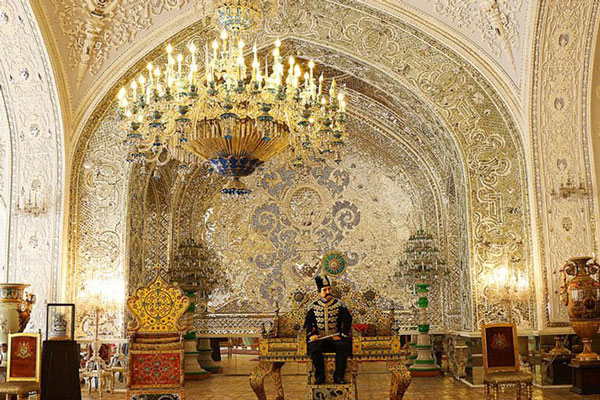
Yazd: Yazd has a unique architectural heritage, boasting traditional windcatchers that cool the buildings during scorching summers. In Yazd Explore the Jame Mosque and immerse yourself in the ancient Zoroastrian culture.
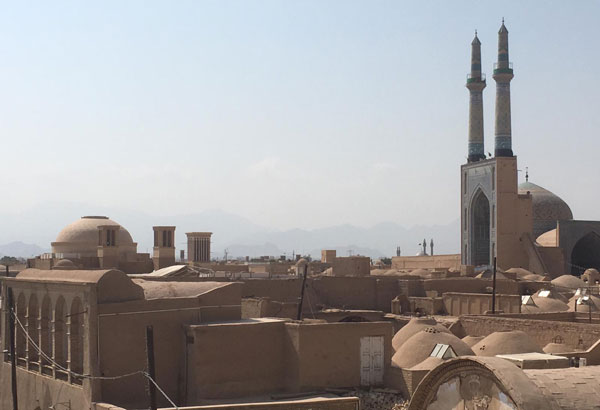
The Ancient City of Bam: Explore the ancient city of Bam, known for its impressive mud-brick citadel that dates back over 2,000 years. Although partially destroyed by an earthquake, Bam Citadel is still a testament to Iran’s rich history.
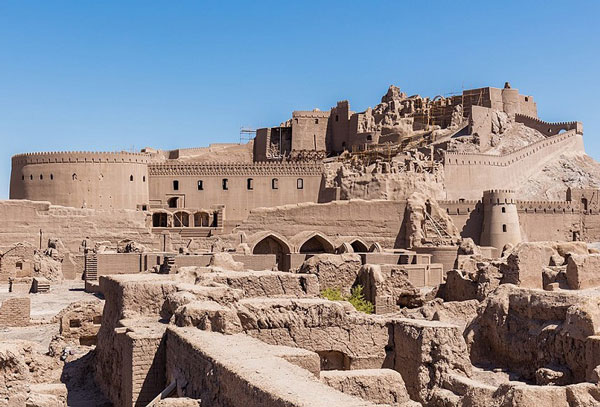
The Caspian Sea: Escape to the picturesque coast, where lush green forests meet sandy beaches. Relax in the resort towns of Ramsar and Chalus, or embark on a scenic journey through the dense forests of the Alborz Mountains.
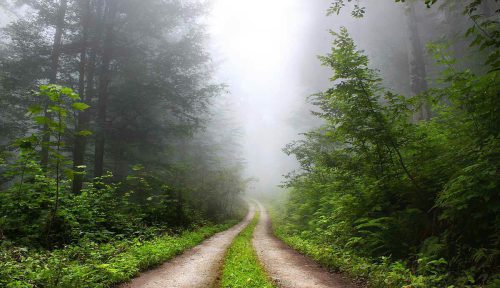
Tabriz: Tabriz , a historic Silk Road city, is renowned for its UNESCO-listed bazaar, the largest covered market in the world. Admire the stunning Blue Mosque and explore the Tabriz Historic Bazaar Complex, a UNESCO World Heritage site.
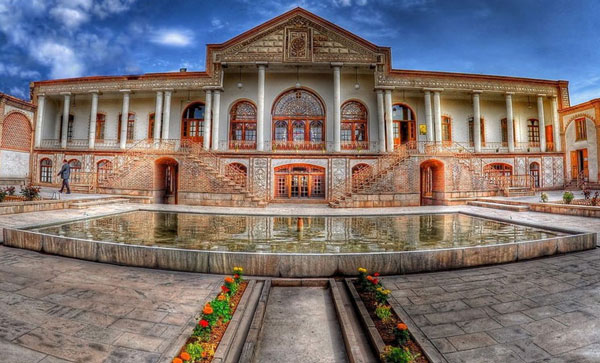
Chabahar: A port city with untouched beaches and offshore islands. Enjoy activities like scuba diving, snorkeling, and dolphin watching, and witness the unique landscapes of the Martian Mountains.
Must-See Historical Sites in Iran
Iran’s rich history has left behind a treasure trove of historical sites and architectural wonders. Here are some must-see places to explore:
Persepolis – Ancient Ruins Frozen in Time
Persepolis , also known as Takht-e Jamshid, is one of Iran’s most significant archaeological sites. Built during the Achaemenid Empire, it was the ceremonial capital and symbol of Persian power.
The sprawling complex of Persepolis features imposing stone platforms, magnificent gateways, and intricate bas-reliefs. The reliefs depict various scenes, including royal audiences, processions, and representations of tribute-bearing nations.
Visiting Persepolis is a journey back in time to the ancient world, where you can witness the grandeur and glory of the Persian Empire.
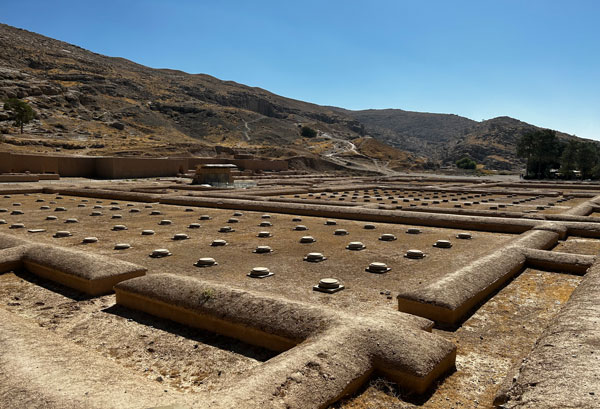
Naqsh-e Jahan Square – A Jewel of Islamic Architecture
Located in the heart of Isfahan, Naqsh-e Jahan Square , also known as Imam Square, is an iconic symbol of the city’s grandeur and history. Constructed during the Safavid era, the square is an impressive example of Islamic architecture and urban planning.
Surrounded by stunning buildings, including Imam Mosque, Sheikh Lotfollah Mosque, and Ali Qapu Palace, Naqsh-e Jahan Square is a UNESCO World Heritage site. Its vast open space once hosted royal ceremonies, polo games, and other grand events.
Visiting the square during different times of the day reveals the changing hues of the surrounding buildings, adding to the allure of this historical masterpiece.
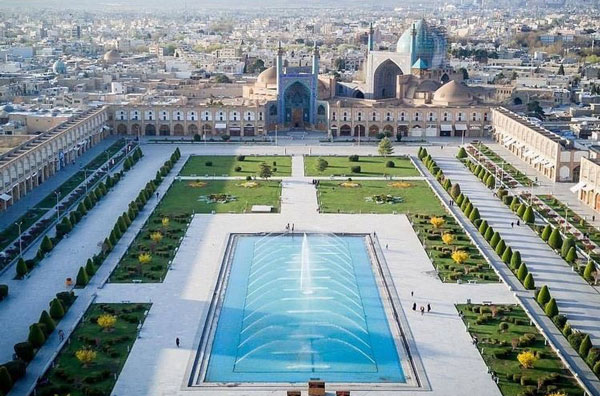
Golestan Palace – A Window to the Qajar Era
In the heart of Tehran, Golestan Palace is a masterpiece of Qajar-era architecture and design. The palace complex served as the seat of power for several rulers of the Qajar dynasty.
The palace’s opulent rooms, halls, and gardens showcase exquisite craftsmanship and intricate tile work. Visitors can explore the Marble Throne Hall, Mirror Hall, and the stunning Shams-ol-Emareh (Edifice of the Sun), offering panoramic views of Tehran.
Golestan Palace provides a glimpse into Iran’s royal past and the luxury of the Qajar dynasty.
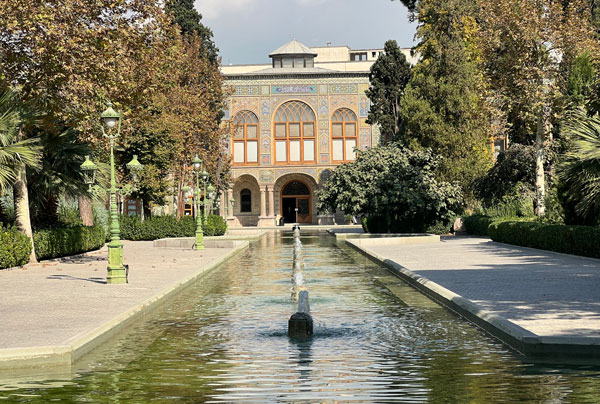
Pasargadae – The Tomb of Cyrus the Great
Pasargadae, located near Shiraz, is another UNESCO World Heritage site in Iran. It is home to the tomb of Cyrus the Great, the founder of the Achaemenid Empire and one of history’s most influential leaders.
The tomb’s simple design starkly contrasts Persepolis’s grandeur, reflecting Cyrus’s humility and humanity. The site also includes the ruins of Cyrus’s palace and a royal garden.
Visiting Pasargadae offers an opportunity to pay homage to one of the ancient world’s most respected leaders and learn about the roots of the Persian Empire.
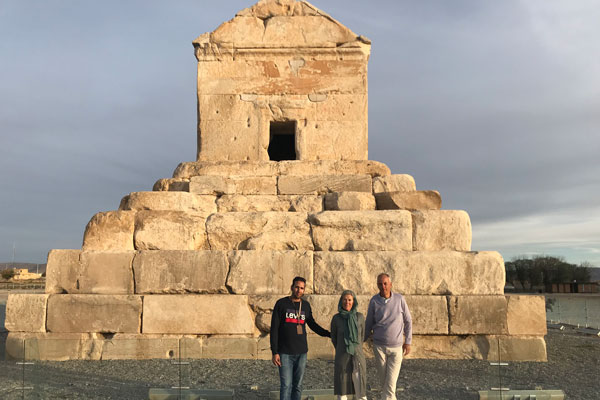
Bam Citadel – A Silent Witness of History
Located in southeast Iran, the Bam Citadel is an ancient mud-brick fortress that has stood for over 2,000 years. Once a bustling city along the Silk Road, Bam was tragically devastated by an earthquake in 2003.
Despite the destruction, the citadel still stands as a testament to the architectural genius of ancient Persia. Exploring the citadel’s ruins takes you on a journey through time, with remnants of ancient buildings and streets telling the stories of its vibrant past.

Historic Gardens of Iran
Iran is famous for its exquisite historic gardens, recognized as UNESCO World Heritage sites for their cultural significance and beauty. These gardens combine art, architecture, and nature, creating an oasis of tranquility within bustling cities.
Eram Garden – A Paradise in Shiraz
Eram Garden, located in Shiraz, is a magnificent Persian garden dating back to the 13th century. Its name, “Eram,” translates to “heaven” in Arabic, fitting for the garden’s ethereal beauty.
The garden’s design includes flowing water, cypress trees, and vibrant flowerbeds. At its center stands the Qavam House, a grand mansion that showcases traditional Persian architecture.
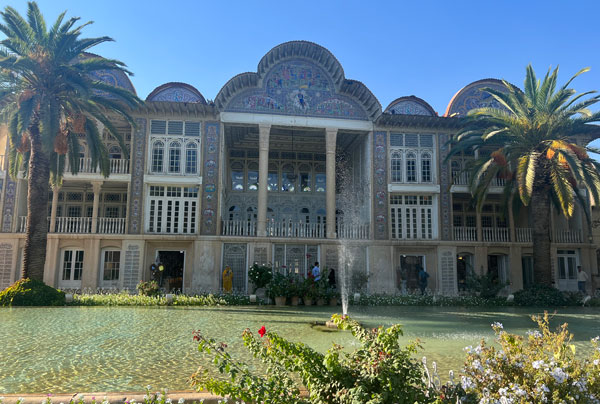
Fin Garden – A Timeless Sanctuary
Fin Garden, situated in Kashan, is a historical oasis that dates back to the Safavid era. Its design represents the harmony between architecture and nature, with a central pavilion overlooking a large reflecting pool.
The garden’s tranquil ambiance and refreshing water features make it a favorite among locals and visitors. Strolling through the garden, you’ll encounter hidden corners, colorful blossoms, and ancient cypress trees.
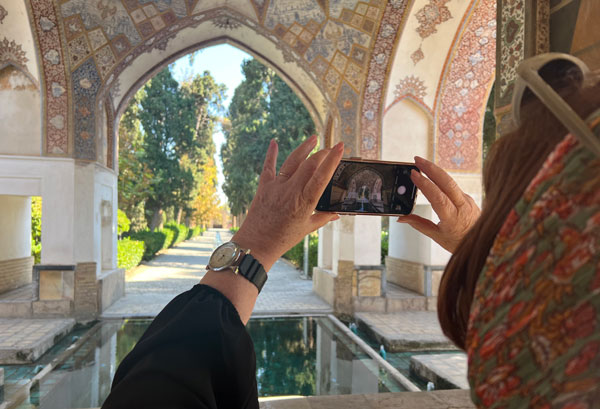
Shazdeh Garden – A Crown Jewel of Kerman
Shazdeh Garden is a stunning example of Persian garden design located in Kerman. Built during the Qajar era, it is a visual masterpiece featuring terraced gardens cascading down the mountainside.
The garden’s fountains, water channels, and lush greenery create a serene atmosphere, providing respite from the arid climate of Kerman. Shazdeh Garden’s symmetrical layout and charming pavilions make it a popular spot for leisurely walks and photography.
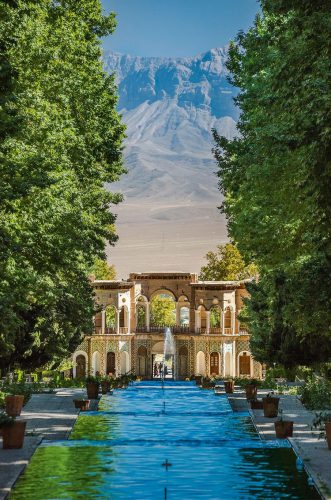
Prepare for the Cultural Experience
Embrace the unique cultural experience that Iran offers. Dress modestly, particularly in religious sites, and respect local customs and traditions.
Iranians are known for their warm hospitality and friendly nature. Don’t be surprised if strangers offer you tea or engage in friendly conversations. Accepting these gestures with a smile is a way of showing appreciation for their hospitality.
Iran Travel Guide: Cultural Experiences in Iran
Traveling to Iran is not just about exploring historical sites and natural wonders; it’s also an opportunity to immerse yourself in the country’s vibrant culture and traditions. Here are some cultural experiences that will enrich your journey:
Traditional Persian Cuisine – A Gastronomic Delight
Indulge in a culinary journey through Iran’s delectable dishes. Persian cuisine is known for its rich flavors, aromatic herbs and spices, and meticulous preparation.
Rice plays a central role in Iranian cuisine, and various rice dishes, such as Chelo Kebab, Zereshk Polo, and Baghali Polo, are staples on dining tables. Meat lovers will delight in the succulent kebabs, including Barg, Jujeh, and Koobideh.
When enjoying Iranian Dishes , Remember to try the famous Persian stews, such as Ghormeh Sabzi (a herb and meat stew) and Fesenjan (a walnut and pomegranate stew). These dishes embody the culinary heritage of Iran and reflect the country’s diverse regional flavors.
Tea Culture – A Symbol of Warmth and Hospitality
Iranian Hospitality is one of the strongest feelings that you experience in Iran. Iranians have a strong tea culture, and sharing tea with locals is a familiar ritual. Tea is more than just a beverage in Iran; it symbolizes hospitality and warmth.
The traditional way of serving tea is to pour it into small glasses from a samovar (a traditional teapot). Iranians often accompany tea with sweets or dates, creating a delightful balance of flavors.
Joining locals for tea is a fantastic way to engage in conversations and learn more about Iranian culture and daily life.

Persian Carpets – A Work of Art
Persian carpets, known as Persian rugs, are world-renowned for their intricate designs, vibrant colors, and exceptional craftsmanship. These handwoven masterpieces are a significant part of Iran’s cultural heritage and artistry.
Every Persian carpet tells a story, with each region boasting unique styles and patterns. Carpets are not just decorative elements in Iranian homes; they hold deep cultural and symbolic value.
Visiting a carpet workshop allows you to witness the skill and dedication of Iranian weavers as they create these exquisite works of art. Whether you purchase a carpet or appreciate the artistry, Persian carpets offer a glimpse into Iran’s rich cultural tapestry.
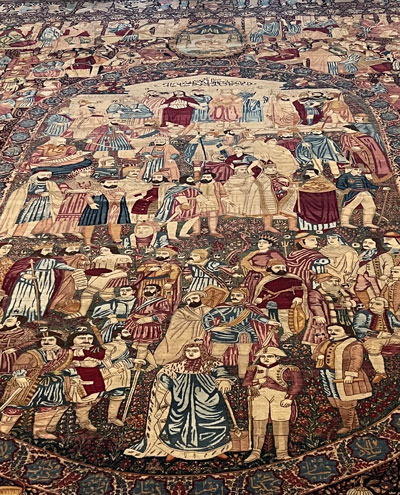
Nowruz – Celebrate the Persian New Year
If your visit aligns with the spring equinox, celebrate Nowruz, the Persian New Year. Nowruz marks spring’s first day, symbolizing rebirth, renewal, and the triumph of light over darkness.
Nowruz celebrations typically last for two weeks and include various customs and traditions. One of the most popular activities during Nowruz is setting up a Haft-Seen table adorned with seven symbolic items, each starting with the letter “S” in Persian.
During Nowruz, you’ll witness lively street festivities, special performances, and a joyous atmosphere throughout the country. Joining in on the Nowruz celebrations will immerse you in the spirit of new beginnings and unity.
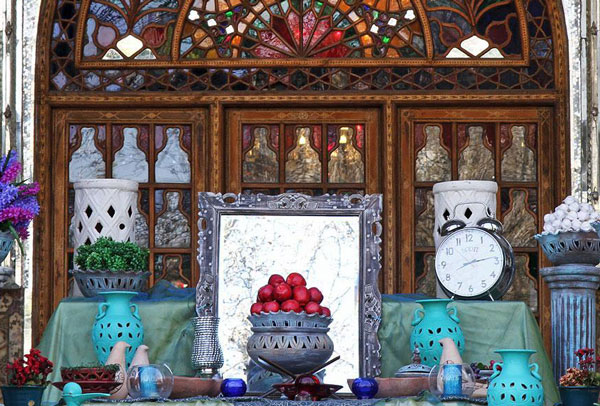
Ta’arof – The Art of Polite Gestures
In Iran, politeness and courtesy are highly valued, and one way this is expressed is through a cultural practice known as Ta’arof. Ta’arof involves polite gestures, expressions, and offers that can sometimes appear confusing to visitors.
For example, when Iranians offer something, such as food or tea, they may do so with the expectation that the offer will initially decline. This can lead to a back-and-forth exchange of polite refusals before accepting the offer.
Ta’arof is a way of showing respect and humility, and while it might be initially unfamiliar to visitors, embracing it adds to the cultural richness of your experience in Iran.
Iran Travel Guide: Safety Tips
Iran is generally safe for travelers, and a crime against tourists is rare. The Iranian people are known for their warmth and hospitality; visitors are often welcomed with open arms.
Still, like when you go anywhere, be careful and know what’s happening around you. Petty theft can occur in crowded places, so keep an eye on your belongings and avoid displaying expensive items.
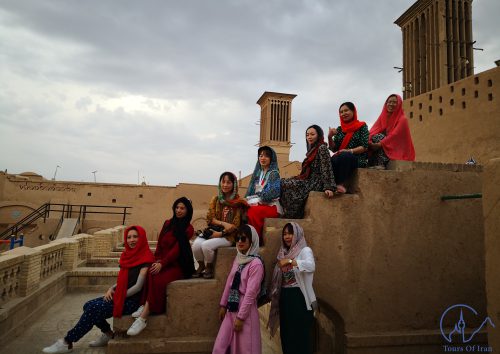
Iran Dress Code and Etiquette
Iranian people, especially women, prefer dressing modestly. Women should wear loose-fitting, non-transparent clothing that covers the arms and legs. It is also customary to wear a headscarf, or hijab, in public.
Men are required to adhere to a dress code of modesty in Iran, refraining from wearing shorts and sleeveless shirts by cultural norms. Traditional Iranian clothing, such as a chador or manteau, is optional for foreign visitors.
In addition to the dress code, respecting local customs and cultural norms is essential. Avoid public displays of affection, and always ask for permission before taking photos of people, especially on religious sites.
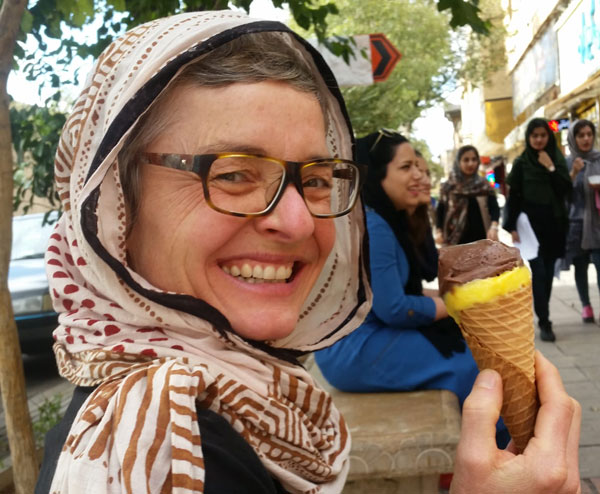
Money in Iran
Using international bank cards in ATMs in Iran can be challenging due to international sanctions and restrictions.
International debit and credit cards are not commonly accepted in Iran. This is because Iranian banks have limited or no connections with international banking networks, such as Visa or Mastercard.
The recognized monetary unit of Iran is the Iranian Rial (IRR). As an international traveler, you’ll likely deal with Toman, which equals 10 Rials. The exchange rate can fluctuate, so checking the current rate before your trip is advisable.
Cash is the preferred form of payment in Iran, as credit and debit cards are not widely accepted. ATMs are available in major cities, but you can not use international bank cards & it’s just for local bank cards. So it’s best to carry enough cash for your daily expenses.
To ensure you have access to funds while traveling in Iran, it’s advisable to carry sufficient cash in Iranian Rials or explore alternative options such as exchanging foreign currency at authorized exchange offices or using pre-loaded travel cards that are accepted in the country.
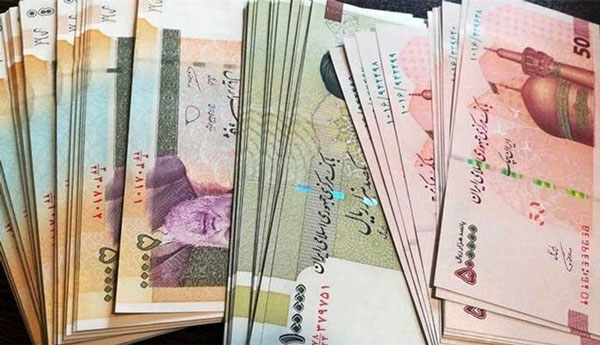
Read more about Iranian Currency .
Language Barrier
While Persian (Farsi) is the official language of Iran, many Iranians, especially in urban areas, can communicate in English, especially in hotels, restaurants, and tourist sites.
Learning a few basic Persian phrases, such as greetings and expressions of gratitude, will be appreciated by the locals and enhance your travel experience.
Iran Travel Guide: Final Words
This was the Iran Travel Guide [2023]. When Travel to Iran, it’s a destination that will capture your heart and ignite your sense of wonder. With its rich history, stunning landscapes, and warm hospitality, it promises an unforgettable travel experience. From exploring ancient ruins to savoring delicious cuisine and immersing yourself in Persian culture, every moment in Iran celebrates heritage and beauty. So, pack your bags, prepare for the adventure of a lifetime, and get ready to create memories that will last a lifetime.
How useful was this post?
Click on a star to rate it!
Average rating 0 / 5. Vote count: 0
No votes so far! Be the first to rate this post.
About the Author
Leave a Reply Cancel reply
Your email address will not be published. Required fields are marked *
Our EXPERTS

Mohammad Hesani

Sori Hasanzadeh
Recent posts.
- Palangan Village
- 7 benefits of private tours to Iran
- Yazd Travel Guide
- Travel to Iran From Brazil
- The Heritage of Nomads in Iran
Related posts

It’s time to travel to Iran from Europe

North of Iran

Iran Travel Risk Map 2024

BEST TOURS OF IRAN FOR MAKING A LIFELONG MEMORY

Iran Family Tour – Tours of IRAN
Traveling from japan to iran: a visa-free adventure.
We and third party companies with your consent use cookies on this website to measure the audience of our website, to provide enhanced functionality and personalization, to serve targeted advertisement, and to utilize social media features. We may share information about your use of this website with third party companies. See our “Cookie Policy” and “Cookie Settings” for more information. Please click “Accept All Cookies” if you agree to the use of all of our cookies. Please click “Reject All Cookies” to reject the use of all our cookies. Please move the selector switch to active if you agree to the use of a part of our cookies. In addition, you can change or withdraw your consent at any time by clicking “Cookie Settings” under the Article 3.2 of “Cookie Policy”.
As Tehran condemns decision to list IRGC as terrorist group, Ottawa urges Canadians in Iran to come home
'for those who are in iran right now, it’s time to come back,' foreign affairs minister said.

Social Sharing
The federal government is urging Canadians in Iran to come home to avoid acts of retaliation by the state — including arbitrary arrest — as Tehran condemns Ottawa's decision to list the Islamic Revolutionary Guard Corps (IRGC) as a terrorist organization.
Iranian Foreign Ministry spokesperson Nasser Kanaani called the terrorism designation an "unwise and unconventional politically motivated step" and said Tehran reserves the right to respond accordingly.
- Canada listing Iran's Islamic Revolutionary Guard Corps as terrorist group after years of pressure
"Canada's action will not have any effect on the Revolutionary Guards' legitimate and deterrent power," Kanaani said, according to Iran's Fars news agency, which has ties to the IRGC.
"We know that this is going to have real impacts for members of the Iranian community in Canada and potentially their families back home," Prime Minister Justin Trudeau said Thursday. "Which is why we needed to take our time to get this done the right way."
Foreign Affairs Minister Mélanie Joly said the government's decision to list the IRGC might expose Canadians to "a heightened risk of arbitrary detention in Iran" and warned Canadians to return home immediately.
"For those who are in Iran right now, it's time to come back," Joly said. "For those who are planning to go to Iran, don't go."

Canada designates Iran's Revolutionary Guard a terrorist entity
The government also added new warnings about the dangers of being in Iran on Wednesday after ministers announced the new terrorism designation following years of mounting public pressure.
Canada updated its travel advisory, warning the possibility of arbitrary detention was no longer just a possibility, it was a high risk. The advisory also changed from recommending Canadians consider leaving to advising them to leave now.
"In the context of recent developments between Canada and Iran, Iranian authorities could take retaliatory measures that could pose a risk to the safety and security of Canadians, including Canadian-Iranians," the travel advisory says.
Global Affairs Canada posted on social media that Canadians in Iran could be under increased surveillance for activities considered "innocuous in Canada" including taking photographs in public places, travelling to remote areas, and interacting with locals.
'Keep a low profile'
The government is now warning Canadians in Iran to "keep a low profile and don't share your personal information with strangers."
More than 1,600 Canadians are registered in Iran, according to the Registration of Canadians Abroad Service . Global Affairs said that since registration is voluntary, this figure might underestimate the actual number of Canadians there.
The department is recommending that people leave Iran on commercial flights if it's safe to do so.
Canada severed diplomatic ties with Iran in 2012. Joly warned that the government cannot offer Canadians at risk in Iran the same level of support they could access in countries where Canada has embassies.
"We do not have an embassy in Iran," said Joly. "We've cut diplomatic ties for years now, and therefore, we won't be able to provide the consular expertise that would be required."
Surveillance operations
Dennis Horak was Canada's head of mission in Iran from 2009 to 2012, when the embassy closed. He said Iran has a "very active ... cyber army" that monitors social media and online activity, including email; he said Tehran may decide to "step that up."
When he was in Iran, he said, he and his colleagues operated on the "full assumption" that their phones were tapped, and embassy staff were followed from time to time.

Exposing how Iran tracks and threatens people in Canada
Tehran could take retaliatory measures against individuals to send a message to other countries not to follow Canada's lead, Horak said. The U.S. has already listed the IRGC as a terrorist entity. The U.K. has signalled it plans do so and there's a push underway for EU countries to list the IRGC as well.
Horak said he doesn't think Iran is "overly bothered by" the terrorism listing because it's mostly a "symbolic gesture." But he warned that Iran could still try to send the international community a signal through arbitrary arrests.
A prison exchange unfolded last week. Sweden freed a former Iranian official convicted for his role in a mass execution in Iran in the 1980s, in exchange for the release of two Swedish citizens held in Iran.
"The big concern is arbitrary detention," Horak said. "We've seen this in the past with the Canadian dual nationals and that's always a risk. Iran has a habit of doing this … to try and send a message."
Horak said called Canada's travel advisory "smart," but doesn't think it will lead to an exodus of Canadians unless arrests start being made. He said most Canadians in Iran are dual nationals and live in Iran either permanently or on a long-term basis.
Amir Arsalani told CBC News his mother, who is a Canadian citizen living in Iran, refuses to come to Canada despite Ottawa's warning. She doesn't want to leave her family behind, he said.
"She's telling me she's not going to leave home," he said. "I fear for my mom's safety of course, but there is only so much I can do."
Arsalani lost his sister, brother-in-law and 16-month-old niece on Flight PS752. The IRGC shot down the plane over the skies of Tehran in 2020, killing 176 people, most with ties to Canada.

Arsalani said his family in Iran has been harassed, intimidated and threatened.
After his family did an interview with the BBC two years ago, three unknown people showed up at his father's house in Iran, searched for devices, kicked him and broke his nose, he said.
He said his Canadian mother was also brought in for questioning by Iran's secret intelligence services after posting content online about her loved ones lost on Flight PS752.
'Inhumane' pressure on families
Hamed Esmaeilion is a prominent Canadian critic of Iran's regime; his wife Parisa and nine-year-old daughter Reera died on Flight PS752.
Esmaeilion said his family members in Iran have also been targeted by Iran's Intelligence Ministry through repeated phone calls.

His parents, who are permanent residents of Canada, have also been banned by Iran's regime from leaving the country, he said. His mother was stopped at the airport in December 2023 and was told she couldn't leave.
"I can go back, but there's no way to leave Iran after that," he said.
RCMP speaking to diaspora communities
When asked by CBC News about the risk of Iran retaliating on Canadian soil, the RCMP said it would be "inappropriate for us to speculate."
"Through established networks, the RCMP in collaboration with police of jurisdiction across Canada are engaging with the various diaspora communities to increase their awareness on these criminal behaviours and encourage them to report these crimes," RCMP spokesperson Robin Percival told CBC News in a media statement.
Iranian-Canadians have reported being monitored, threatened and followed on Canadian soil by those they believe are agents of the Iranian regime. The Canadian Security Intelligence Service also warned in 2022 that it was investigating "credible" death threats from Iran against individuals in Canada.
Esmaeilion is among those who have reported suspicious activity to authorities. He said he believes his Toronto-area home is being monitored. He said that when his mother was visiting him last year, someone posted the information online when she flew back to Iran.
ABOUT THE AUTHOR

Senior reporter
Ashley Burke is a senior reporter with the CBC's Parliamentary Bureau in Ottawa. She was recognized with the Charles Lynch Award and was a finalist for the Michener Award for her exclusive reporting on the toxic workplace at Rideau Hall. She has also uncovered allegations of sexual misconduct in the Canadian military. You can reach her confidentially by email: [email protected]
With files from Reuters
Advertisement
Supported by
In Iran Election, a New Target for Conservatives: The Government
A special presidential election campaign is featuring blistering attacks on the status quo by conservatives and the lone reformer alike.
- Share full article

By Farnaz Fassihi
The campaign billboards adorning the streets of Iran for the coming presidential election make grand promises: economic prosperity, an end to corruption, a free press, the reversal of a brain drain and a pledge from one candidate to “save the citizens” from all the woes afflicting the country.
In their efforts to attract votes, all six candidates — five conservatives and one reformist, all selected by a committee of clerics — are unleashing blistering attacks on the status quo. In speeches, televised debates and round-table discussions, they have criticized the government’s economic, domestic and foreign policies, as well as the violent treatment of women by the morality police, and have ridiculed rosy official assessments of Iran’s economic prospects as harmful delusions.
Iran is holding a special presidential election on June 28 to choose a successor to President Ebrahim Raisi , a hard-line conservative who was killed last month in a helicopter crash . While the supreme leader, Ayatollah Ali Khamenei, has final say on all major policy decisions in Iran, the presidency sets the domestic agenda and, to a lesser extent, can influence foreign policy.
Elections in Iran are not free and fair by Western standards, and the selection of candidates is tightly vetted by the Guardian Council, an appointed committee of 12, with six clerics and six jurists. Some elections have been competitive, however, and the results can be unpredictable. The council approved the current candidates from a list of 80, seven of them women, and among them a former president and several government ministers and lawmakers, who were all disqualified.
In past political campaigns, conservatives and reformists both have attacked their rivals, but conservatives have typically remained within strict ideological boundaries that precluded attacks on the system.
While the harsh critiques of this campaign might be expected from the reform candidate, to have them coming from the conservatives has astonished some Iranians. And that may be the point, analysts say.
Voter turnout is an important marker for the government, a measure of its support and legitimacy, and it has been lagging amid boycotts and voter apathy. To an extent, the debates reflect the real divisions within the political ranks and an overall frustration, even among officials, with the country’s problems.
The presence of a reform candidate, Dr. Masoud Pezeshkian, is, in itself, something of a surprise, as the council has barred most reformists from running in recent parliamentary and presidential races. Yet, this, too, may be a government ploy to lift turnout, one Iran expert said.
Dr. Pezeshkian, a heart surgeon, former health minister and longtime member of Parliament, was a “token candidate trying to create debate and mobilize people’s vote,” said Sanam Vakil, the director of the Middle East and North Africa program at Chatham House in London. “They probably calculated that for internal optics and legitimacy, putting on what looks like a more dynamic election would be beneficial.”
Still, Ms. Vakil said that election season in Iran showcased a level of rigorous public debate that is seldom seen in some of the countries in the region with authoritarian governments.
Despite the government’s efforts, stirring up enough interest to persuade voters to show up at the polls in large numbers remains a challenge. Voter cynicism is widespread, with many Iranians saying in interviews, in social media posts and in public election forums that they have lost faith in achieving significant changes through the ballot box and prefer an end to clerical rule.
“We resent your colorful deceptions every day,” a male university student who did not give his name said to Dr. Pezeshkian at a recent gathering at Tehran University, according to a video of the event. The crowd in the auditorium broke into cheers and applause.
The student then challenged the importance of the presidency. “What meaning does the presidency have,” he asked, “when it does not have the power to influence those above nor remain immune to interference from the intelligence apparatus?”
Dr. Pezeshkian, while generally sympathetic, told the student that, as president, he would not have the power to accomplish many of the things he asked for, like freeing political prisoners, “even if I want to.”
He went on to tell the students that he opposed the morality police, and said he had spoken out against the treatment of Mahsa Amini , the young Kurdish woman who died in the custody of the morality police in 2022, sparking a nationwide uprising.
“We do things that make women and girls hate us,” he said. “It’s our behavior that turns them confrontational.”
Iranian elections can be fluid, with candidates dropping out to solidify support among one or two contenders. For now, the front-runner is a conservative, Mohammad Baqer Ghalibaf, a former commander of the Islamic Revolutionary Guards Corps and former mayor of Tehran who is now the speaker of Parliament.
Mr. Ghalibaf is a strongman figure with close ties to Mr. Khamenei. Whistle-blowers and journalists have reported multiple scandals involving Mr. Ghalibaf and his family, including financial corruption and ideological heresies like preaching austerity while his relatives spend lavishly abroad. He has denied the allegations.
Navid Farrokhi, 45, an entrepreneur and business owner from Tehran who is on the advisory board of the Iran Chamber of Commerce, said he supported Mr. Ghalibaf because of his decades of administrative experience and dealings with foreign capitals in his capacity as mayor. He said he did not care about the corruption accusations.
“I’m living here, working here and managing my employees with a lot of challenges,” Mr. Farrokhi said in a telephone interview. “I want to feel like I have a say in improving our lives, and I can do it through participation in the election.”
Ali, 42, an engineer from Tehran who asked that his surname not be used for fear of retribution, said in an interview that he was warming up to Dr. Pezeshkian and considering voting for him.
“I thought that I wouldn’t vote for anyone this round of the election, but Pezeshkian is an interesting figure,” he said. “He has been straightforward and direct in his opinions and does not have stains in his political career.”
The other four conservative candidates are Saeed Jalili, an ultra-hard-liner who has served in senior roles, including as chief nuclear negotiator; Amirhossein Ghazizadeh Hashemi, a vice president in Mr. Raisi’s administration; Alireza Zakani, the current mayor of Tehran; and Mostafa Pourmohammadi, the only cleric, who has served as the director of counterintelligence at the Intelligence Ministry and as a minister of justice.
Mr. Ghalibaf has sought to make the case that he could improve the government’s efficiency. He complained during a televised round-table discussion that at least 30 percent of all oil revenues are lost in evading sanctions, an unacceptably high figure, he said, that is “a result of being uninformed, incompetent and unwise.”
The cleric, Mr. Pourmohammadi, declared in a televised debate that the Islamic Republic had all but lost the people, and that governing successfully “would require a miracle.”
“The miracle for people’s trust. The miracle of people trusting the government,” he added.
Succinctly illustrating Mr. Pourmohammadi’s point was a 37-year-old engineer from Isfahan, Soheil, who also asked that his surname not be used for fear of retribution. “I won’t vote — the elections are not free,” he said in a telephone interview. “My representative is not among the candidates, and I don’t see any difference between them. None represent my wishes.”
While the candidates have been free to criticize the government, the news media has been put on a short leash. Two prominent journalists, Yashar Soltani and Saba Azarpeik, were arrested this month because of their work exposing corruption accusations against government officials , most notably Mr. Ghalibaf.
The government body issued a warning in June to all news media organizations that any coverage that could be interpreted as encouraging people not to vote or reducing voter participation would be a crime punishable with up to 74 lashes for the top executive and revocation of the publication’s license.
On Tuesday, Narges Mohammadi, the Nobel laureate and human rights activist who is serving a 10-year jail sentence, was given an additional year in prison, said Mostafa Nili, her lawyer.
The added sentence was punishment for her urging Iranians to boycott parliamentary elections in March and for criticizing Dina, Mr. Ghalibaf’s daughter, for a lavish baby shower in Turkey and her subsequent importation of nearly 500 pounds of baby clothes and related goods — despite her father’s preaching that Iranians must purchase domestic products.
The scandal became known in Iran as #babyshowergate.
Late Thursday, the Iranian judiciary announced the arrest of Vahid Ashtari, a prominent conservative whistle-blower who had exposed the baby-shower scandal.
Leily Nikounazar contributed reporting.
An earlier version of this article misstated the composition of the 12-person Guardian Council. Its members are six clerics and six jurists, not 12 clerics.
How we handle corrections
Farnaz Fassihi is the United Nations bureau chief for The Times, leading coverage of the organization, and also covers Iran and the shadow war between Iran and Israel. She is based in New York. More about Farnaz Fassihi
- Election 2024
- Entertainment
- Newsletters
- Photography
- Personal Finance
- AP Investigations
- AP Buyline Personal Finance
- AP Buyline Shopping
- Press Releases
- Israel-Hamas War
- Russia-Ukraine War
- Global elections
- Asia Pacific
- Latin America
- Middle East
- Election Results
- Delegate Tracker
- AP & Elections
- Auto Racing
- 2024 Paris Olympic Games
- Movie reviews
- Book reviews
- Financial Markets
- Business Highlights
- Financial wellness
- Artificial Intelligence
- Social Media
The Latest | Polls close in Iran after election to replace a president killed in a helicopter crash
Iranians were voting in a presidential election to replace the late President Ebrahim Raisi, killed in a helicopter crash in May. Iran Supreme Leader Ayatollah Ali Khamenei cast one of the first votes in Tehran, urging the public to turn out. (AP video shot by Mohsen Ganji and Saeed Sarmadi)
A woman casts her vote during the presidential election at a polling station inside the Iranian embassy in Baghdad, Iraq, Friday, June 28, 2024. (AP Photo/Hadi Mizban)
- Copy Link copied
A woman casts her vote during the presidential election at a polling station inside the Iranian Embassy in Baghdad, Iraq, Friday, June 28, 2024. Iranians were voting Friday in a snap election to replace the late President Ebrahim Raisi, killed in a helicopter crash last month, as public apathy has become pervasive in the Islamic Republic after years of economic woes, mass protests and tensions in the Middle East. (AP Photo/Hadi Mizban)
A man casts his ballot during the presidential election as he holds a picture of the late President Ebrahim Raisi in a polling station, in Tehran, Iran, Friday, June 28, 2024. Iranians were voting Friday in a snap election to replace the late President Ebrahim Raisi, killed in a helicopter crash last month, as public apathy has become pervasive in the Islamic Republic after years of economic woes, mass protests and tensions in the Middle East. (AP Photo/Vahid Salemi)
Iranian Supreme Leader Ayatollah Ali Khamenei waves to media after casting his vote during the presidential election in Tehran, Iran, Friday, June 28, 2024. Iranians were voting Friday in a snap election to replace the late President Ebrahim Raisi, killed in a helicopter crash last month, as public apathy has become pervasive in the Islamic Republic after years of economic woes, mass protests and tensions in the Middle East. (AP Photo/Vahid Salemi)
Iranian citizens wait in queue to cast their votes during the presidential election at a polling station inside the Iranian embassy in Baghdad, Iraq, Friday, June 28, 2024. Iranians are voting in a presidential election to replace the late President Ebrahim Raisi, killed in a helicopter crash in May along with the country’s foreign minister and several other officials. (AP Photo/Hadi Mizban)
Iranian citizens gather to cast their votes during the presidential election at a polling station inside the Iranian embassy in Baghdad, Iraq, Friday, June 28, 2024. Iranians are voting to replace the late President Ebrahim Raisi, killed in a helicopter crash in May along with the country’s foreign minister and several other officials.(AP Photo/Hadi Mizban)
A supporter of Saeed Jalili, a candidate for the presidential election, holds his poster as he flashes a victory sign during a campaign gathering in Tehran, Iran, Wednesday, June 26, 2024. (AP Photo/Vahid Salemi)
Iran’s parliament speaker Mohammad Bagher Qalibaf, the most prominent hard-line candidate for the presidential election, speaks in his campaign gathering in Tehran, Iran, Wednesday, June 26, 2024. (AP Photo/Vahid Salemi)
Reformist candidate for Iran’s presidential election Masoud Pezeshkian waves to his supporters in his campaign meeting in Tehran, Iran, Sunday, June 23, 2024. (AP Photo/Vahid Salemi)
Iranian Supreme Leader Ayatollah Ali Khamenei leaves after casting his vote during the presidential election, in Tehran, Iran, Friday, June 28, 2024. Iranians were voting Friday in a snap election to replace the late President Ebrahim Raisi, killed in a helicopter crash last month, as public apathy has become pervasive in the Islamic Republic after years of economic woes, mass protests and tensions in the Middle East. (AP Photo/Vahid Salemi)
Iranians voted on Friday to replace the late President Ebrahim Raisi , who was killed in a May helicopter crash in the country’s northwest along with the foreign minister and several other officials.
Analysts broadly described the race as a three-way contest. There are two hard-liners, former nuclear negotiator Saeed Jalili and the parliament speaker, Mohammad Bagher Qalibaf. Then there’s the reformist candidate Masoud Pezeshkian, who has aligned himself with those seeking a return to the 2015 nuclear deal with world powers.
After record-low turnout in recent elections, it remains unclear how many Iranians will take part in Friday’s poll.
While 85-year-old Supreme Leader Ayatollah Ali Khamenei has final say on all matters of state, presidents can bend Iran toward confrontation or negotiations with the West.
— As Iran’s presidential vote looms, tensions boil over regarding a renewed headscarf crackdown .
— An analysis explores how no matter who wins Iran’s election, much may hinge for Tehran on the ‘Great Satan,’ the United States .
— A “Hamster” cryptocurrency craze gripping Iran highlights its economic malaise .
— A timeline explores the longtime tensions over Iran’s nuclear program .
Over 50 countries go to the polls in 2024
- The year will test even the most robust democracies. Read more on what’s to come here .
- Take a look at the 25 places where a change in leadership could resonate around the world.
- Keep track of the latest AP elections coverage from around the world here.
— Iran’s imprisoned Nobel Peace Prize laureate Narges Mohammadi, who already called for a boycott of the vote, is been sentenced to another year in prison .
— Follow AP’s coverage of the Iranian presidential election at https://apnews.com/hub/iran .
Here is the latest:
Polls close in Iran and counting begins. Initial results are expected on Saturday
Polls closed shortly after midnight on Friday across Iran, following three extensions of voting hours.
Iranian state media said those who were still waiting at the polling stations would be allowed to cast their ballots but no one else would be allowed in after that. Counting was to begin immediately, with initial results expected on Saturday, the reports said.
Earlier in the evening, as the weather cooled off a little, more people headed to vote and long lines formed outside polling stations in downtown Tehran and in southern parts of the Iranian capital.
Late voters rush to Tehran polling stations, line up to cast their ballots as voting hours are extended till midnight
Iran’s state TV says the election authority has extended voting for another two hours, until midnight, in the country’s presidential election. Under Iranian law that’s the limit — polls have to close at midnight as elections should only be held in one day.
State TV showed many waiting in line to vote as more people headed to the polling stations when the weather cooled off a little in the evening. Polling stations in both downtown and in southern Tehran saw lines of people outside.
Among the late voters in downtown Tehran was Maziar Azimi, a 29-year-old car mechanic, who said he will vote for the sole reformist candidate, Masoud Pezeshkian.
“He is honest and cares about the life of the people who want a calm country,” Azimi said.
Maryam Ebrahim, 36, a teacher, said she voted for hard-liner Mohammad Bagher Qalibaf, the country’s parliament speaker, “since he is able to work with everyone.”
“Qalibaf has been in the parliament for many years and worked with all factions, so he can manage differences,” she said.
Truck driver Ahmad Zarei, 49, said he also voted for Qalibaf as he doesn’t want to see the next president “drive the nation into chaos.”
“Qalibaf wants to pursue a reconstruction of the country as I see it,” he added.
Iran’s former top diplomat urges those who have not voted yet to do so before it’s too late
Iran’s former foreign minister, Mohmmad Javad Zarif, has posted a video on his Instagram page after voting hours were extended on Friday, urging those who have not voted yet to do so before it’s too late.
He also appealed on them to urge their friends to also head to the polls. A higher turnout is expected to favor a reformist candidate.
Zarif, who as foreign minister helped negotiate the landmark 2015 nuclear deal with world powers, said that a bad president could make things worse.
“Some say that a president can reform a little, but he can make things much worse,” Zarif said in the video.
Authorities said the extension in voting hours till 10 p.m. followed the “presence of people in polling stations.” Another extension is likely until nearly midnight.
More voters turning out in Tehran as polling time extended to 10 p.m.
Iran’s state TV says the country’s election authority has extended polls for two more hours until 10 p.m. local time. Authorities said the extension came “following the presence of people in polling stations.”
Successive extensions are expected until nearly midnight.
As the weather got cooler on Friday’s cloudy evening, the number of people waiting in line to vote at one of the polling stations in the north of Tehran, a mosque next to a main street, grew.
About 100 people formed a line outside of the mosque. The majority of those present were supporters of hard-line candidate Saeed Jalili.
Election authority extends polls for two hours
Iran’s election authority has extended the polling time by two hours until 8 p.m. local time, as per tradition in the country.
Authorities said the extension came after more voters turned up at polling stations late Friday. Successive extensions are expected until nearly midnight.
Many Iranians did not turn out to vote earlier Friday because it is a weekend in the country and because of the hot weather. Many voters reportedly cast their ballots in the evening in previous elections.
Iran condemns US envoy’s comments on election
An Iranian foreign ministry spokesman has condemned the U.S. stance on Iran’s presidential elections, describing it as interference, and said the Iranian people will respond to such interventionist statements with a high turnout, state-run IRNA news agency reported Friday.
Nasser Kanaani on Friday condemned US “interference” in its domestic affairs, after the U.S. Deputy Special Envoy for Iran Abram Paley had said that Friday’s election was not expected to change Iran’s direction.
“As the Iranian regime prepares for its presidential elections, the U.S. unfortunately has no expectation of free and fair elections or fundamental change in Iran’s direction,” Abram Paley said in a series of posts on his X account on Wednesday.
Former opposition leader boycotts election
A former Iranian opposition leader says he is boycotting Friday’s election.
Zahra Mousavi, the daughter of former opposition leader and Iran’s last prime minister Mir Hossein Mousavi, said in her Instagram account that her parents have said they are not voting after being asked by security officials if they need a ballot box to be taken to their residence.
Iran provides mobile ballot boxes to those who cannot go to polling stations. Mousavi and his wife, Zahra Rahnavard, have been under house arrest in their home near Khamenei’s official residence in Tehran since 2011.
Mousavi, 82, served as Iran’s prime minister under President Ali Khamenei, now Supreme Leader, before the position was eliminated in 1989. Mousavi’s own disputed election loss in 2009 led to the widespread Green Movement protests that security forces also put down.
Iranian authorities encouraging people to vote
Authorities in Iran are seeking to encourage people to vote in Friday’s presidential elections with news videos and images.
A video by an Iranian news channel, yjc.ir, showed people lining up in the southeastern city of Kerman to vote in a polling station next to the grave of Gen. Qassim Soleimani, who was killed in a 2020 U.S. drone attack. Soleimani, a top military commander, was widely seen as a popular figure of national resilience in the face of four decades of U.S. pressure.
Other images showed that Iran’s religious minorities, including Iranian Christians and Jewish leaders, are also taking part in the vote.
More than 61 million Iranians over the age of 18 are eligible to vote, but turnout is expected to be low amid growing public apathy after years of economic woes, mass protests and tensions in the Middle East.
Parliament Speaker
Qalibaf and hard-line candidate jalili cast their votes.
Dozens of supporters have gathered around hard-line candidate Saeed Jalili as he cast his vote at a ballot station in south of Tehran, chanting “we are proud of Jalili.”
The 58-year-old Jaili, a hard-line politician and former senior nuclear negotiator , smiled as supporters surrounded him and tried to shake his hand. He did not make any speech after voting. Mohammad Bagher Qalibaf, the Speaker of Parliament and the highest-ranking official within the theocracy to be seeking the presidency, also cast his vote in the south of Tehran. He then visited the grave of the country’s late foreign minister, Hossein Amirabdollahian, who died in a helicopter crash that killed President Ebrahim Raisi in May.
Iranians vote in Syria
DAMASCUS, Syria — In the Syrian capital of Damascus, voters trickled into the Iranian embassy Friday morning. Iranian Ambassador Hossein Akbari said seven polling stations have been set up in Damascus and others throughout the country, where an estimated 12,000 Iranian citizens live.
“Iranians have been living in Syria for a long time, possibly up to four generations ago,” Akbari said. “Many of them do not even master the Farsi language, but they participate significantly in these elections.”
Akbari paid tribute to the memory of late President Ebrahim Raisi, who died in a helicopter crash in May, and said that Iran is ready to “renew our pledge and loyalty to the blood of the martyrs in Syria.” Iran, along with Russia, is the strongest ally of the government of Syrian President Bashar Assad and its intervention helped to turn the tide of the Syrian civil war.
Sadegh Ramadani, 60, a professor of Farsi at Damascus University, 60, who voted in the embassy, said the election after Raisi’s death is “extremely important,”
“The participation of people ... from across the spectrum, all ethnicities and sects is very important and will raise our voice to the world,” he said. “There is really real competition between Islamists and reformists.”
Sole reform candidate says he’ll seek better ties ‘with all countries except Israel’
The sole reformist running in Iran’s presidential election told journalists after voting: “God willing, we will try to have friendly relations with all countries except Israel.”
The remark by Masoud Pezeshkian, a 69-year-old heart surgeon who seeks a return to the atomic accord and better relations with the West, came after he faced a thinly veiled warning from Iran’s Supreme Leader Ayatollah Ali Khamenei over his outreach to the United States.
With the comment, Pezeshkian signals his effort to energize those who want more engagement with the West after the collapse of the country’s 2015 nuclear deal with world powers. However, close ties to the West — particularly the U.S. — would be anathema to the hard-liners he faces.
In Iraq, Iranian workers, pilgrims and prisoners cast votes abroad
BAGHDAD — Iranian residents of Iraq and pilgrims visiting Shiite religious shrines cast votes Friday at the country’s six Iranian consulates in federal Iraq and the semi-autonomous Kurdish region in the north, and at mobile voting stations in other areas of the country.
“We have fixed centers, consulates and mobile polling stations that go to (Iranian) workers in companies operating in Iraq,” said Mohammad Kazem Al-Sadegh, Iran’s ambassador to Iraq. “Even some prisoners who are present have coordinated with the government so that they can cast their votes. The electoral process will go smoothly today, God willing.”
Baghdad has close relations with Tehran, and current Prime Minister Mohammed Shia al-Sudani came to power with the support of a coalition of pro-Iran factions. At the same time, Iraq has attempted to maintain good economic and military relations with Washington.
That balance has become increasingly difficult over the past nine months against the backdrop of the Israel-Hamas war in Gaza. Iranian-backed Iraqi militias have launched drone attacks against U.S. bases in Iraq and Syria and targets in Israel.
The only cleric in the race is accused of violating human rights and promises change in foreign policy
Candidate Mostafa Pourmohammadi, the only Shiite cleric running, cast his vote in Tehran and expressed hope for high turnout.
Pourmohammadi, who served as interior minister under hard-line President Mahmoud Ahmadinejad and later as justice minister under relative moderate President Hassan Rouhani, said “We hope that our people turn today into one of the best days in their history with a good choice and high turnout.”
In 2006, the United States State Department declared Pourmohammadi a “notorious human rights violator,” accusing him of playing a leading role in the mass execution of several thousand political prisoners at Tehran’s notorious Evin prison in 1988. The State Department also linked him to the so-called “chain murders” of activists and others in the 1990s.
He’s insisted the next president must deal with the world and criticized Iran’s arming of Russia in the war in Ukraine — not because the weapons are used to kill of civilians, but because he felt Tehran isn’t getting enough back from Moscow for its support.
His campaign is likely counting on the backing of clerics and traditionalists.
With turnout still unclear, more voters share their thoughts
As Iranian state TV showed people lined up to vote, most of the polling stations The Associated Press visited in early hours of voting — mostly on the north side of Tehran — were not crowded.
Mahmoud Darrehei, a 49-year-old teacher, said he voted for heart surgeon Masoud Pezeshkian, the only reformist candidate in the race. “This is the first time I’ve voted since 2005,” adding that he saw Pezeshkian as able to solve problems caused by years of hard-line governments.
At another polling station, Maryam Aalipour, 32, a mother of two clad head-to-toe in a black veil, said she voted for hard-line former nuclear negotiator Saeed Jalili. “He is the cleanest candidate in the election. He knows all problems of the country and he is able to resist the U.S. pressures,” she said.
Aria Rahimi, a 37-year-old who runs in a shop in Tehran’s upmarket Mandela Street, said he voted for Mohammad Bagher Qalibaf, the speaker of parliament. “I voted for Qalibaf before opening the shop,” he said. “We need a president who has experience in managing some important body like parliament or police. Qalibaf is the best among them in this regard.”
Iranian voters speak
As voters cast ballots in Iran’s presidential election, some are sharing their thoughts with The Associated Press.
Toosi, who gave only his first name, said he would cast his ballot for someone “who listens to the leader, is revolutionary and is loyal to the principles of the revolution.”
“Someone who’s not focused on the West, but focusing on our domestic capacities, on our youth,” he added. “Someone who is obsessed about the people and has plans for future and has a very good track record.”
Toosi’s comments tracked with what others supporting a hard-line view have said in the campaign.
Another voter, who gave his name as Ghoochian, said he backed Masoud Pezeshkian, the race’s sole reformist candidate.
“I’ve know him for years,” the man said. “His stances, honesty and wholesomeness make him the best option. That’s why I voted for him.”
Reformist ex-foreign minister says voting is the answer to hard-liners
A former Iranian foreign minister who reached the 2015 nuclear deal with world powers has offered a positive assessment of the chances of the sole reformist candidate in Iran’s presidential election.
Mohammad Javad Zarif spoke Friday at a polling station in Tehran after casting his ballot. Zarif has been a key advocate for the heart surgeon Masoud Pezeshkian, who faces three hard-liners in the election.
“Hopefully, people will go and choose for themselves, and hopefully, if there is a large turnout, it will become clear who is the majority and who is the minority,” Zarif said.
Zarif also quoted what he said was a foreign proverb abroad, that bad politicians are elected by good people who do not vote. “Now is an opportunity to vote,” he added.
Zarif and Pezeshkian received a thinly veiled warning from Supreme Leader Ayatollah Ali Khamenei earlier in the week over their desire to negotiate with the West, particularly the United States.
Iran’s acting president says he has no security concerns about vote
Iran’s acting president Mohammad Mokhber has cast his vote and said that there are no security concerns in election.
“We have no security concerns for the elections,” Mokhber said in comments aired by state television. “The polling stations and its branches are properly placed in such a way that there is no point in the country or even outside the country where voting is not possible.”
Mokhber has served as acting president in the wake of the May helicopter crash that killed President Ebrahim Raisi. He was Raisi’s first vice president, but did not apply to run in the election.
Supreme leader calls for public to vote
Iran’s supreme leader called on the public to vote in the snap election to replace hard-line President Ebrahim Raisi, who died in a helicopter crash in May.
Ayatollah Ali Khamenei gave brief remarks Friday, speaking to journalists gathered in Tehran to cover him voting.
“I don’t see any reason for doubt,” Khamenei said at the ceremony in a mosque attached to his offices.
Khamenei said a high turnout was a “definite need” for the Islamic Republic. He also called the election an “important political test.”
Raisi, 63, had been seen as a protégé of Khamenei and a possible successor for the supreme leader position in Iran, which has final say over all matters of state in the Shiite theocracy.
How does Iran vote?
Any Iranian 18 or older can vote in Friday’s election. There are 58,640 polling centers around the country, set up in mosques, schools and other public buildings. A voter first needs to show their national ID card and fill out a form. They then dip an index fingers in ink, making a print on the form, while officials stamp their ID so they can’t vote twice. On the secret ballot, a voter writes down the name and the numerical code of the candidate they are voting for and drops it into a ballot box. Voting lasts from 8 a.m. until 6 p.m., though authorities routinely keep polls open at least several hours later.
What power does an Iranian president have?
Iranian presidents serve four-year terms and are limited to serving two terms. Iran’s president is subordinate to the supreme leader and over the recent years, the supreme leader’s power appears to have grown stronger amid tensions with the West. However, a president can bend the state’s policies on both domestic issue and foreign affairs. Former President Hassan Rouhani, for example, struck the 2015 nuclear deal with world powers with the blessing of Supreme Leader Ayatollah Ali Khamenei. The hard-line tact taken by the late President Ebrahim Raisi also had Khamenei’s backing.
How is Iran ruled?
Iran describes itself as an Islamic Republic. The Shiite theocracy holds elections and has elected representatives passing laws and governing on behalf of its people. However, the supreme leader has the final say on all state matters and the Guardian Council must approve all laws passed by the parliament. Those who led Iran’s Green Movement after hard-line President Mahmoud Ahmadinejad’s disputed 2009 re-election remain under house arrest. Security forces answering only to the supreme leader also routinely arrest dual nationals and foreigners, using them as pawns in international negotiations. Mass protests in recent years have seen bloody crackdowns on dissent. Meanwhile, hard-liners now hold all levers of power within the country. The Guardian Council approves all candidates and also has never allowed a woman to run for president. It routinely rejects candidates calling for dramatic reform, stifling change.

IMAGES
VIDEO
COMMENTS
Travel Advisory. January 11, 2024. Iran - Level 4: Do Not Travel. O D K U T. Updated to add the Terrorism Risk Indicator and risk of surrogacy tourism. Do not travel to Iran due to the risk of terrorism, civil unrest, kidnapping and the arbitrary arrest of U.S. citizens. Exercise increased caution due to wrongful detentions.
Updated On November 7, 2023. Written by Travel Safe Team. Safety Index: 35. * Based on Research & Crime Data. User Sentiment: 78. * Rated 78 / 100 based on 29 user reviews.
All international travelers should be fully vaccinated against measles with the measles-mumps-rubella (MMR) vaccine, including an early dose for infants 6-11 months, according to CDC's measles vaccination recommendations for international travel. Dogs infected with rabies are commonly found in Iran.
There's a lot of Customs to Follow. You Need a Visa for Iran. You Need to Dress Appropriately. Females. Males. Have a Head Scarf in Your Carry-On Luggage Before Arrival. Bring a Phrase Book or Have Google Translate on Your Phone. Bring a Lot Of Cash. The Currency Has Two Names.
Travel Advisory . January 26, 2023 . Iran - Level 4: Do Not Travel . Last Update: Reissued with updates to health information . Do not travel to Iran due to the risk of kidnapping and the arbitrary arrest and detention of U.S. citizens.Exercise increased caution due to wrongful detentions. Country Summary: U.S. citizens visiting or residing in Iran have been kidnapped, arrested, and detained ...
So yes, I tell everyone to go to Iran. Ignore the news stories. Ignore the government warnings. Ignore the threats of war and just go to this place and see it for yourself. You will love it. The ...
Enroll in the Smart Traveler Enrollment Program (STEP) to receive security messages and make it easier to locate you in an emergency. Call us in Washington, D.C. at 1-888-407-4747 (toll-free in the United States and Canada) or 1-202-501-4444 (from all other countries) from 8:00 a.m. to 8:00 p.m., Eastern Standard Time, Monday through Friday ...
This Iran travel guide shows you how and is constantly revised with the help of an authorised tour guide on the ground in Tehran, alongside access to regular Iran tourism updates via tourism business partners. Travel Warning: Due to the volatile security in the region and the recent developments in April 2024, check your government and official ...
Border areas are sensitive. FCDO advises all British nationals already residing in Iran against all travel: within 100km of the Iran-Afghanistan border. within 10km of the entire Iran-Iraq border ...
FCDO travel advice for Iran. Includes safety and security, insurance, entry requirements and legal differences.
Yes. Iran is a generally safe country for travelers. In addition, a trip to Iran can be entertaining for all members of the family due to its various attractions and things to do. Iran is a safer travel destination than Russia, Egypt, India, Turkey, Brazil, and Thailand, based on the Travel and Tourism Competitiveness Report published by World ...
How does the Iranian government view tourists? The Iranian government is actively encouraging foreigners to holiday in Iran. Mehr News Agency states that Iranian officials aim to attract 20 million tourists, and pour $30 billion into the industry by 2025. President Hassan Rouhani's moderate policies and the relaxation of visa requirements in 2015 indicate the government's position on ...
If despite our advice you travel to Iran, you'll need a visa to enter and you'll need to get it before you travel. Contact your nearest Iranian embassy for details. Airlines may cancel or reduce their operations into and out of Iran at short notice. Some countries have restrictions on travellers coming out of Iran.
5-Driving and crossing the road. Iranians have their own way of driving. Although they may seem careless as first,their way of driving is safe for locals. However, the driving culture in Iran is rather different from what most travelers are used to,making driving a difficult task for foreigners.
No, they don't hate Americans. Contrary to what you see in the media, Iran is one of the friendliest and culturally-rich countries you'll ever visit. And no, they do not hate Americans or any other Western nation. That's just fear-mongering and it is far from reality. READ MORE: 6 COMMON MISCONCEPTIONS ABOUT TRAVEL IN IRAN.
TraveIing to Iran in 2024: 21 Tips for Traveling to Iran - The Globetrotting Detective. Travel to Iran: flight, visa, travel insurance, where to stay, Iranian debit card, tours, language, books, domestic transport, apps, VPN, what to wear.
Travel to Iran Safety: Iran is a safe country for tourists. Political-wise, as long as you don't enter illegal areas like military places, or don't have political activities. The Vitality of VPNs: If you'd like to keep in touch with your loved ones back at home, you'll need to go the Iranian style, meaning having a few good VPNs to try ...
There are two types of buses, normal and VIP and, in order to travel more safely, you should get the VIP one, as it only costs 20-30% more, which is a few more € and, since they are newer and bigger, they are definitely safer. Because of the sanctions, in Iran, most booking sites don't accept international foreign cards.
Whether traveling by bus, taxi, or ride-hailing services, tourists can trust that their safety is a top priority, contributing to a secure and enjoyable travel experience in Iran. These transportation options are popular among solo travelers, offering them a convenient and safe means of exploring the country independently.
Step 3: Best Time to Visit. Consider the best time to visit Iran based on your preferences. Spring (March to May) and autumn (September to November) offer mild temperatures and pleasant weather, ideal for exploring the country. Also, the best time to visit depends on the tour and activities.
The #1 Iran tour operator on TripAdvisor based on 950+ reviews, TAP Persia helps you travel to Iran. Read our Blog & plan your Iran tour. (+98) 910 300 48 75 ... Our leaders across all of Iran are standing by to ensure your safety and wellbeing is the number one priority during travel to Iran. 24/7 Live Assistance. Late-night phone calls, last ...
by Arshia. Iran. Tehran airport to city by public transport &hotel suggestion. by spice2. 2. Jun 09, 2024. by Foad Niestat. Iran. Iran visa for usa citizen.
Iran Travel Guide: Cultural Experiences in Iran . ... Average rating 0 / 5. Vote count: 0. No votes so far! Be the first to rate this post. Iran Travel Guide. Post navigation. 5 Persian Musical Instruments Echo Through the Ages. Travel to Iran from Hong Kong. About the Author. admin.
The federal government is urging Canadians in Iran to come home to avoid acts of retaliation by the state — including arbitrary arrest — as Tehran condemns Ottawa's decision to list the ...
Elections in Iran are not free and fair by Western standards, and the selection of candidates is tightly vetted by the Guardian Council, an appointed committee of 12, with six clerics and six jurists.
Iranians were voting in a presidential election to replace the late President Ebrahim Raisi, killed in a helicopter crash in May. Iran Supreme Leader Ayatollah Ali Khamenei cast one of the first votes in Tehran, urging the public to turn out. (AP video shot by Mohsen Ganji and Saeed Sarmadi)